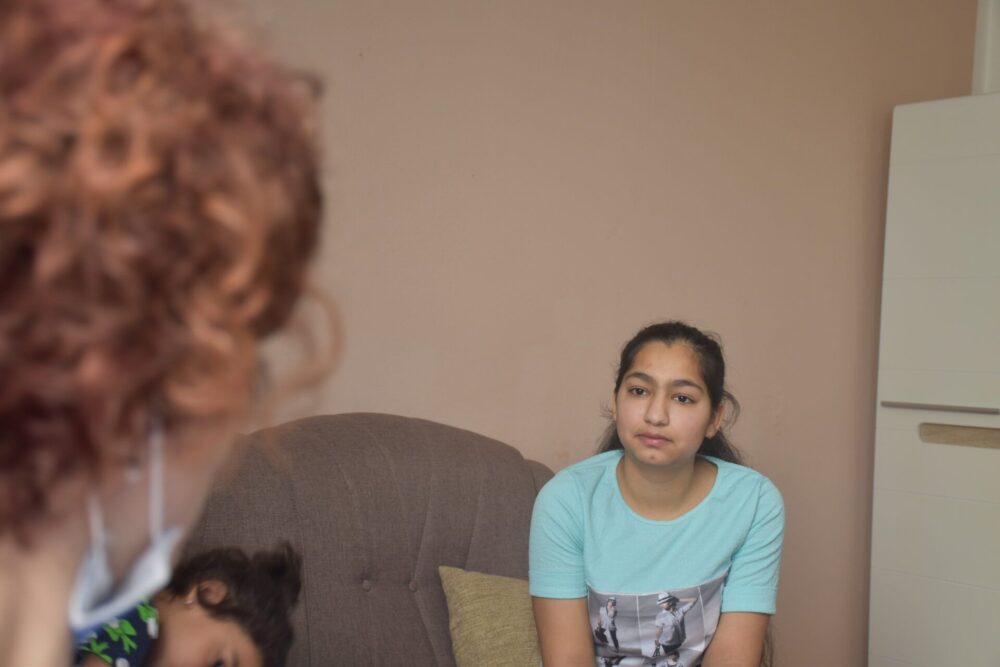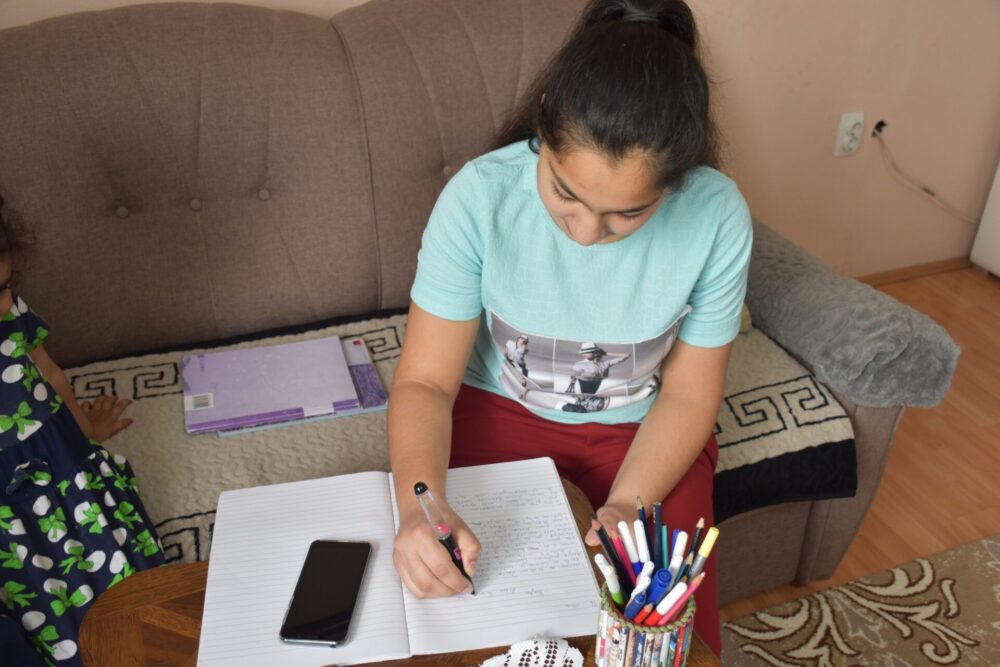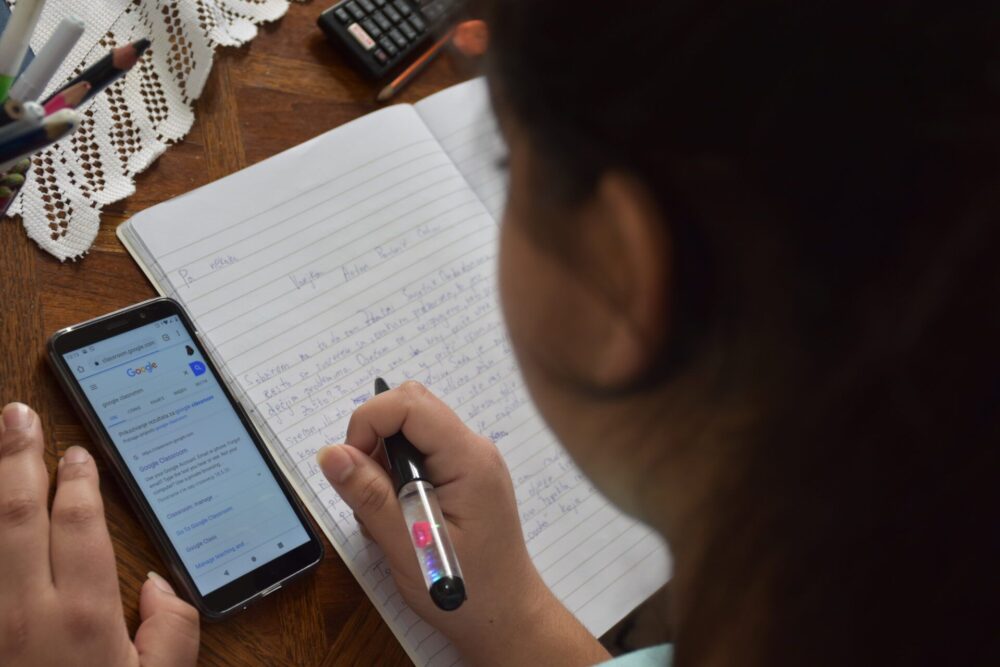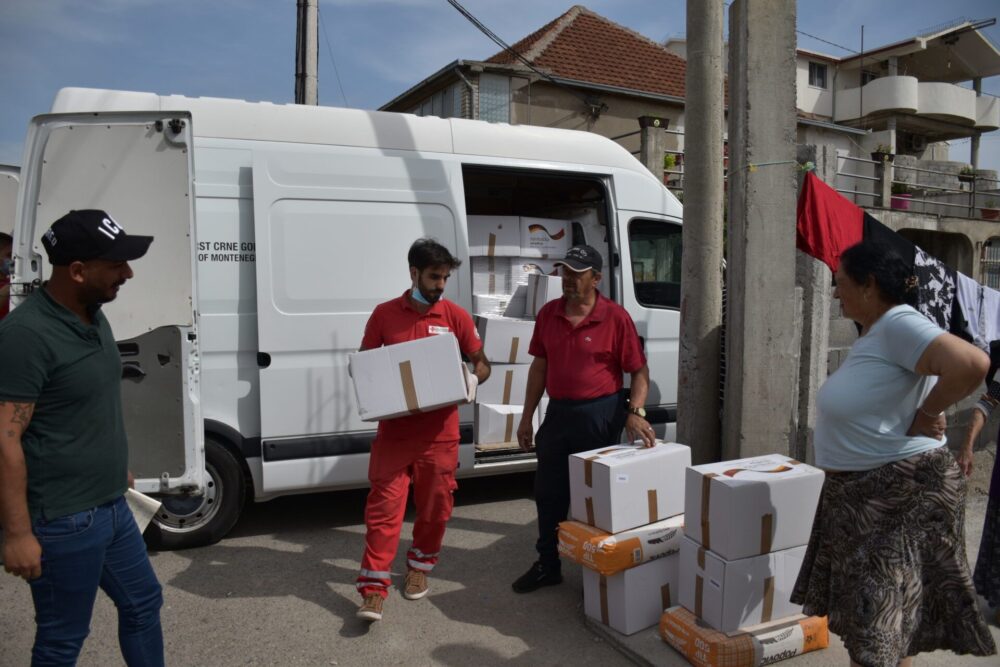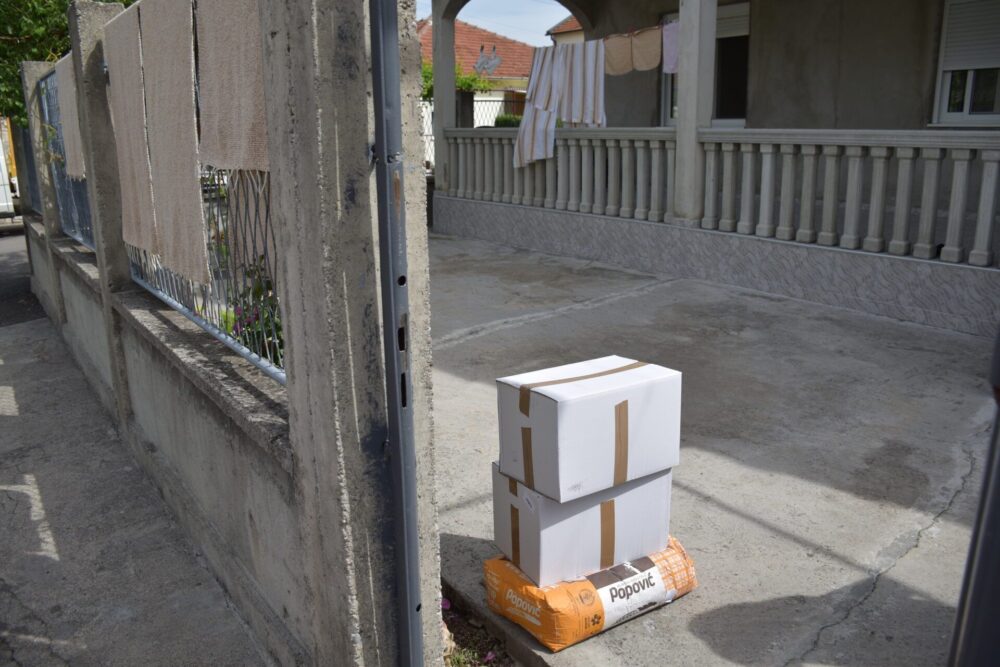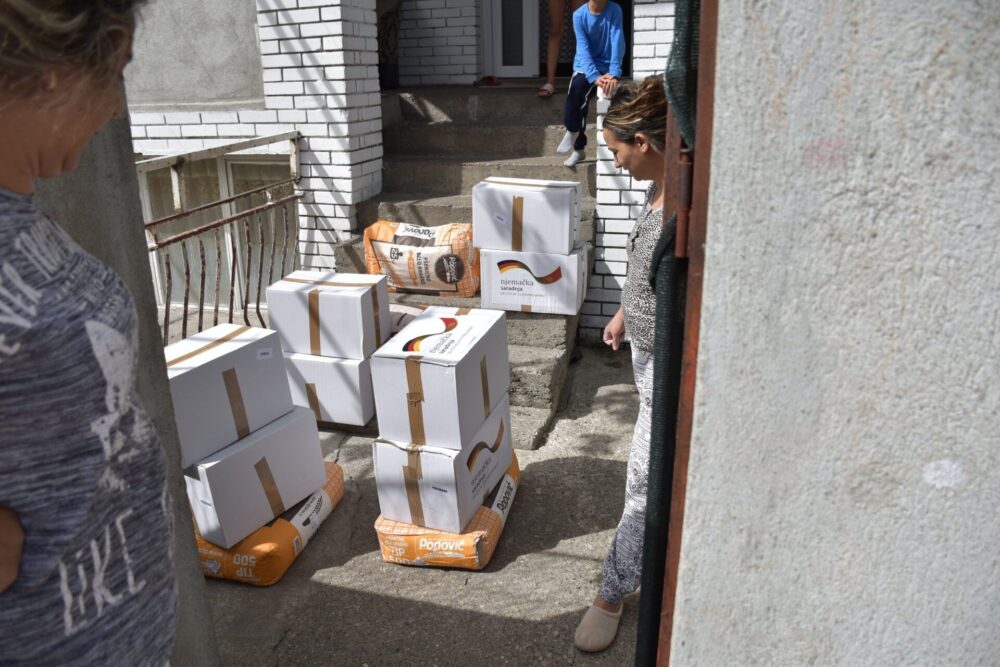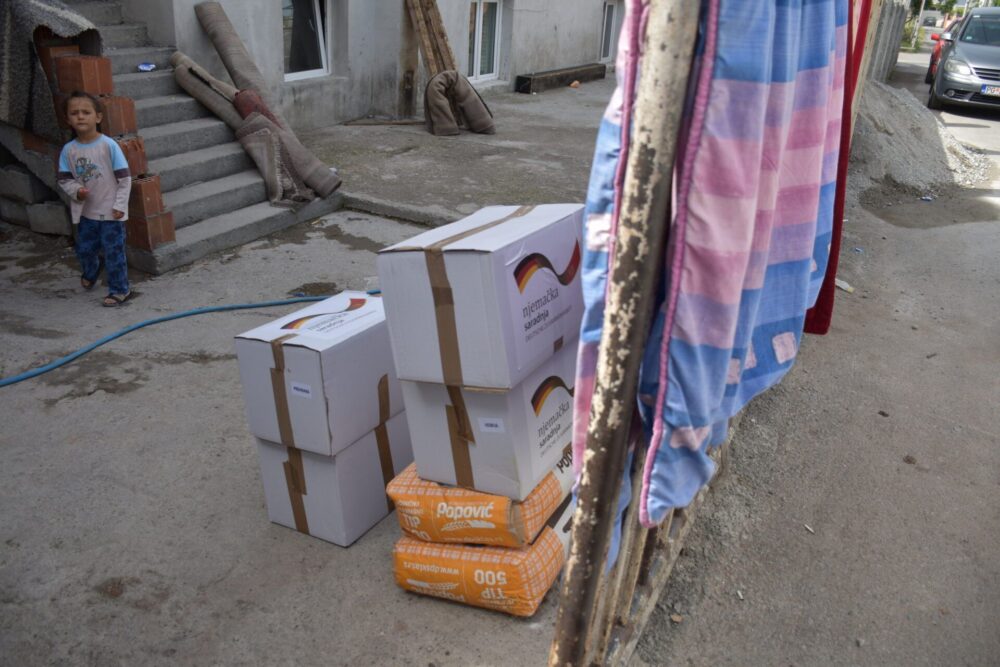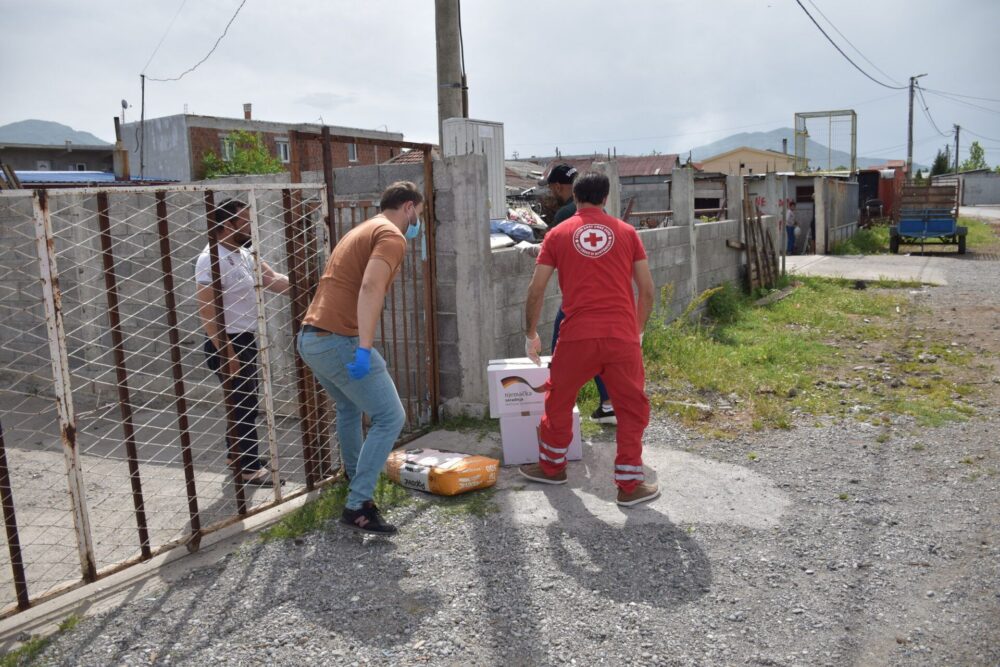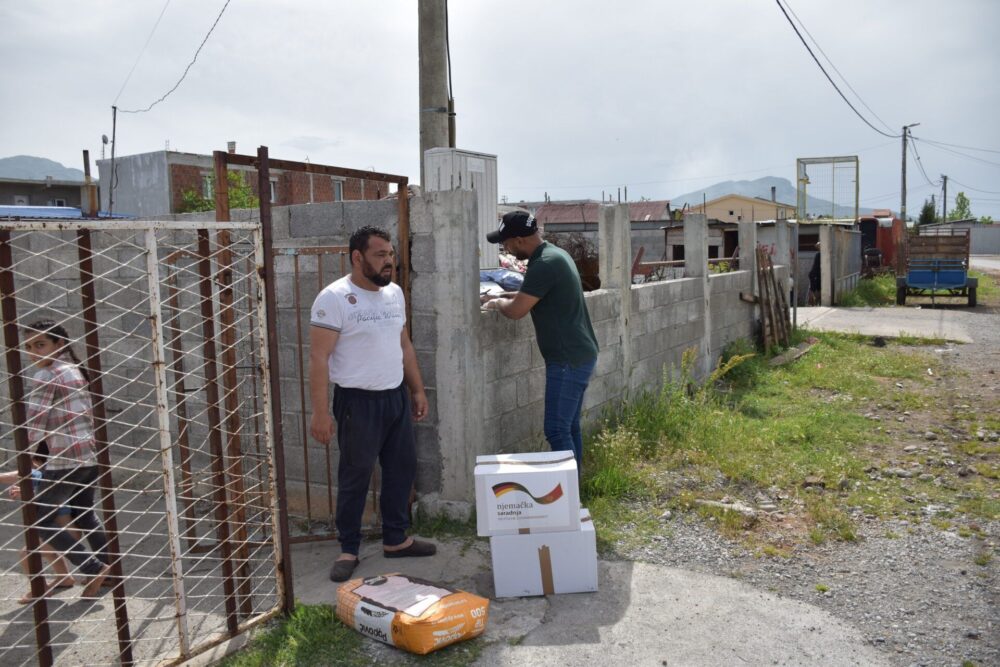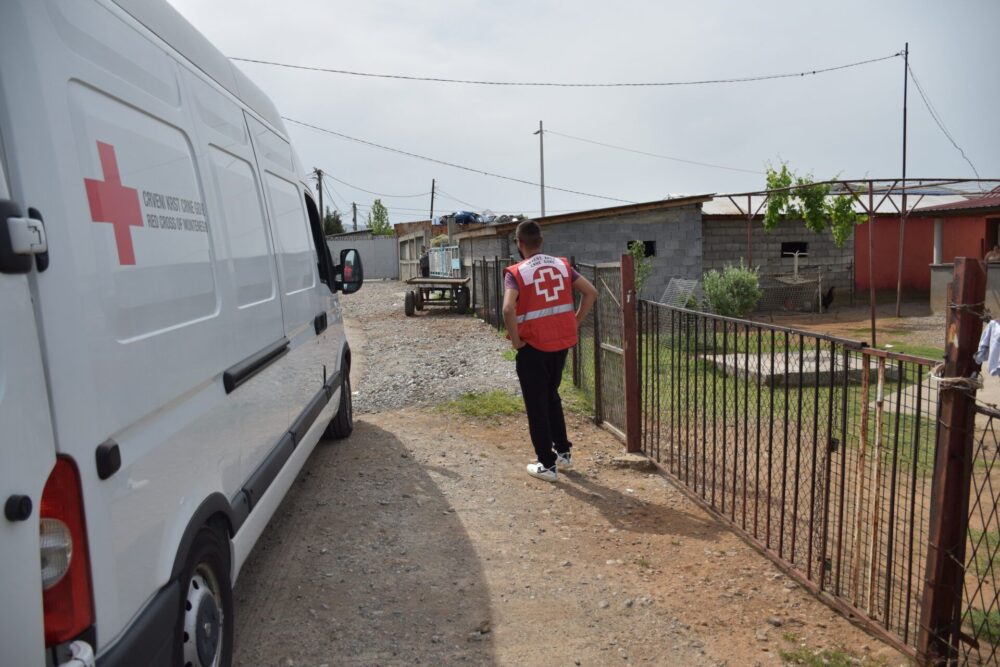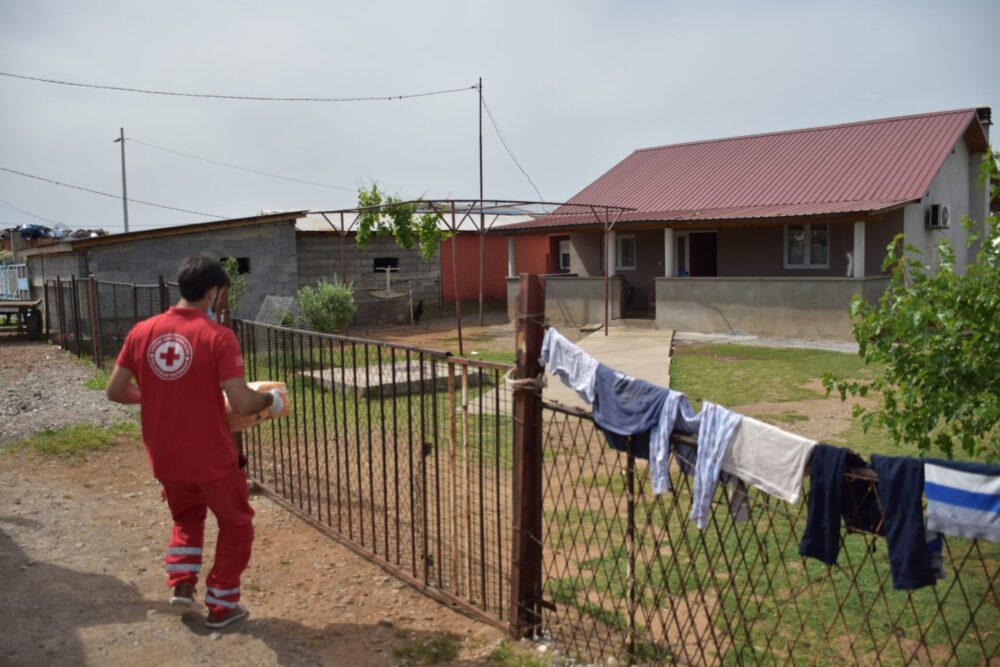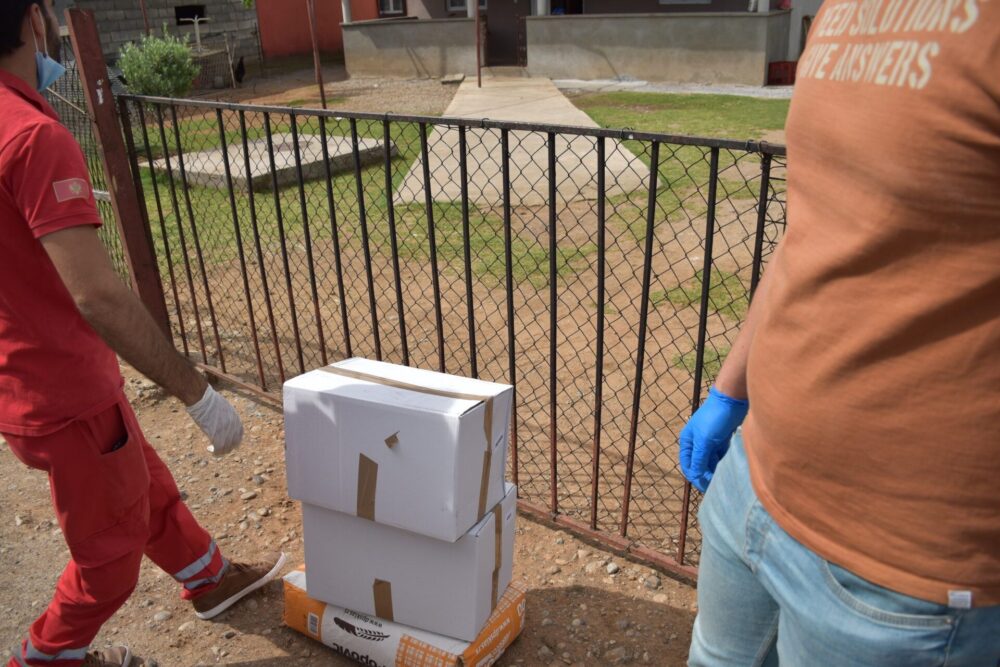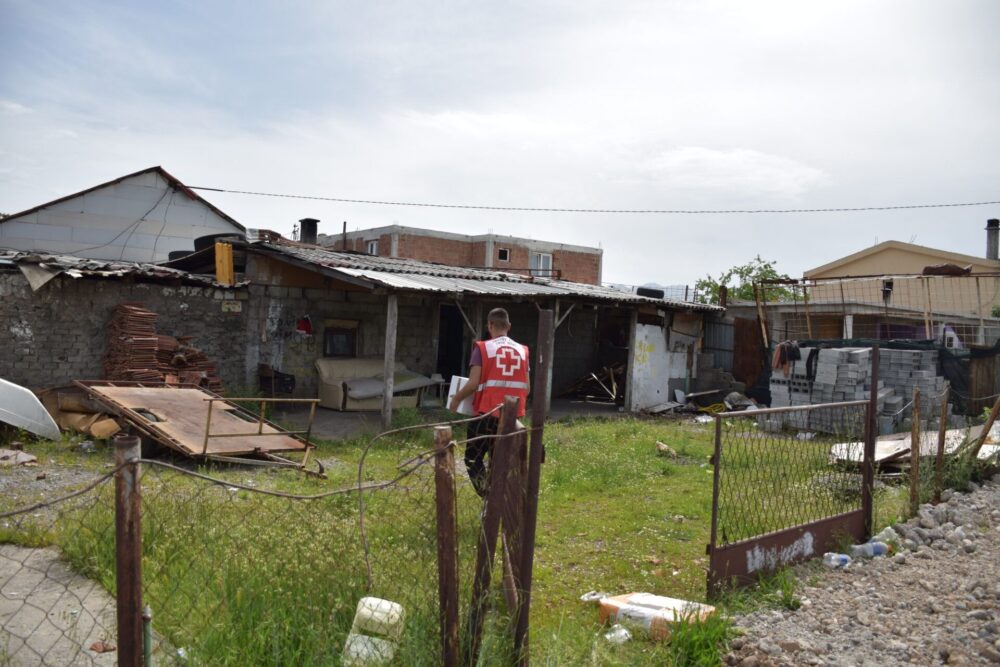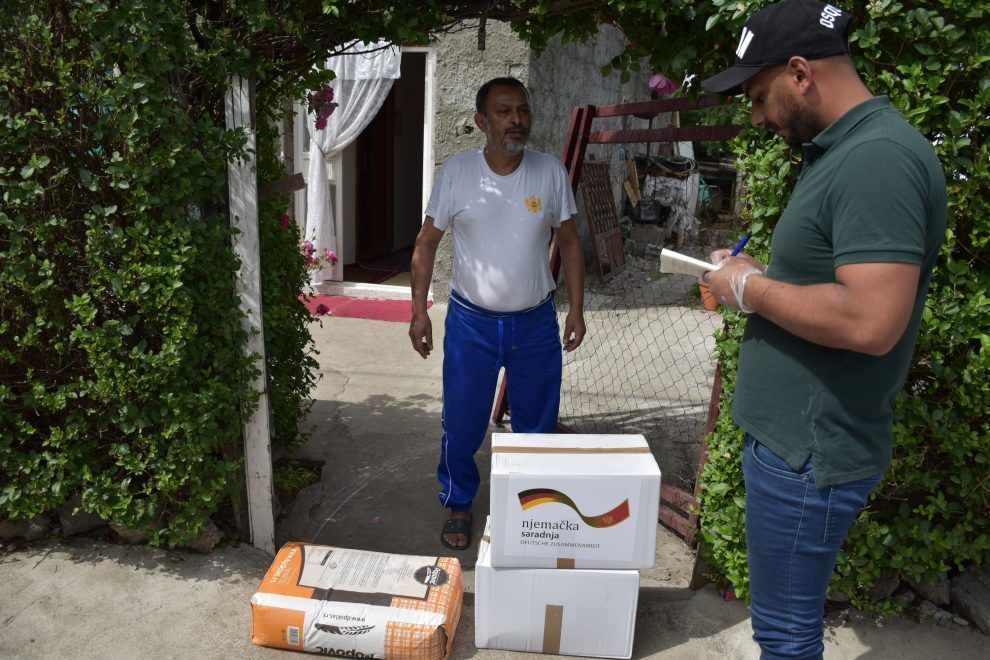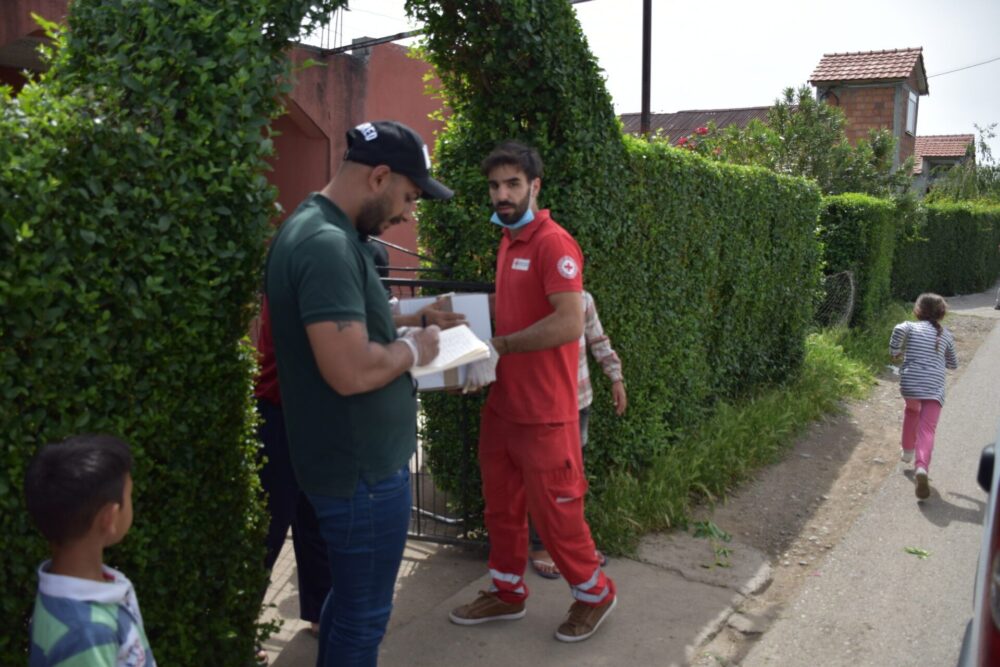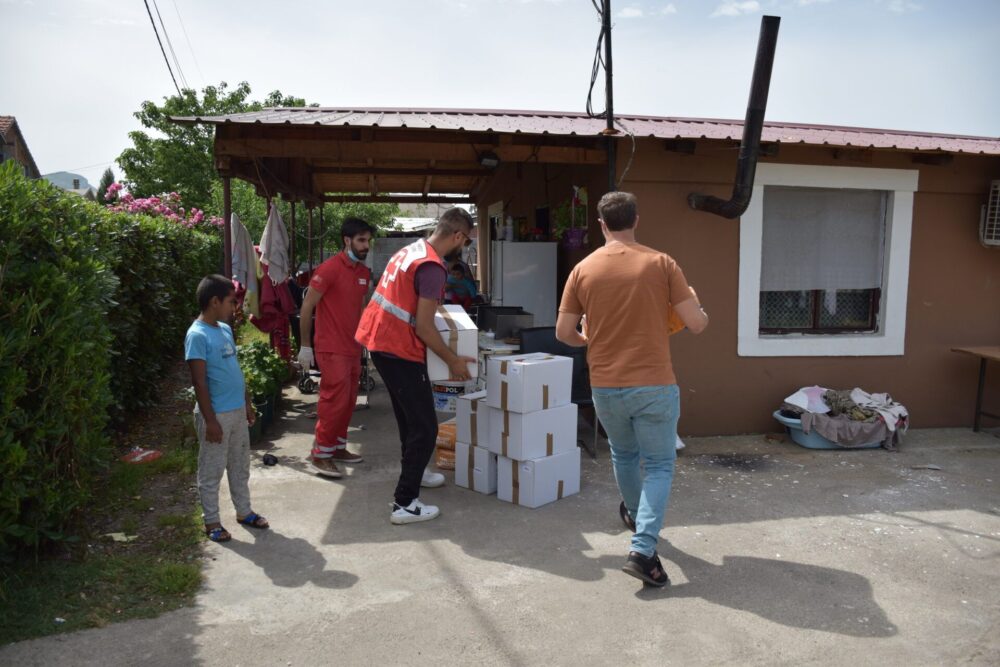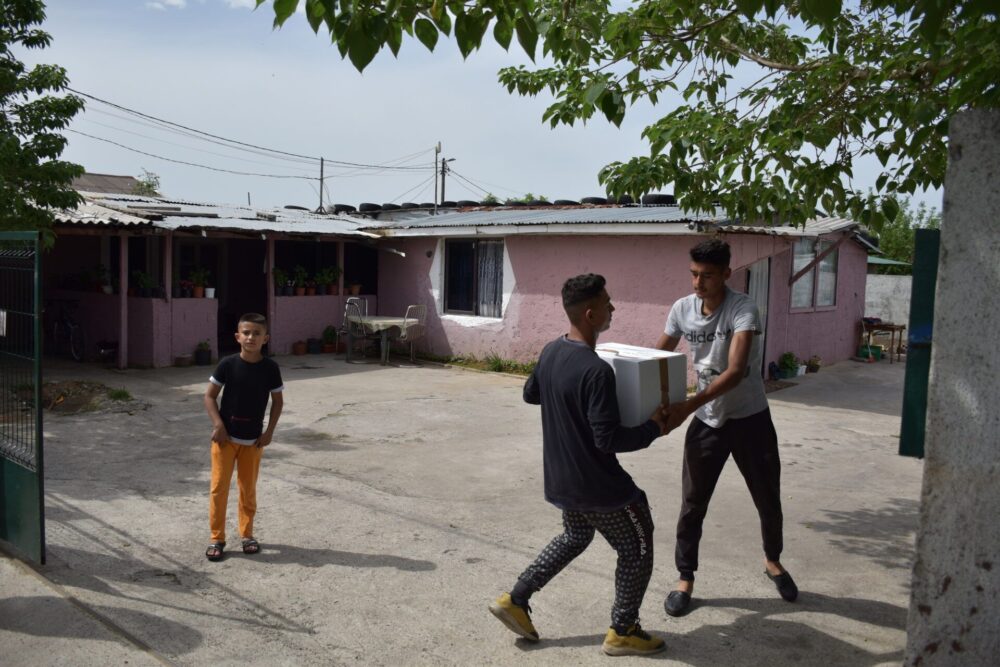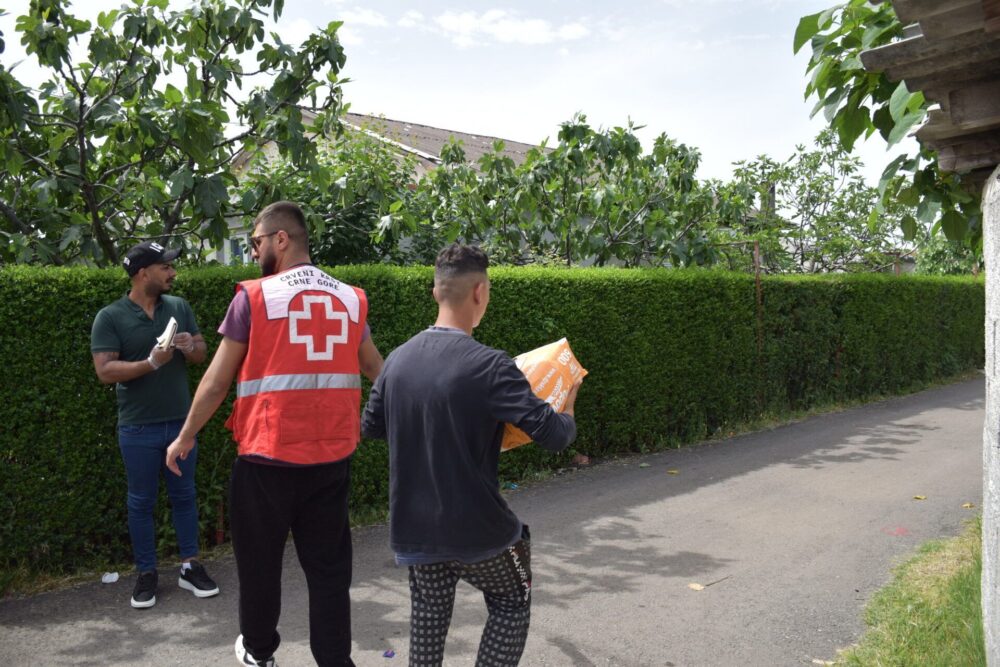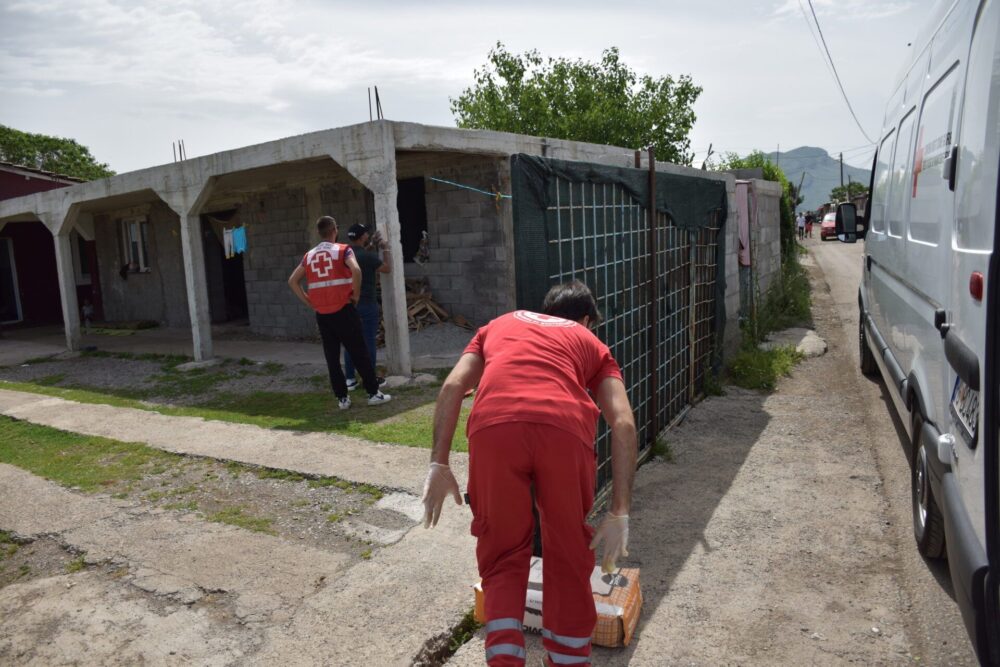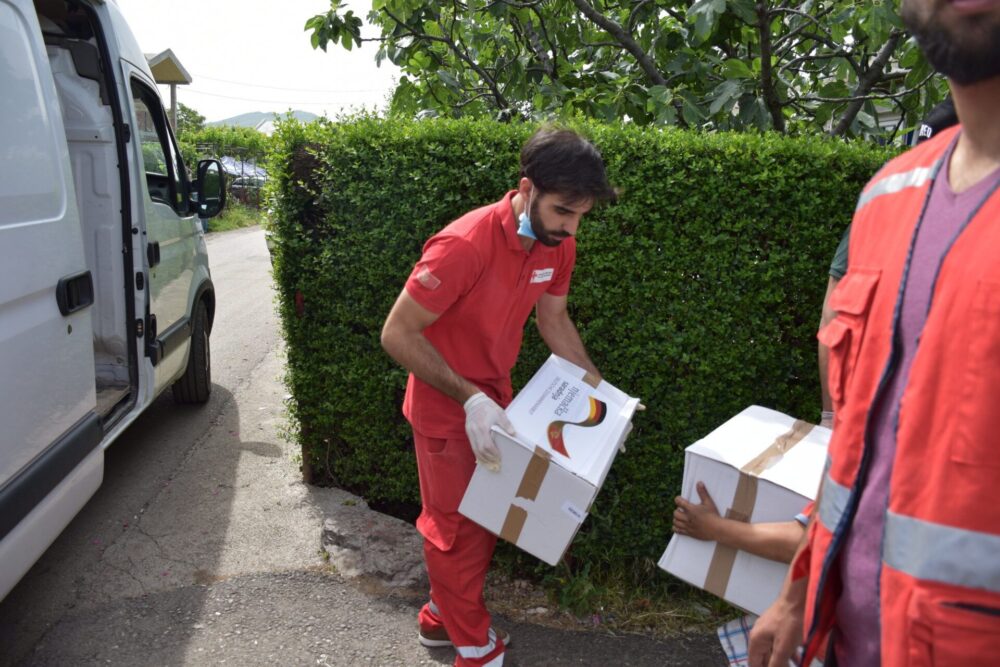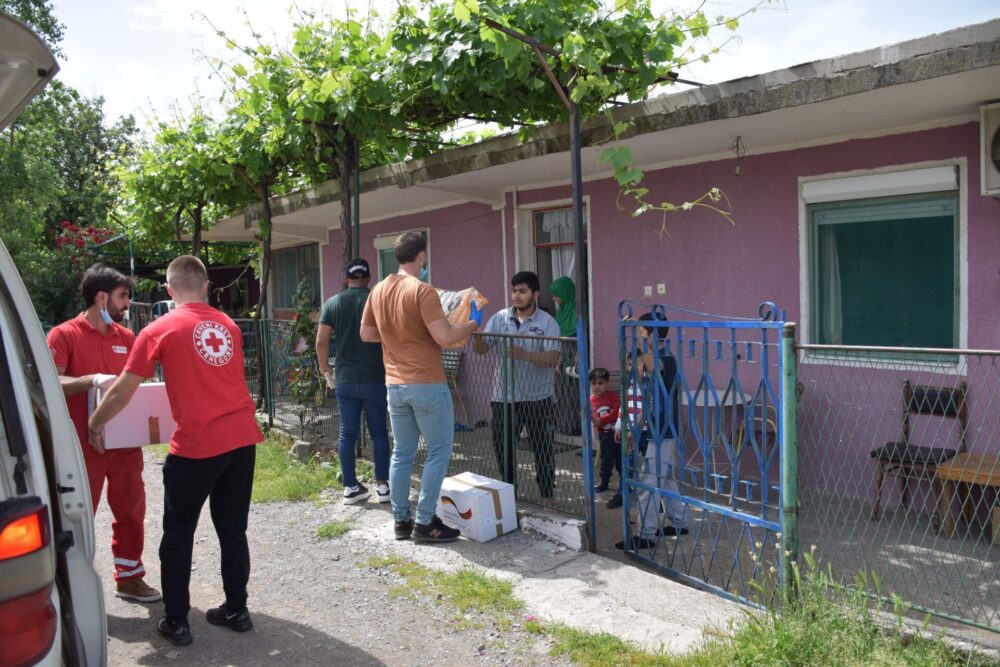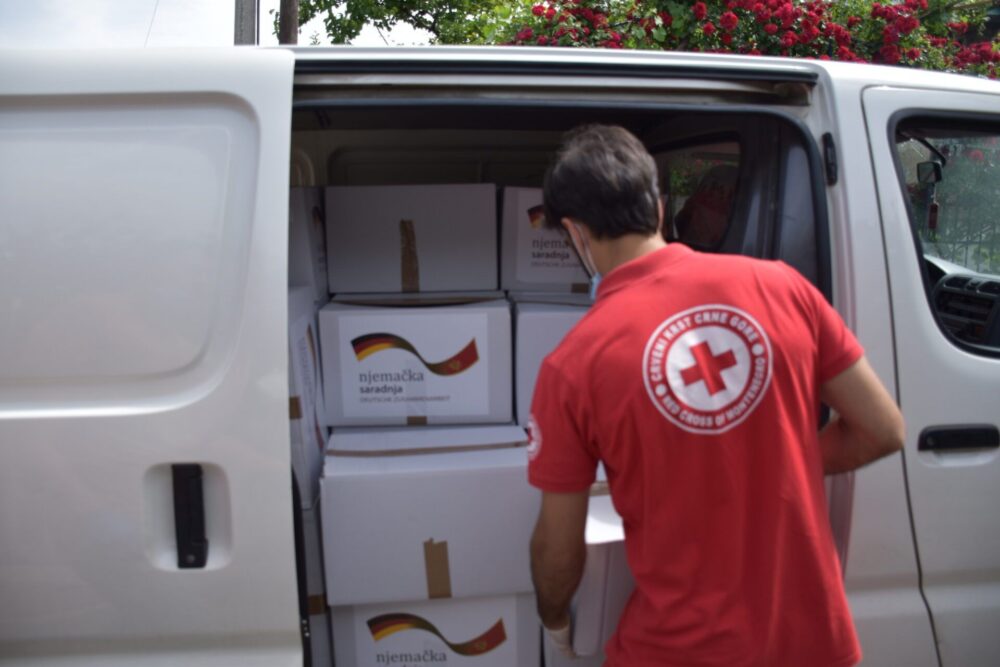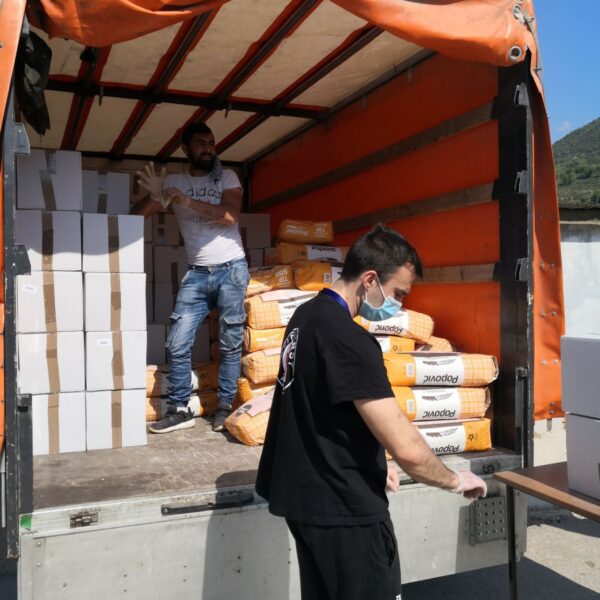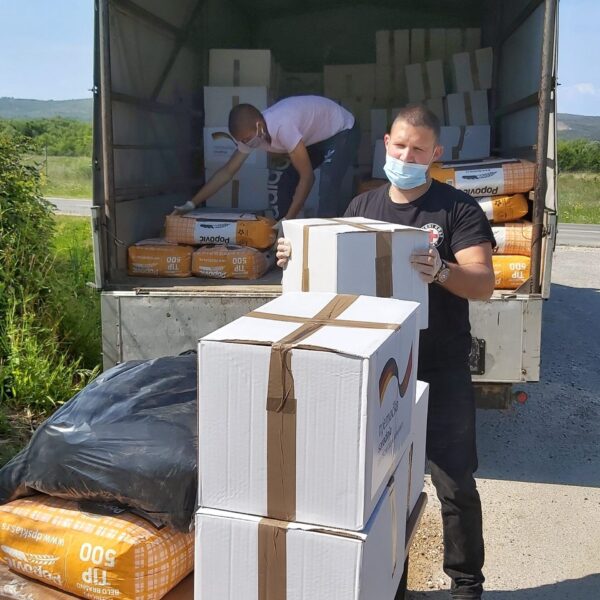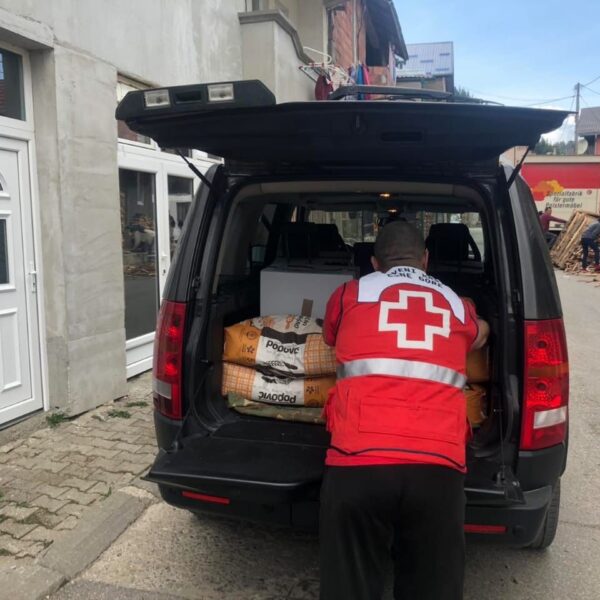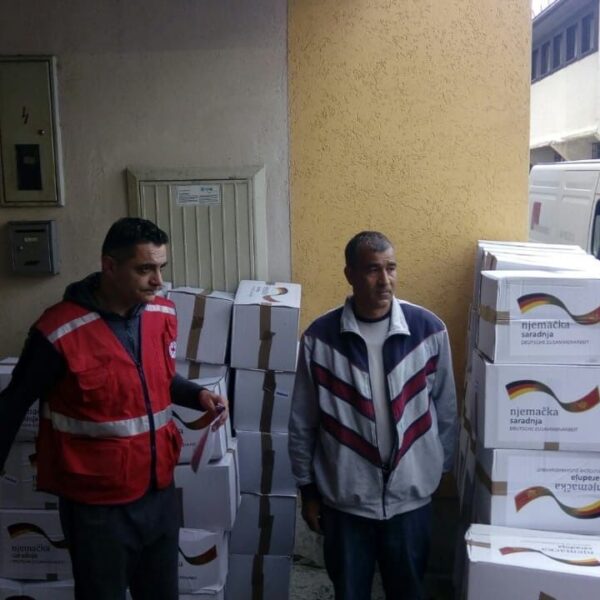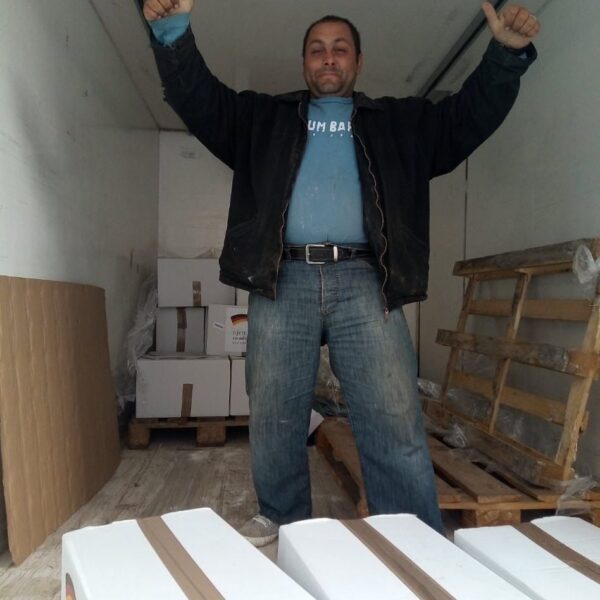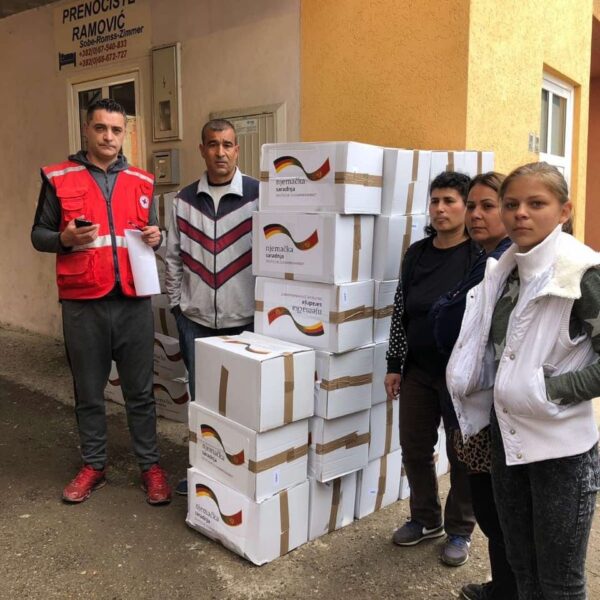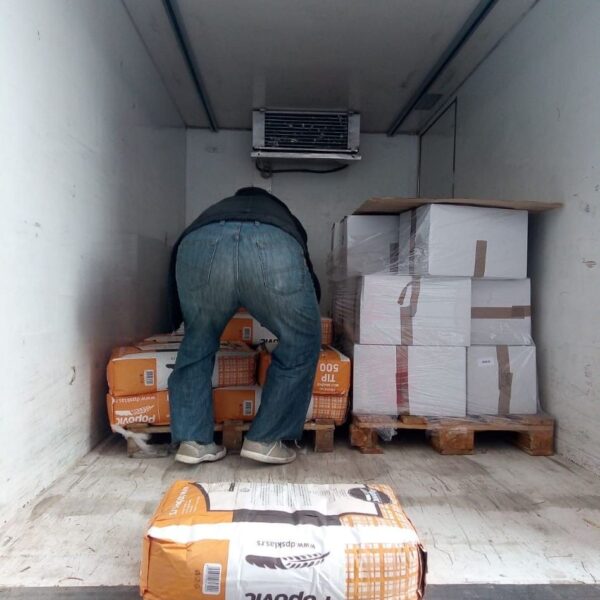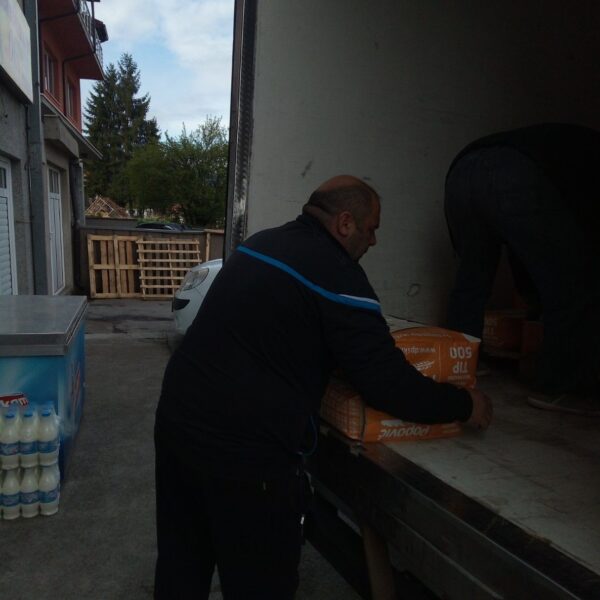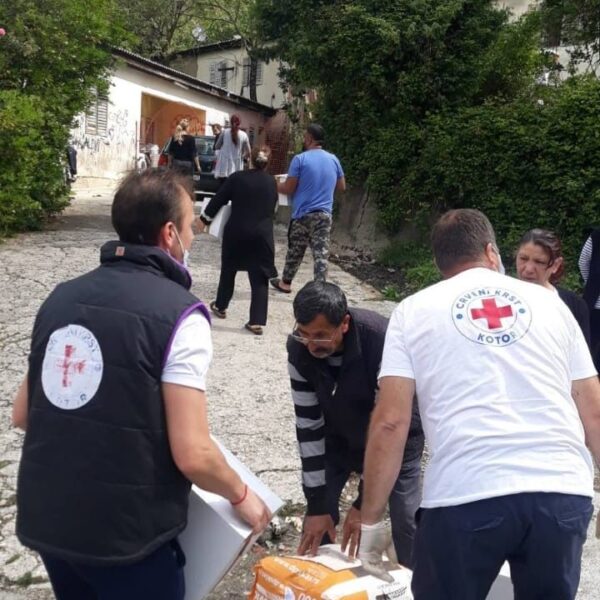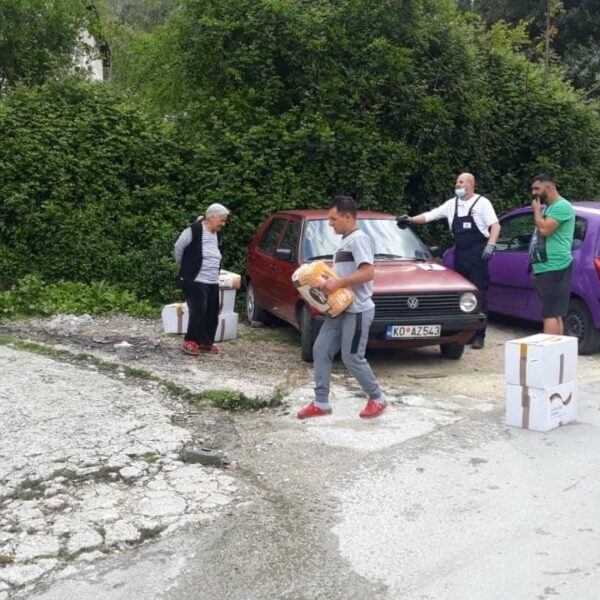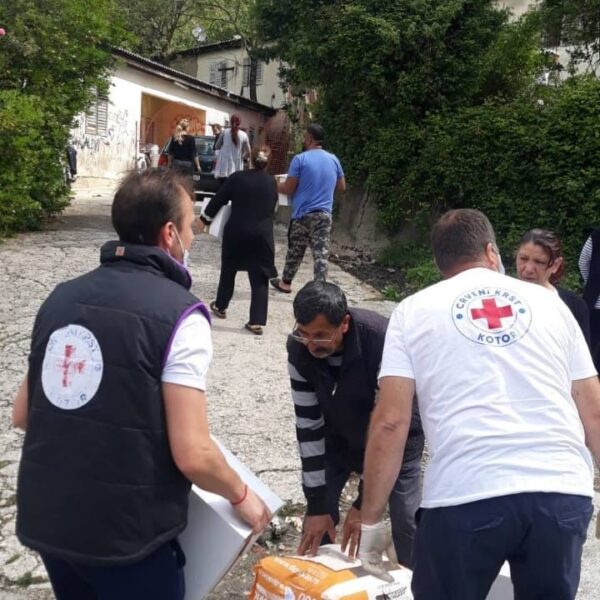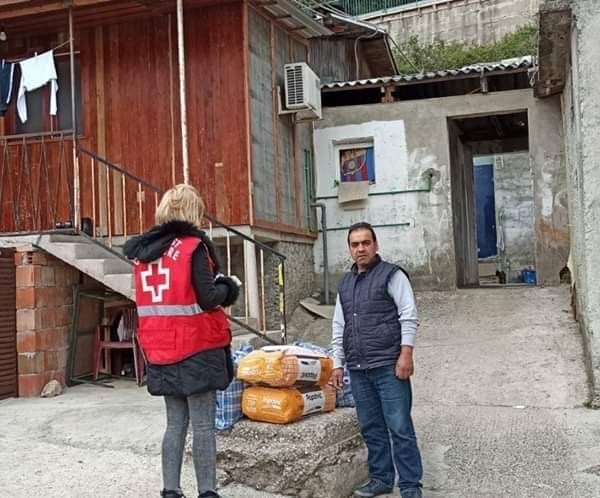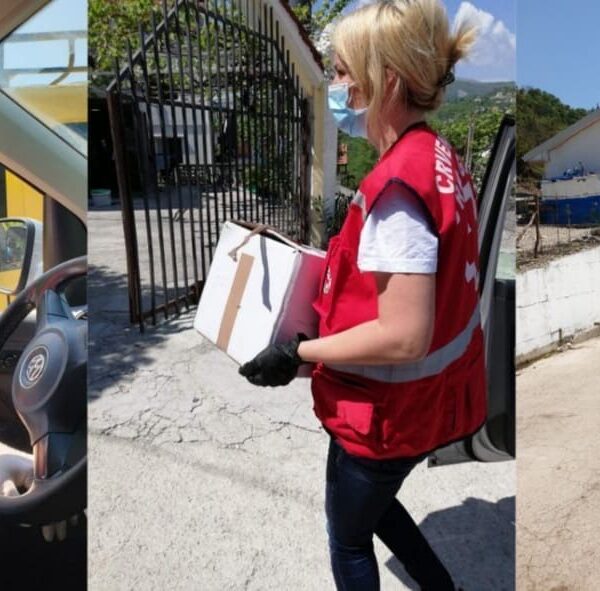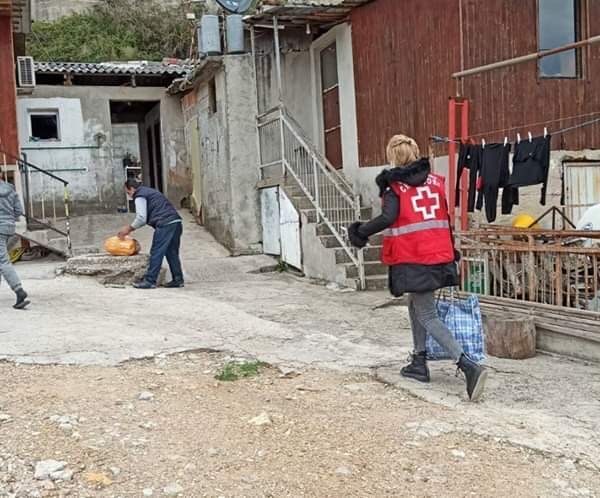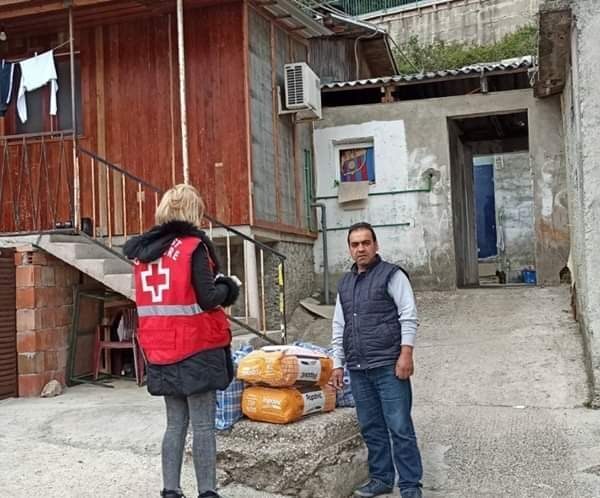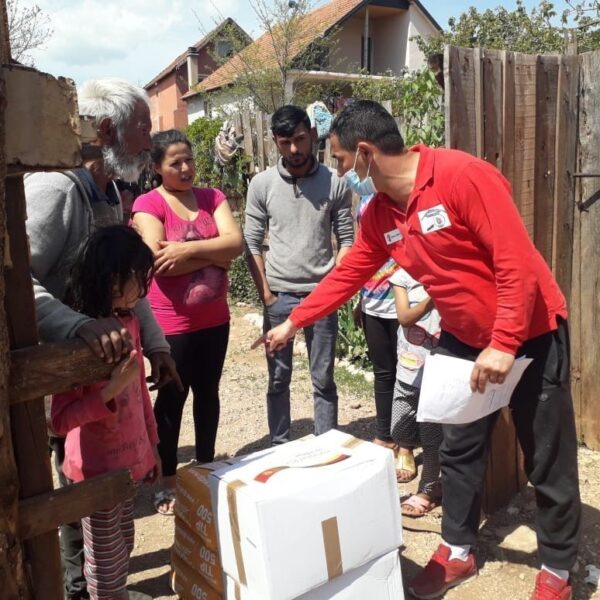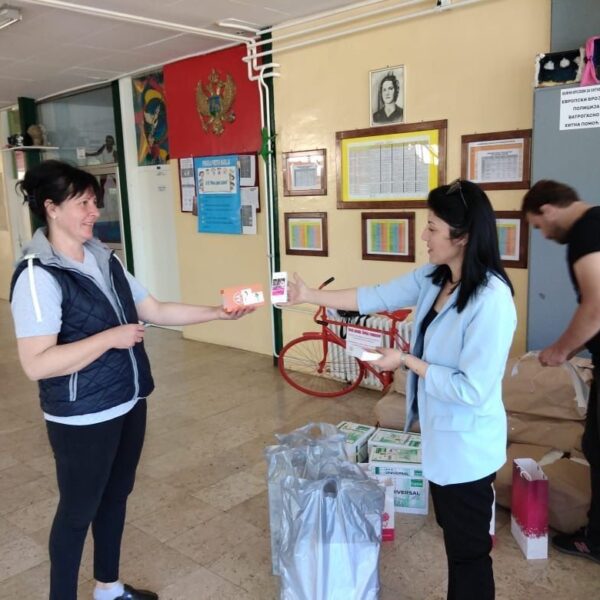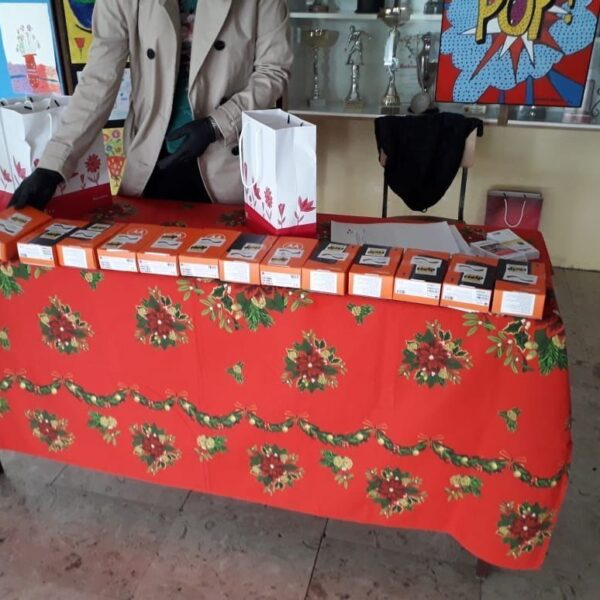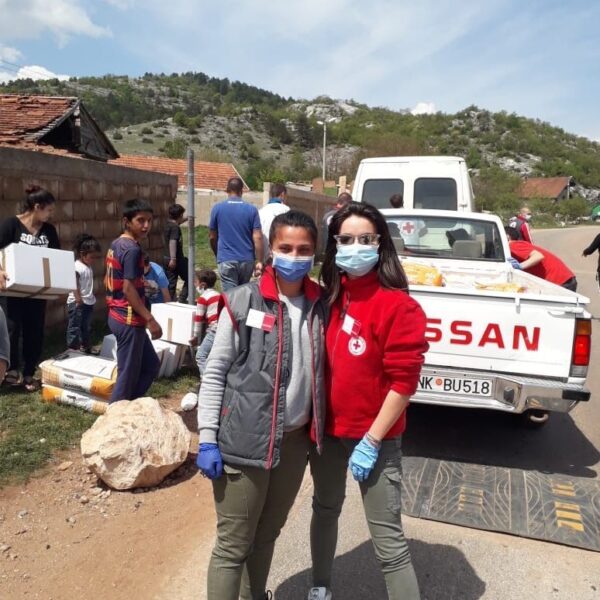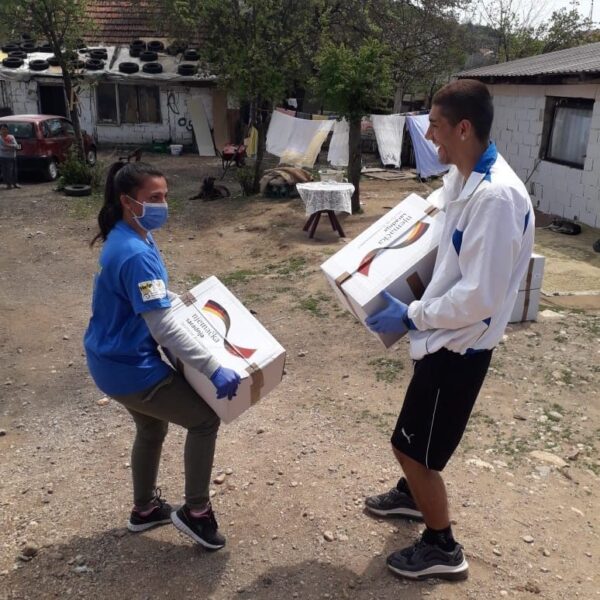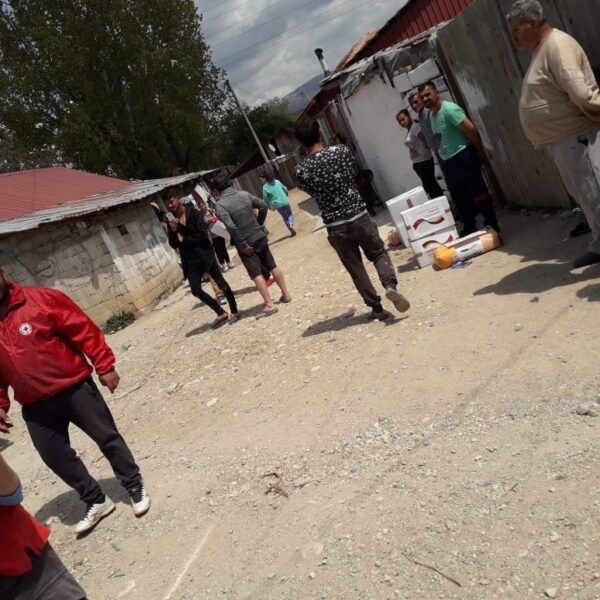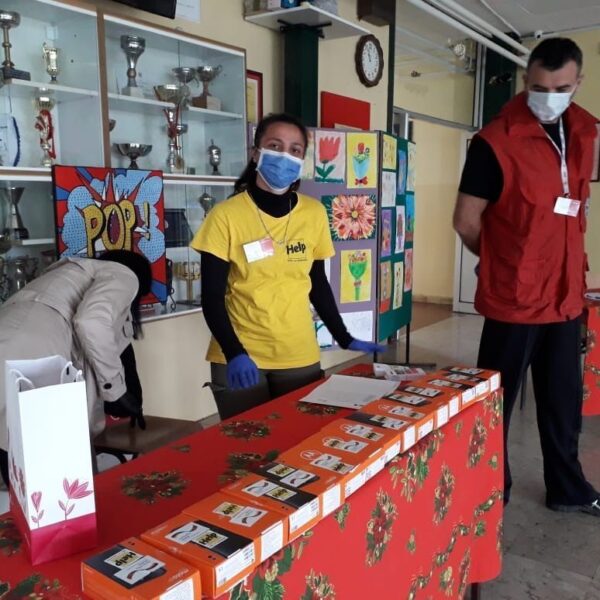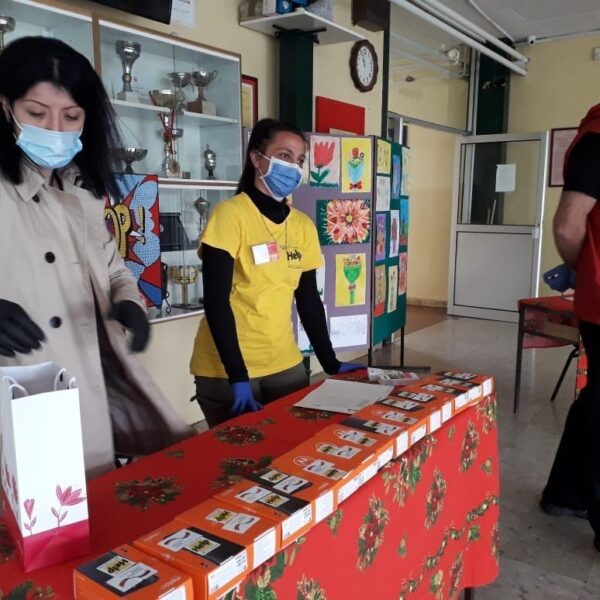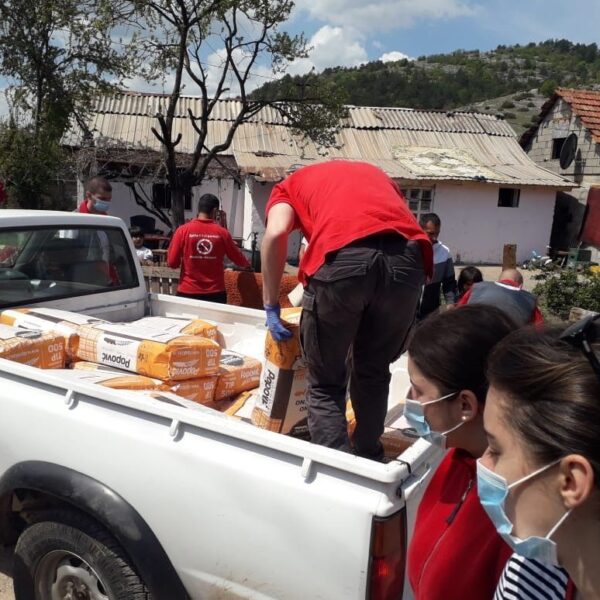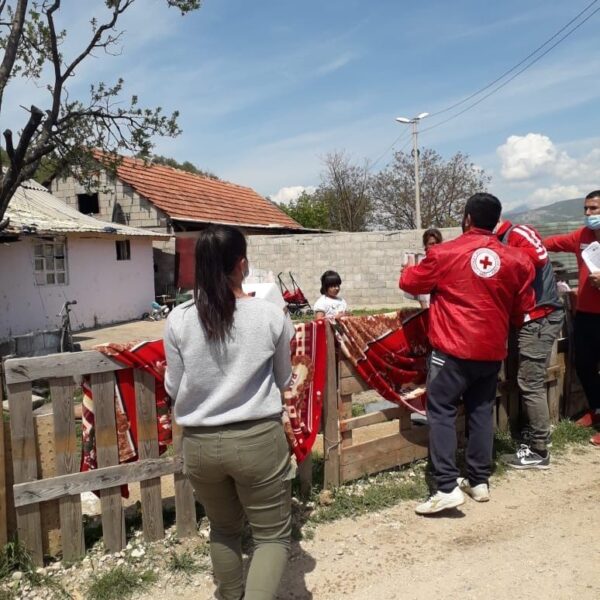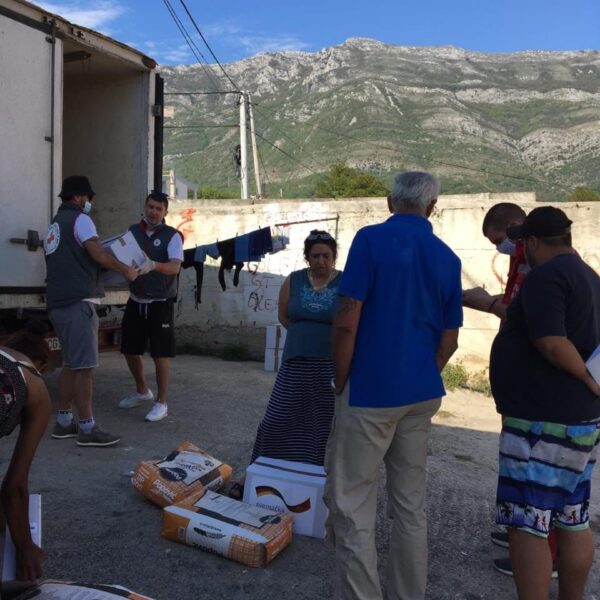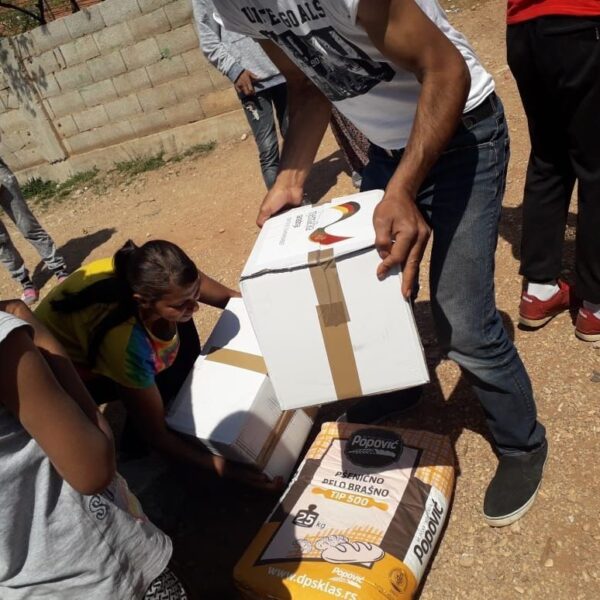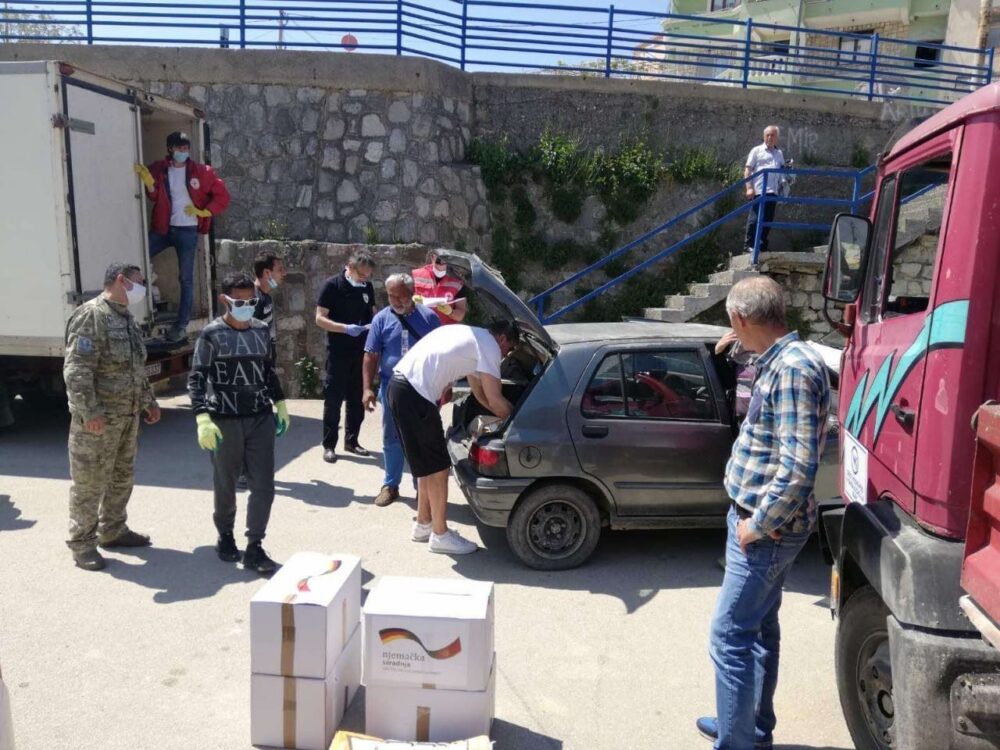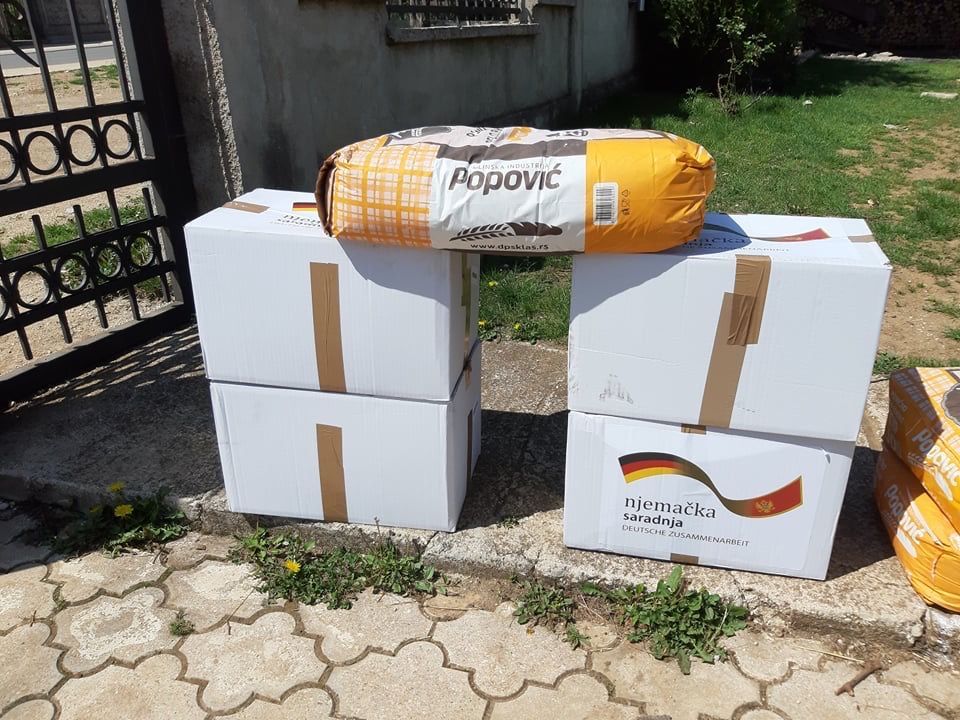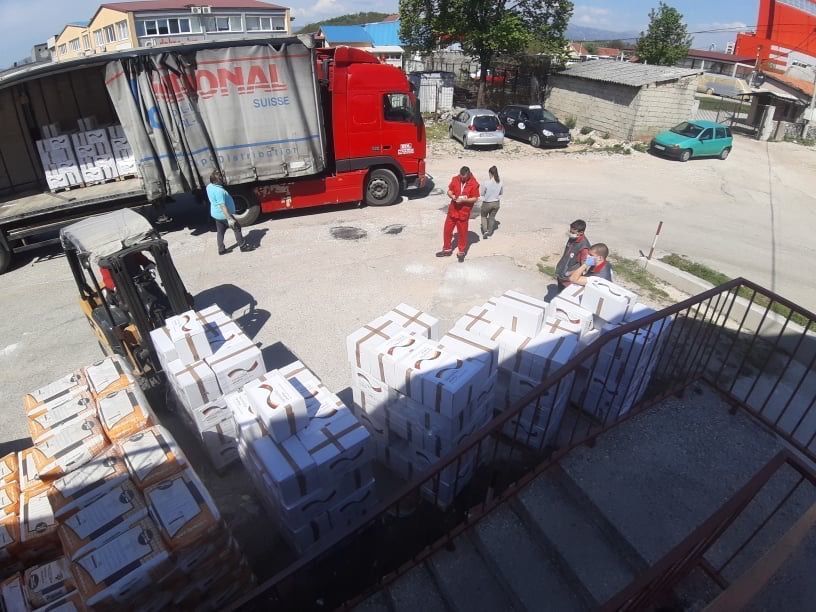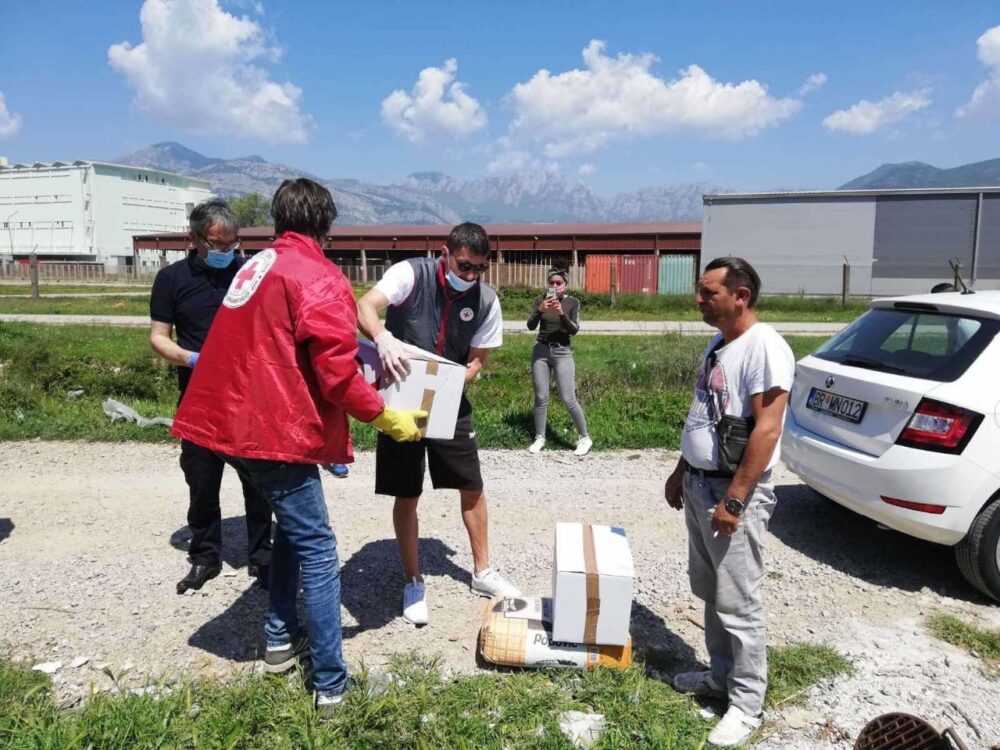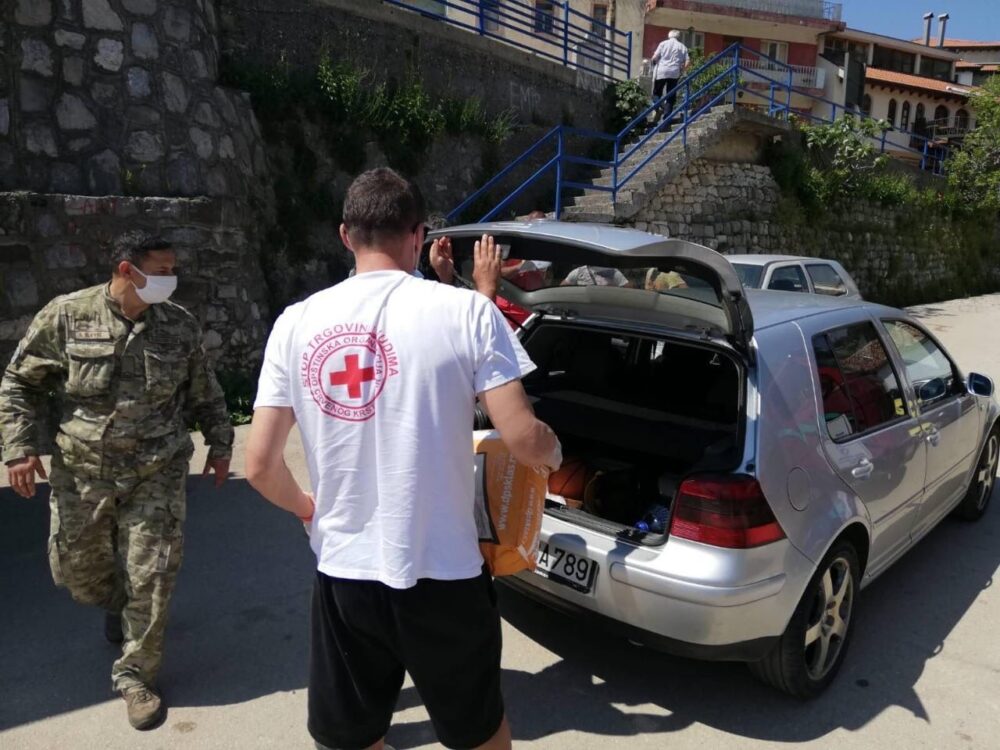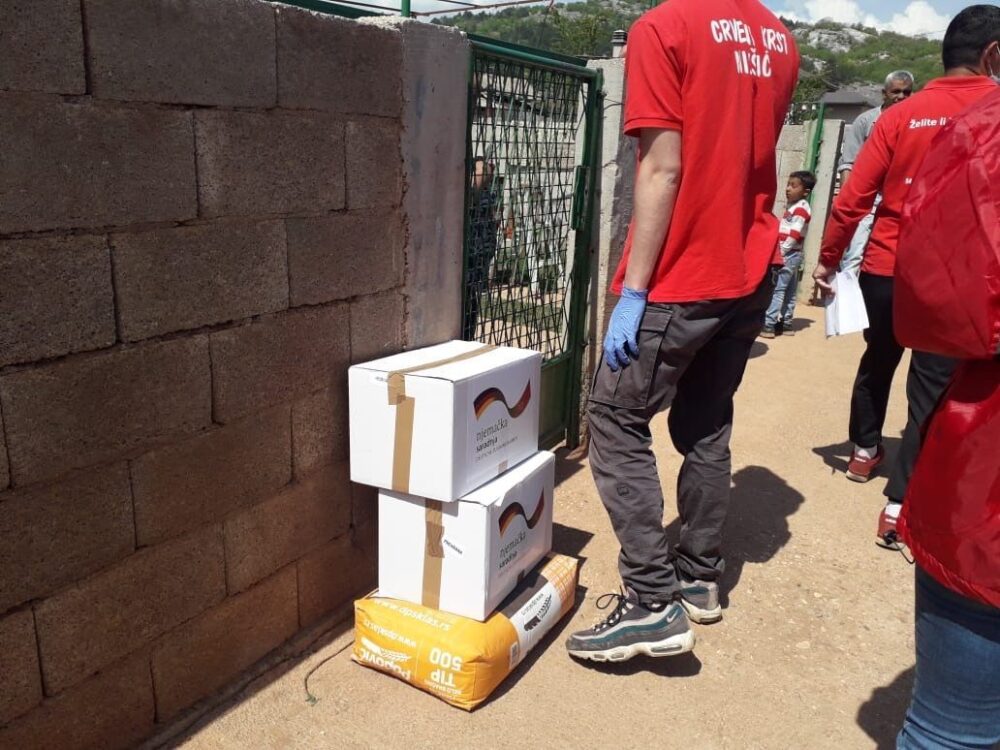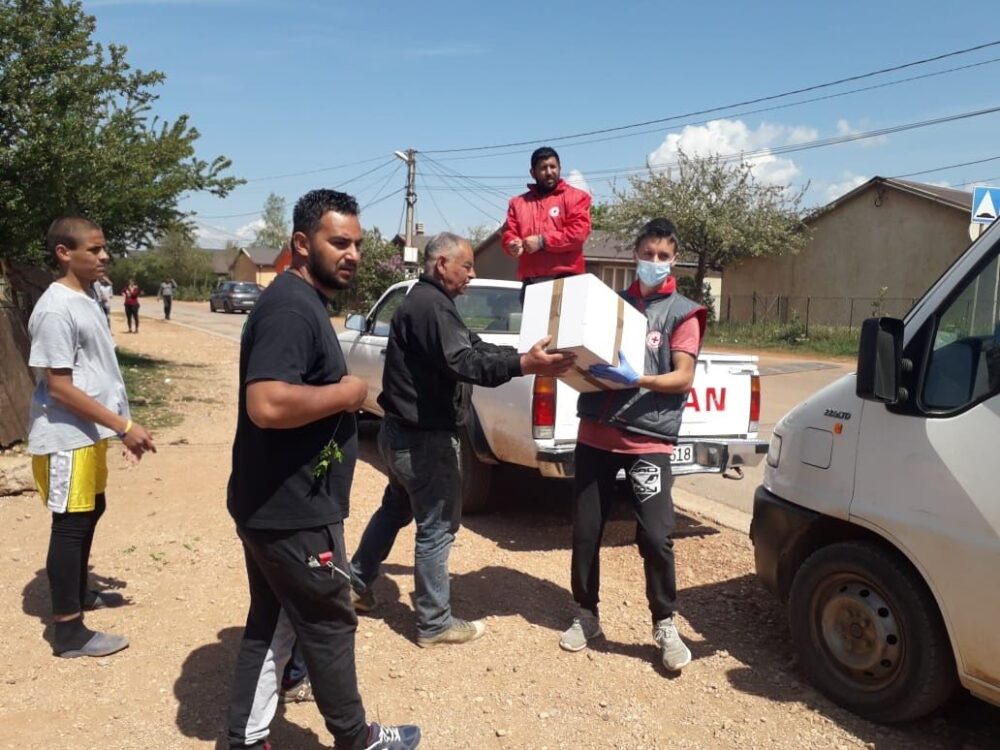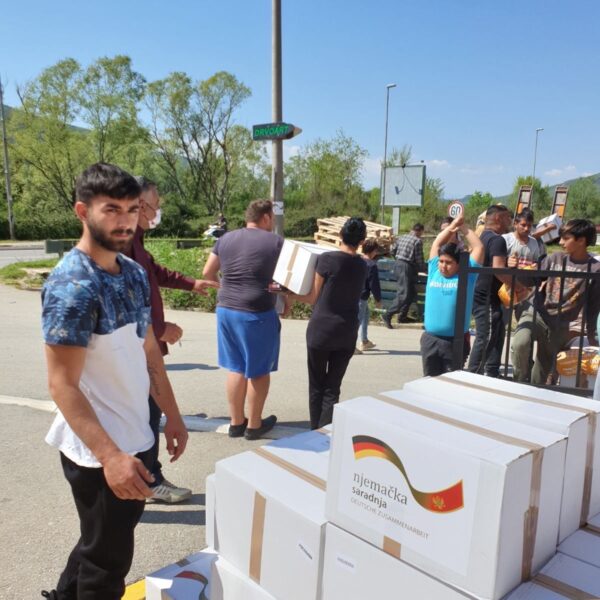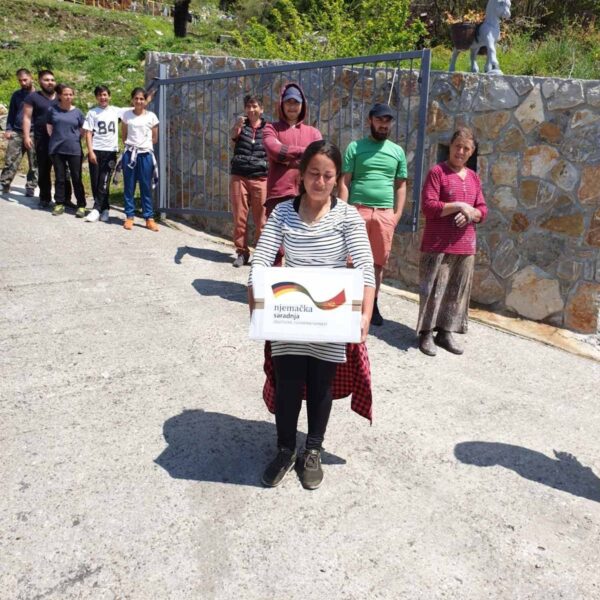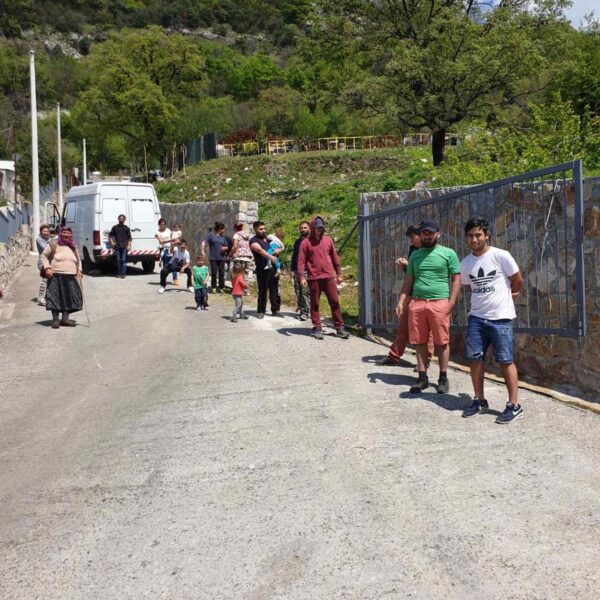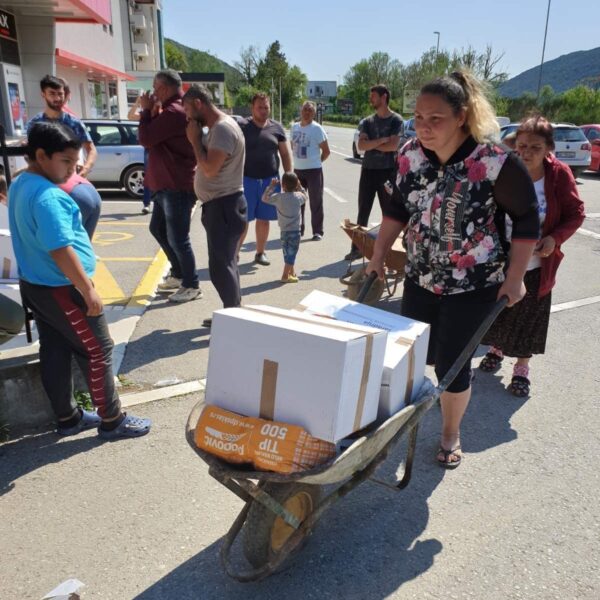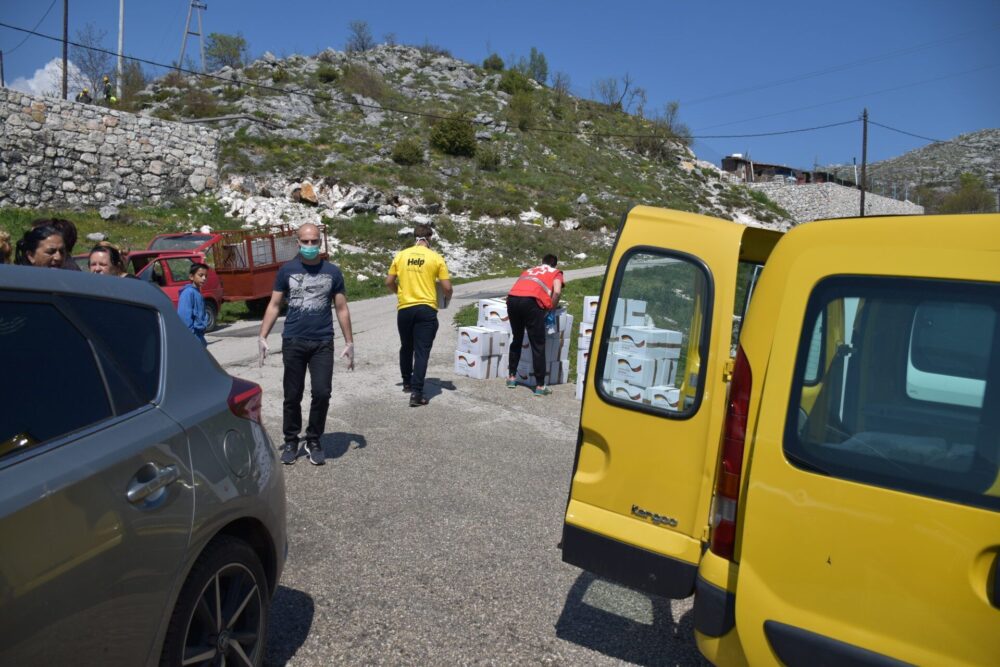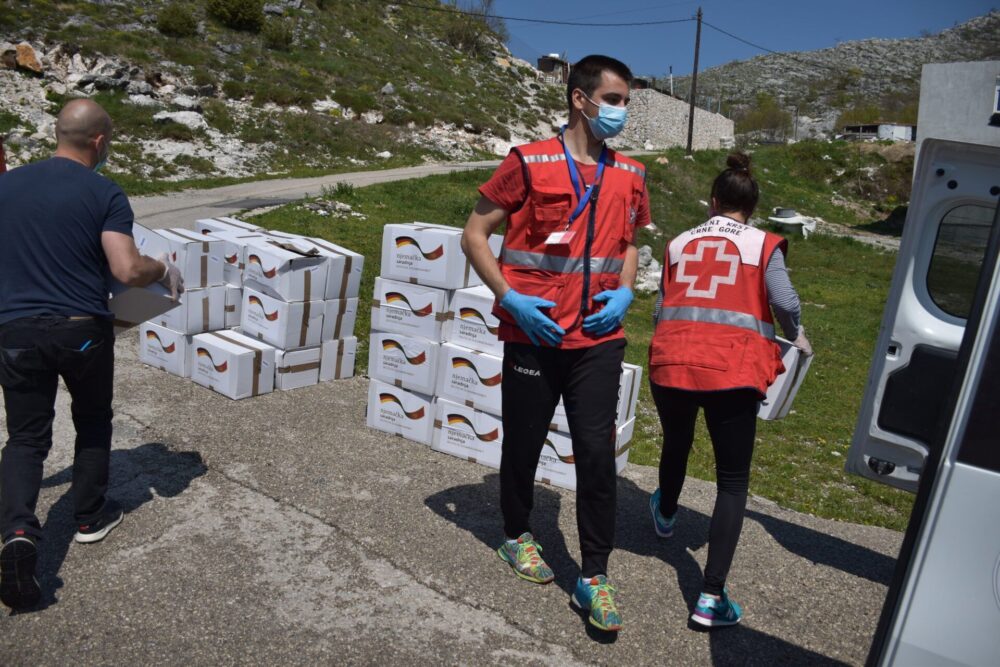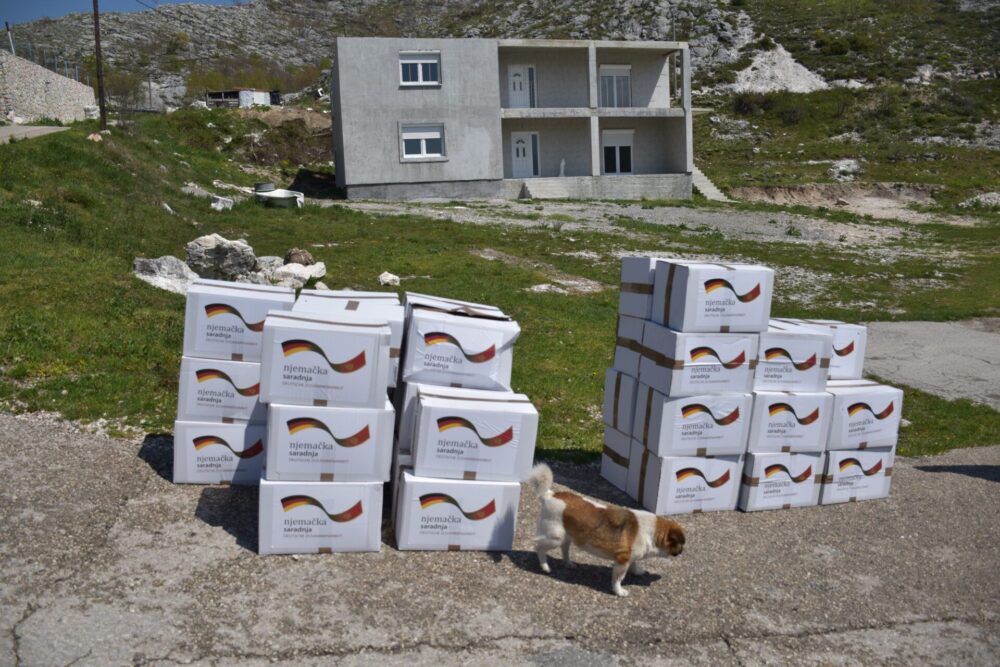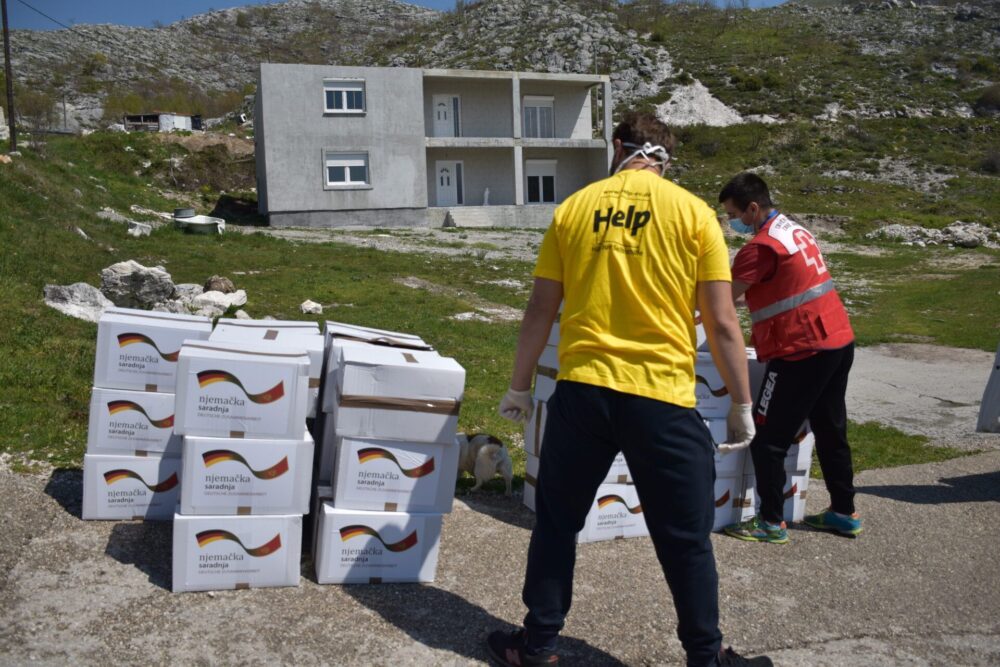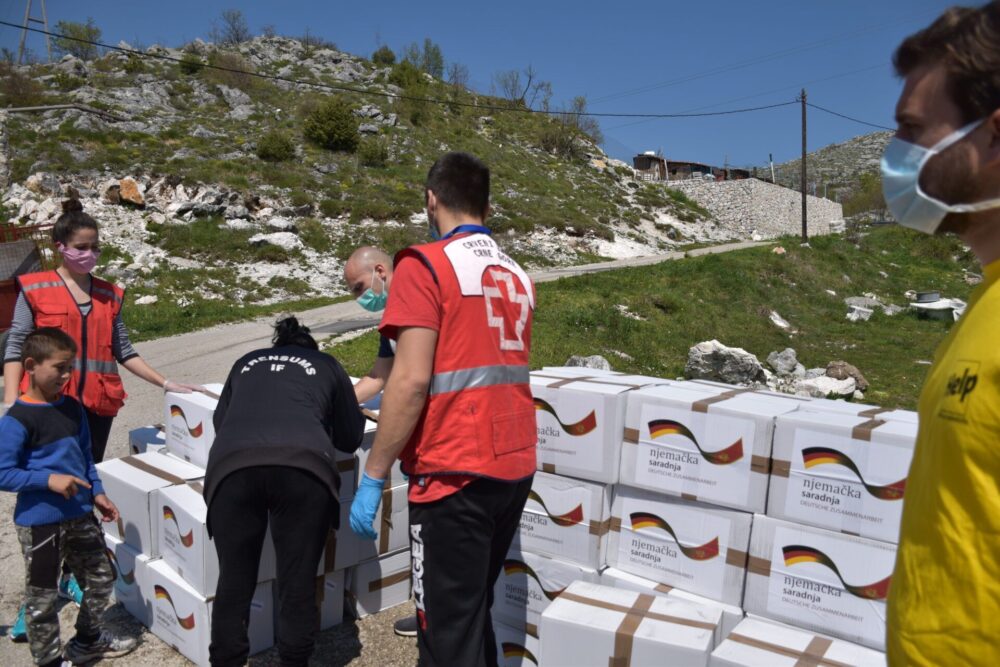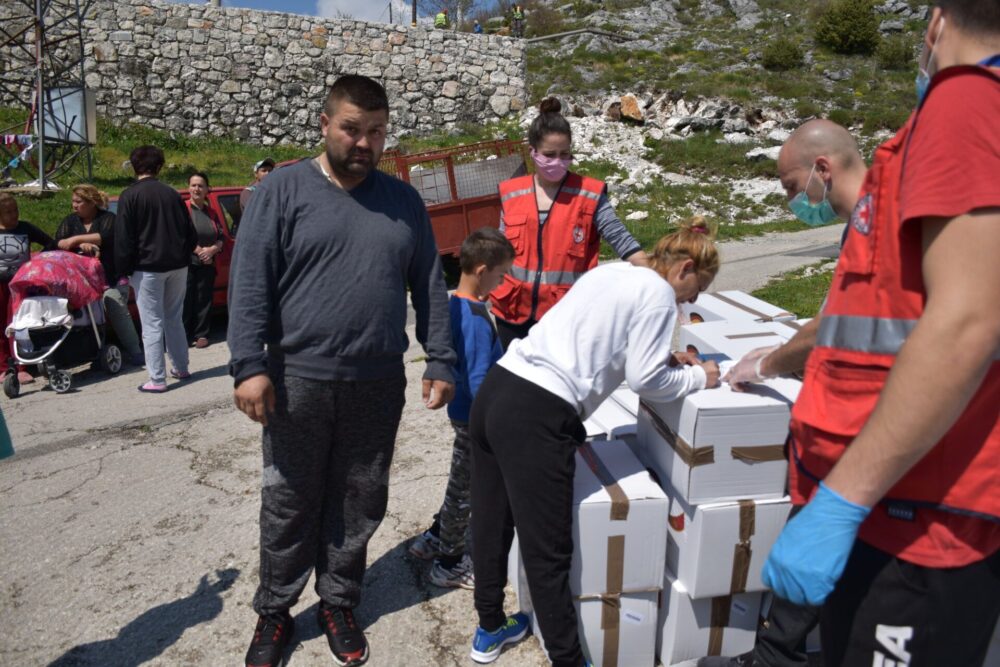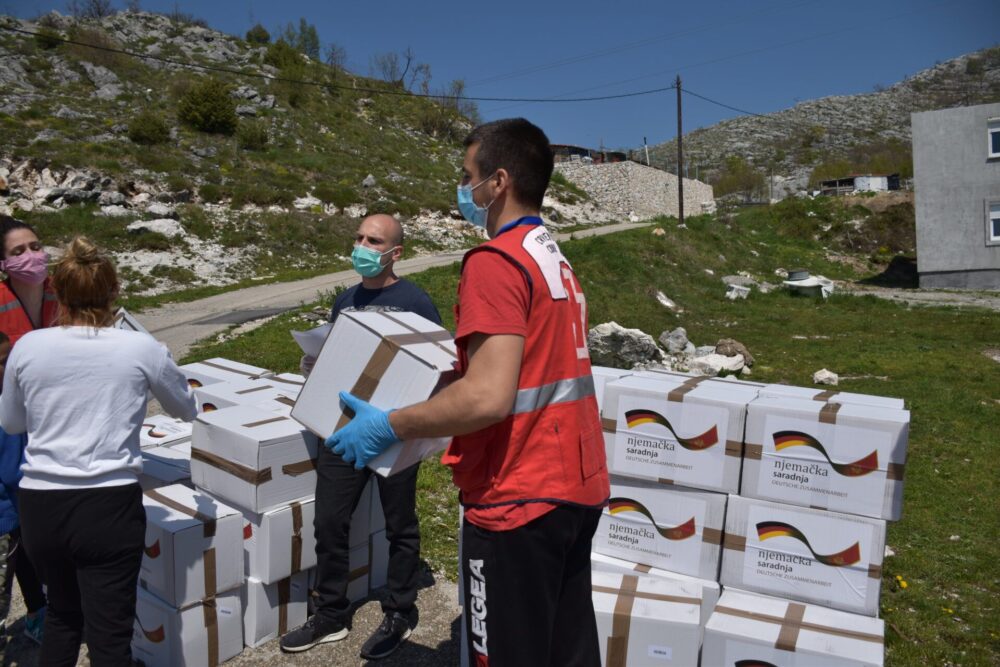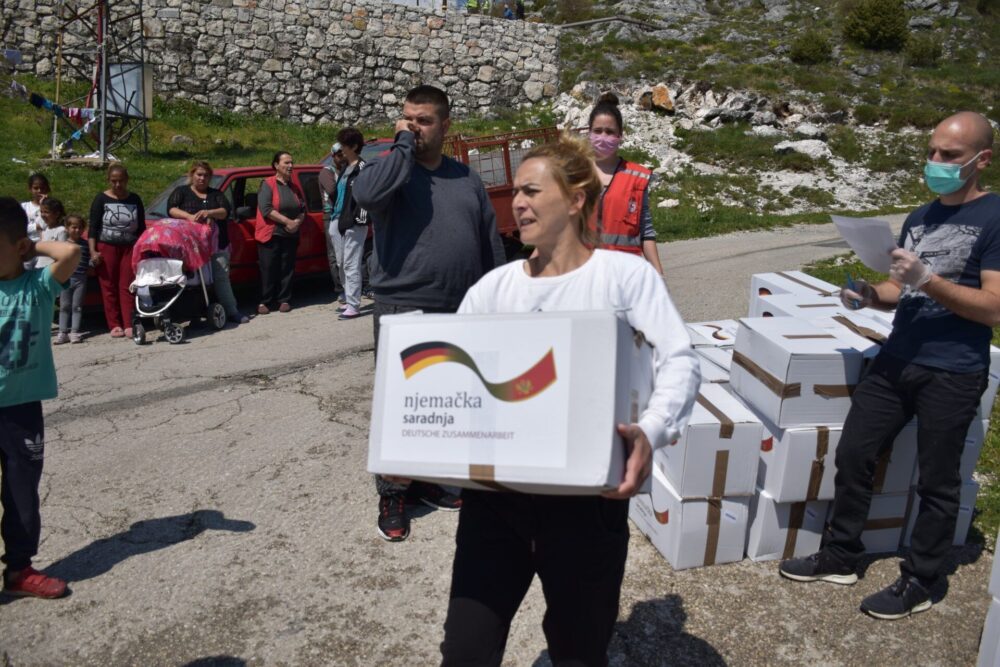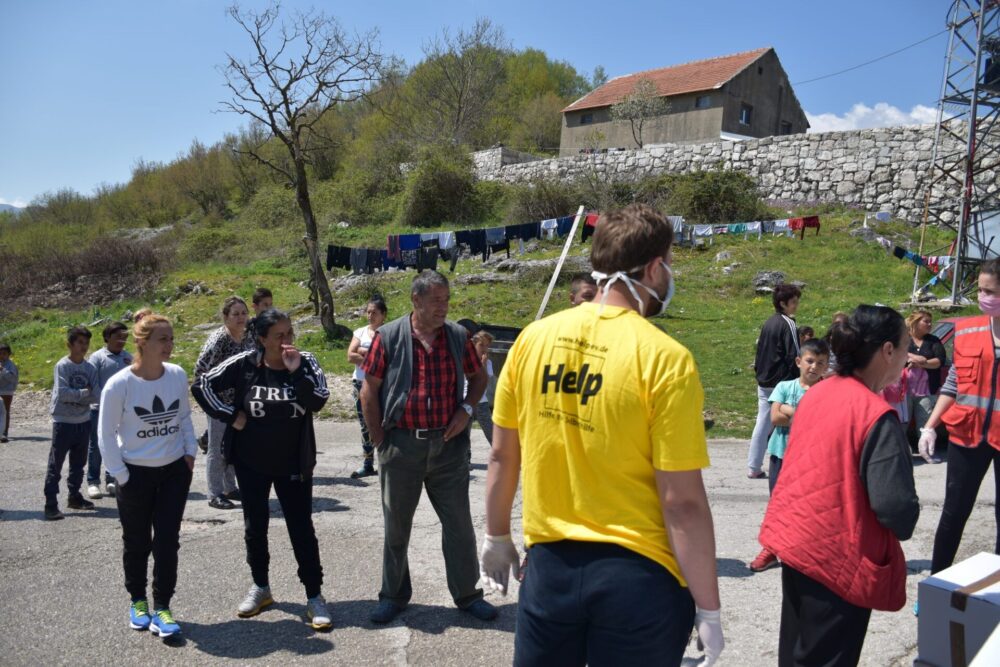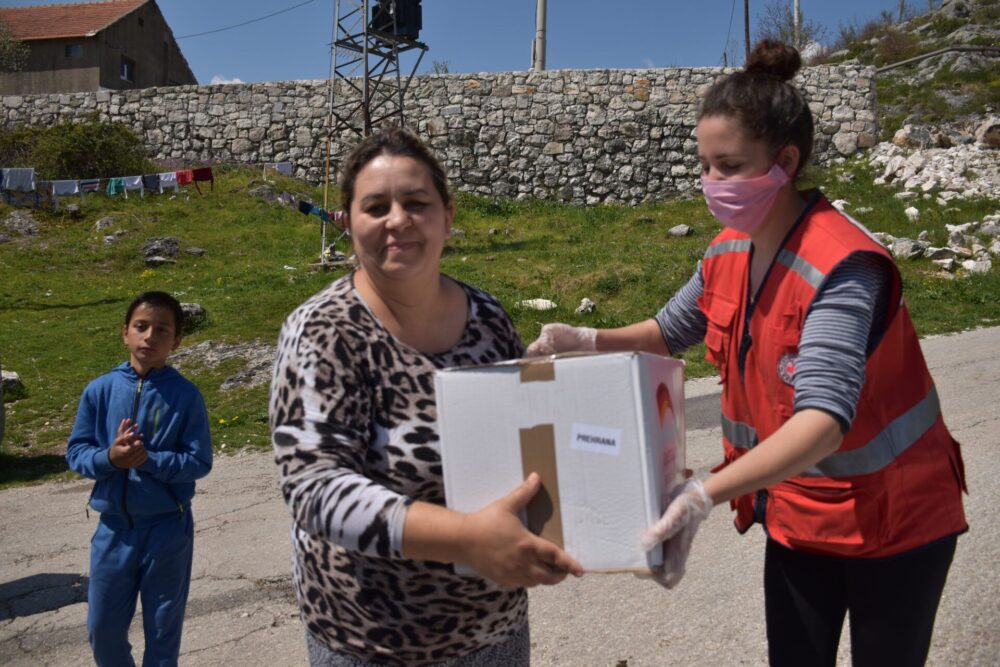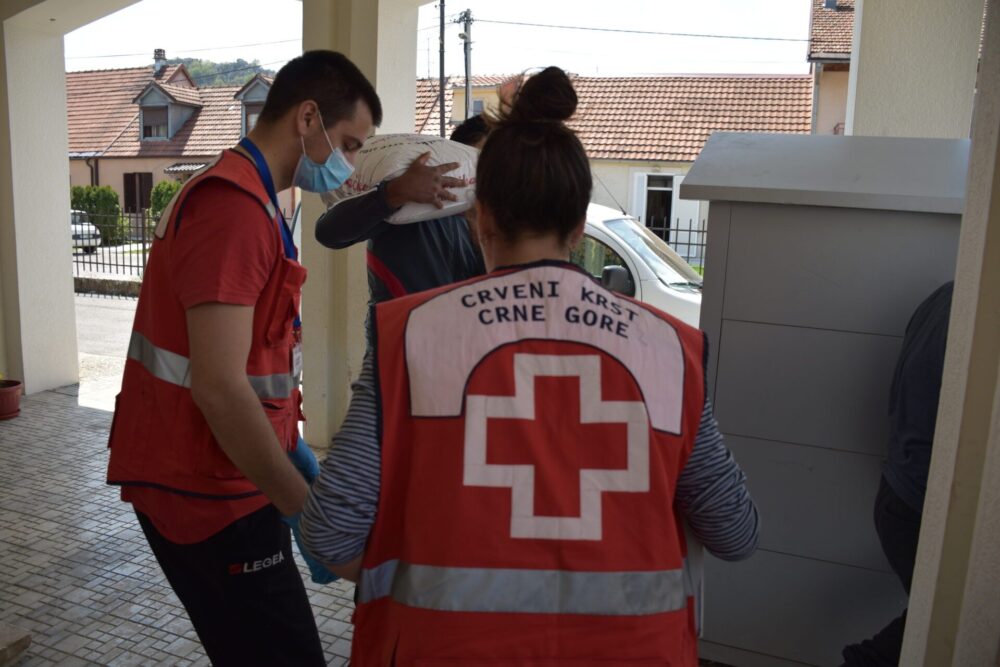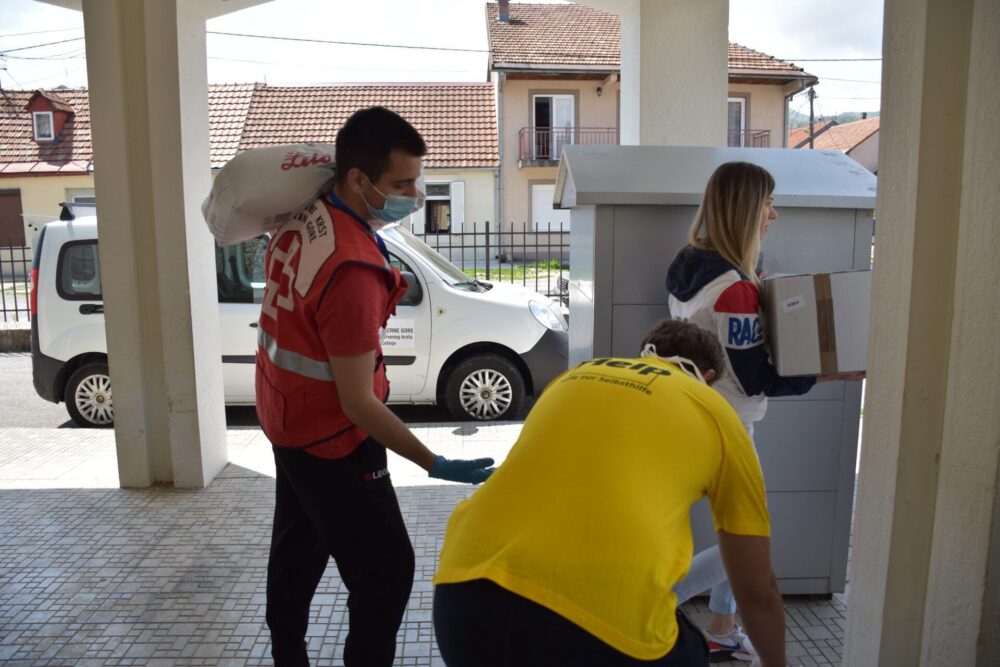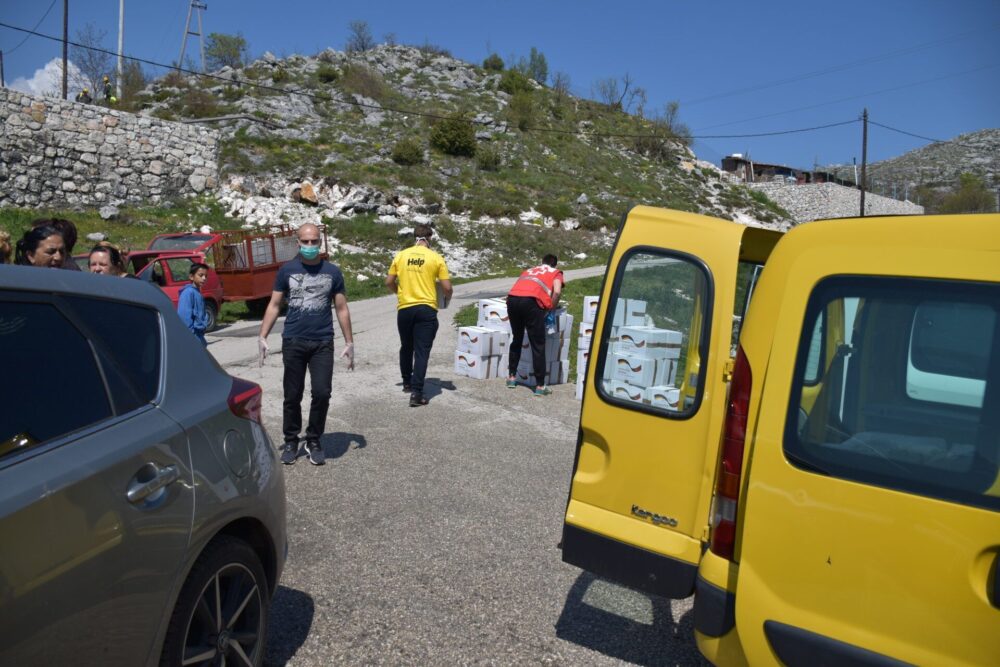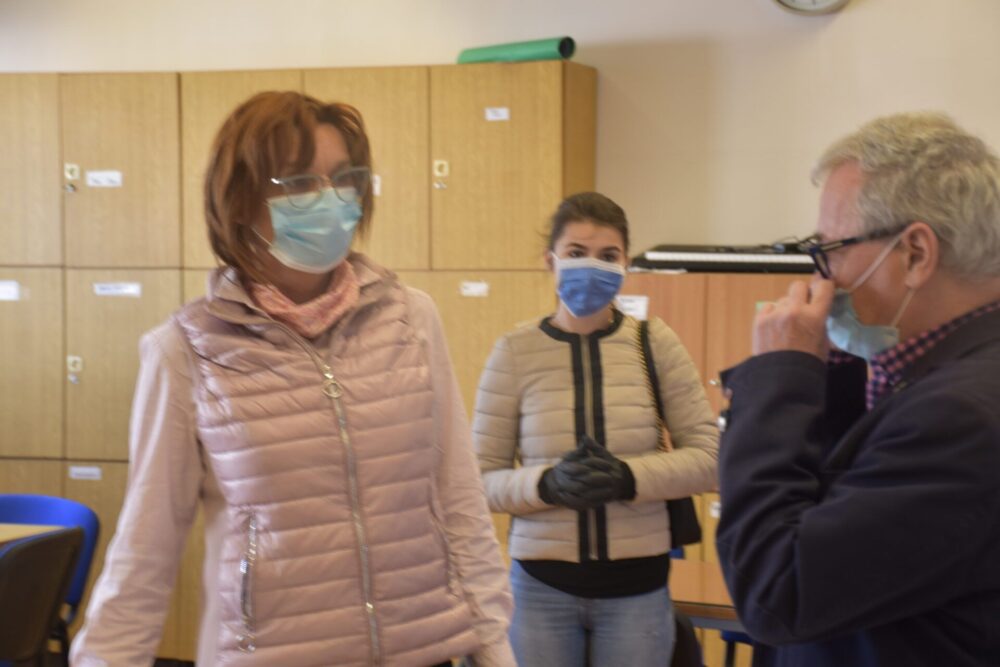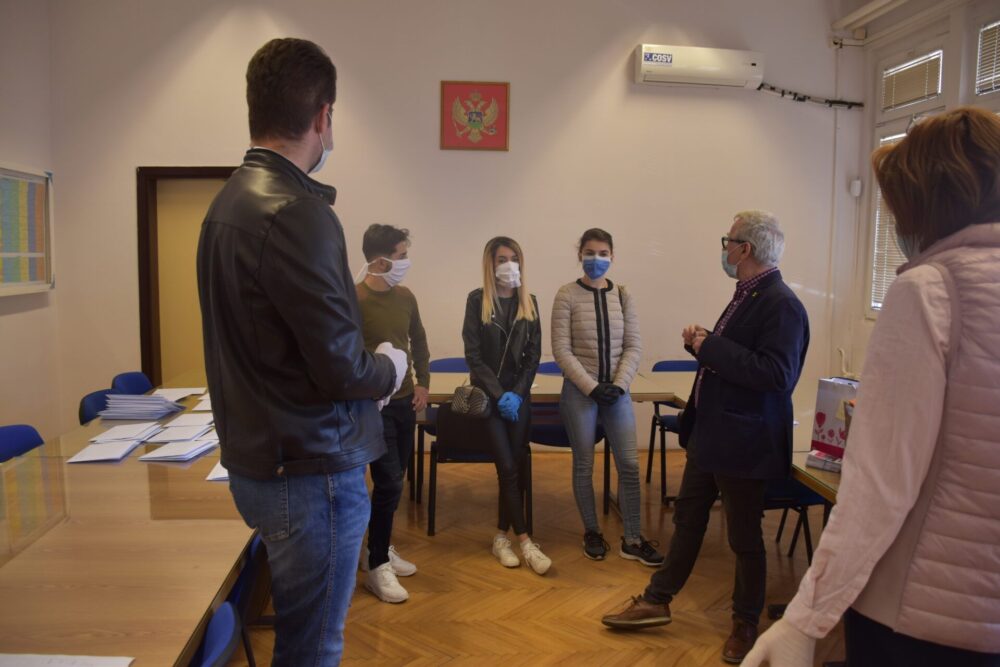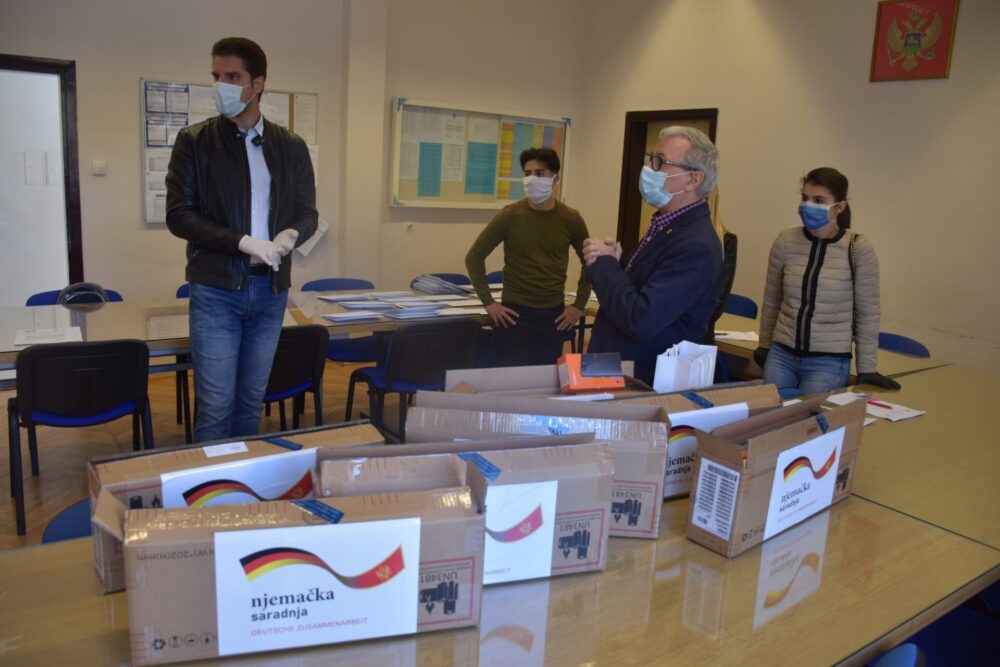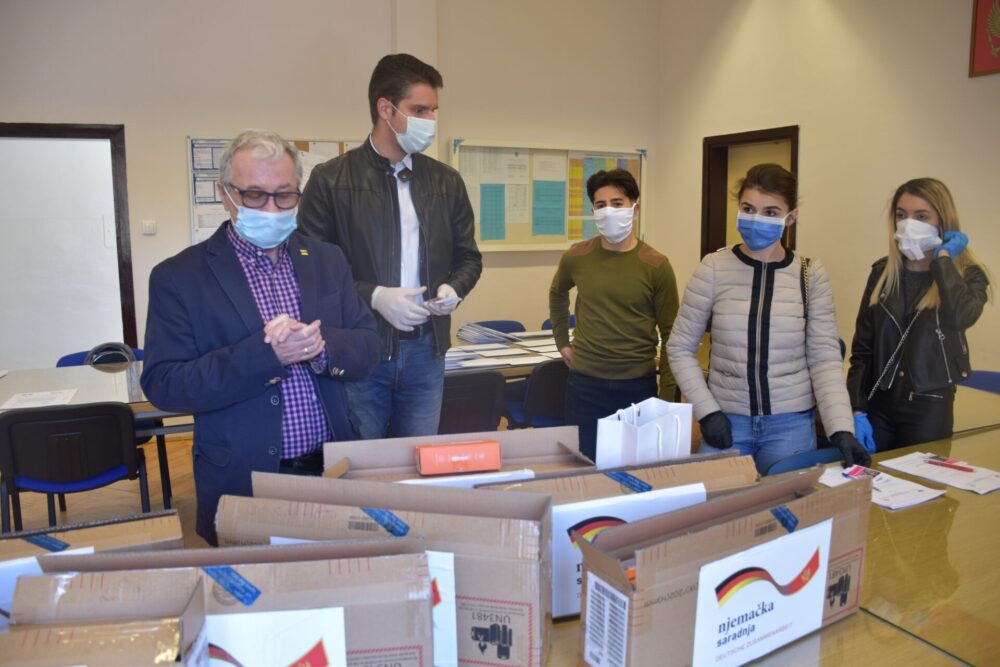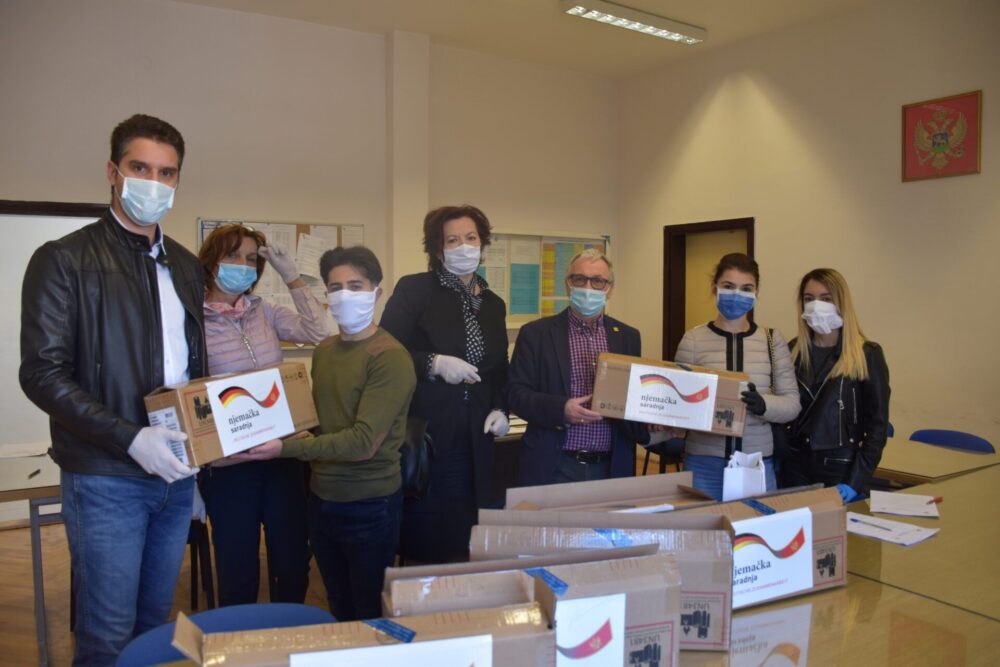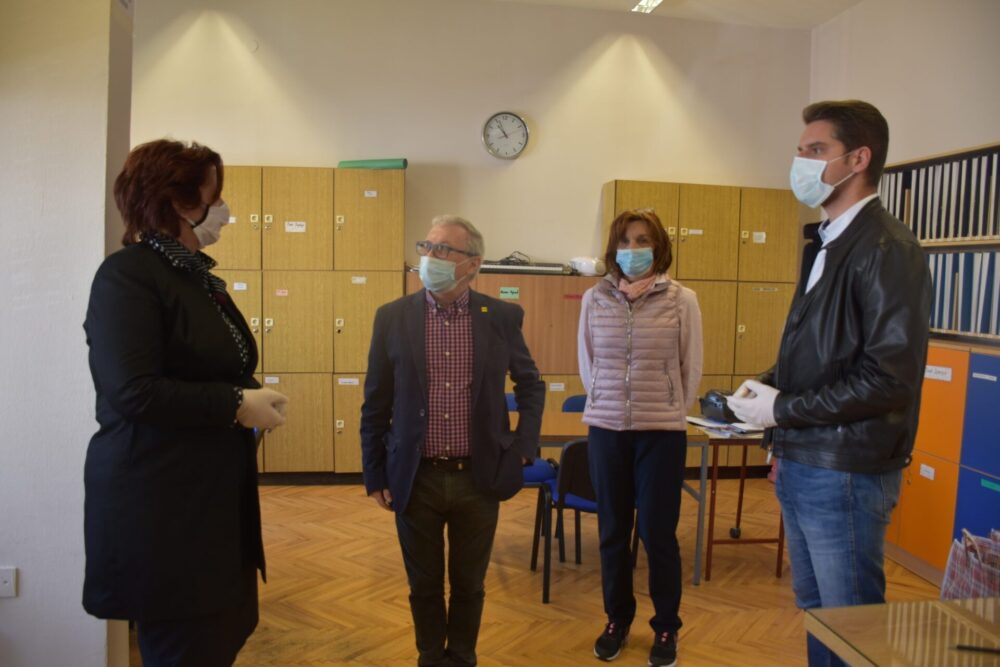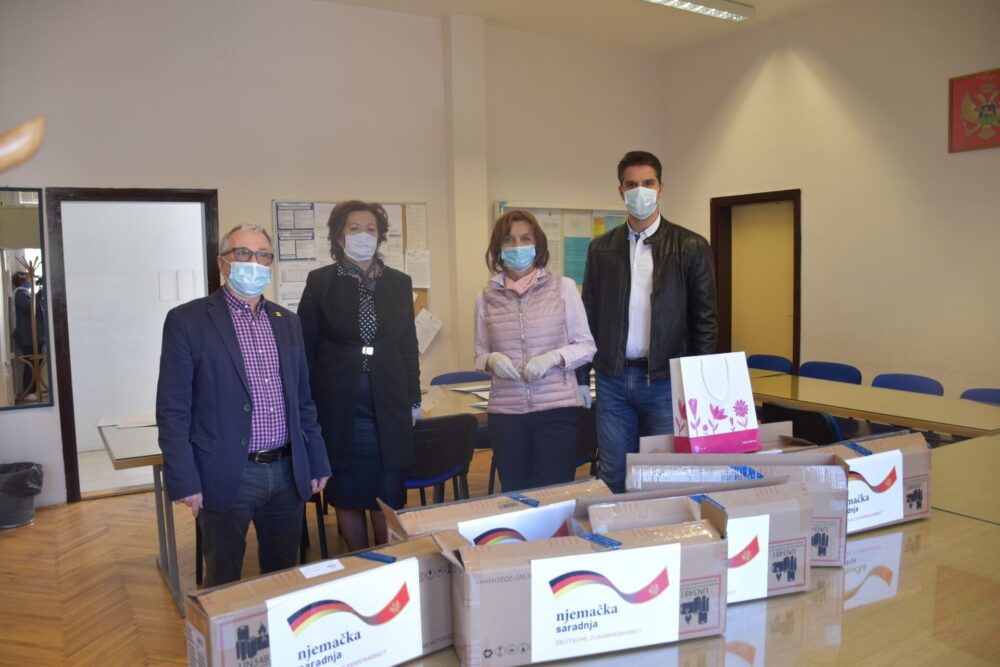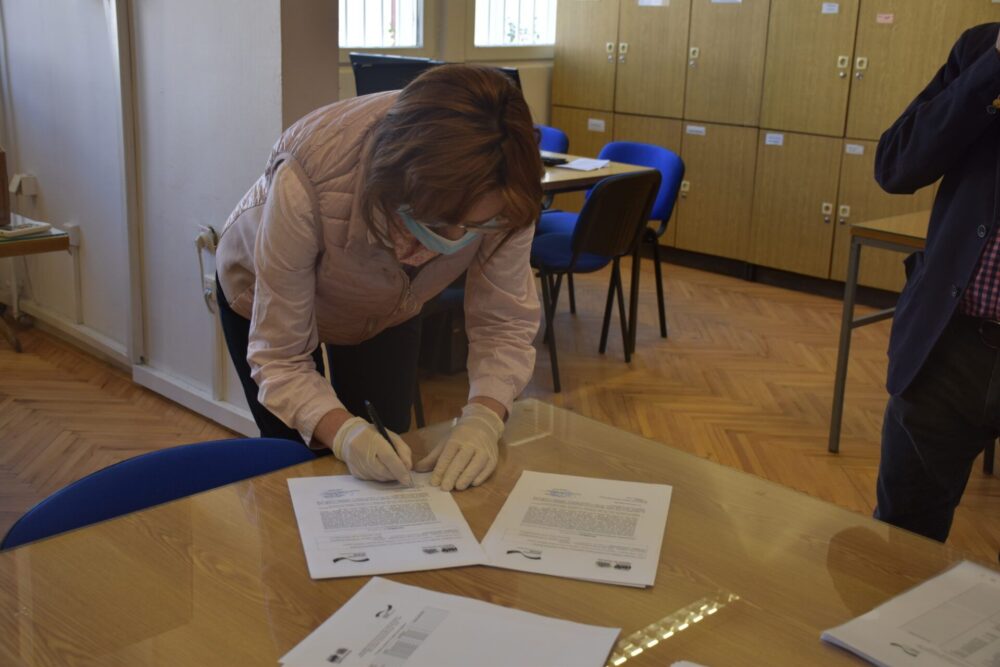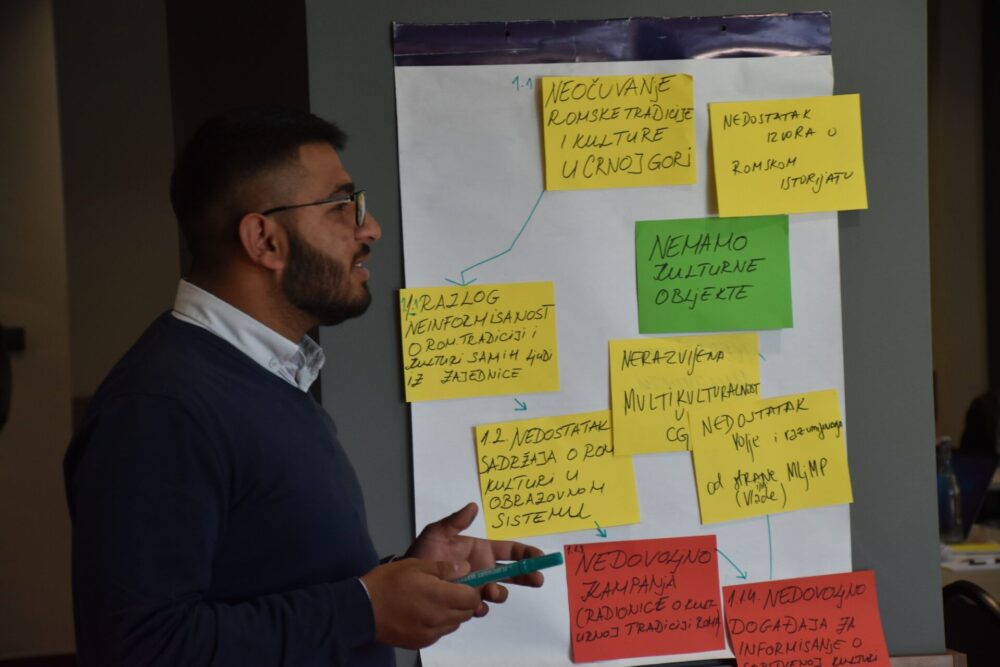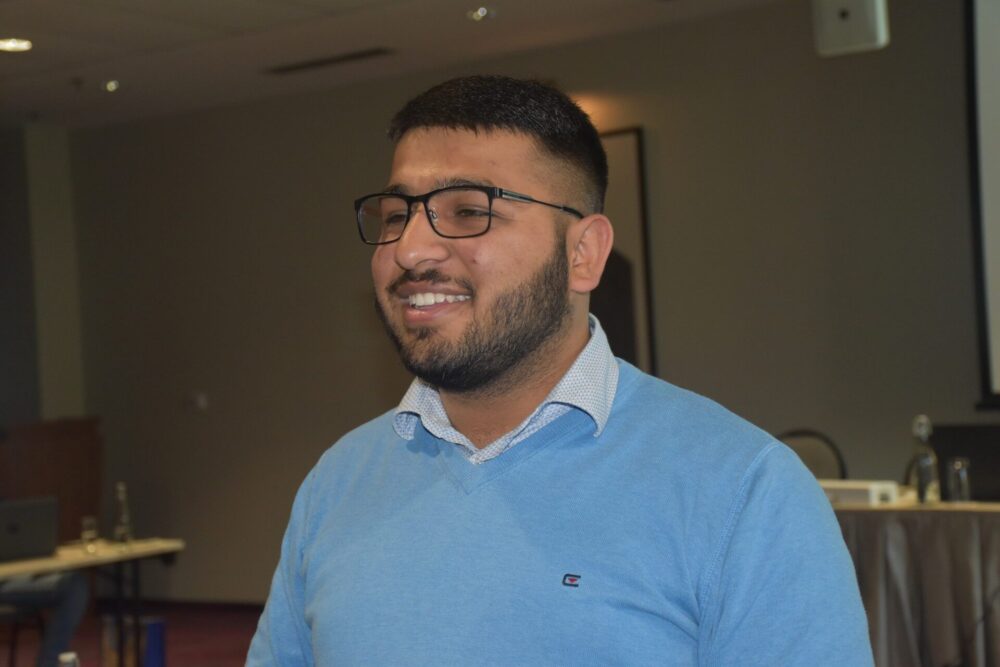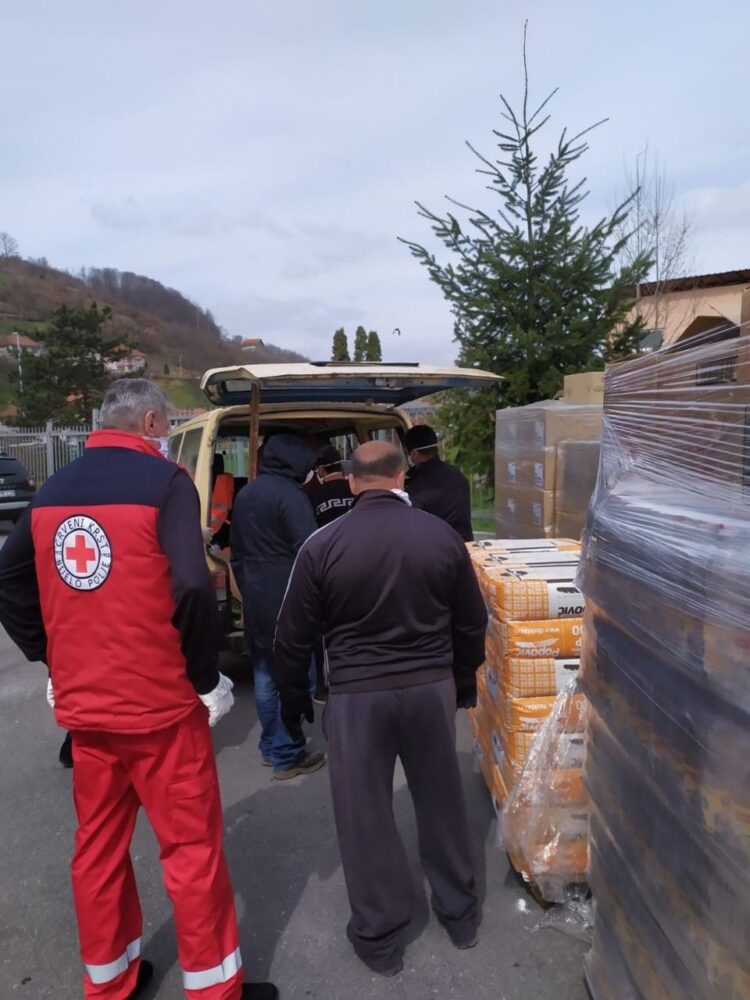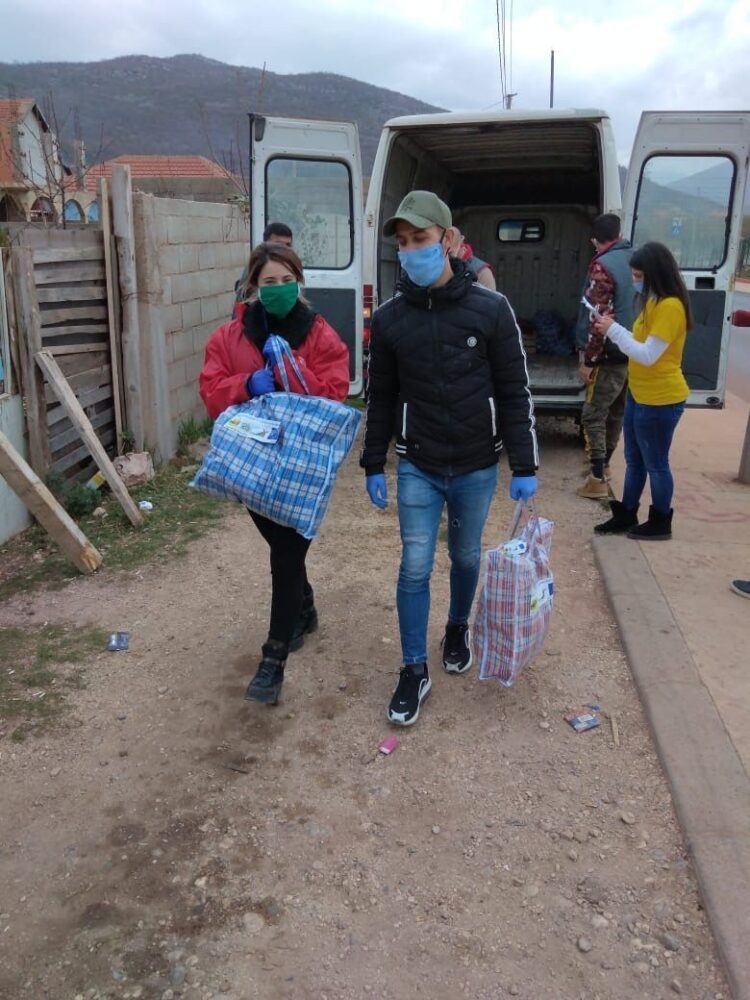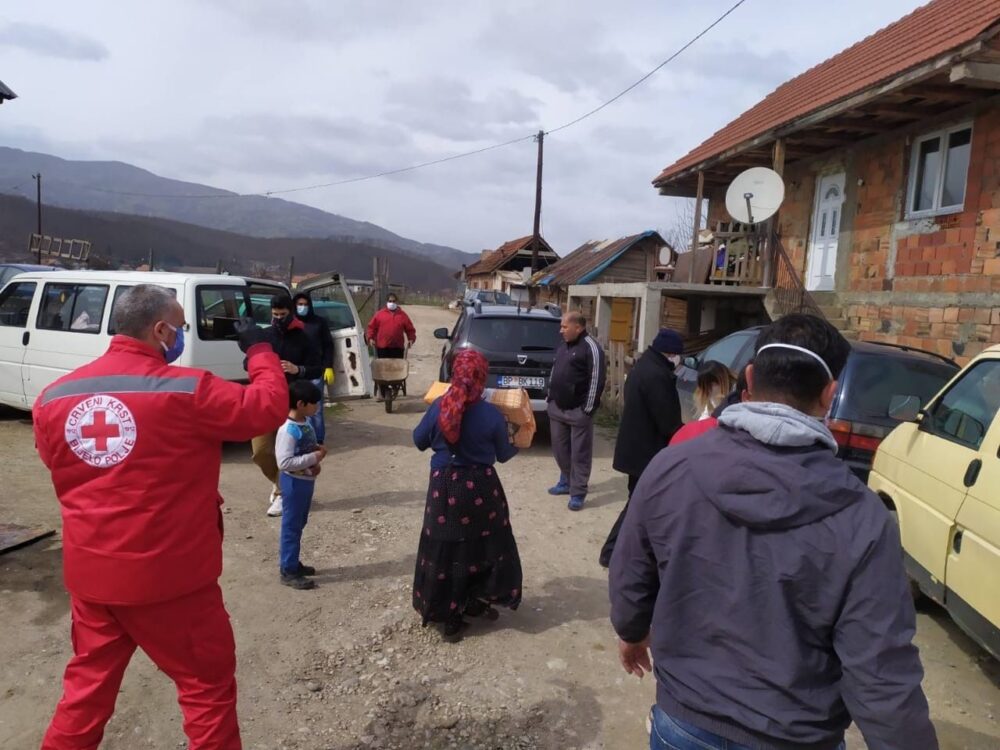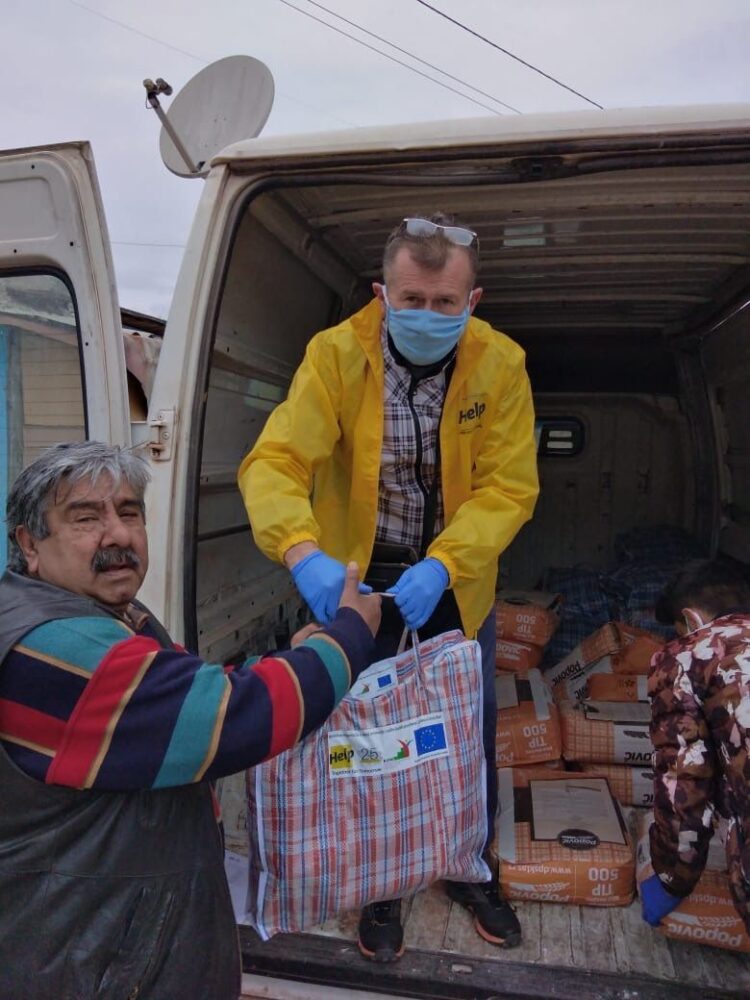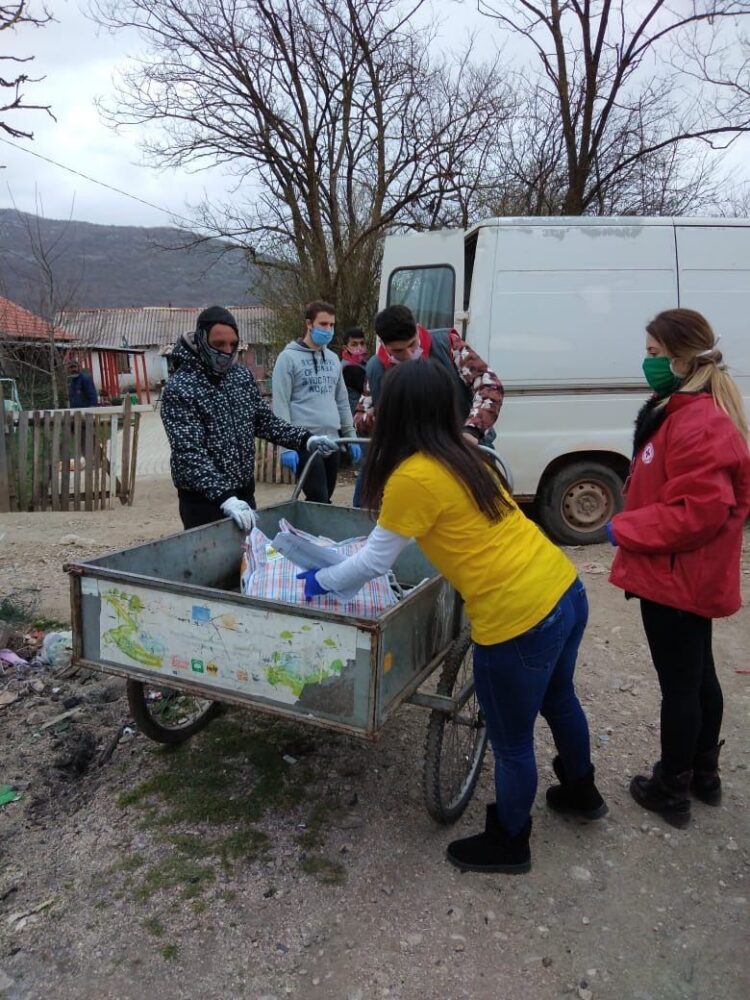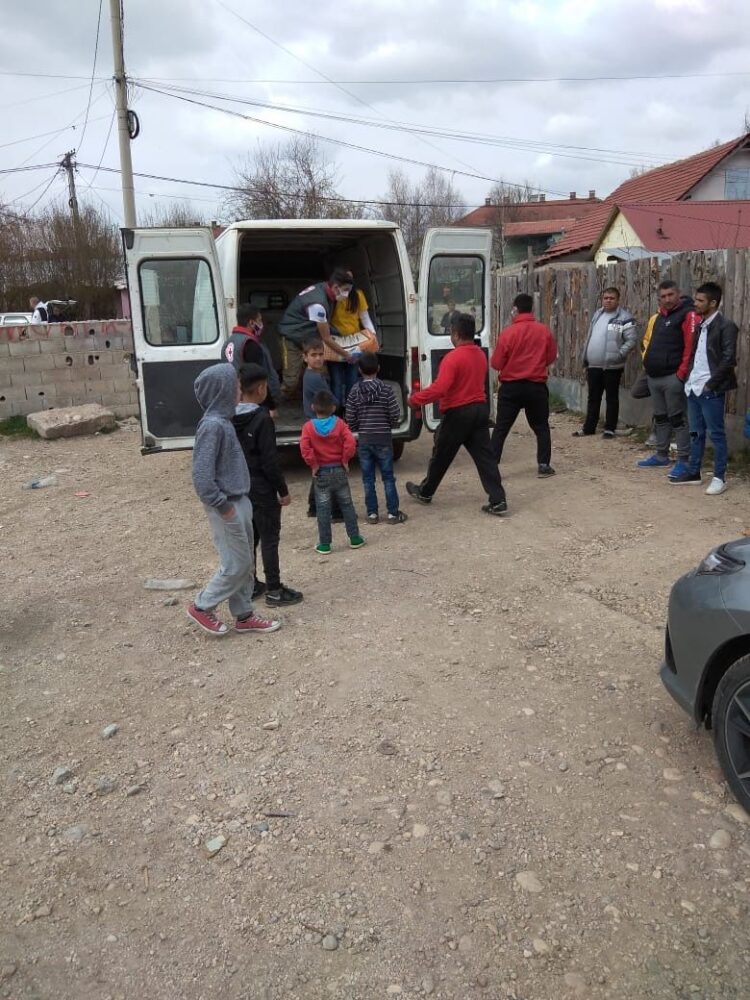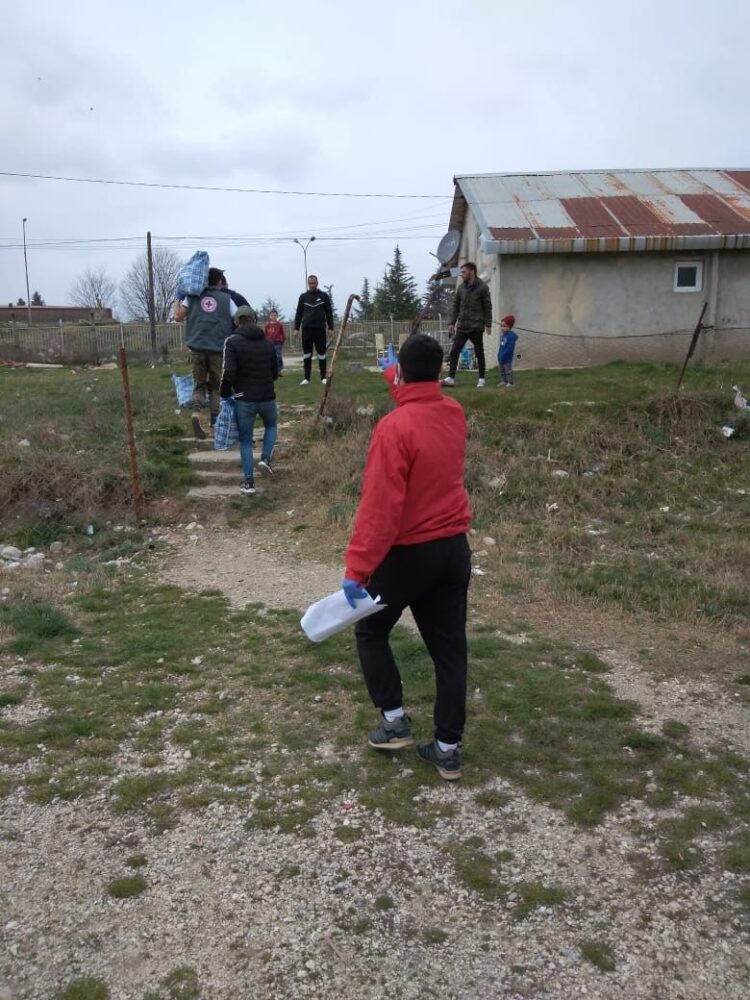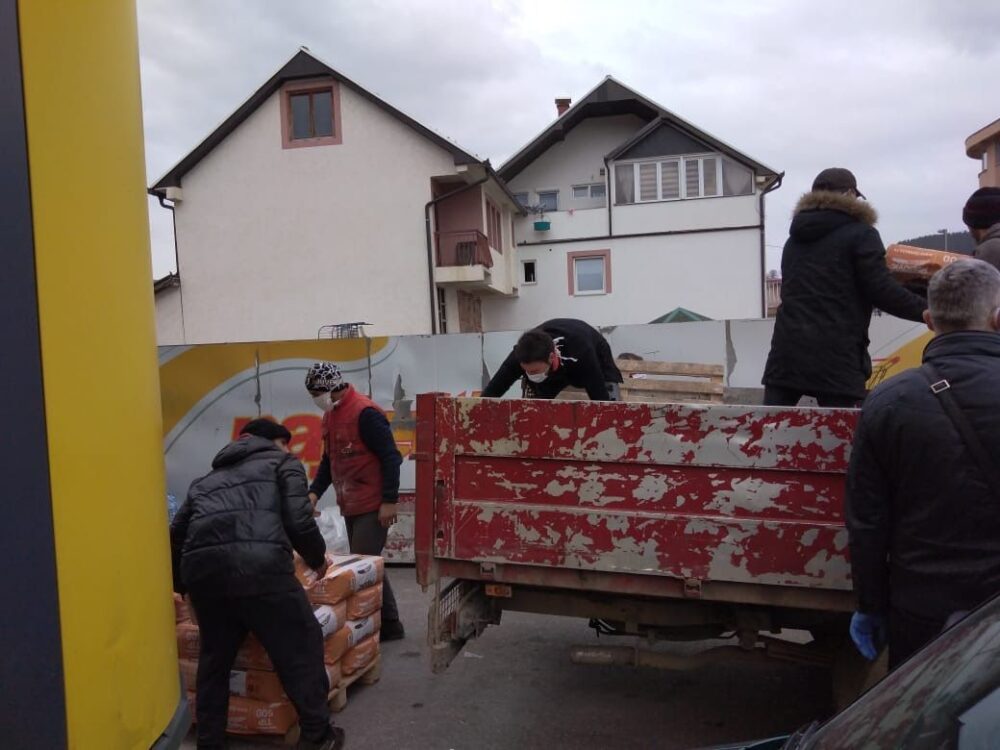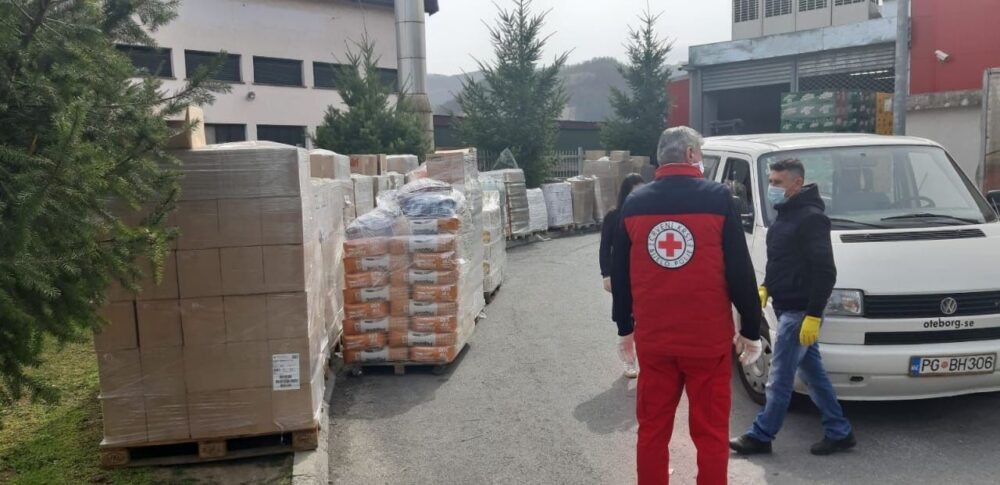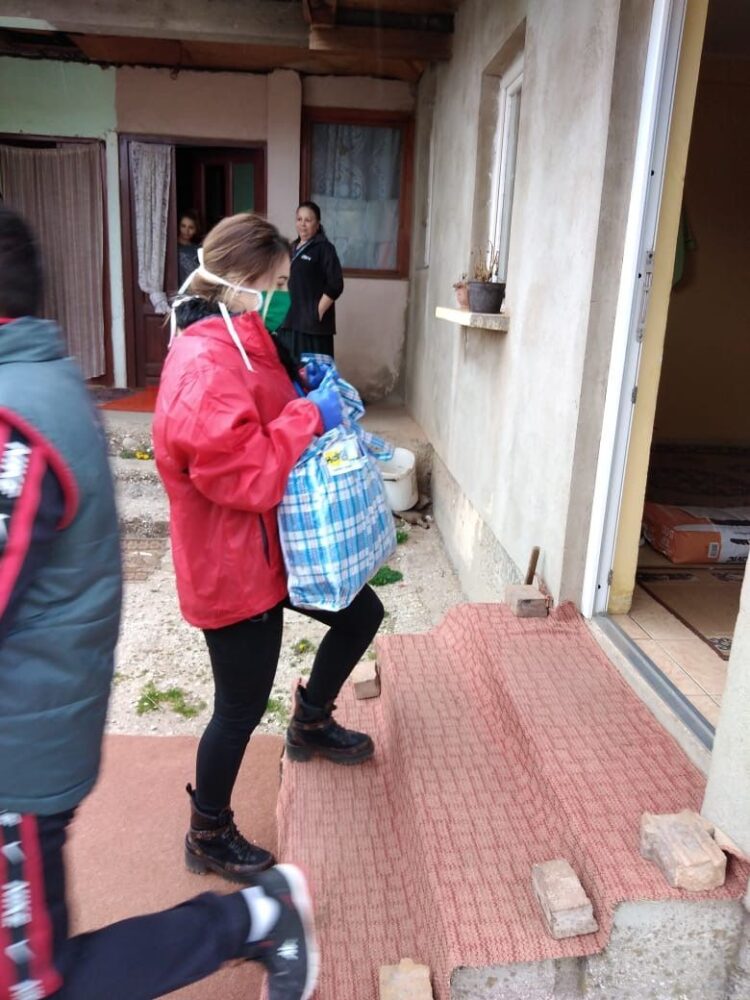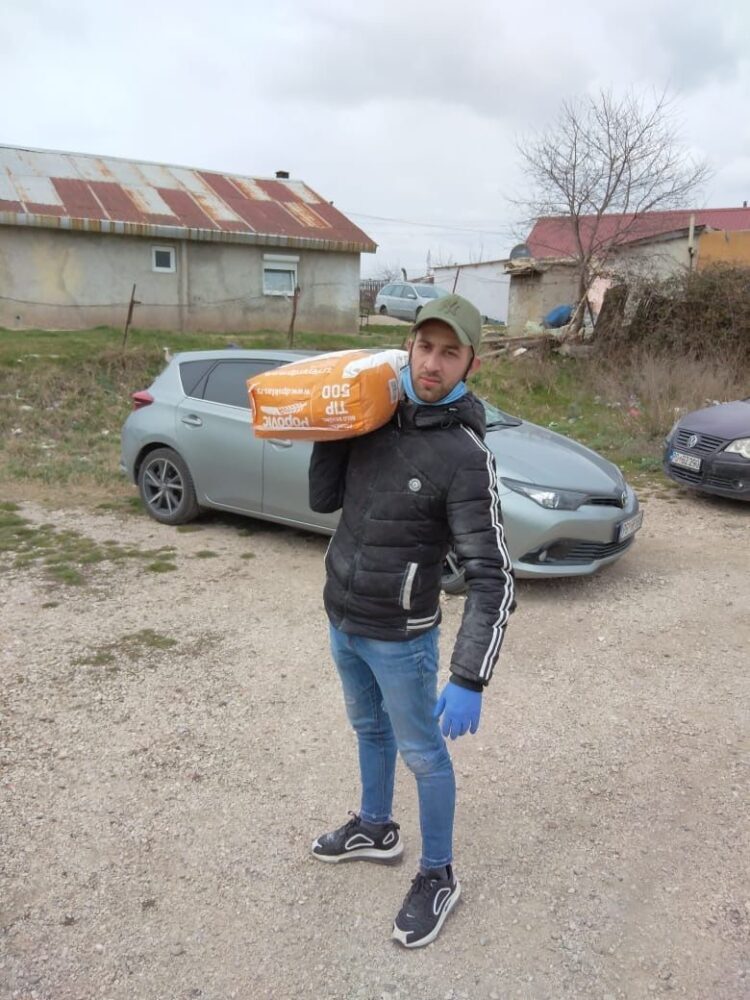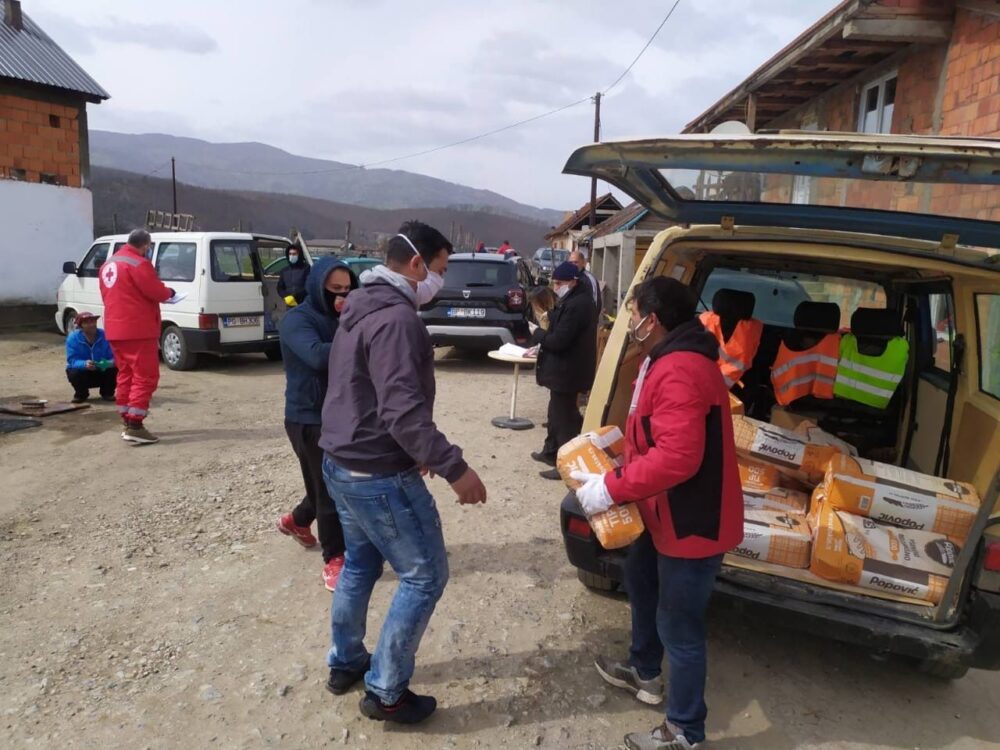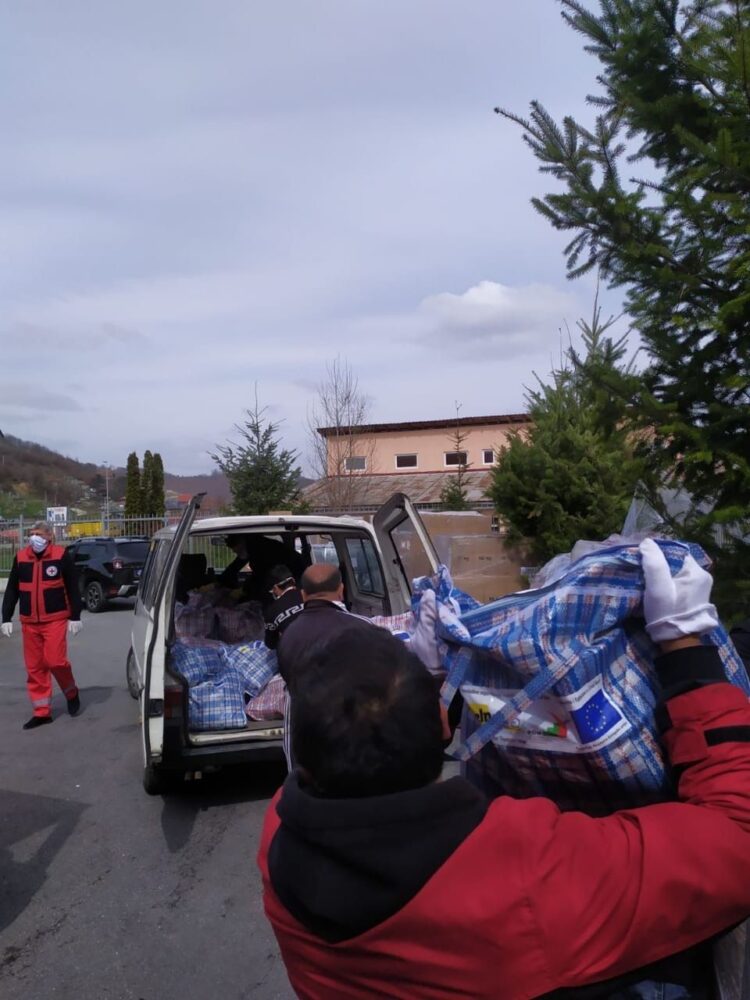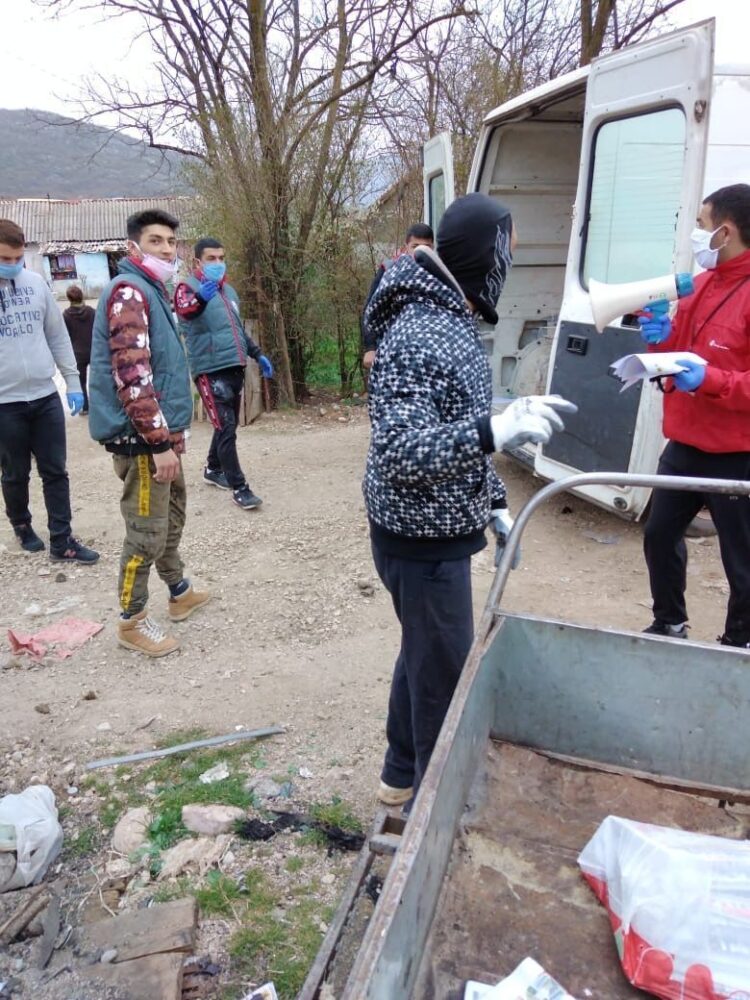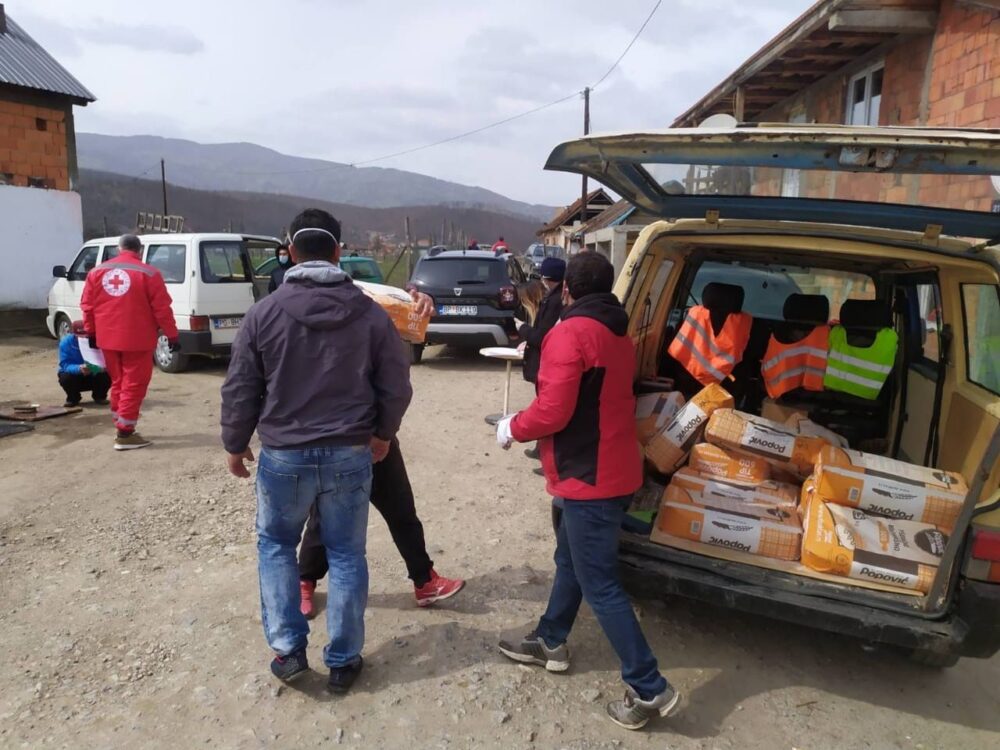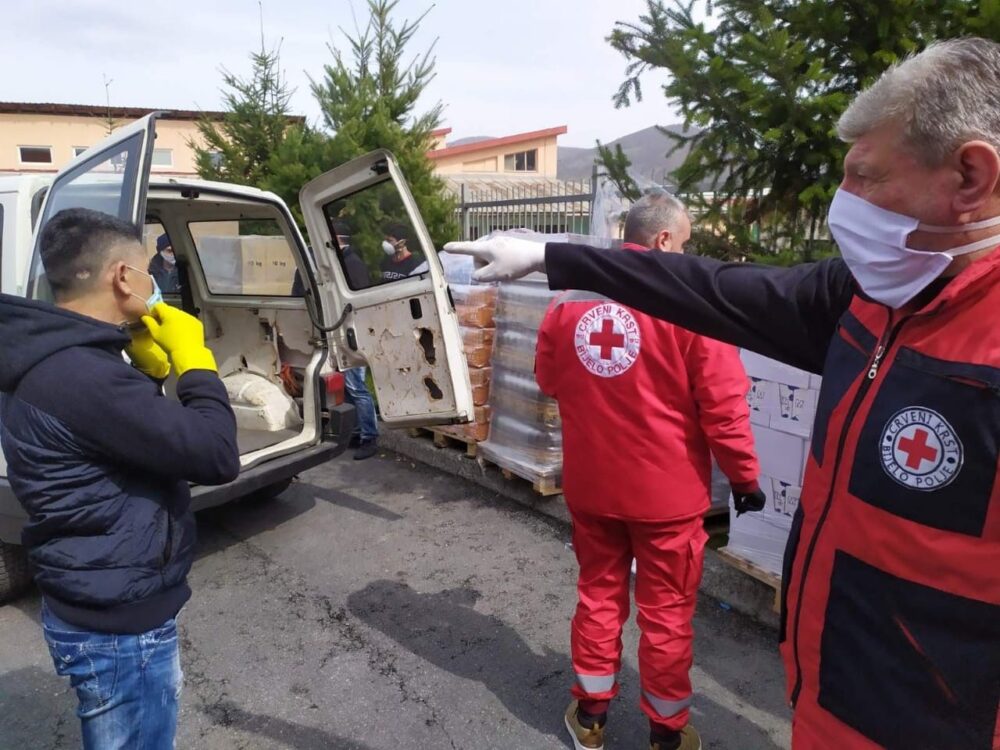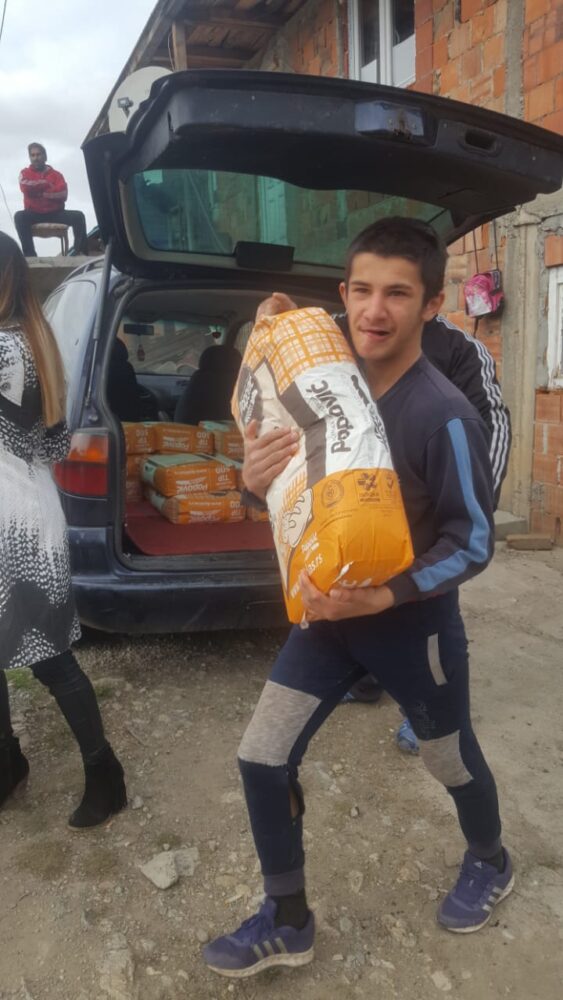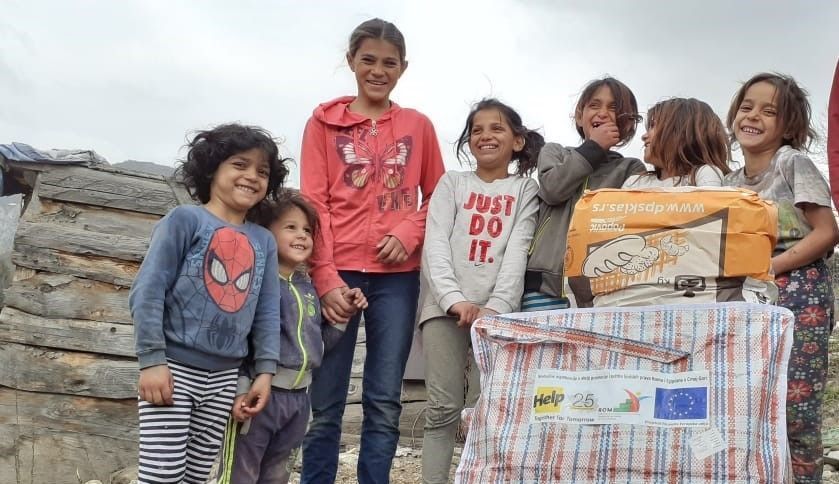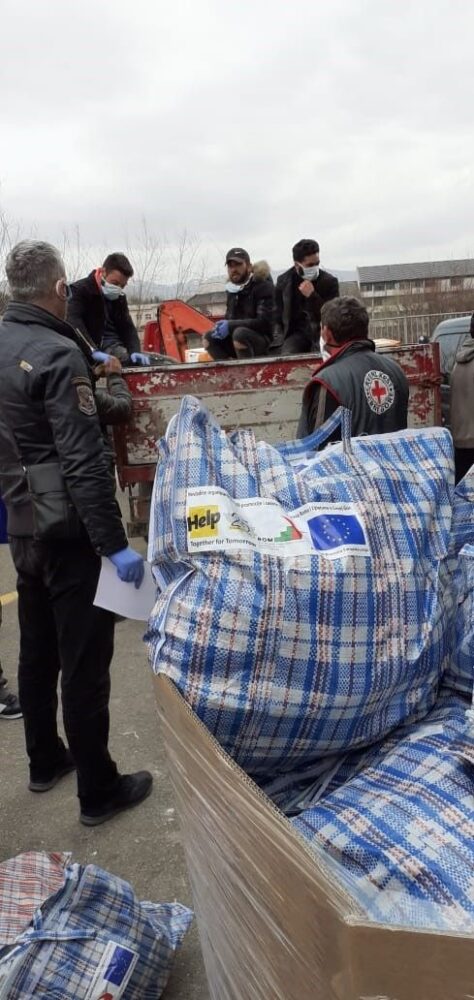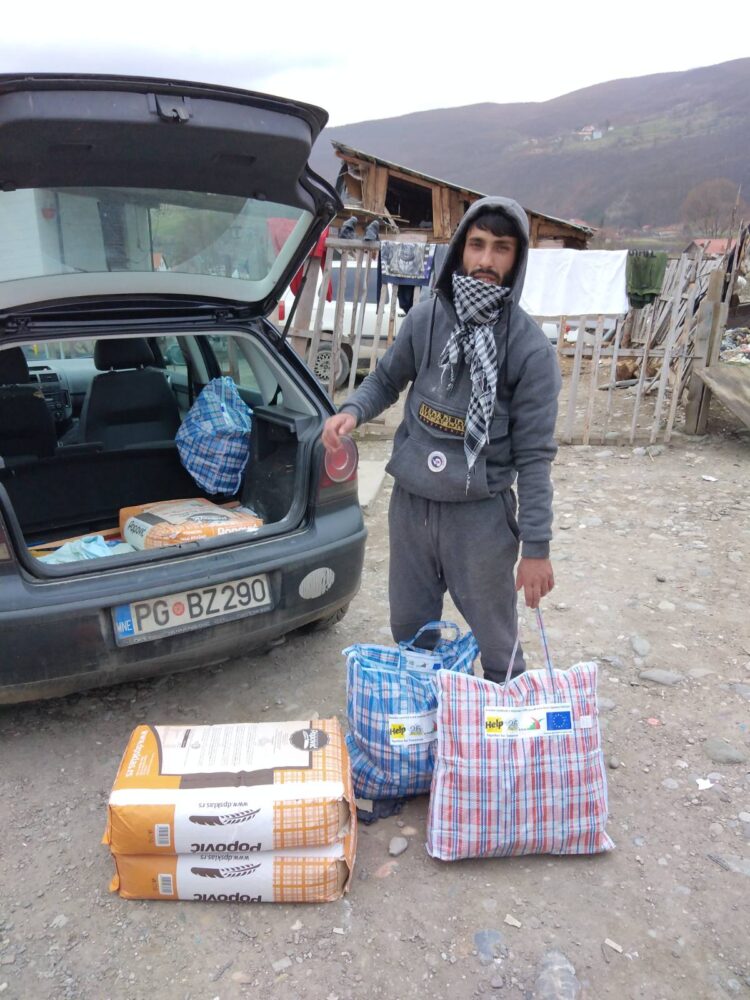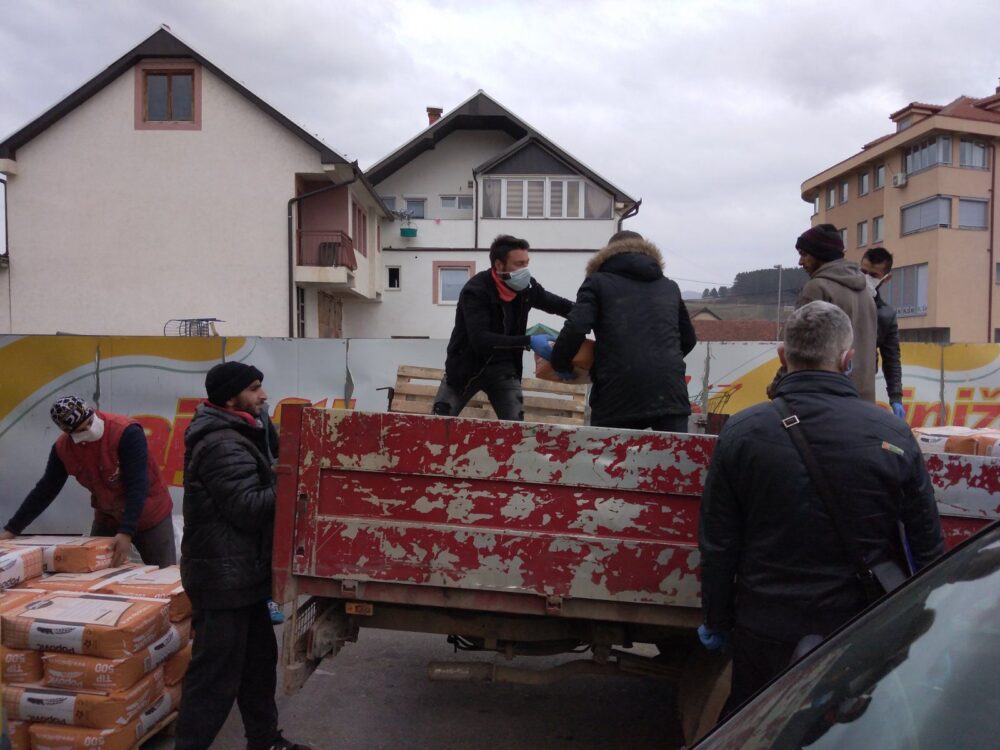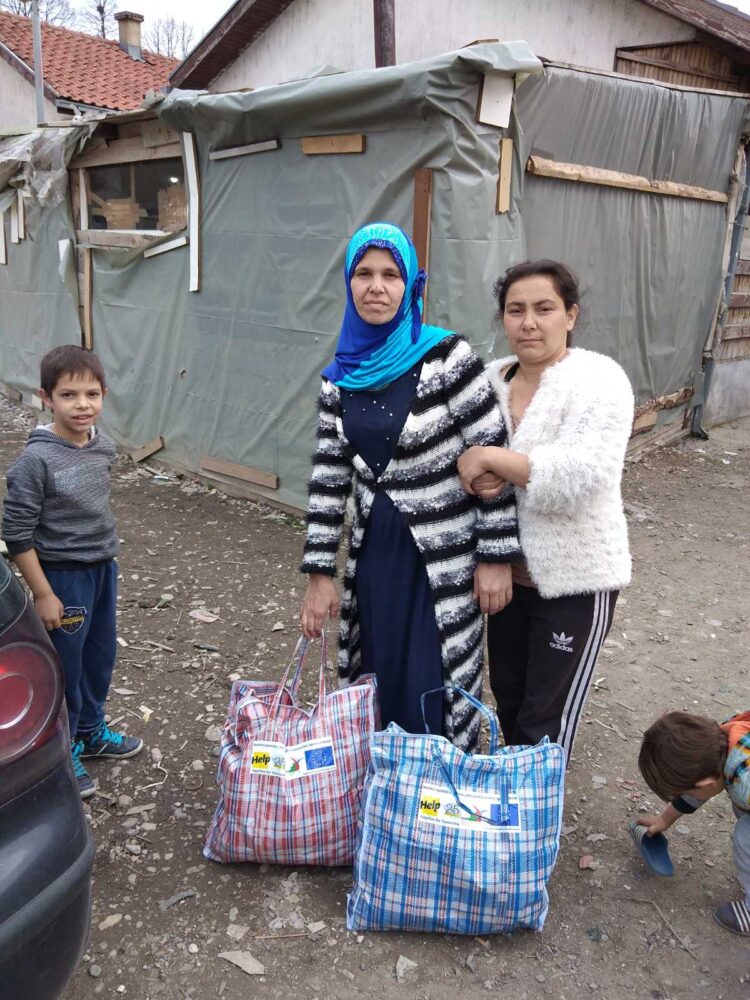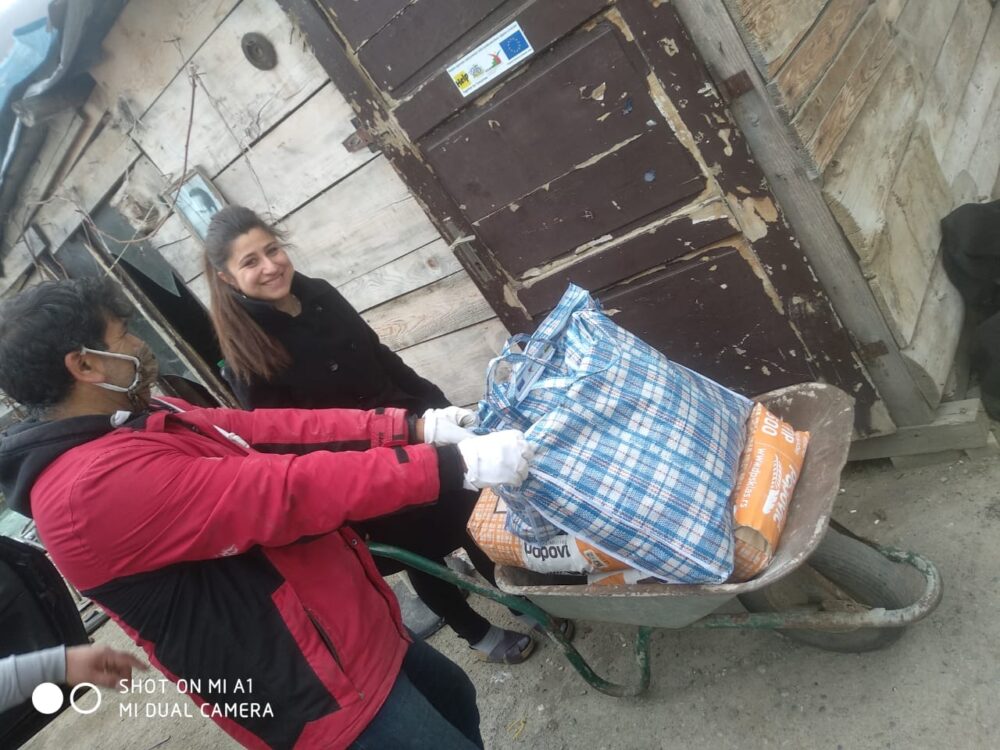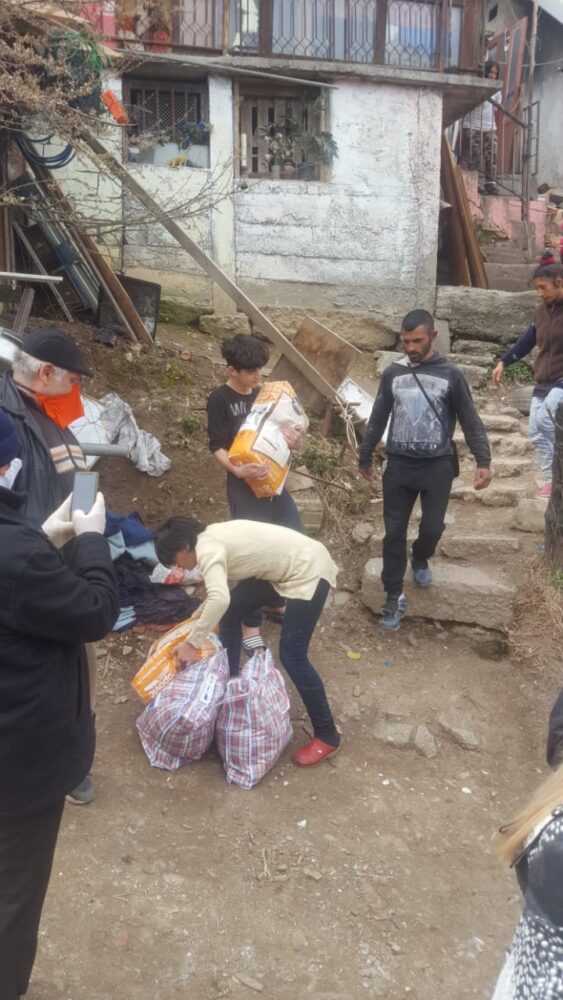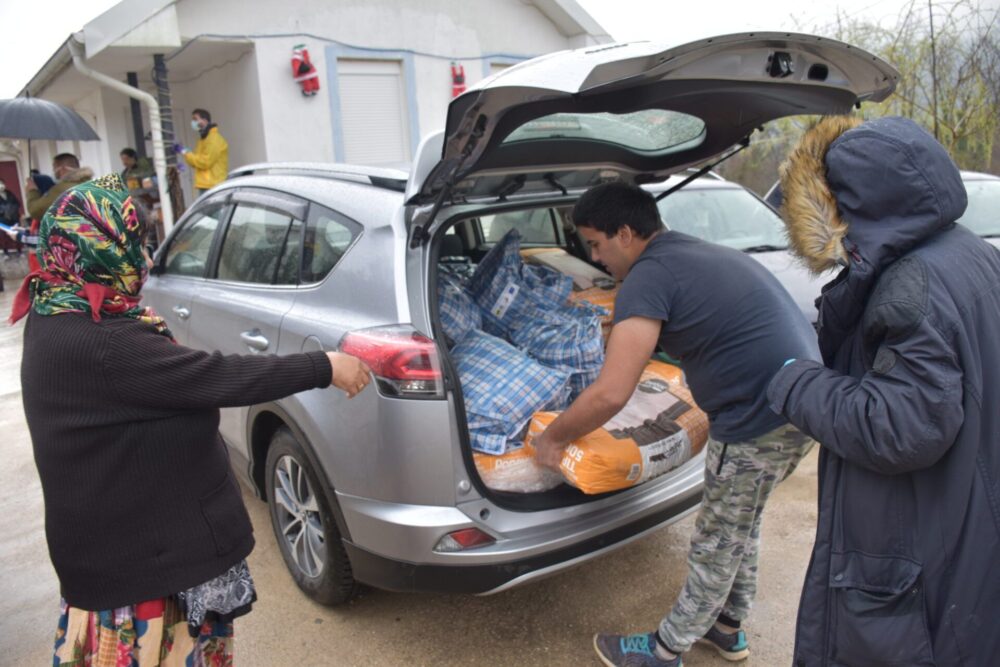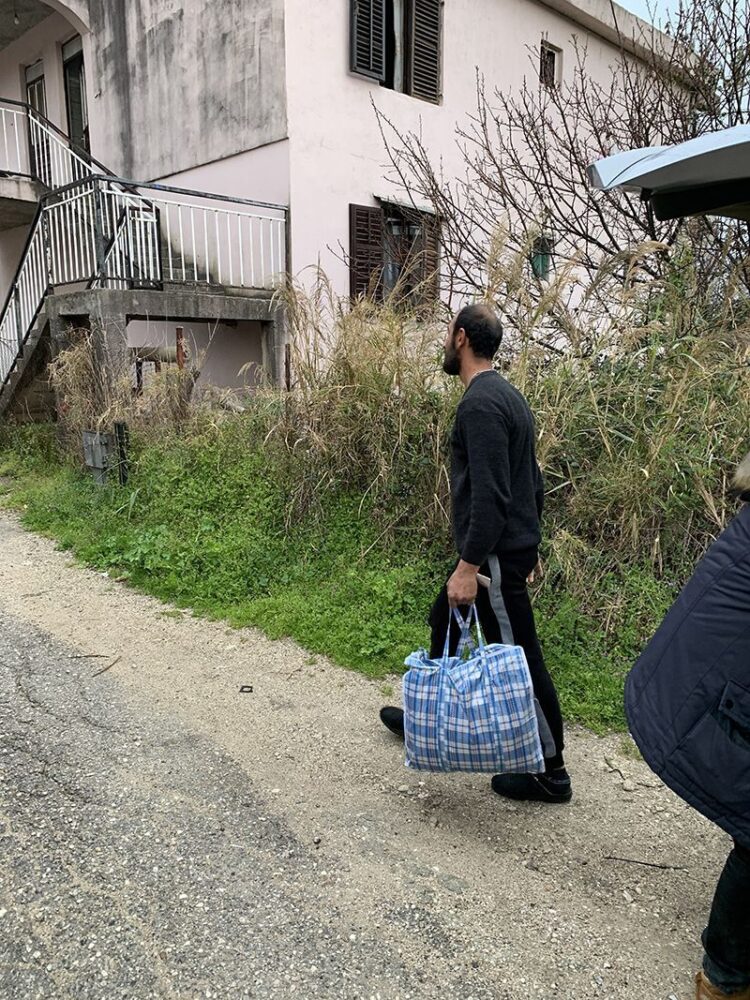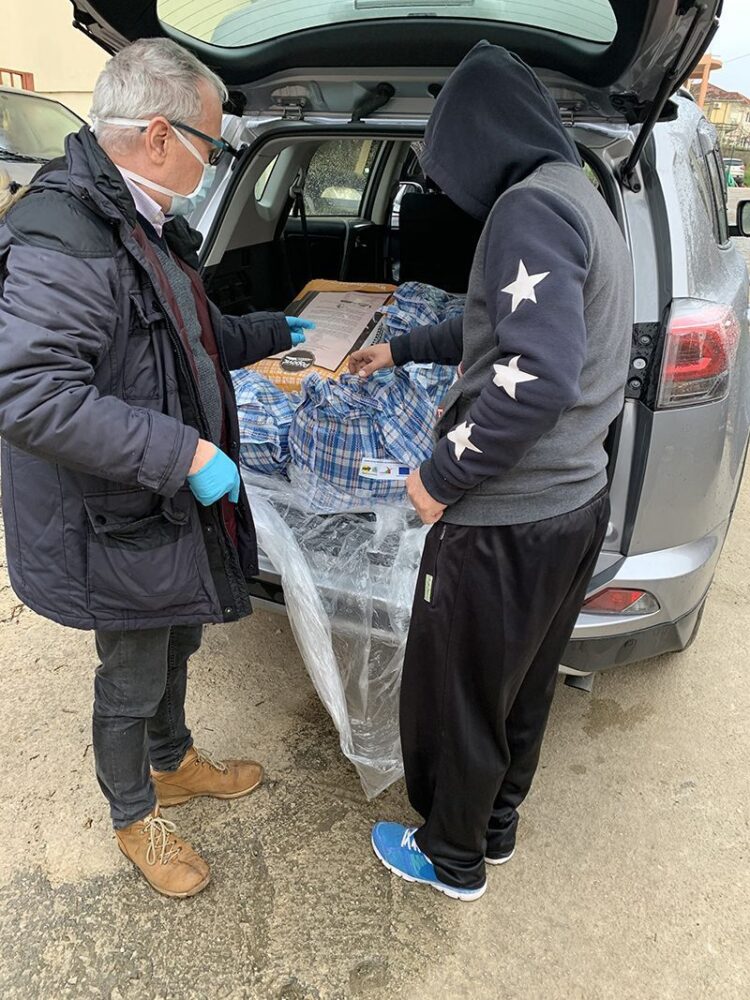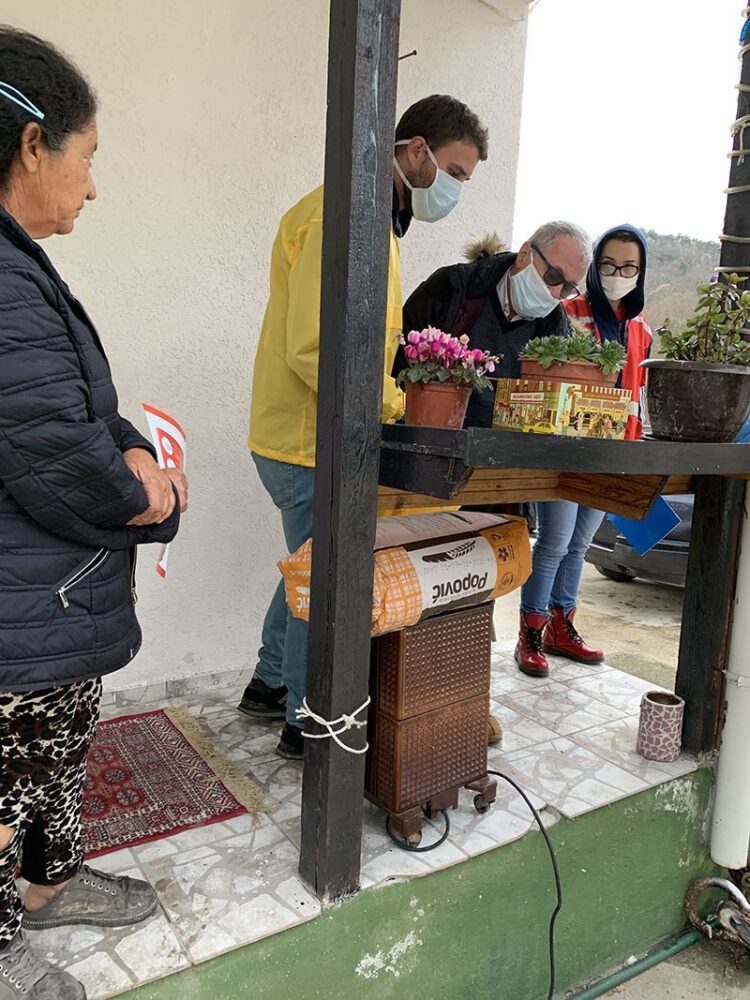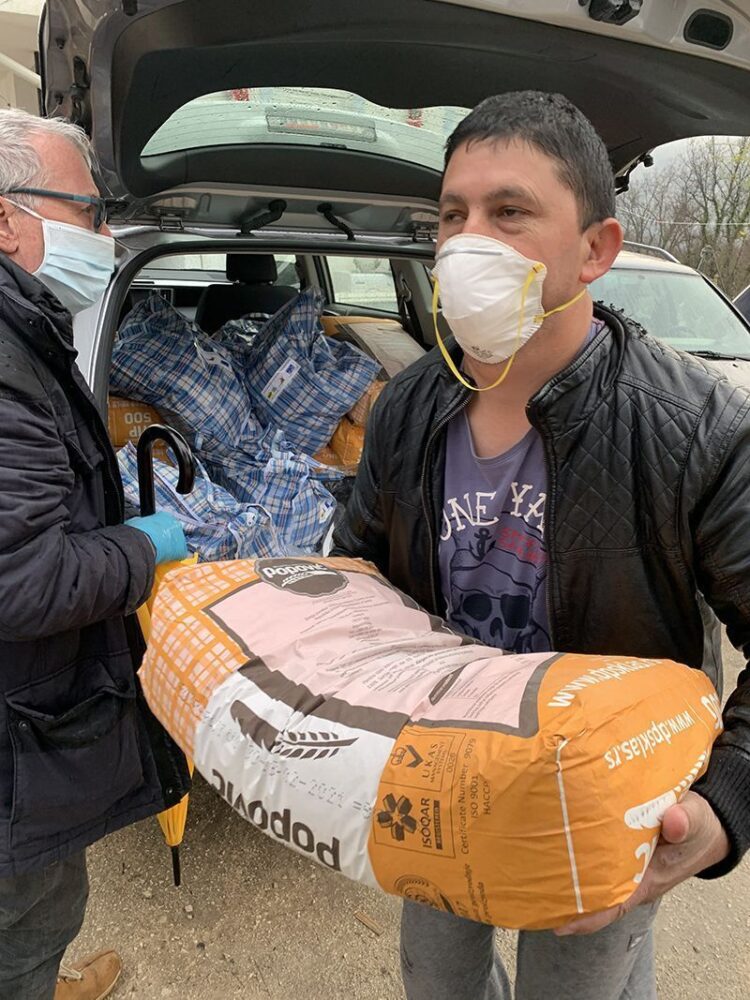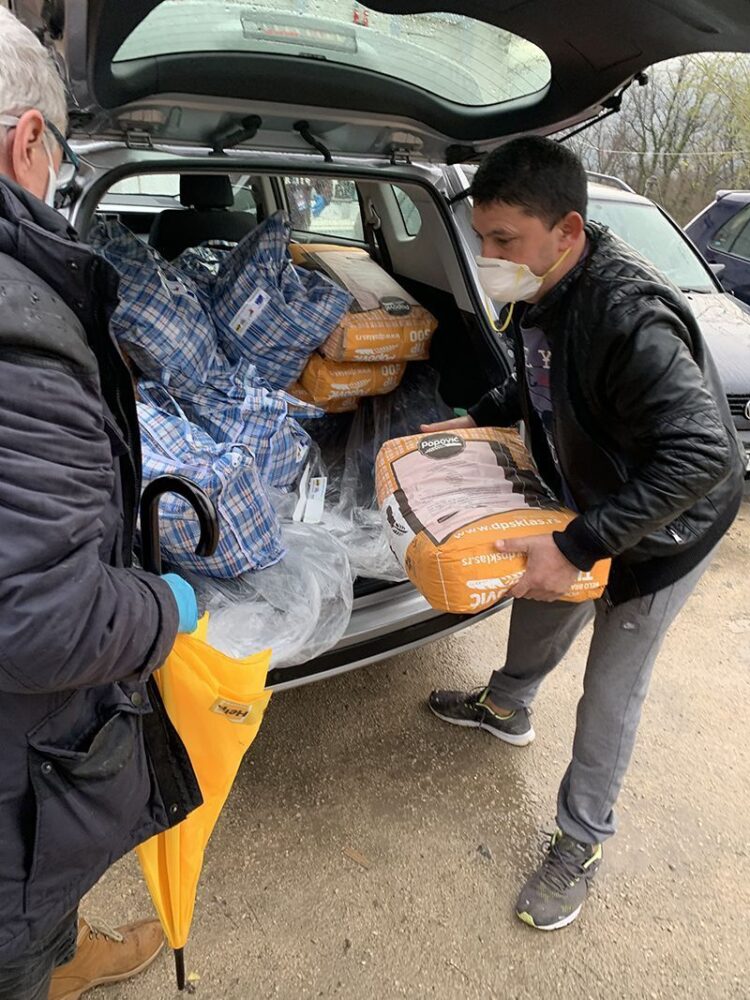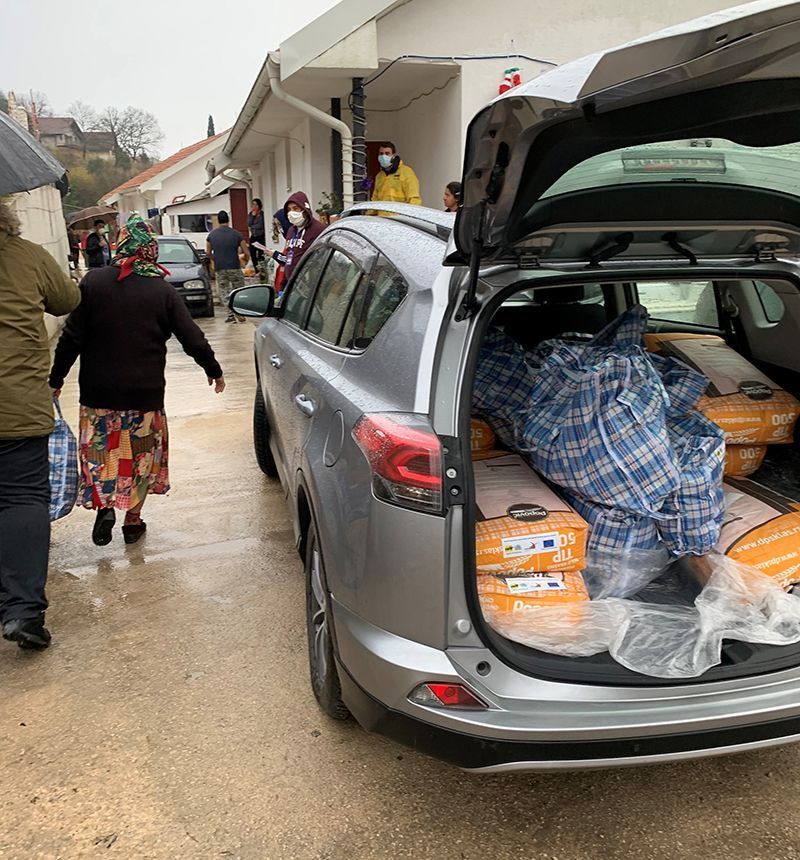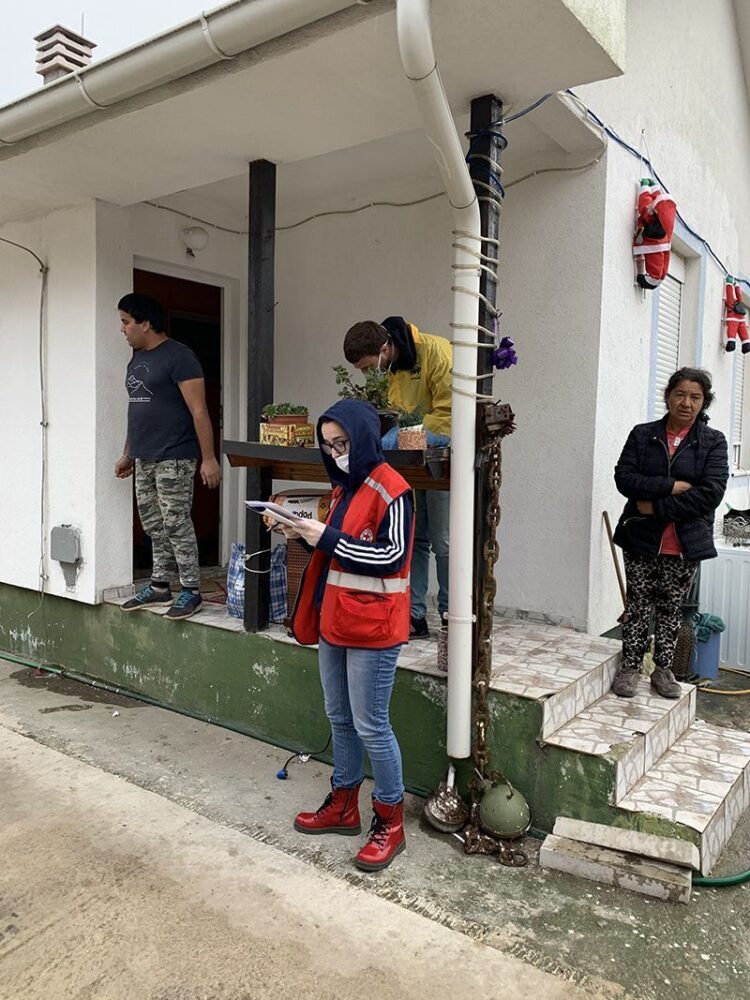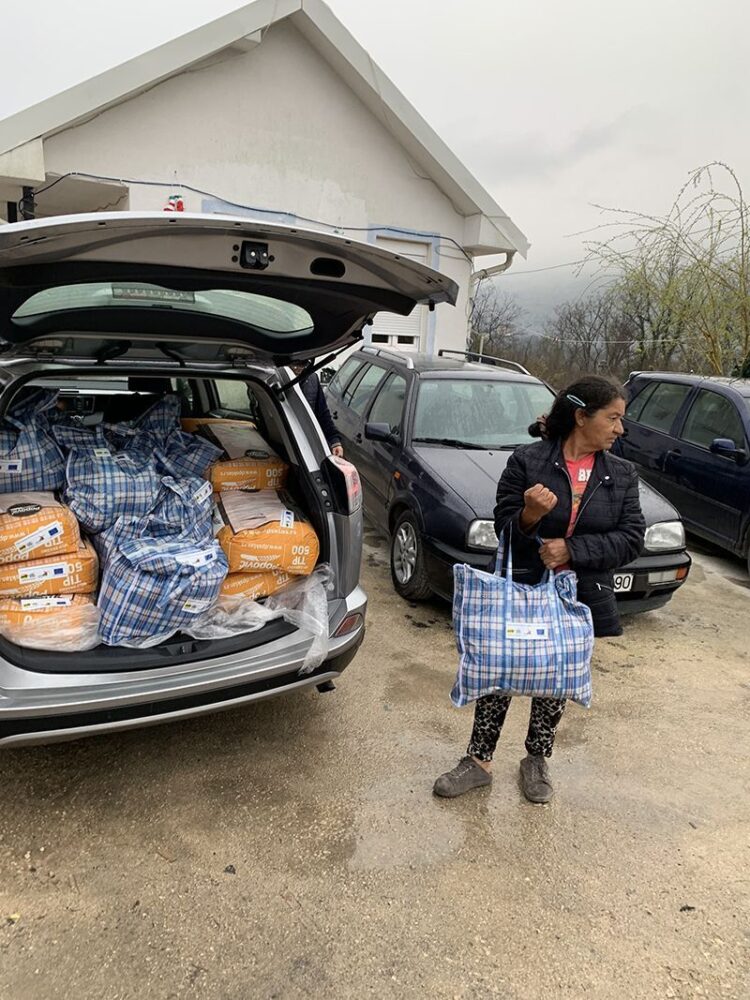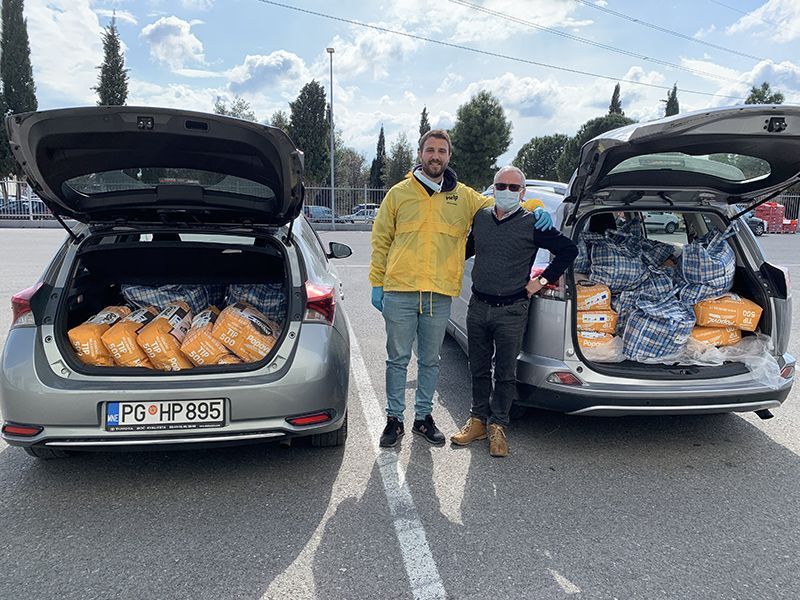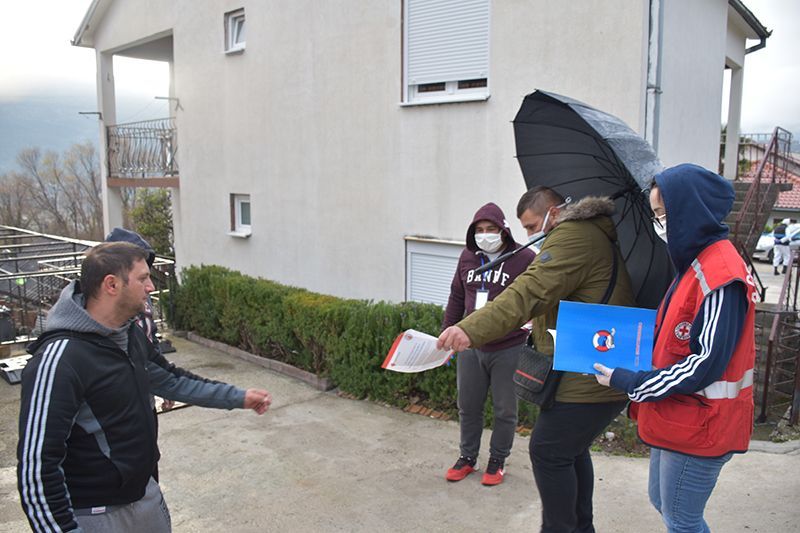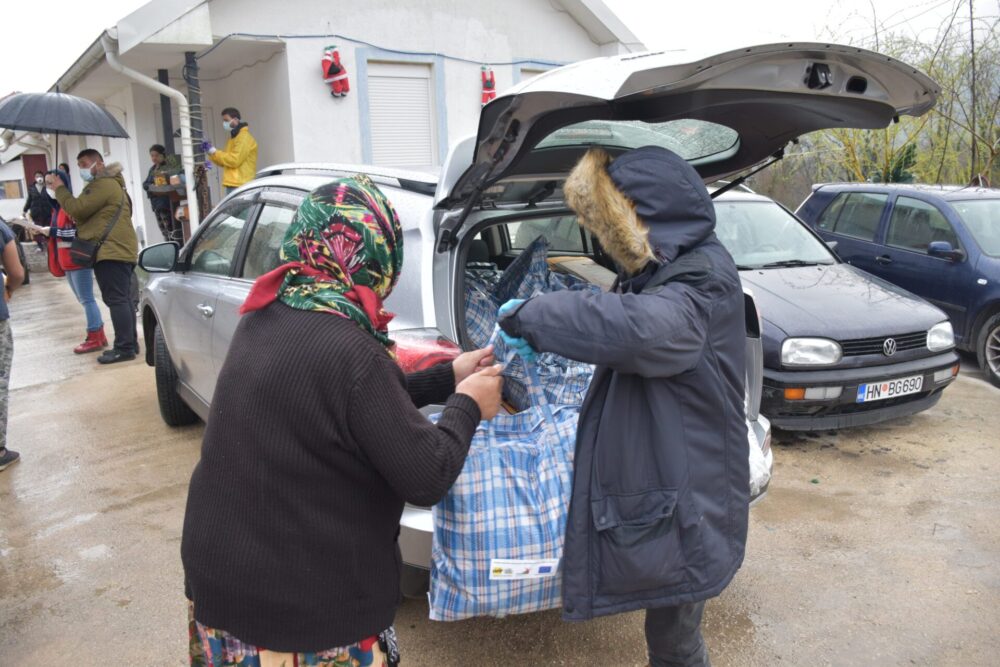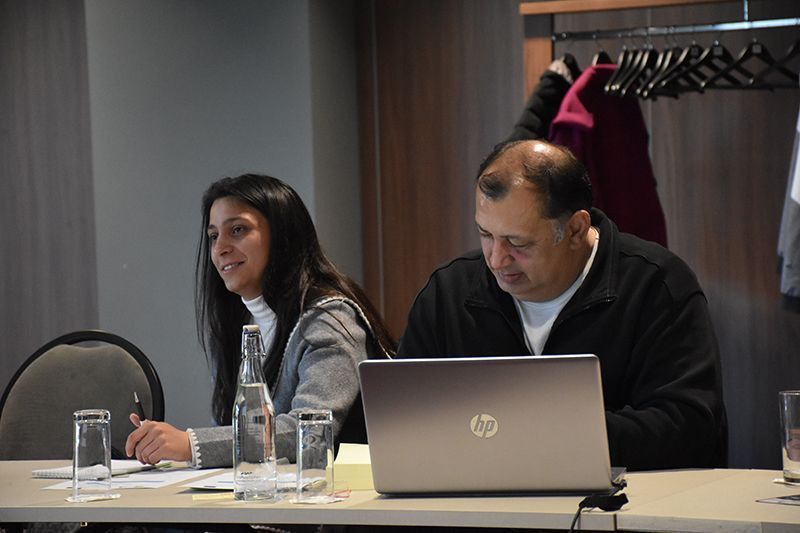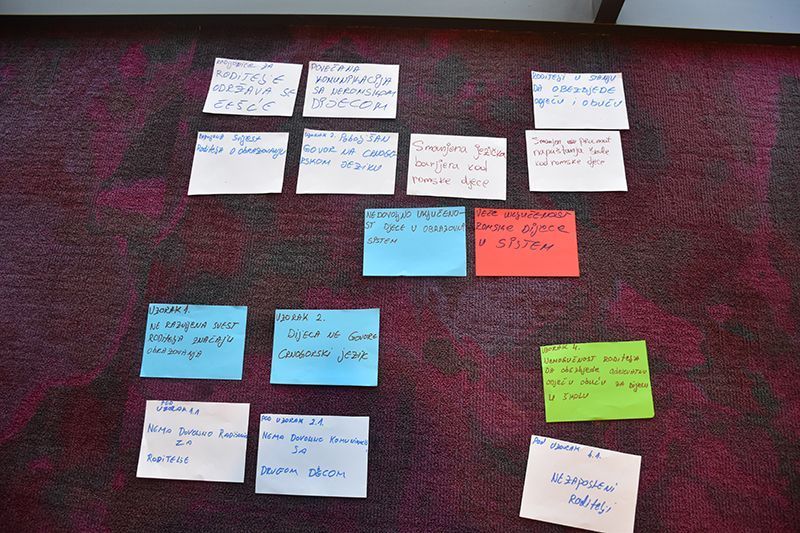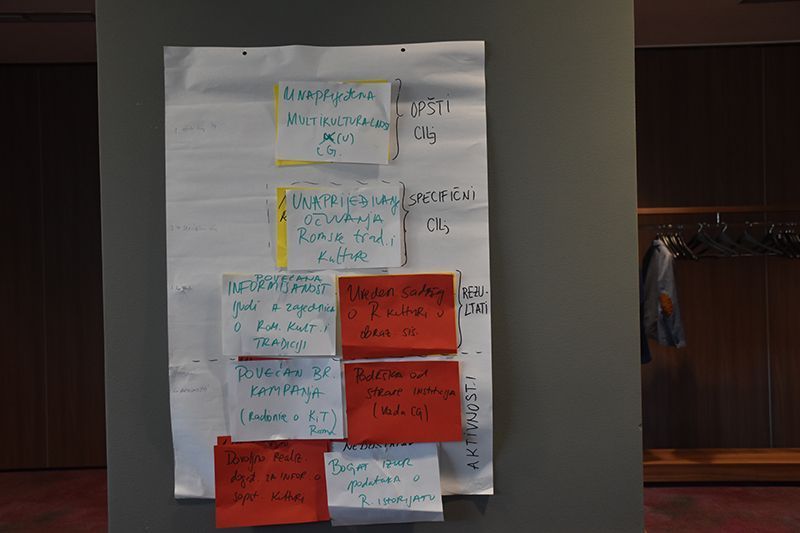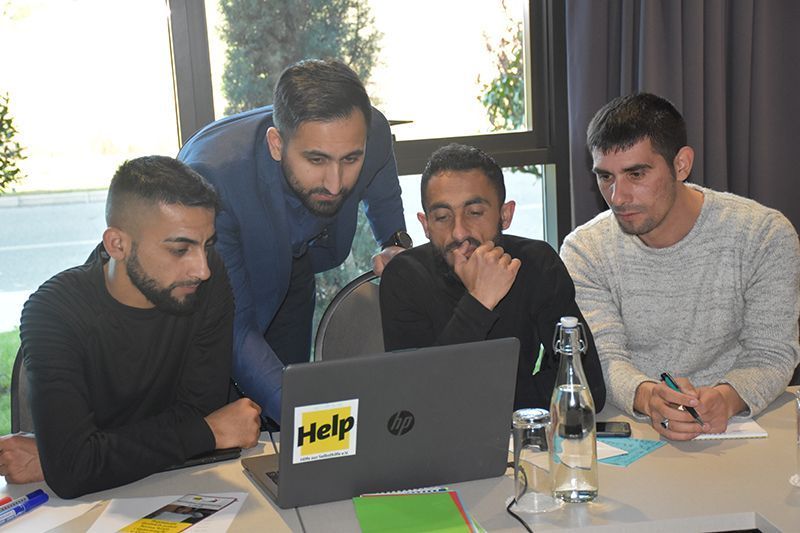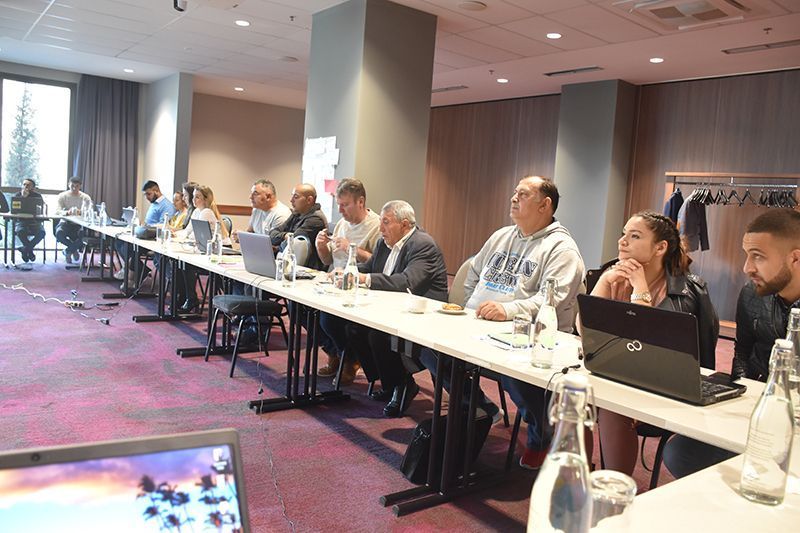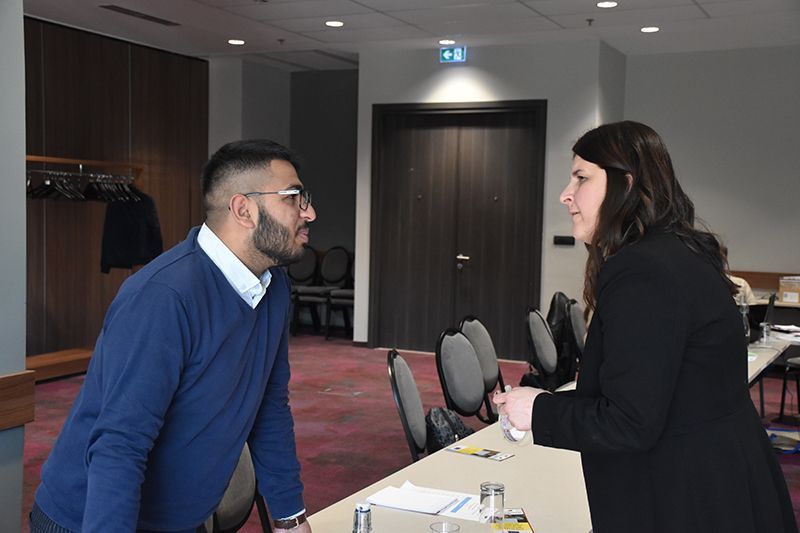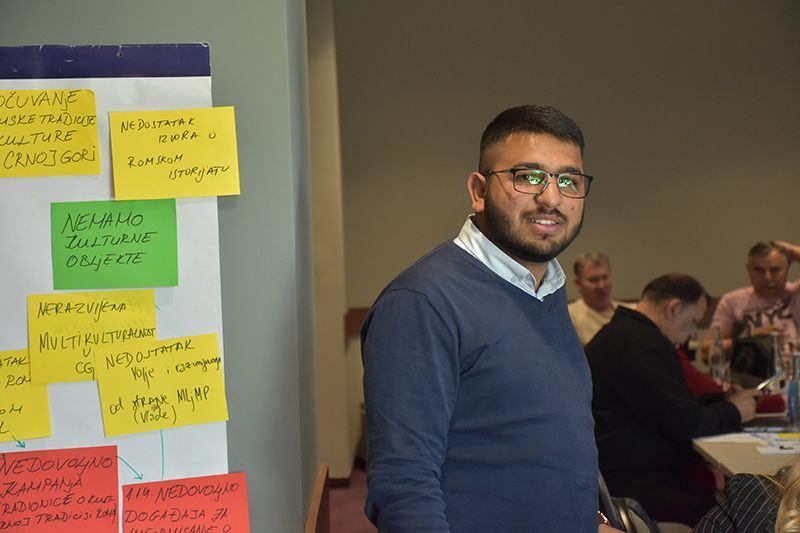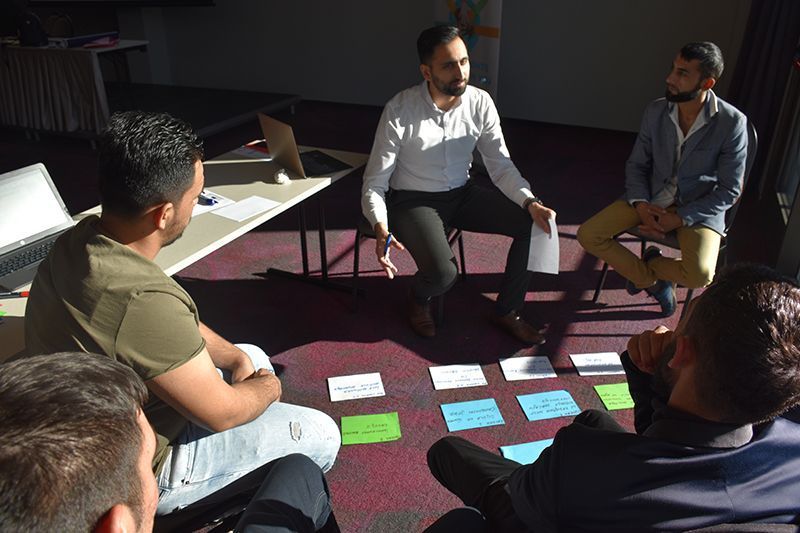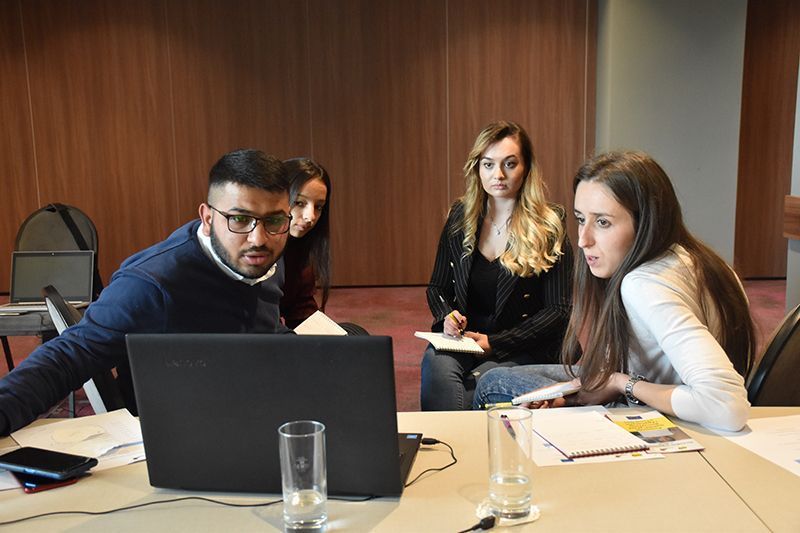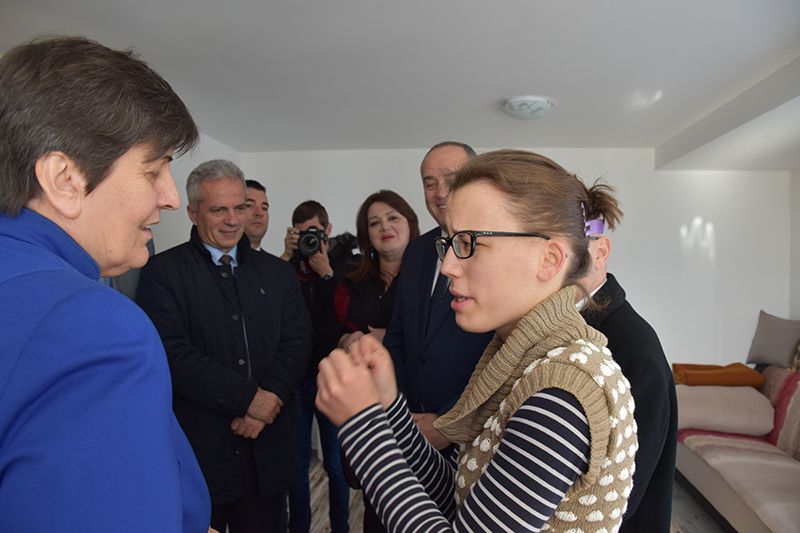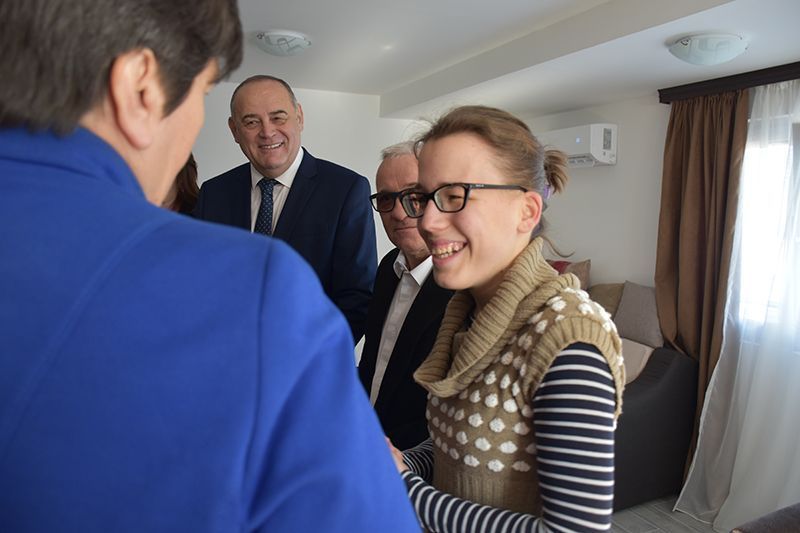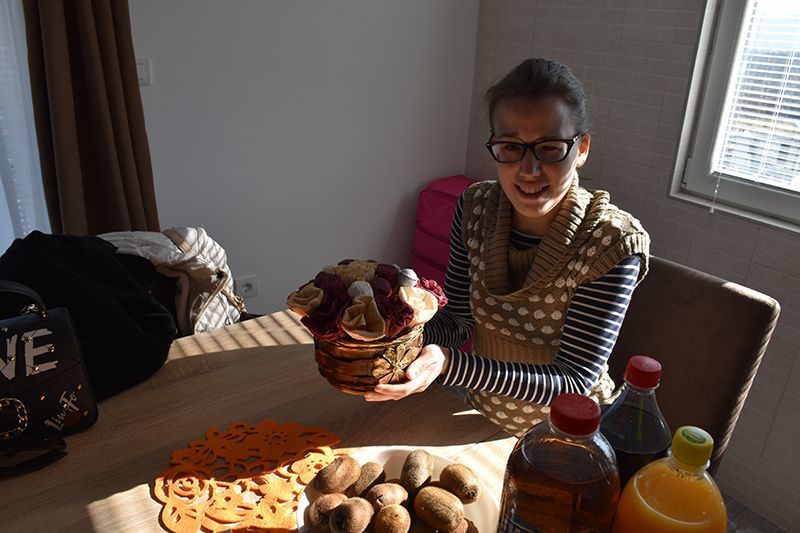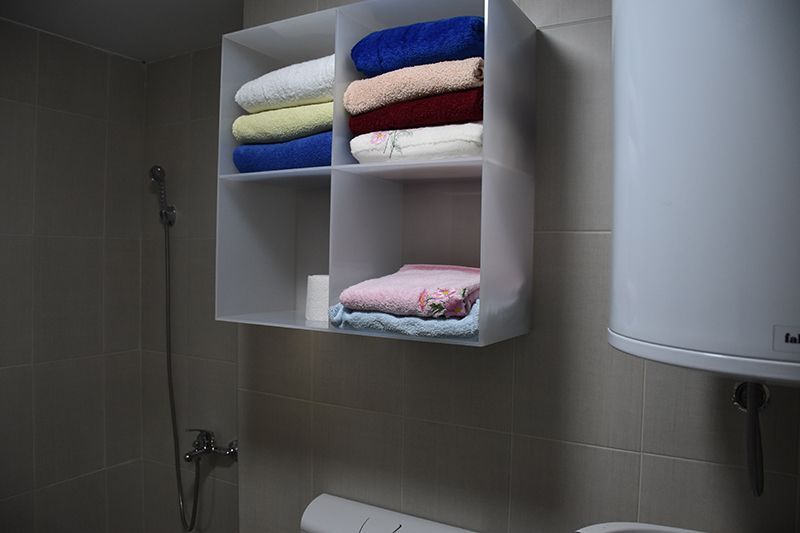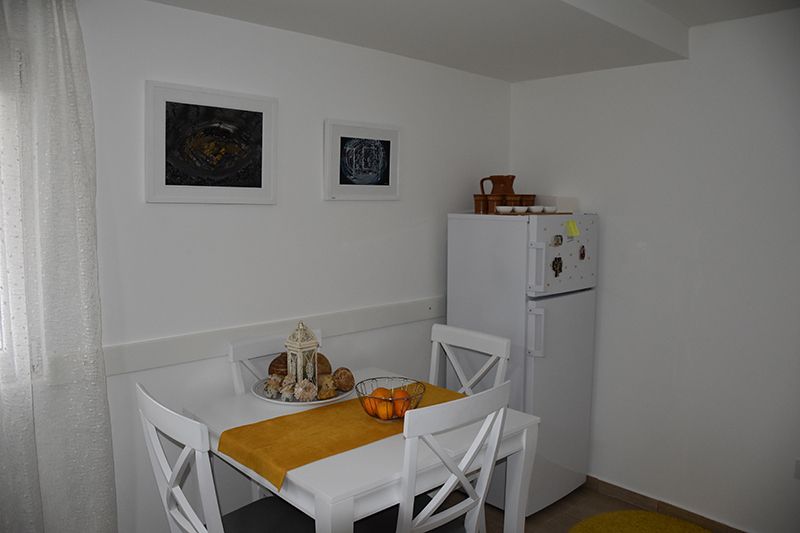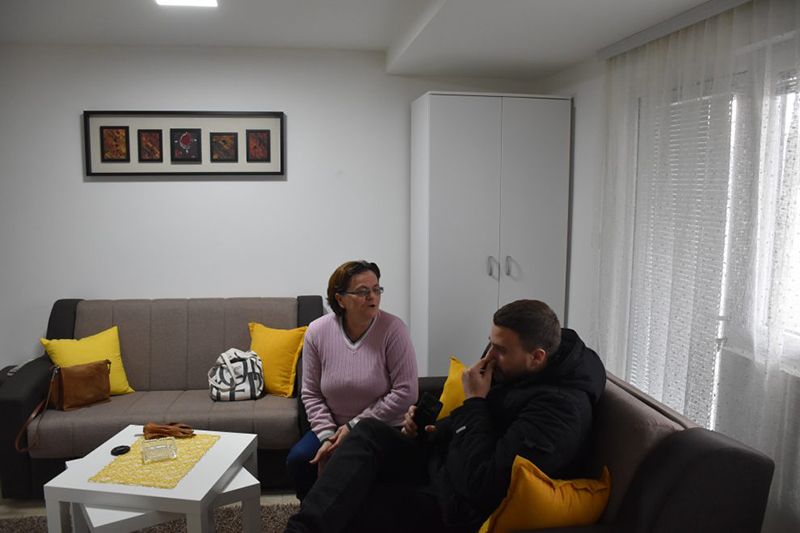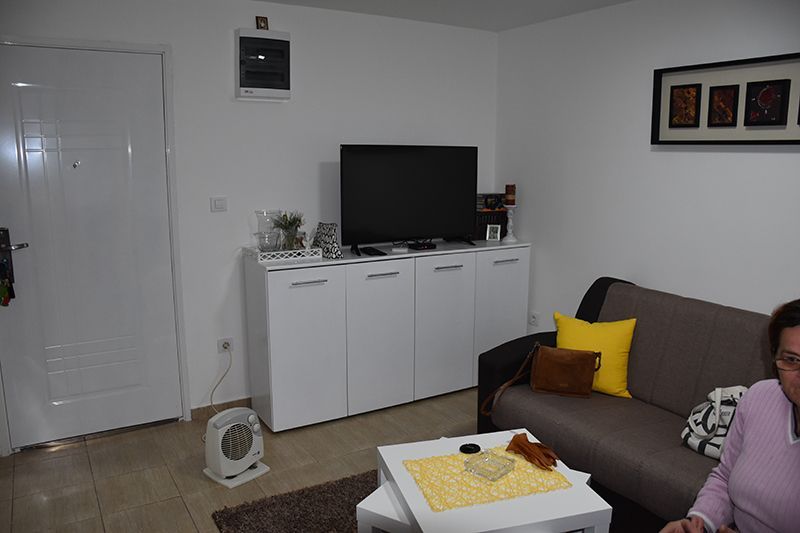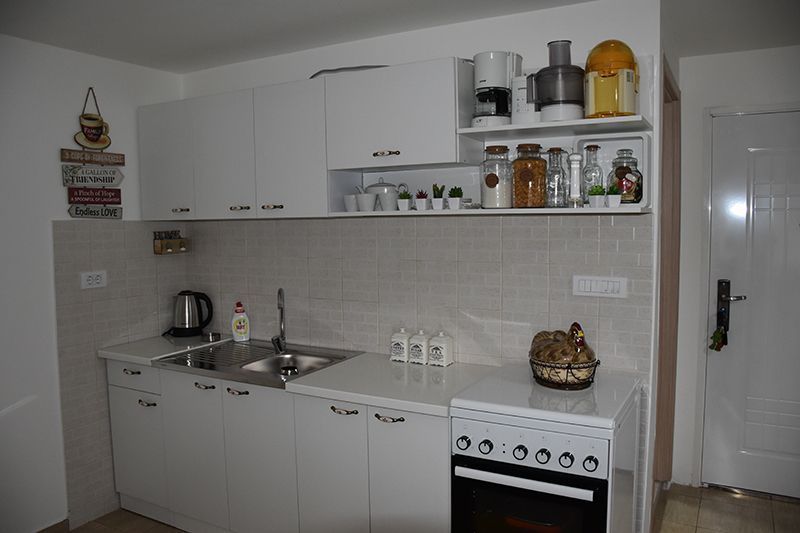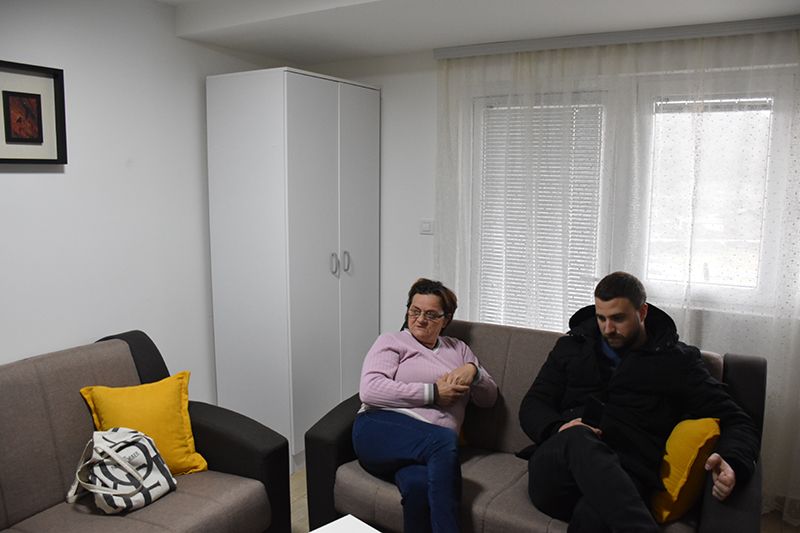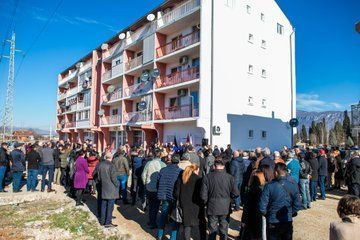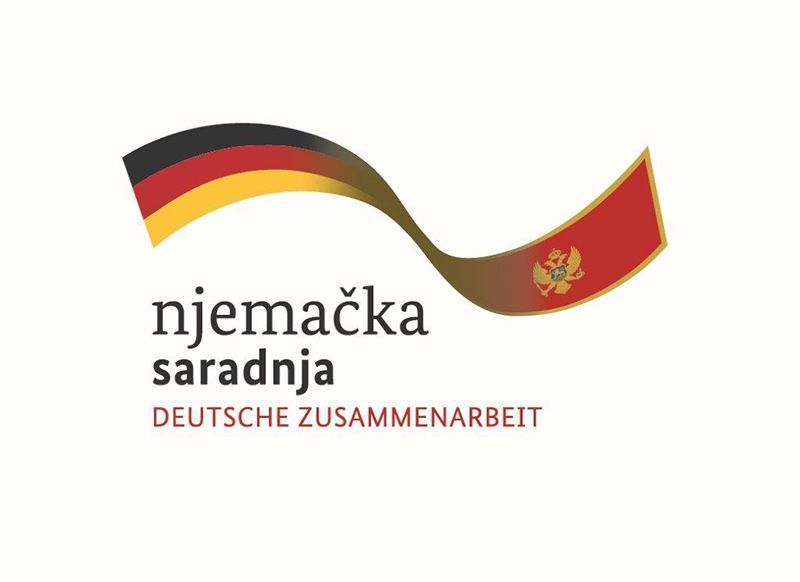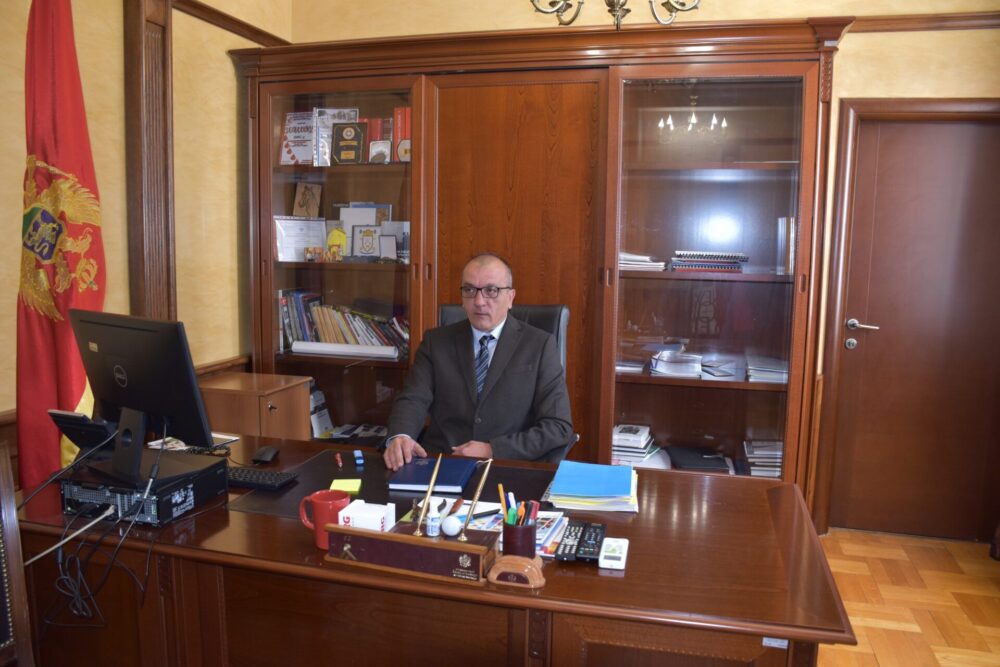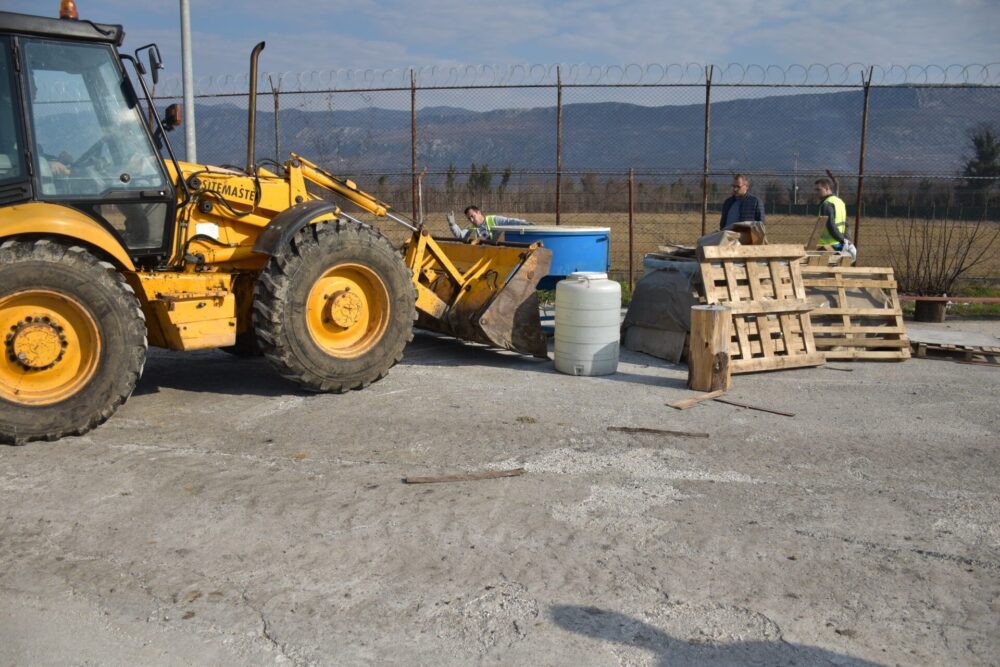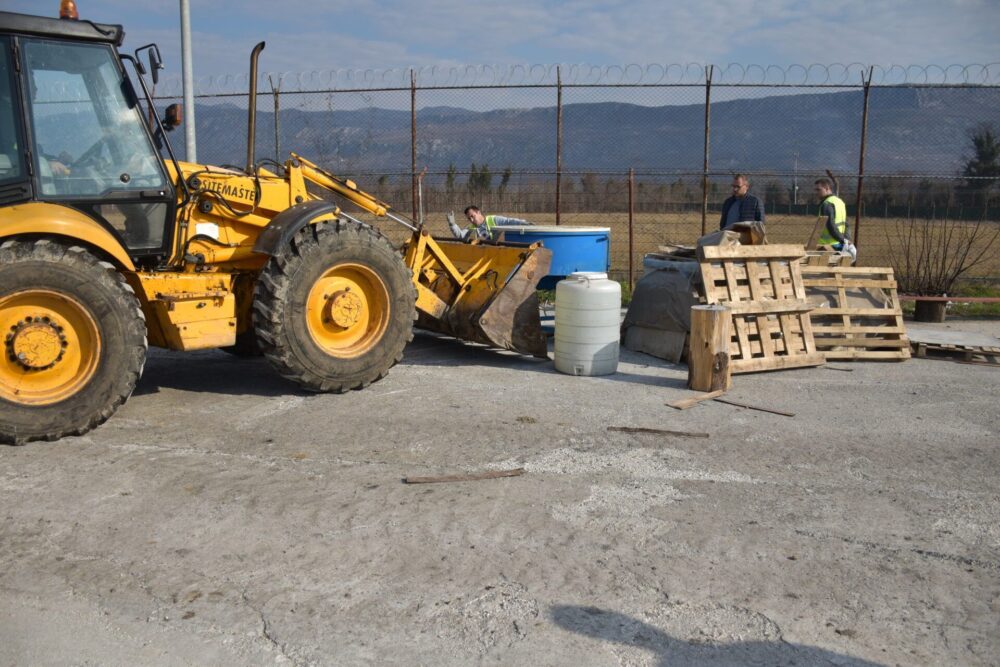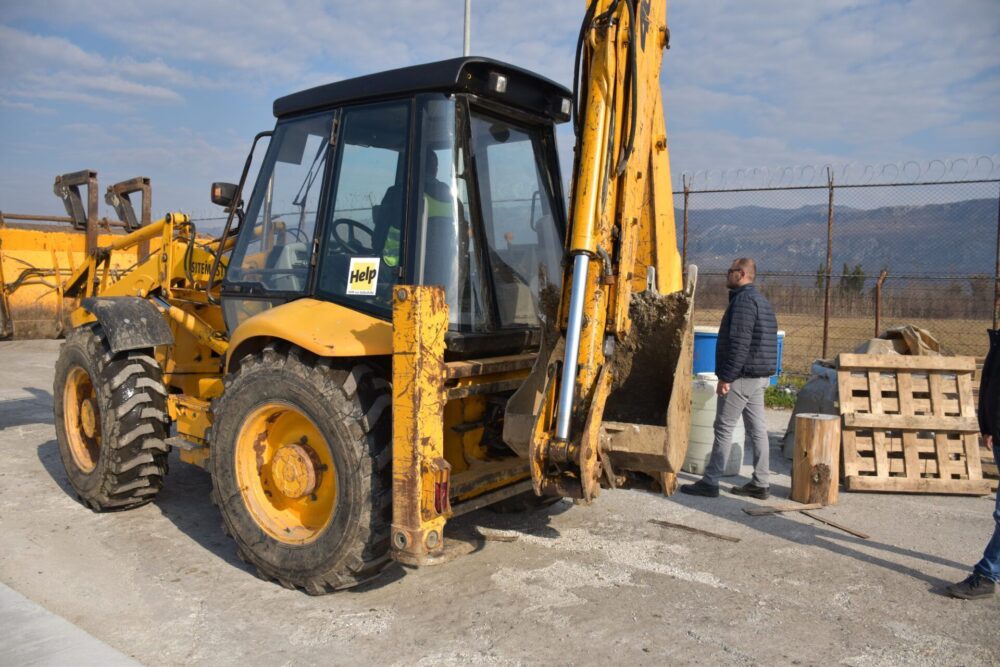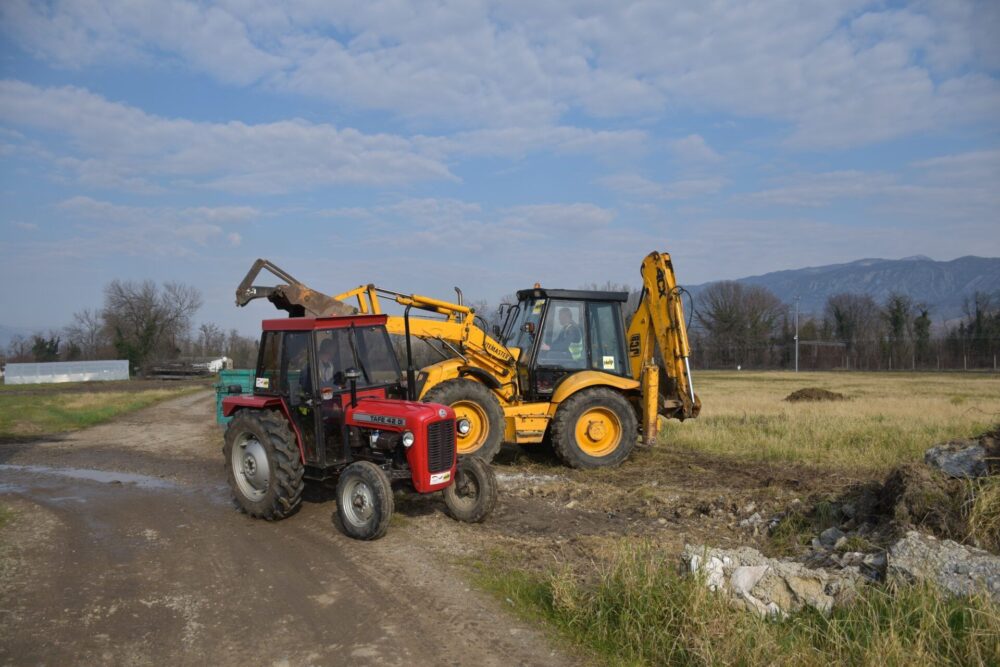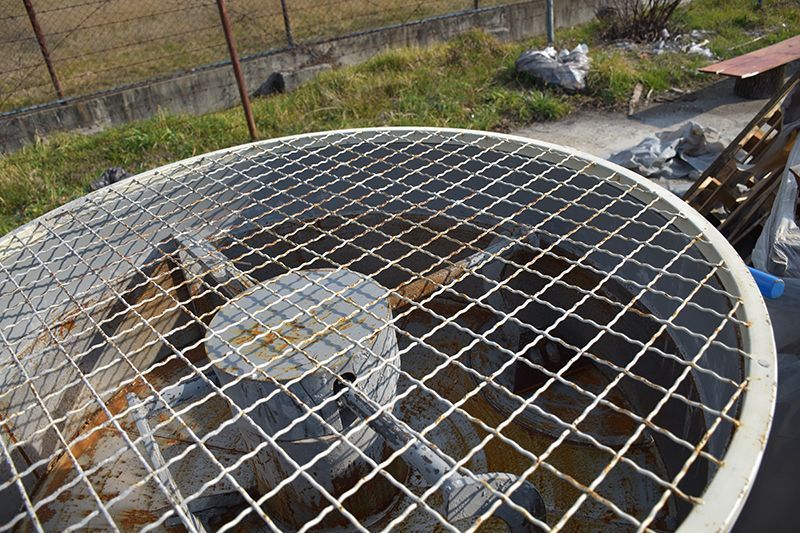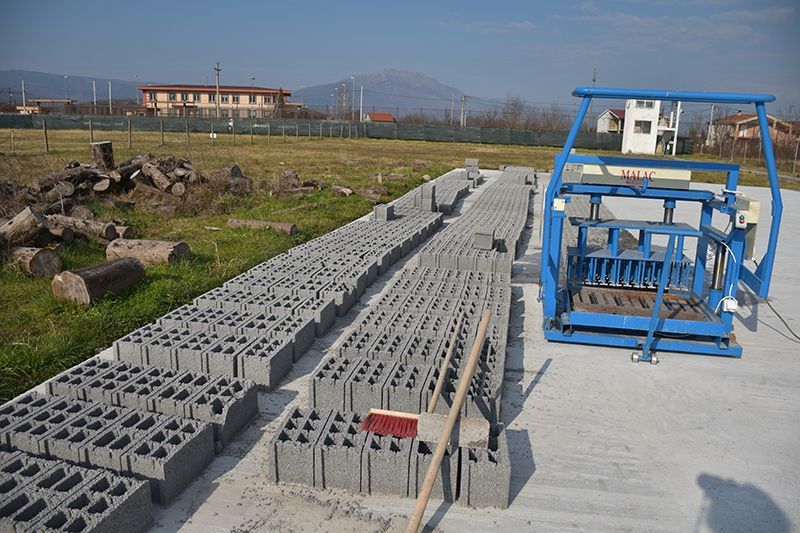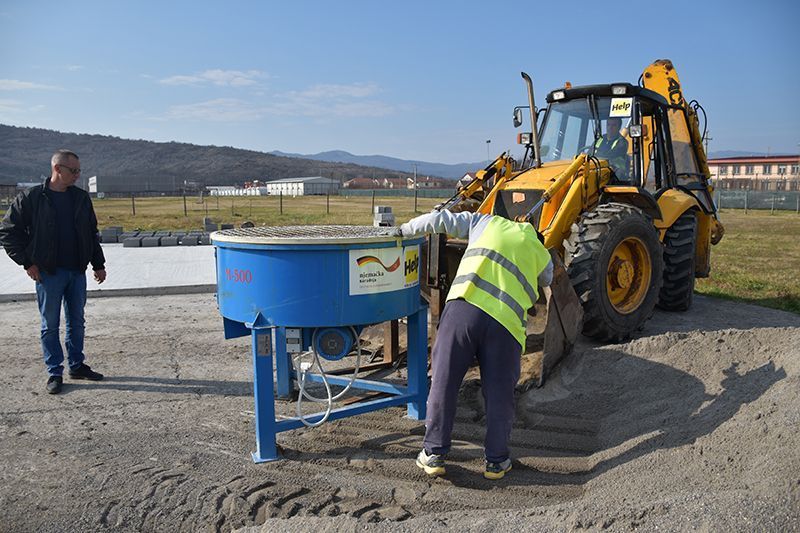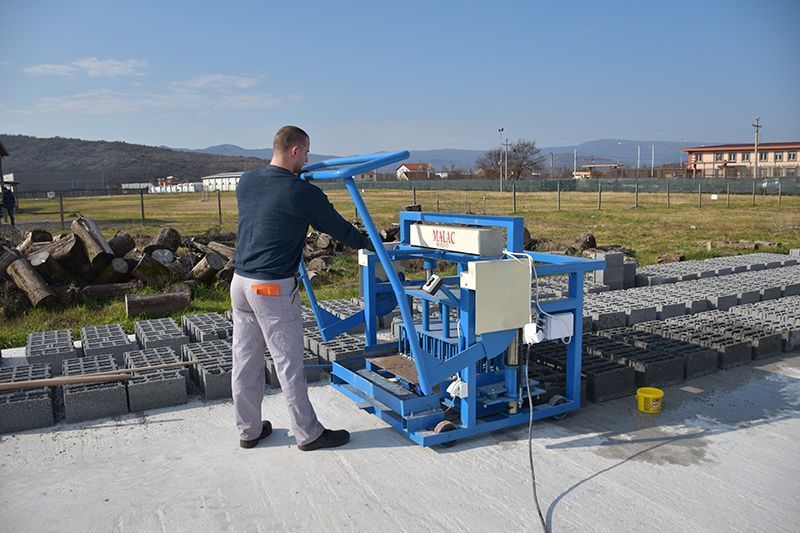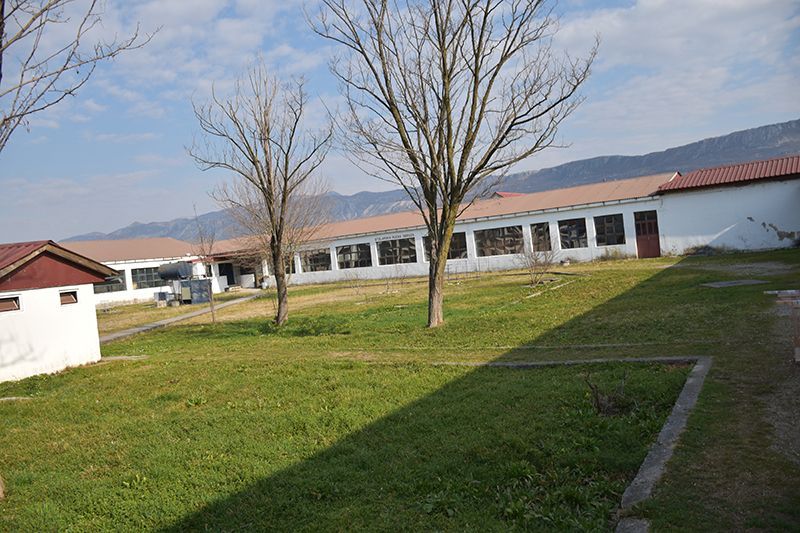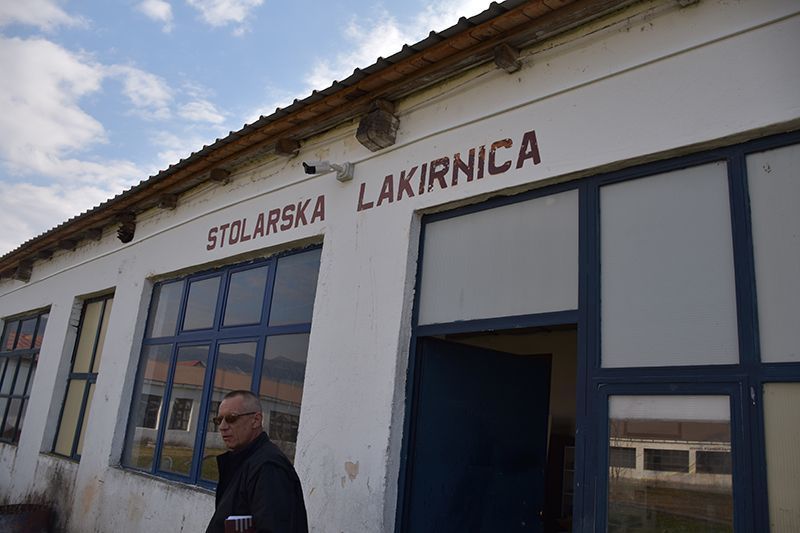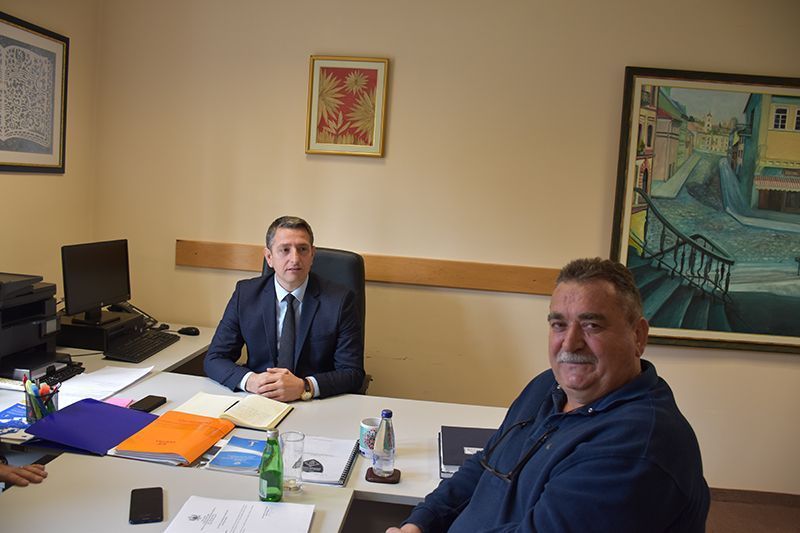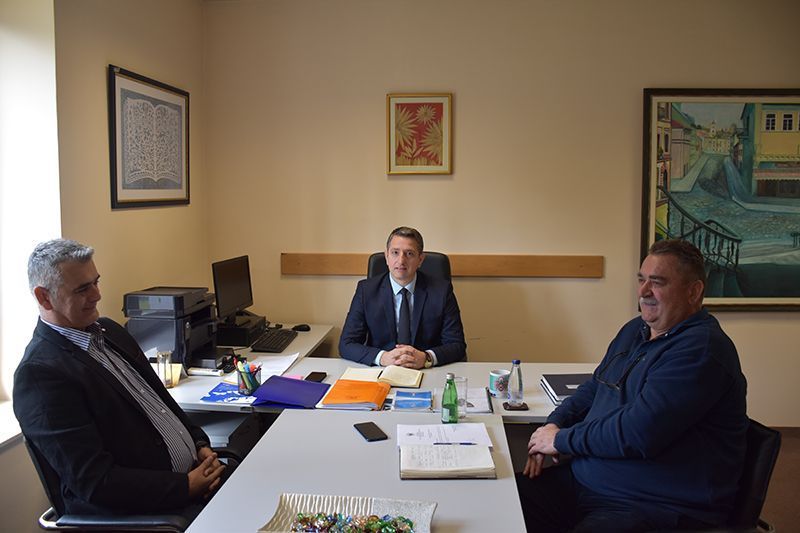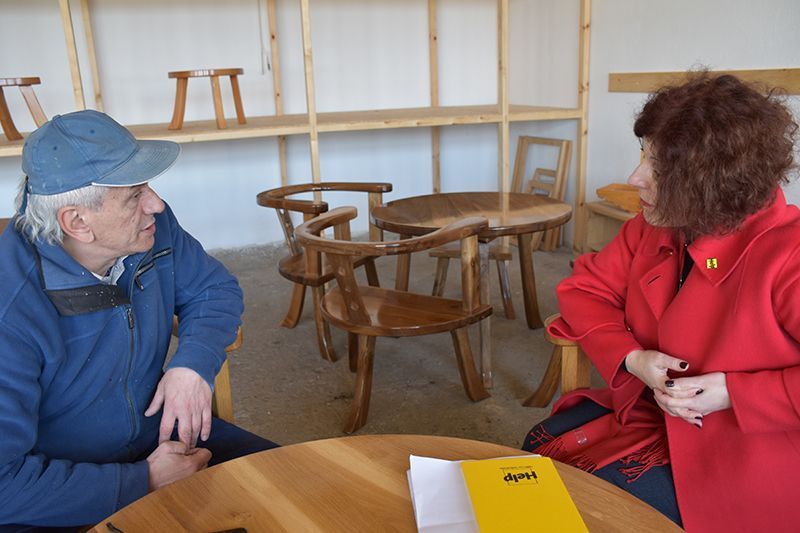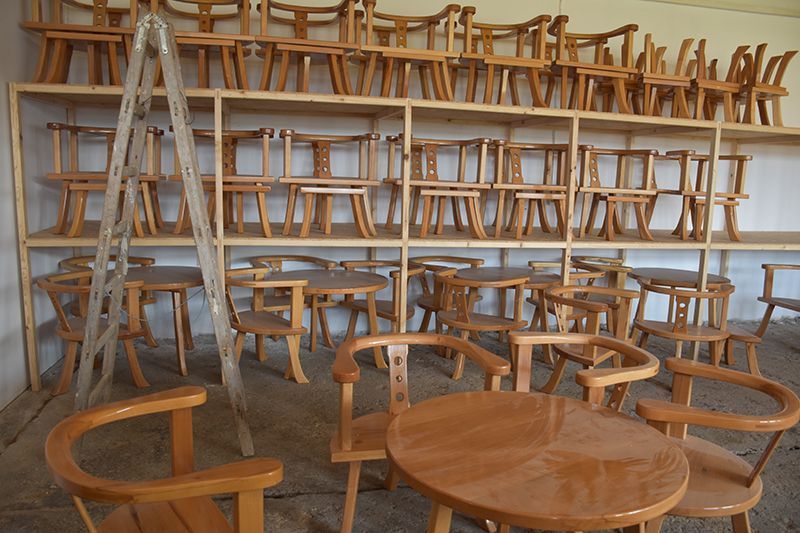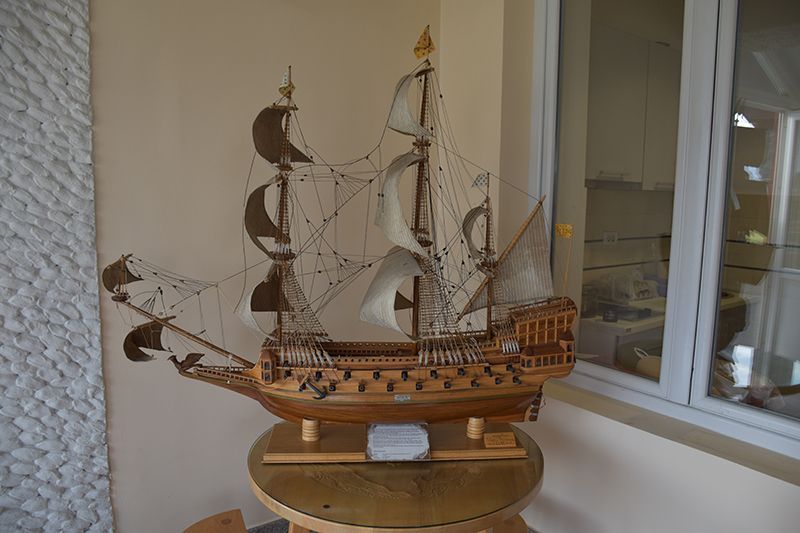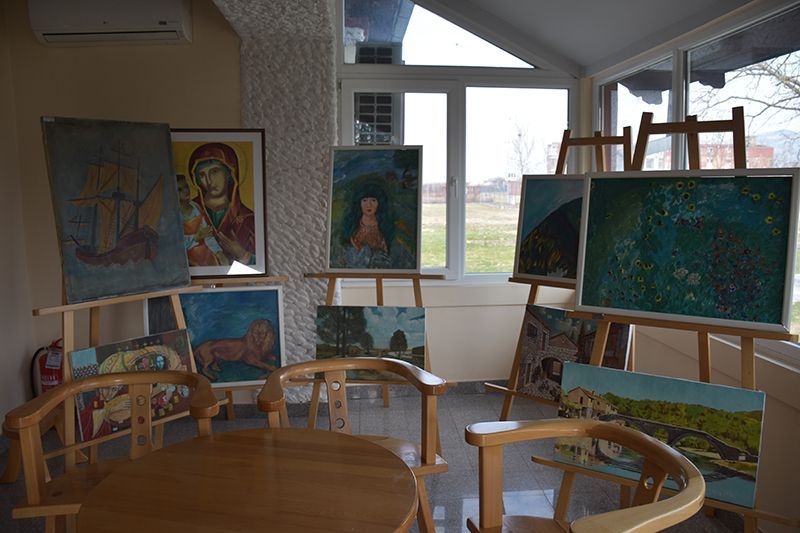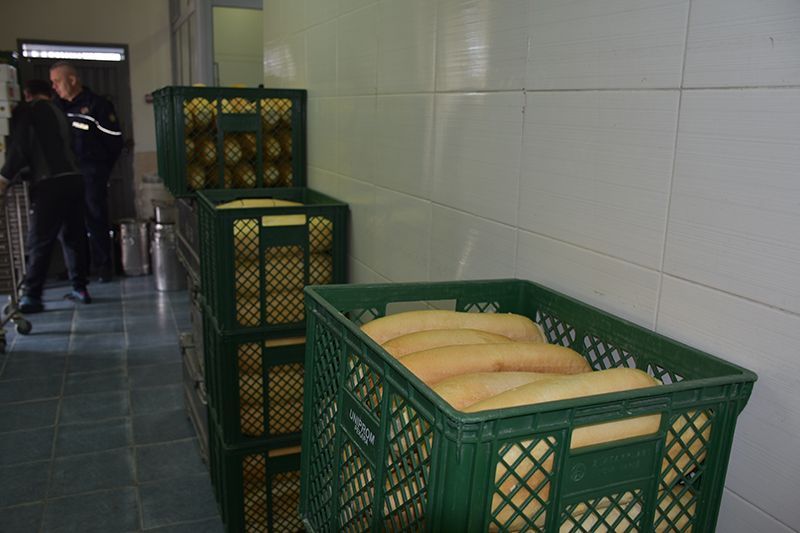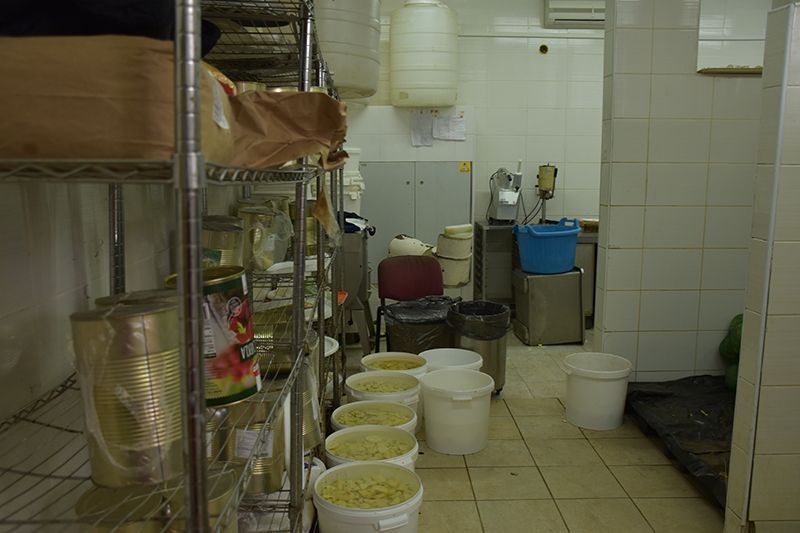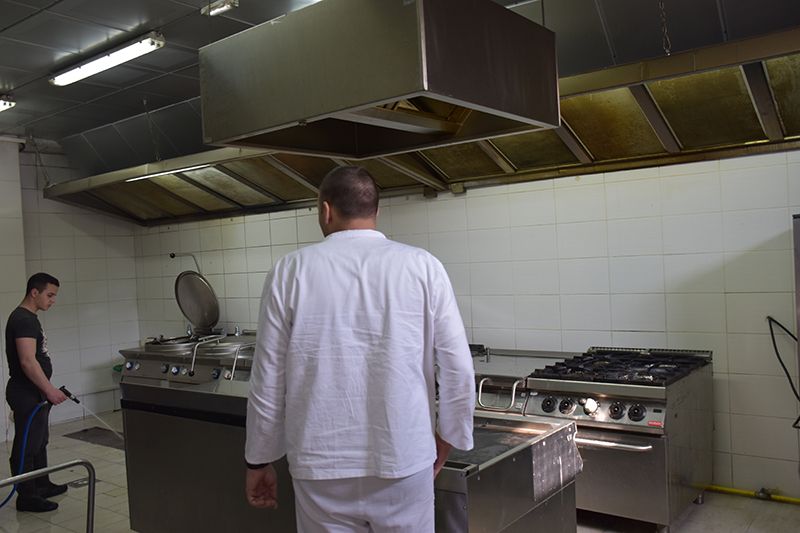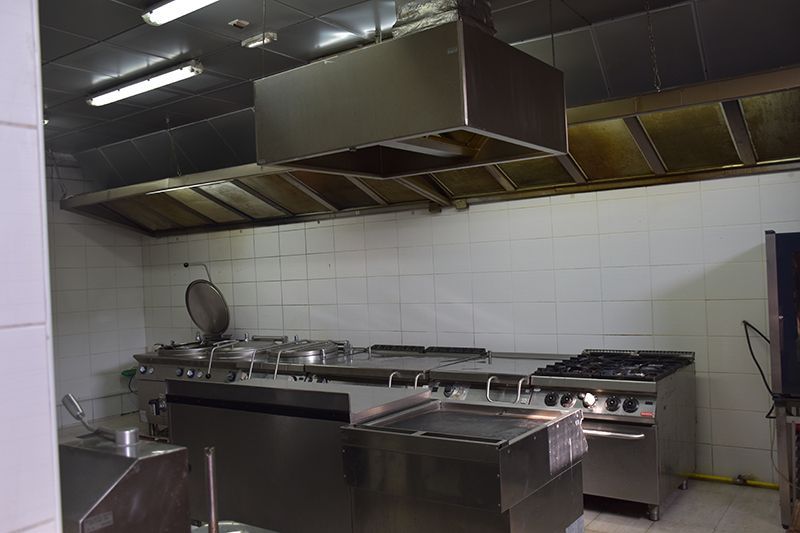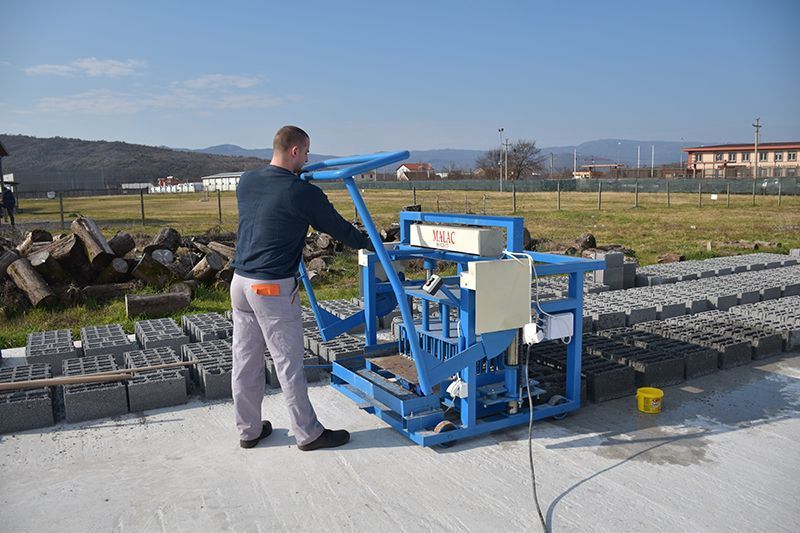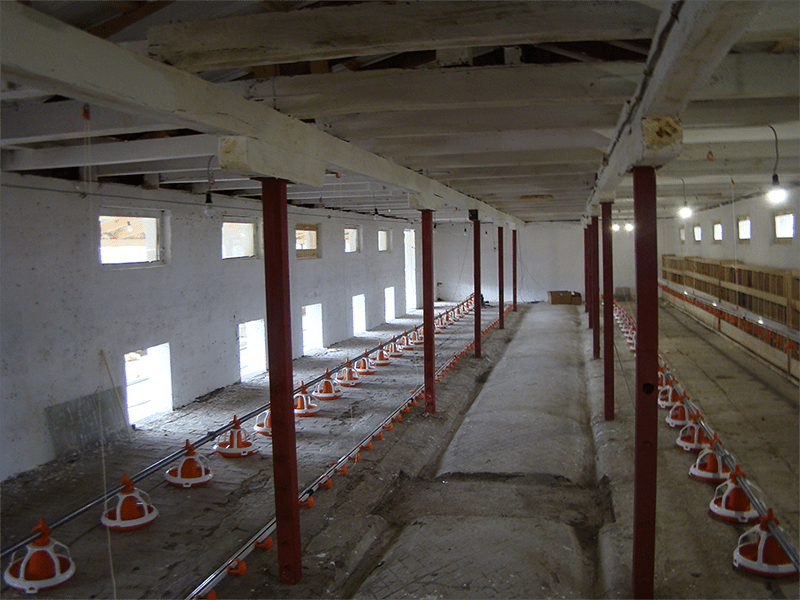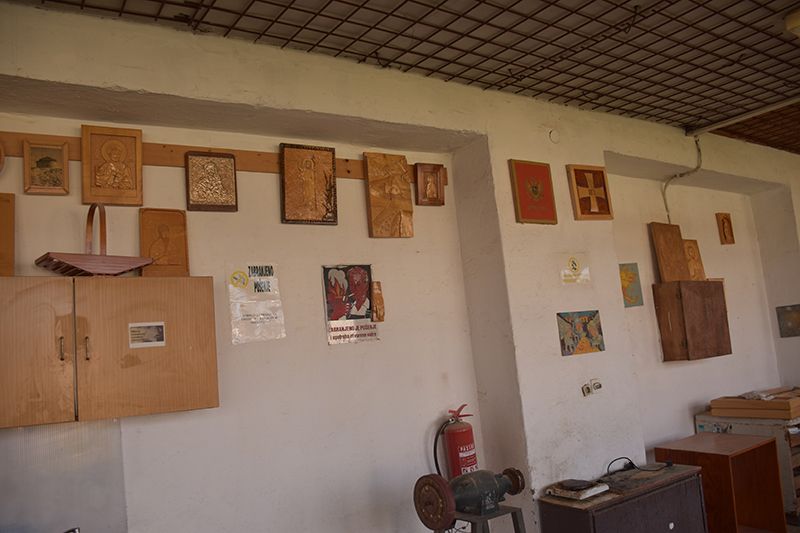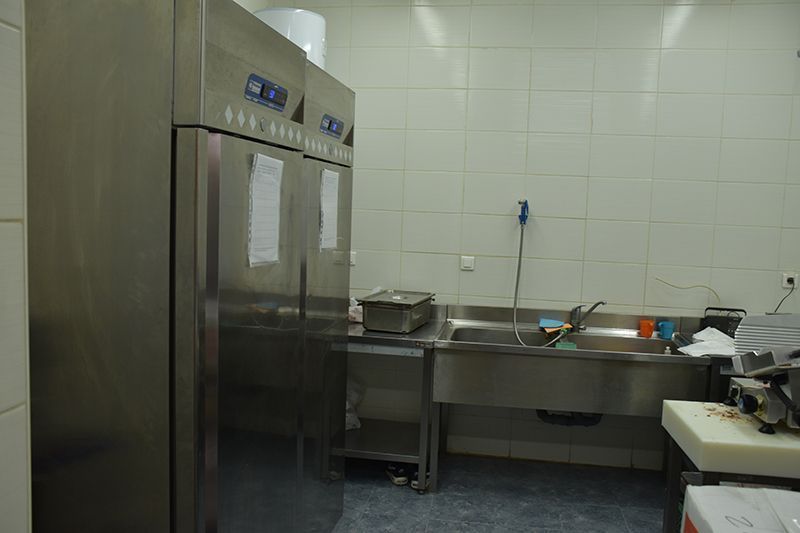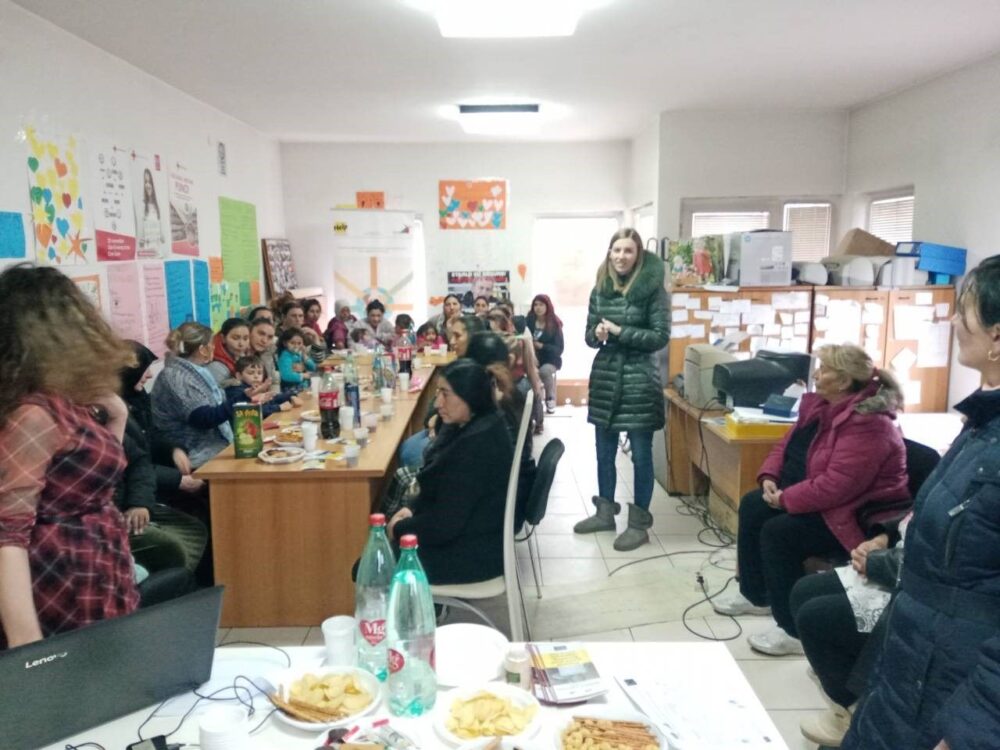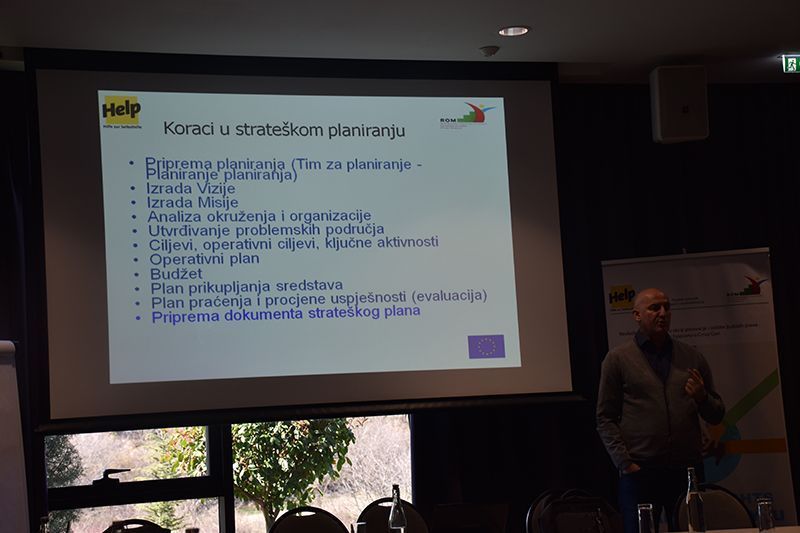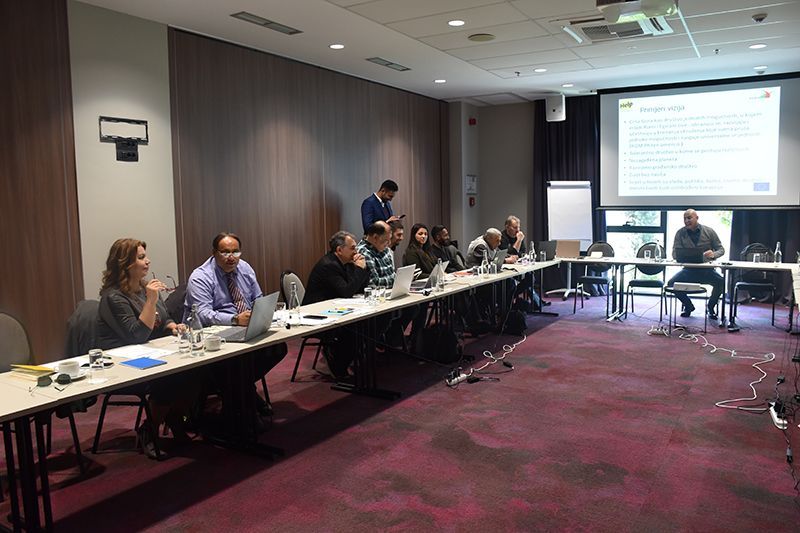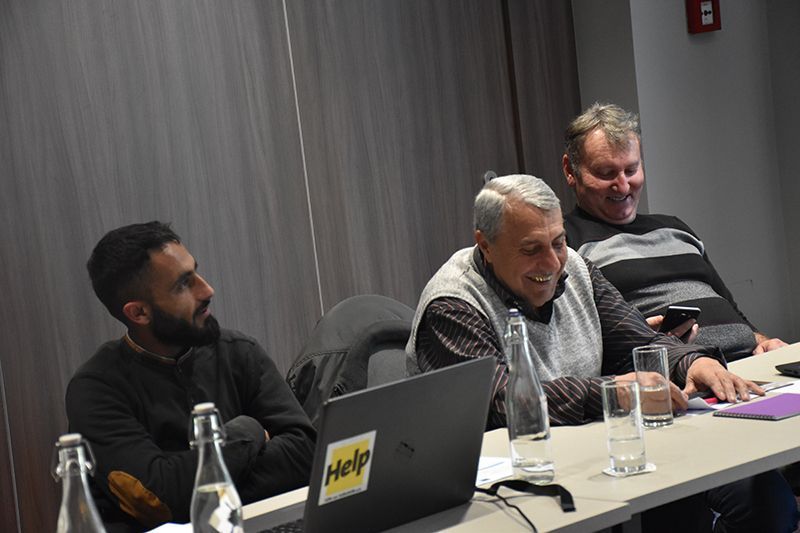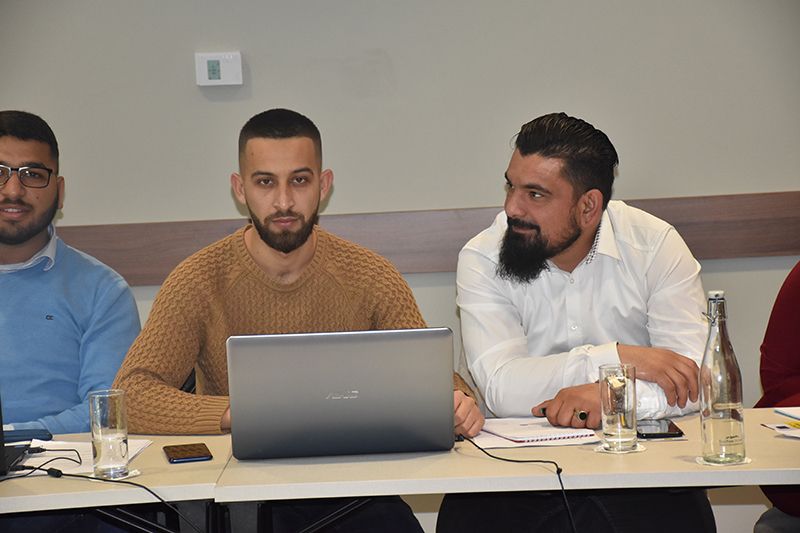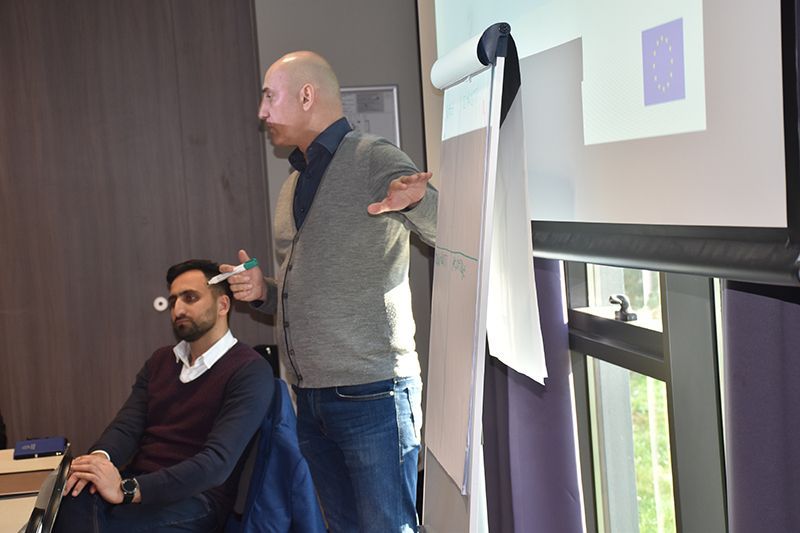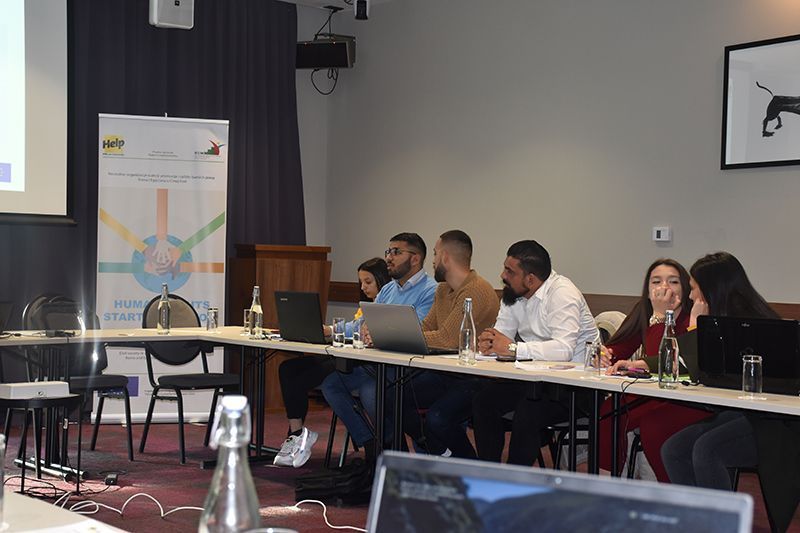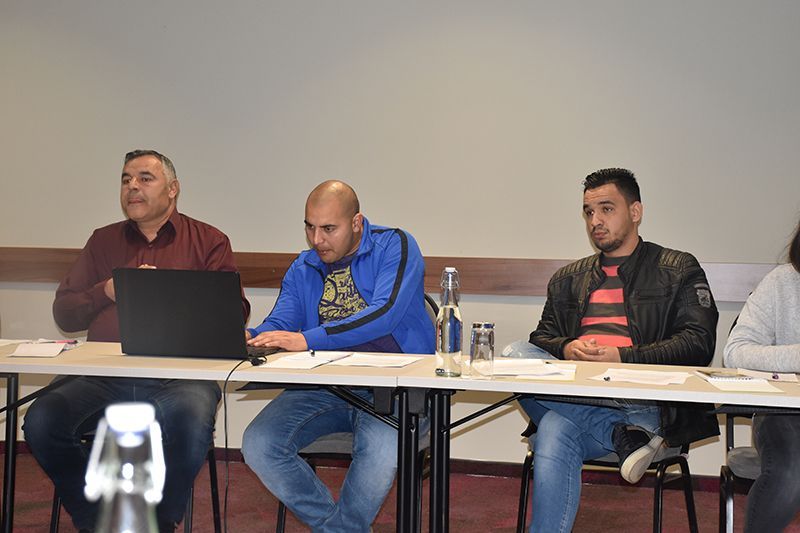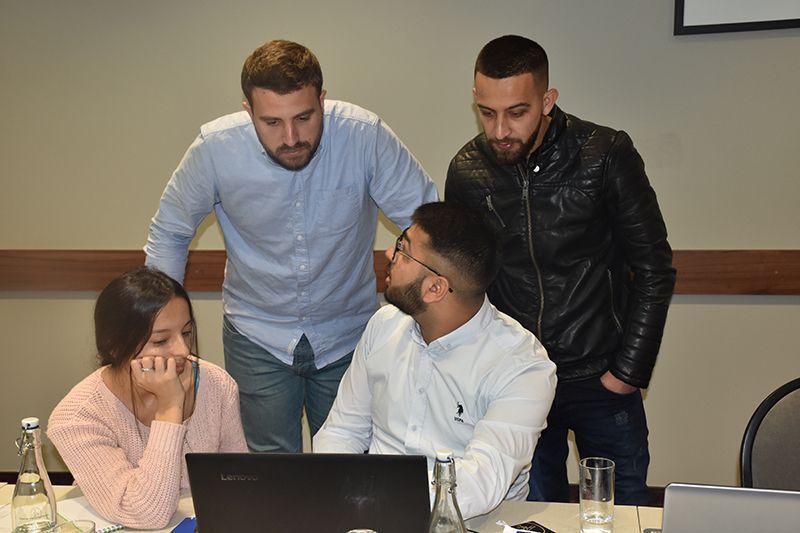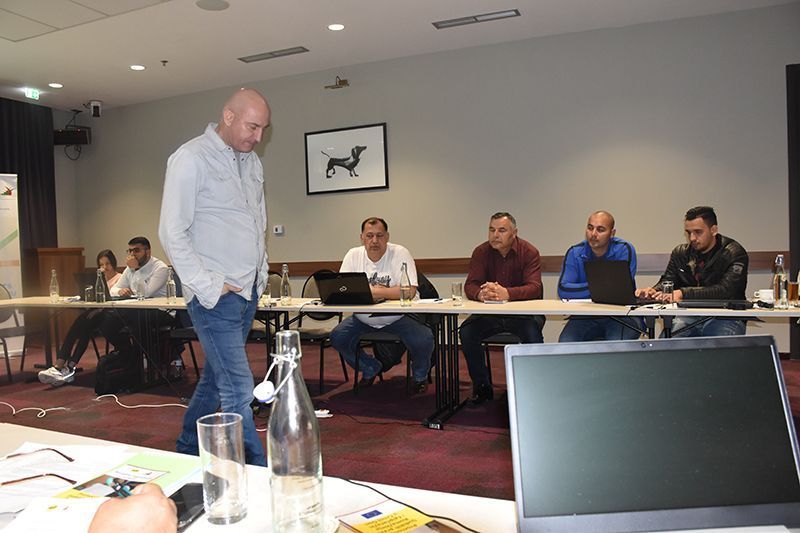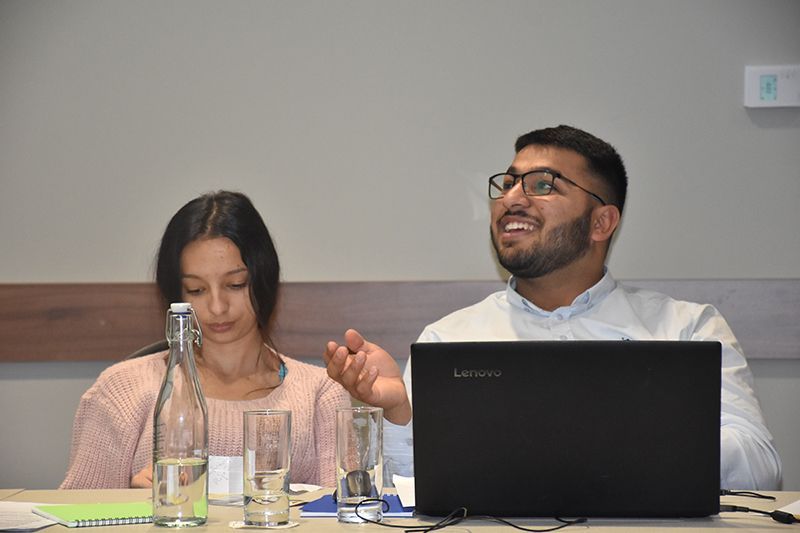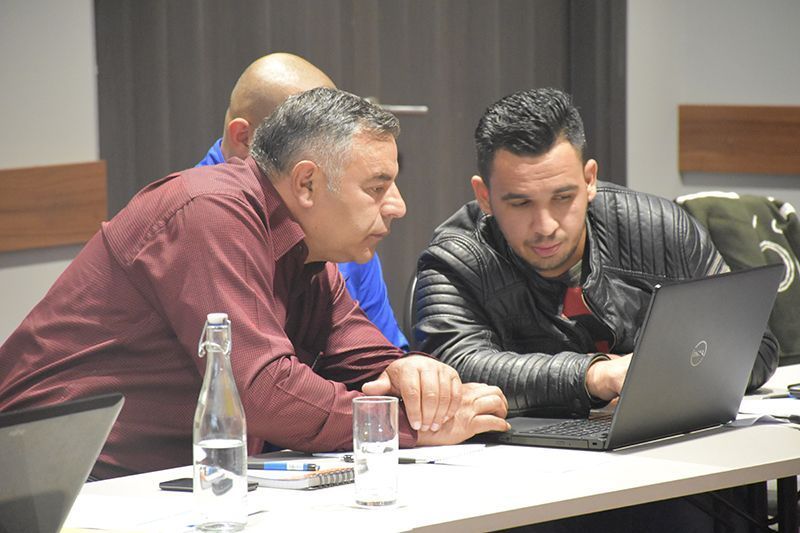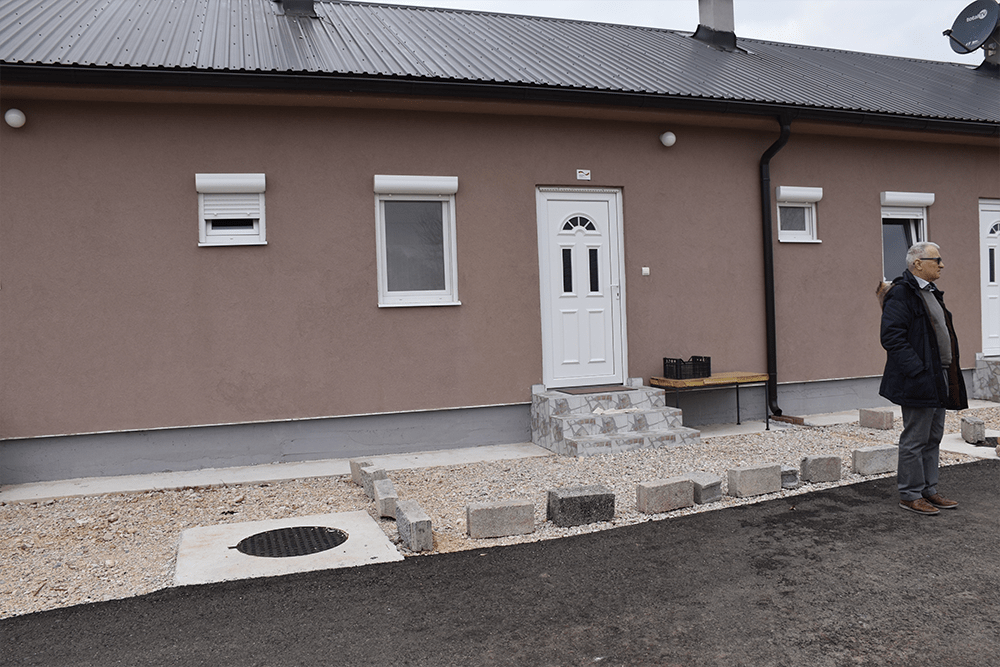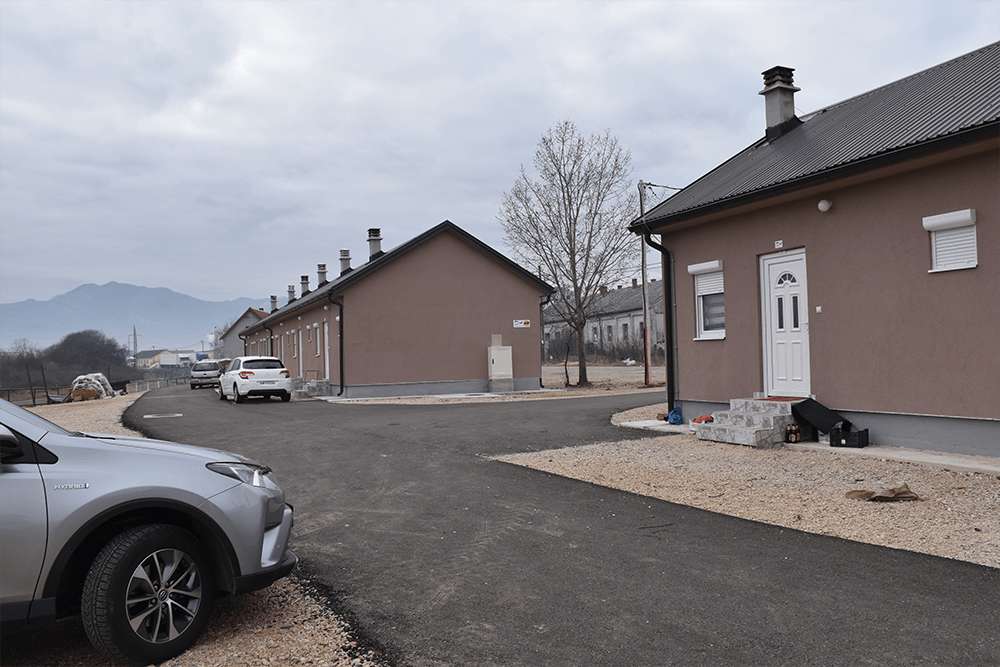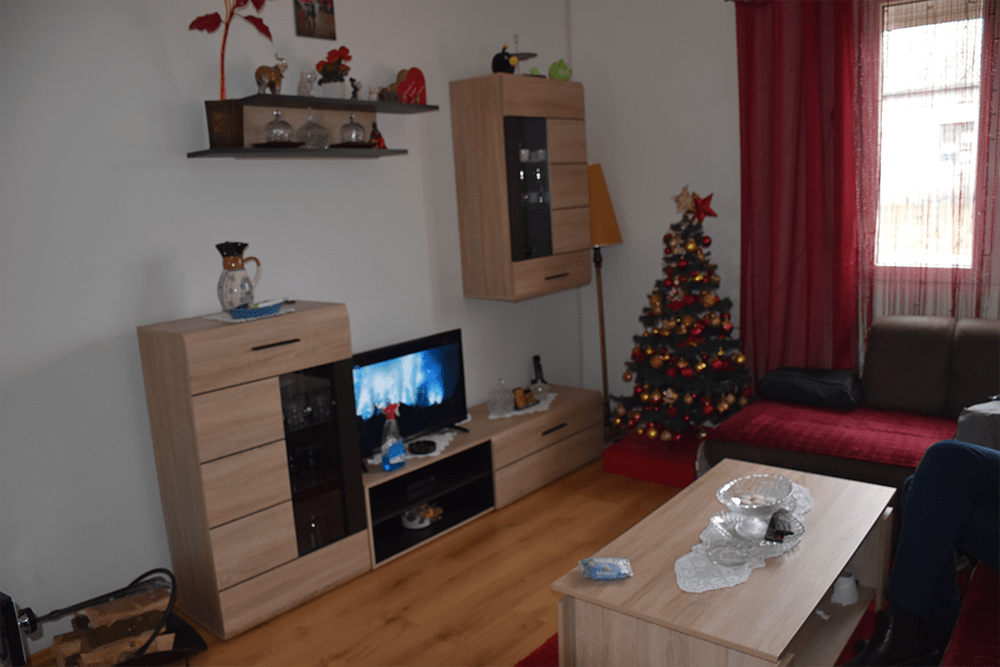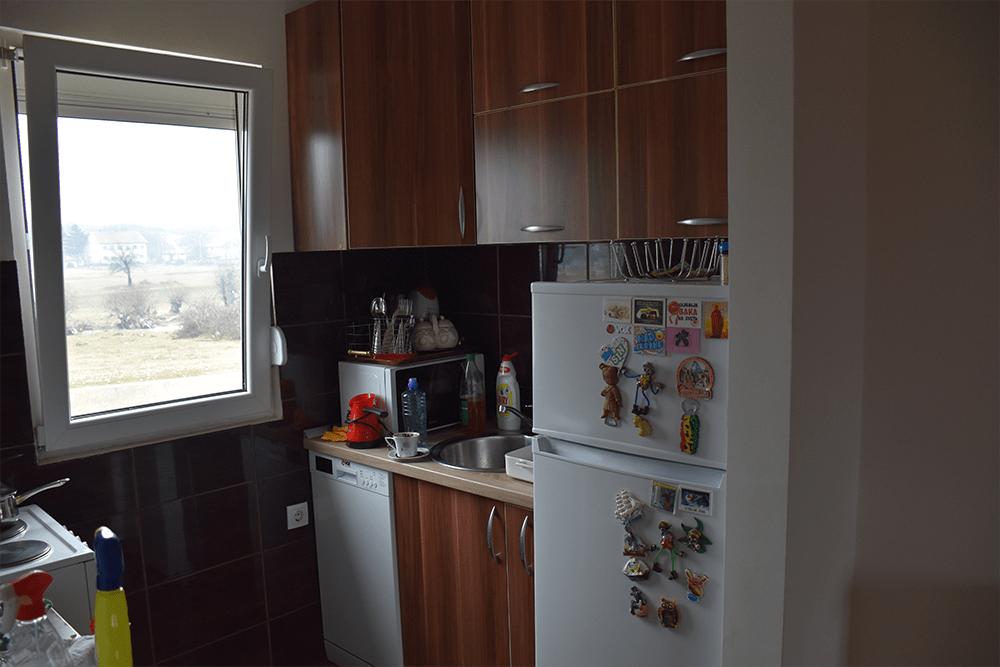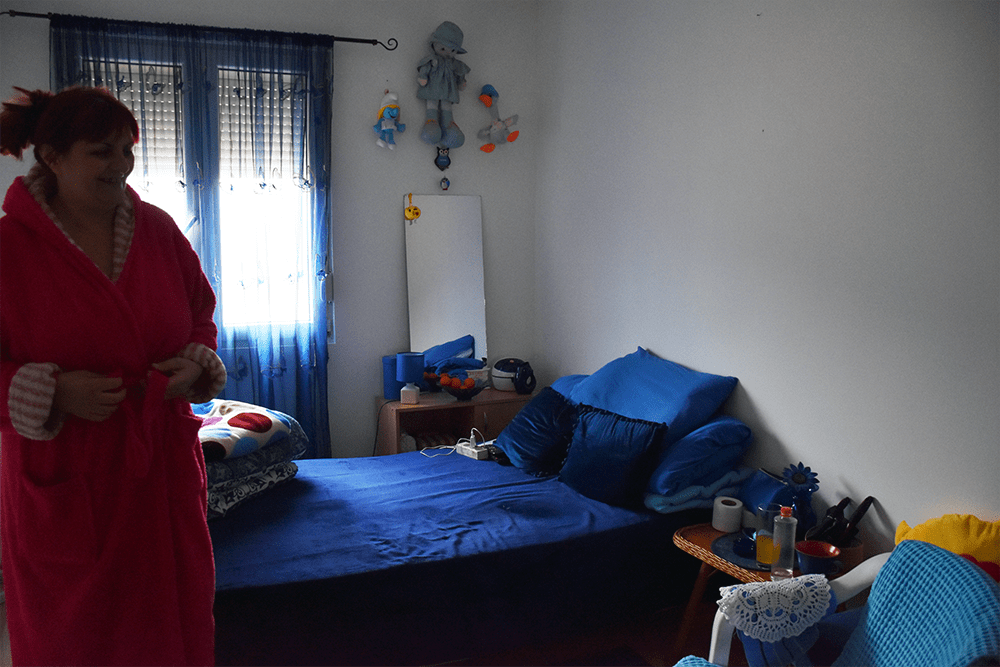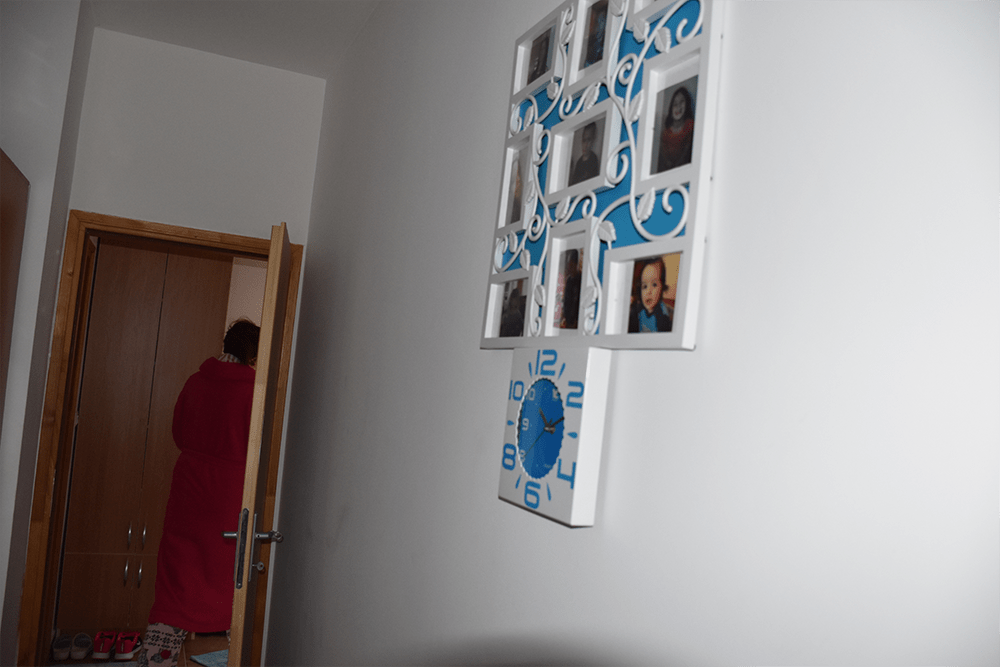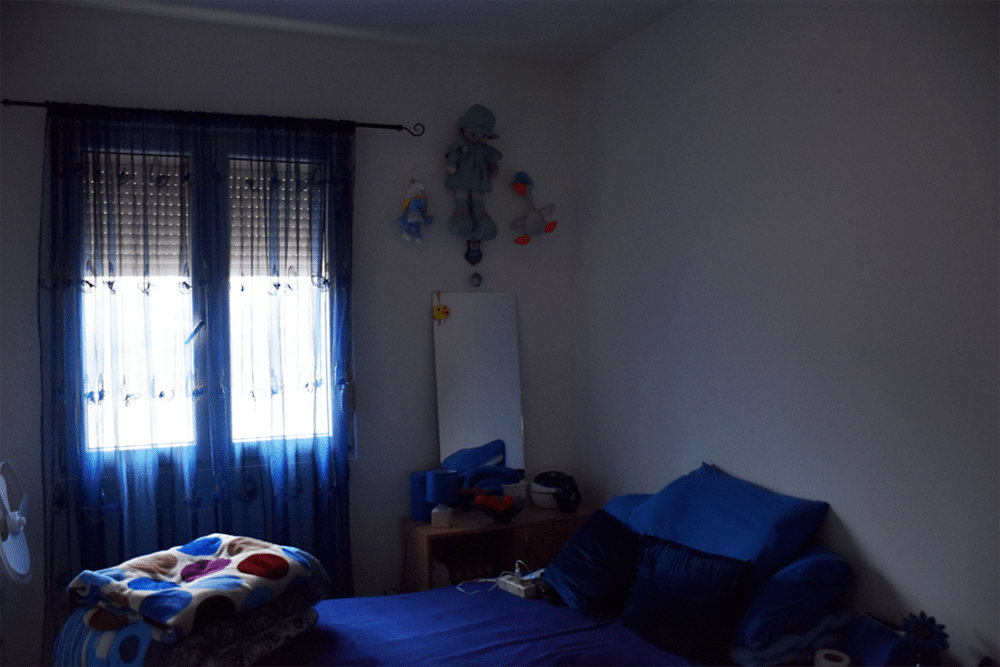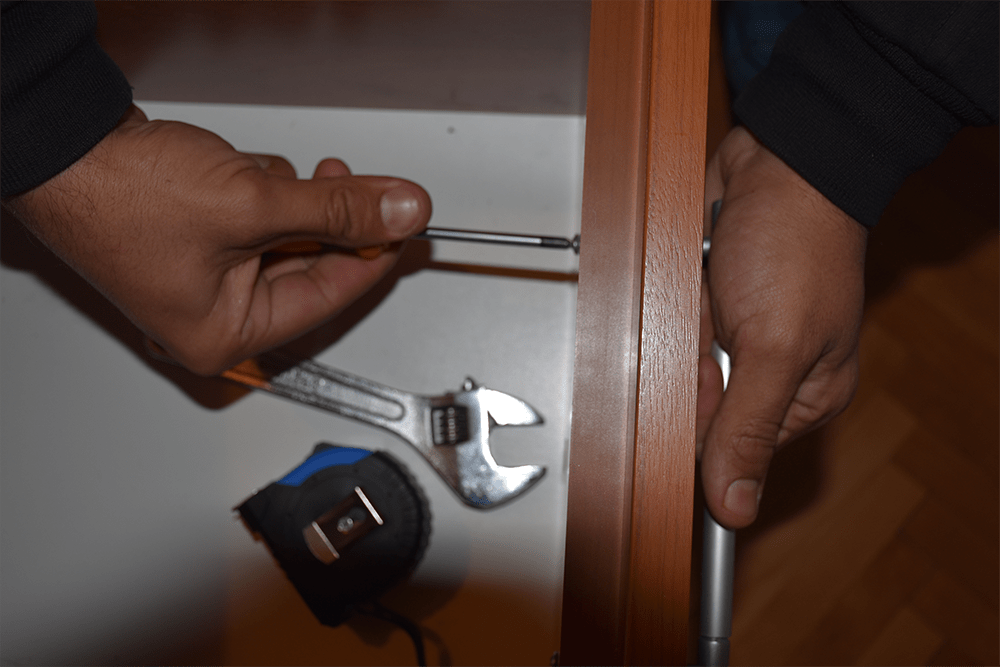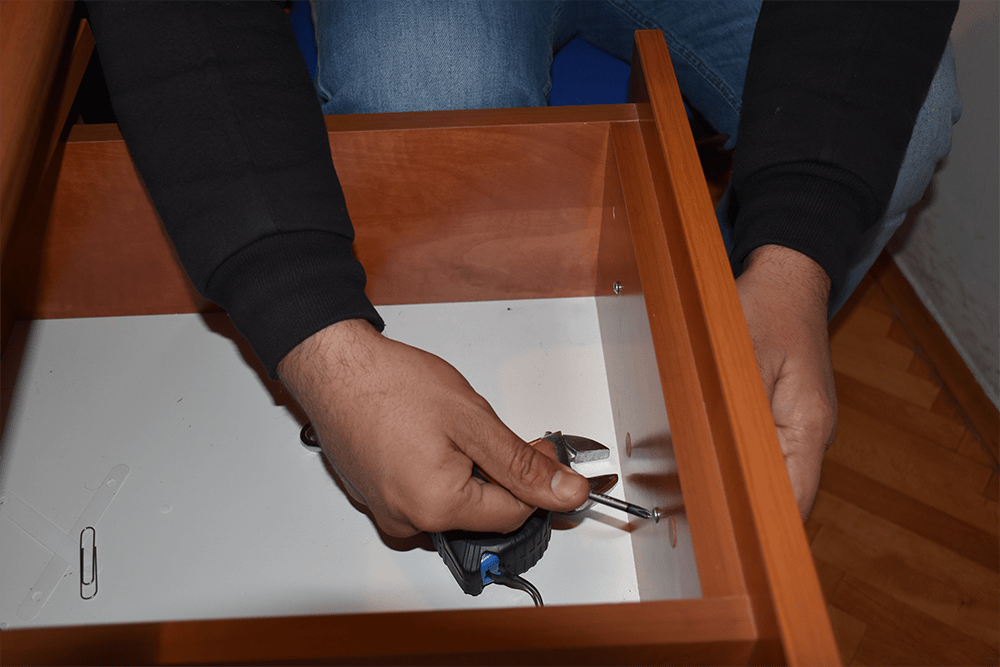Learning with a smartphone enabled Jasmina to continue fighting to win the Luca award 20.05. 2020
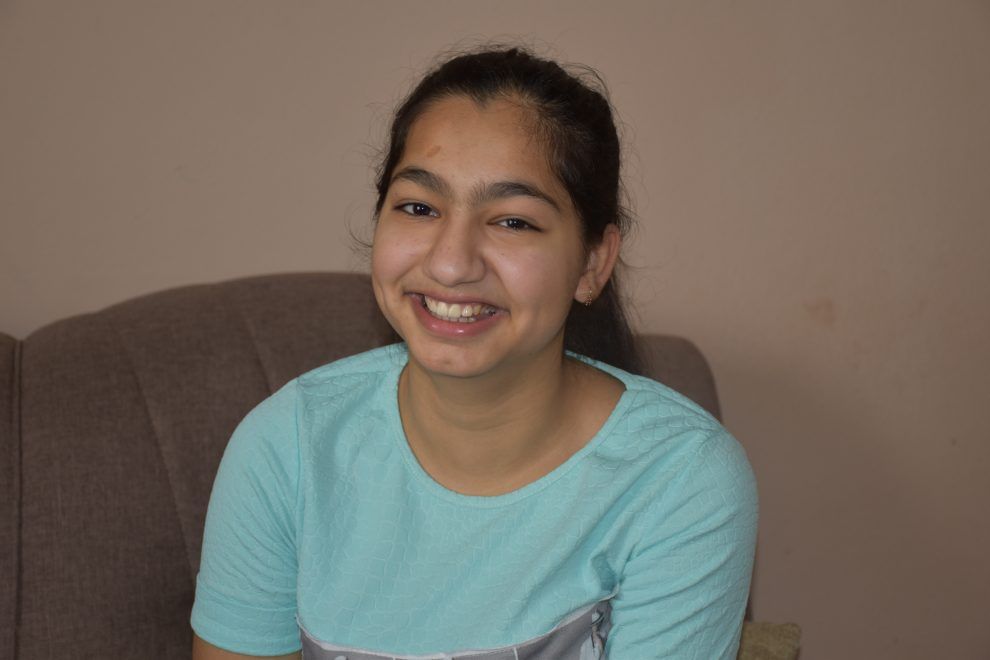
20.05. 2020
Jasmina Beriša, an excellent student of the eighth grade in the elementary school “Božidar Vuković Podgoričanin”, is a brilliant student and she is the best in every way, as the principal Ljubinka Nedić had told us.
During the conversation we had with her at her home, Jasmina honestly admitted that like all other children, she was happy about the fact that she would not go to school for a while when classes were interrupted due to the coronavirus. After the first two days, when the joy passed and the quarantine began as part of the #stay at home campaign, Jasmina, who wants to win the Luča award (an award reserved for the best students) at the end of primary school, feared that interruption of classes would disturb her plans.
Jasmina Beriša received a smartphone from Help as part of our aid program for support of the Roma-Egyptian population (RE) in Montenegro, the population which was particularly affected by the lockdown due to the COVID-19 pandemic. With the financial support of the German Government and Montenegrin Telekom, Help distributed smartphones with two-month internet packages for three schools which have RE pupils in Nikšić, Berane and Podgorica.
Jasmina was very pleased with the decision of the Ministry of Education to start online classes through the #learn from home campaign.
“When I saw that the teacher added me to the group, I was not surprised, online classes have started and we all had to join the “google classroom”. The problem was that we only had one smartphone in our house for all of us — the one that my dad uses, and he was at work every day, so we waited until the afternoon to join the classroom and we couldn’t turn on in time. That’s why we’d borrow Grandpa’s phone sometimes. ”
There are four children in the house, Jasmina’s siblings, and in addition to her tasks, she was also helping them.
“They are younger, as you can see, and they write very slowly, so I even had to manually copy the given material a little, considering that they don’t have all the material in printed form. I was very happy when the school announced that I would get a smartphone with internet. All of us are using it. It is much easier for me now, considering that I am an excellent student. I’m going to win Luča at the end of the ninth grade. I was afraid that I would lose that award because I had trouble with sending the homework. I was constantly late with homework, but Help acted at the right time and gave me a phone number through which I now send all my homework so I hope for a decisive success this year as well”.
She likes the new system of online learning and “google classroom”, she has adapted easily, teachers are constantly available on Viber groups for any additional clarifications, and if something is missing or needs to be explained they are always there.
“Everything is usually clear from the materials they send us, I may need an explanation for math and physics sometimes – but they are always available,” says Jasmina.
This brilliant 13-year-old, in addition to expecting Luča – a prestigious diploma (an award at the end of primary school) for which she is diligently studying, is already thinking about the next school choice. She says that she is hesitant between choosing medical high school and gymnasium because of her plans to study.
“I am hesitant between medical high school and gymnasium; I still don’t know exactly what I will chose but I still have enough time to decide.”
When it comes to medical school, it is clear why it is one of the options – profession of a doctor is attractive, but we asked Jasmina what would her goal be in the case that she chooses gymnasium.
“I am not completely sure. But since I am a golden advisor to the ombudsman, I would very much like to practice law. So I will most likely make a choice based on that, when I find out which direction leads the most to law. I can’t wait for the next school year when I’ll be in ninth grade, then high school counselors come to visit us and give us detailed explanations about both high schools and the directions that will benefit us most for future occupations. Right now, I am most interested in law. ”
The position of golden advisor to the Protector of Human Rights – Ombudsman opened the world of law to her. In that status, she now deals with the protection of children’s rights, and in 2019 she had the opportunity to ask questions to the President of Montenegro as the golden advisor to the ombudsman.
“On Children’s Rights Day in 2019, I was at the event in Cetinje, which was also attended by President Milo Đukanović, and I asked him a question, and it was from that moment that my engagement started. I am very glad that they invited me, and the principal of my school, Ljubinka Nedić is responsible for all of that. She first took me to a seminar where I met the institute of golden advisors and thanks to her, today I am also the golden advisor to the Ombudsman.”
We asked Jasmina what her question as a golden human rights adviser was for President Đukanovic and whether she got an answer.
“I asked President Đukanović why adapted access for children with disabilities has not been provided yet for schools and other institutions, as well as for other public places. In some places it existed but it was still insufficient and not in all places. And I got an answer from the president… but it wasn’t exactly the best answer, because he just said that he was working on it and that he had already answered that question earlier. The answer was not satisfactory because I wonder why they weren’t involved in it more, because children with disabilities are the same as all other children and they need to take care of that a bit more, that is why I don’t think I got a good answer to that question. ”
Still, she says that she is satisfied that a suitable approach for children with special needs has been set up in her school “Božidar Vuković Podgoričan”. There are two children with disabilities at her school.
“I am proud that our school has everything needed for children with disabilities. We organized a humanitarian event at the school once, where we raised funds for the operation of one child. Our school has everything needed, but it should be like that in all schools in Montenegro and in all institutions”, says Jasmina Beriša.
She is extremely grateful to the teachers of her school who, as she noted, did everything to help them adapt to the new learning system in the short time since the measures for the coronavirus pandemic began.
“Teachers have done a really great job and they are our heroes at this time and I thank them a lot for that. I really like how they adapted to this system and everything they did for us. Yes, we still have much more to learn. I’m in my room all day practically, my mother is also here and she knows how much time I actually spend studying. I haven’t been able to help her lately. Maybe I could say that the only problem is that now through ‘google classrooms’ we have a little more of homework, not to say too much”.
Since the Montenegrin Ministry of Education announced that after this experience there would be additional digitalization of classes for the next school year, and that students in all schools should receive tablets with lectures and online textbooks and do most of their learning in school, we asked Jasmina what she thought about it.
“Given that our future will be predominantly based on new technologies, I think it’s a great idea that we should already step into it as the first step towards such a future. For now, we have computers in the computer science room at school and we do a lot of things there, e.g. we prepare various presentations. So, if we get tablets for that, it will make it a lot easier for us and at the same time educate and prepare us to adapt to new technologies. ”
Jasmina’s mother Silvana and her grandfather, who were at home when we talked to her, confirmed that she is an exceptional child in every way, because in addition to her tasks, she regularly helps her younger siblings, and she is engaged in numerous other activities. As they say, they are very proud of her and they hope she will get far in life and continue to be an achiever.
The distribution of 120 smartphones to RE children is part of a comprehensive aid package to mitigate the consequences of the corona pandemic in Montenegro. Other measures include the distribution of food and hygiene parcels in 15 municipalities and towns of Montenegro. Help is implementing the Corona emergency assistance within the German government funded project: SOE-003 “Support to socio-economic stability in the Western Balkans region 2019-2020”.
Distribution of aid continued in Konik, Bajram Ljuboja refused to receive aid meant for him in favor of his neighbors
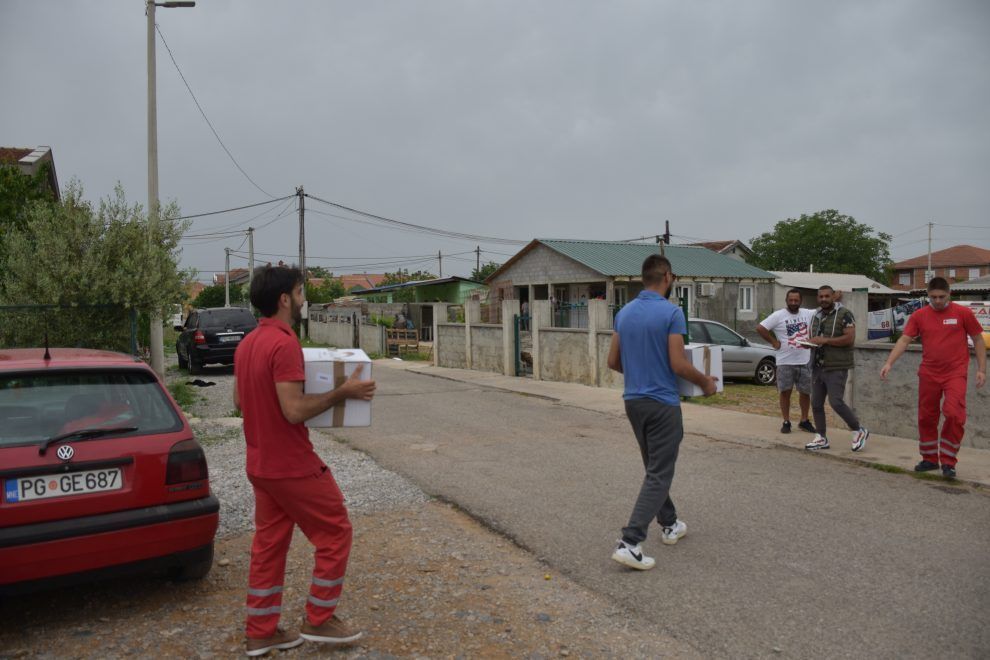
15. 05. 2020
The distribution of food and hygiene assistance packages for Roma and Egyptians continued in Podgorica, as well as for another number of socially disadvantaged families in the Montenegrin capital.
Today we witnessed the moment when in the settlement on Konik, Mr. Bajram Ljuboja and his wife refused to receive help even though he was on the distribution list and he referred us to a family that was not on the list, which as we were told, was much more disadvantaged, has more children and has no income at all. On this occasion we thank him for his human gesture.
Distribution will continue on Monday in the settlements of Konik, Vrela, Kakaricka gora, Tuški put, Dekar, Zlatica, Doljani and Golubovci. A total of 641 packages of hygiene will be distributed and the same number of packages of food, as well as bags of flour of 25 kg each.
This aid from Help, funded by the German government, is being distributed with the help of the Montenegrin Red Cross.
This aid is part of the SOE-003 project “Support to socio-economic stability in the Western Balkans region 2019-2020”.
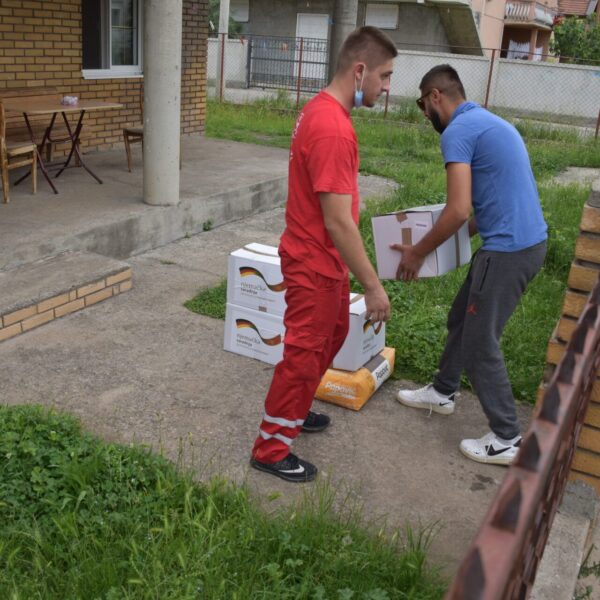
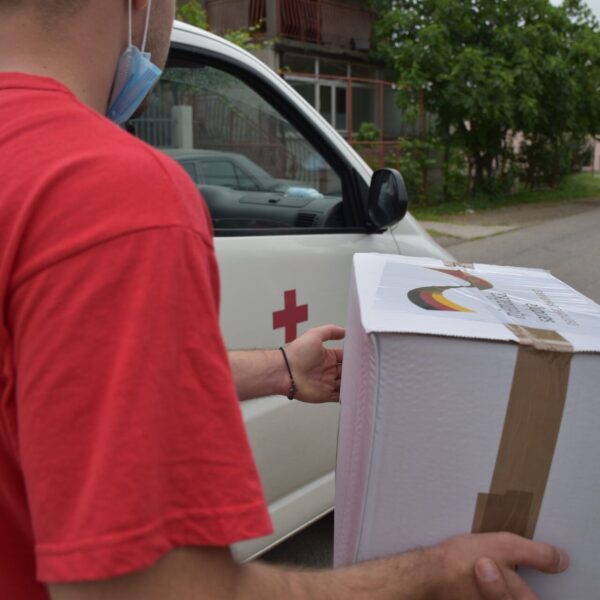
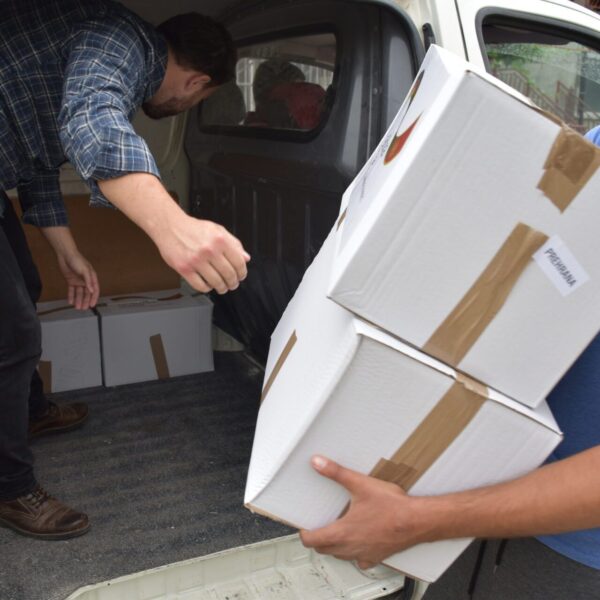
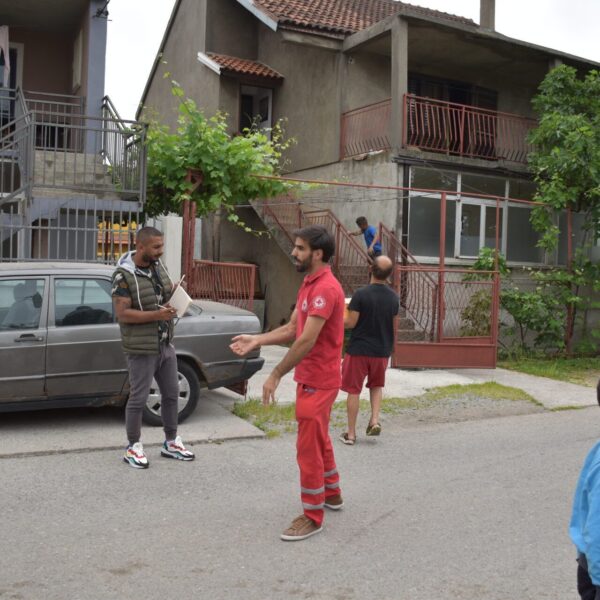
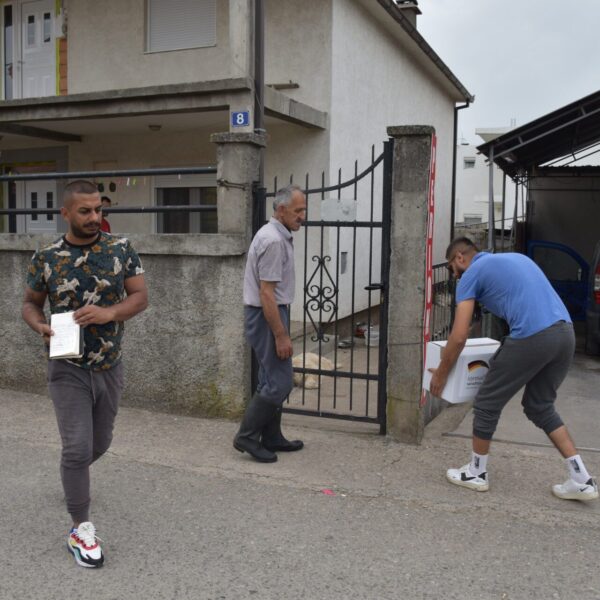
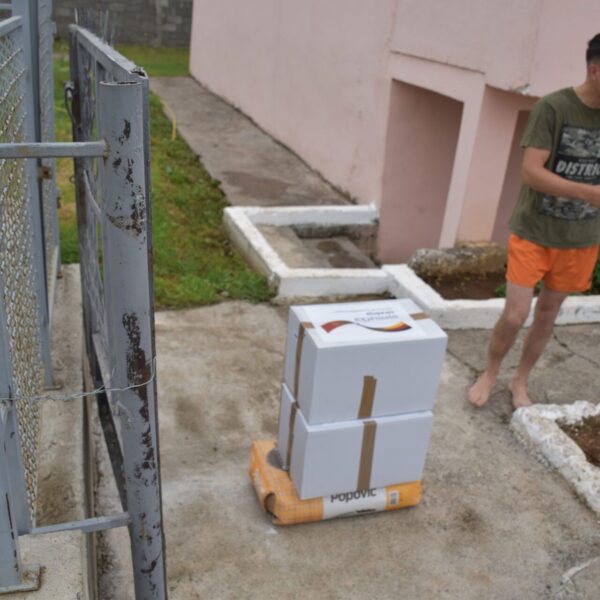
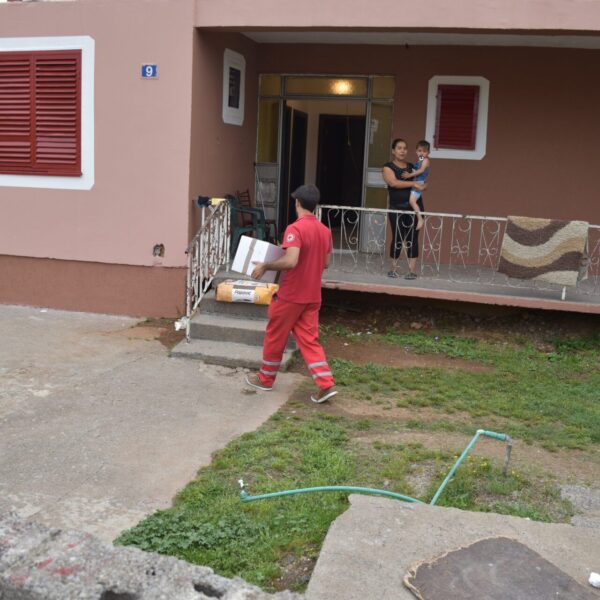
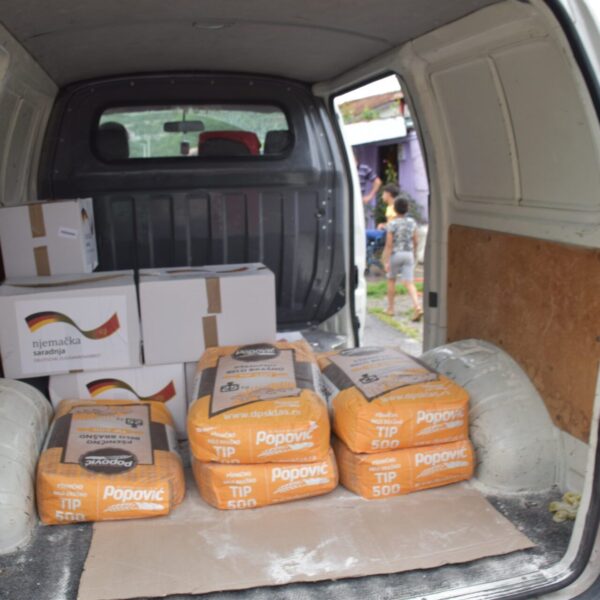
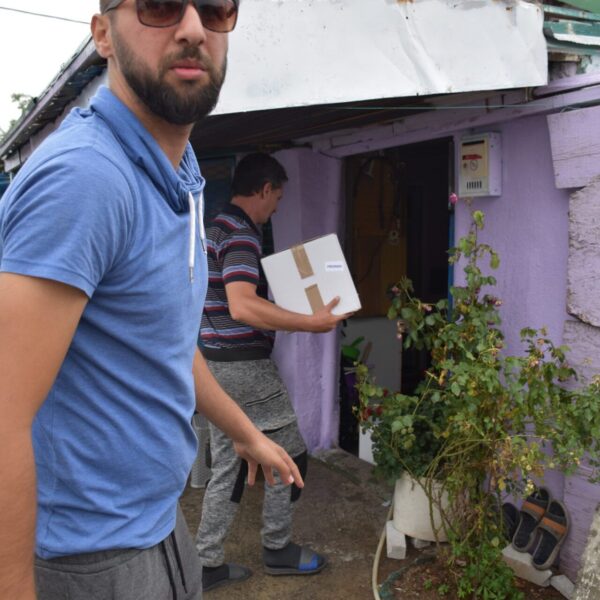
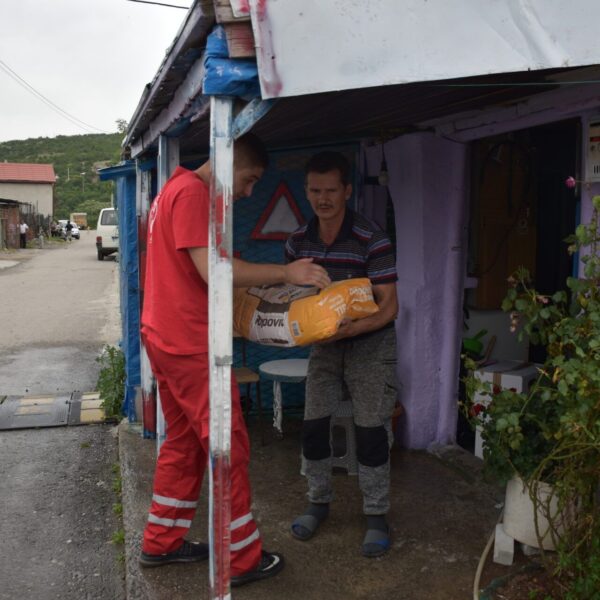
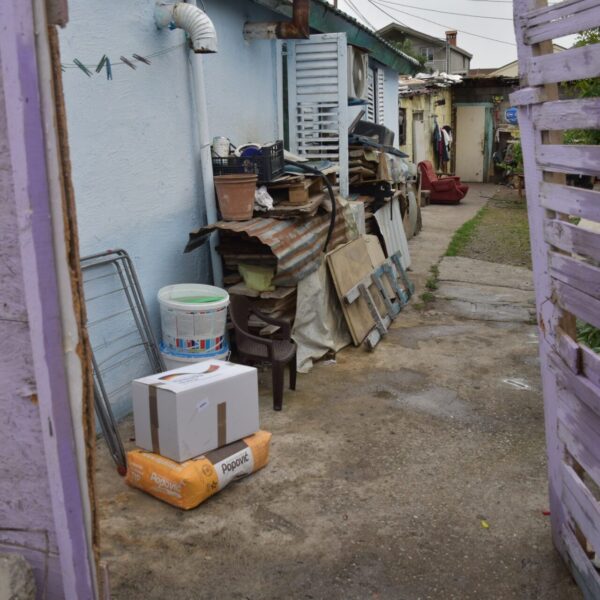
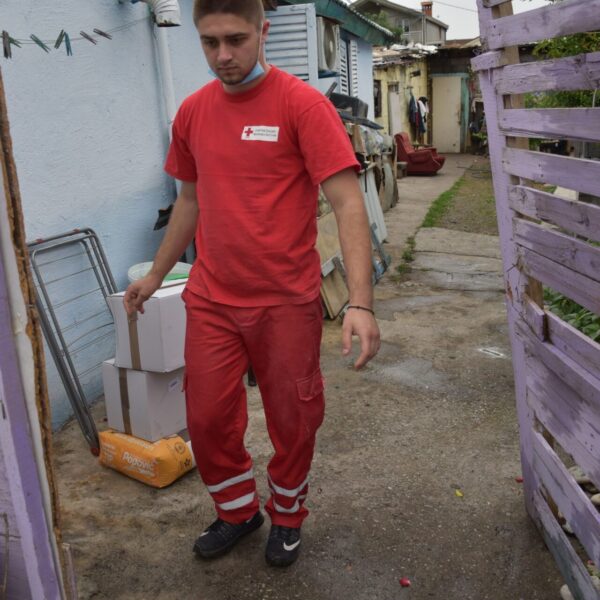
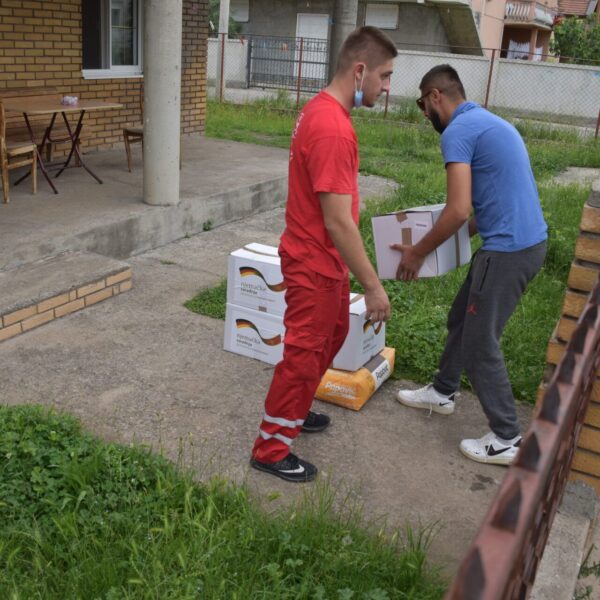
Distribution of food and hygiene packages has started in Podgorica
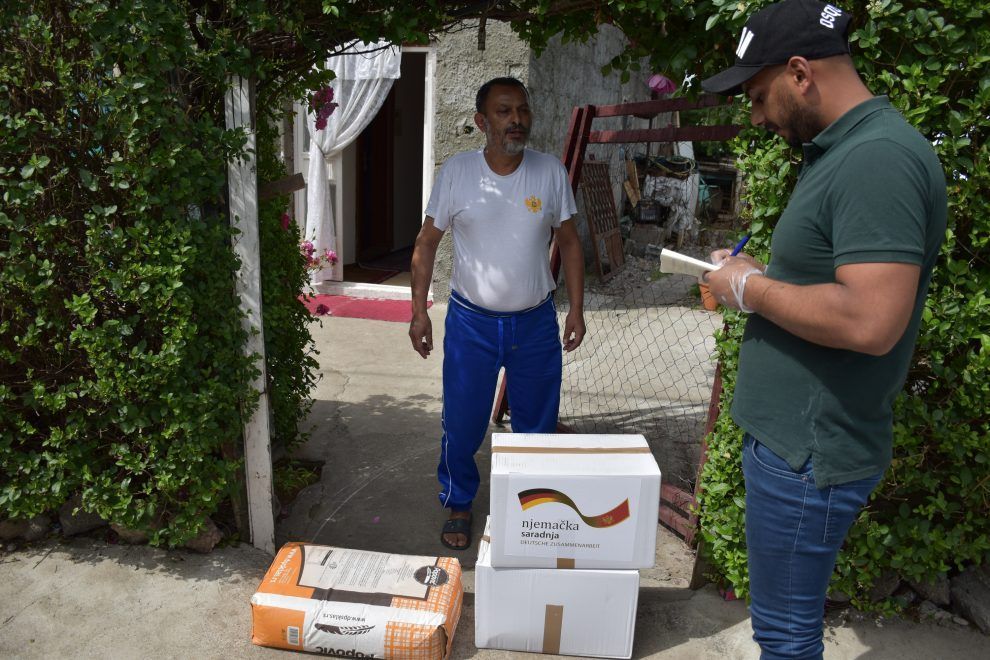
14. 05. 2020
In the Podgorica settlement of Konik, the distribution of food and hygiene aid packages for Roma and Egyptians began on Wednesday, as well as for a number of socially vulnerable families in the Montenegrin capital.
In the next few days, in the settlements of Konik, Vrela, Kakaricka gora, Tuški put, Dekar, Zlatica, Doljani and Golubovci, 641 packages of hygiene products will be distributed along with the same number of packages of food, as well as bags of flour of 25 kg each.
This aid from Help, funded by the Government of Germany, is being distributed with the help of the Montenegrin Red Cross.
This is part of the Project: SOE-003 “Support to socio-economic stability in the Western Balkans region 2019-2020”.
Distribution of aid packages continued in Tivat, Rožaje, Pljevlja, Kotor and Herceg Novi
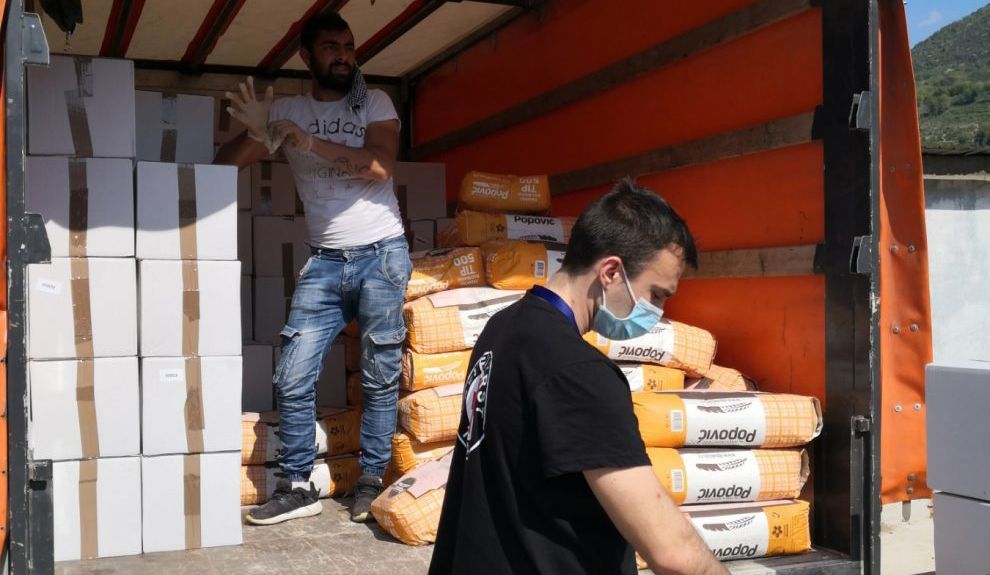
30. 04. 2020
Deliveries of aid packages from Help for Roma and Egyptians (RE) in Montenegro, consisting of food and hygiene products, continued on Wednesday and Thursday in Tivat, Rožaje, Pljevlja, Kotor and Herceg Novi. The aid has been distributed with the assistance of municipal organizations of the Red Cross of Montenegro.
This is part of the second aid package organized by Help in order to support the RE population in the struggle against the new coronavirus crisis. The aid is funded by the German Government.
In total, this action of distributing 1970 aid packages for the Roma-Egyptian (RE) community in Montenegro, consisting food and hygiene products, is worth almost 49,000 Euros. Over 1350 families receive aid in the 15 municipalities in which RE community lives.
Photos from Tivat:
Photos from the distribution of aid in Rožaje:
The RE community in Pljevlja also received help on Thursday:
Packages of food, hygiene and school supplies have been distributed in Nikšić and Bar
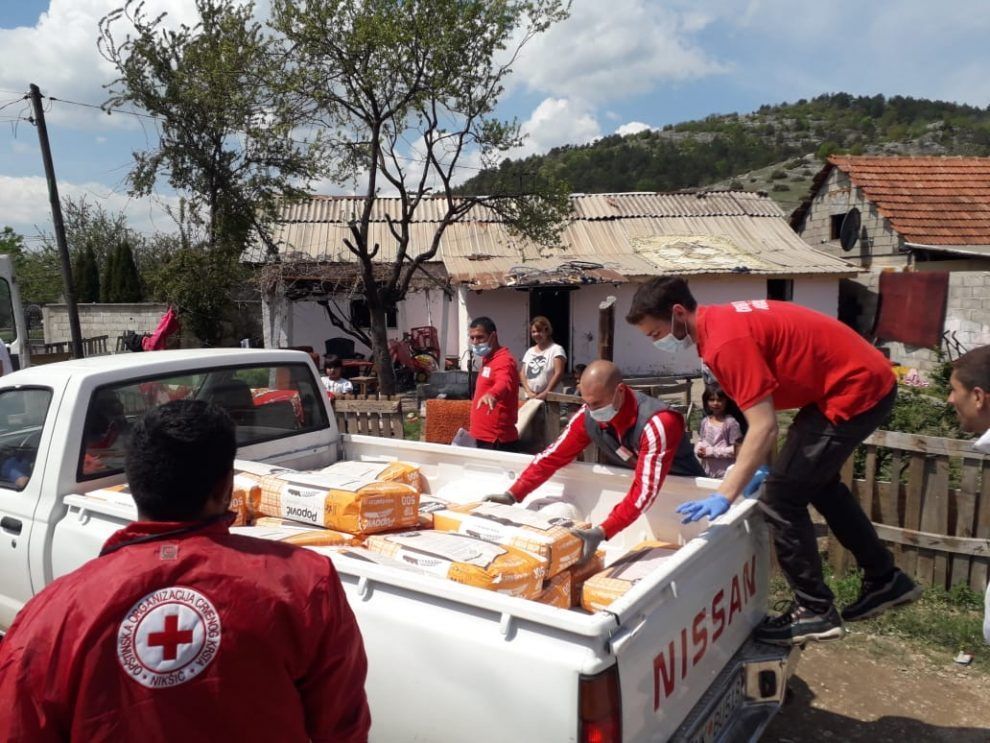
28. 04.2020
Help activists have distributed aid packages of food, hygiene and school supplies to Roma and Egyptians (RE) with the support of the Red Cross volunteers in Nikšić, and with the volunteers of the Montenegrin Army in Bar.
In Nikšić, 255 packages of food and as many hygiene packages were distributed to 214 families, as well as 255 25kg bags of flour.
In Bar, 126 packages of food and as much hygiene packages have been distributed, along with 3150 kg of flour. School supplies have been distributed as well.
This is part of the second aid package organized by Help to support the RE population in the struggle against the new coronavirus crisis. This aid is funded by the German Government.
In total, this action of distributing 1970 aid packages for the Roma-Egyptian (RE) community in Montenegro made of food and hygiene products is worth almost 49,000 Euros. Over 1350 families from 15 municipalities will receive this aid, and the action began on Friday with distribution in Budva and delivery of packages in Kotor. The action continued with the distribution of aid in Cetinje on Saturday, and the distribution of 20 more smartphones on Monday in Nikšić with the assistance of Montenegrin Telekom.
Photos from Nikšić:
In addition to the Red Cross activists, members of the Montenegrin Army assisted in distribution of the aid to citizens in Bar:
The distribution of aid packages has started in all 15 municipalities in which RE population lives with additional 20 smartphones
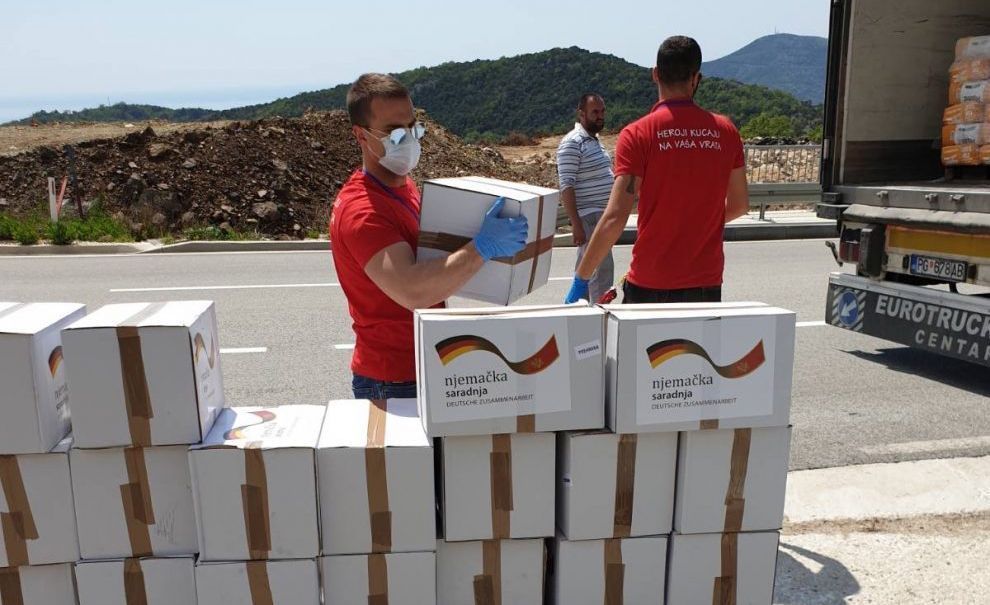
24-25- 04.2020
German government and Help began distributing new aid to Roma and Egyptians in Montenegro.
This action of distributing 1970 aid packages for the Roma-Egyptian (RE) community in Montenegro made of food and hygiene products, worth almost 49,000 Euros for over 1350 families in 15 municipalities, began on Friday with the distribution in Budva and the delivery of packages in Kotor. There will also be 20 smartphones distributed in Nikišić, with the help of Montenegrin Telekom.
This action which is implemented by Help and funded by the German Government, continues on Saturday with package deliveries to the municipal organizations of the Red Cross and distribution in Cetinje, Tivat, Herceg Novi, Bar and Ulcinj, and by the end of the next week, the packages will be distributed to other municipalities where the RE population lives.
Food and hygiene packages are being distributed through municipal organizations of the Red Cross of Montenegro in accordance with the recommendations of the National Coordination Body (NCB).
In total, assistance will be distributed in all municipalities in which Roma and Egyptians live in Montenegro: Berane, Bijelo Polje, Nikšić, Ulcinj, Herceg Novi, Bar, Budva, Kotor, Tivat, Podgorica, Cetinje, Pljevlja, Rožaje, Tuzi i Petnjica.
Apart from that, an additional 20 smartphones, 20 SIM cards with 30 GB internet for 2 months were provided for another 20 RE students from elementary school “Mileva Lajović-Lalatović” from Nikšić, once again with the help of Montenegrin Telekom. This has been done in order to support the #learn from home program, with total value in the amount of 2800 Euro.
School supplies worth around 3,100 Euro have been ordered for another 600 RE students, and the delivery will start on Monday, as well as materials for schools in Nikšić, Podgorica and Berane which are worth about 450 euros.
Last week, Help has already distributed 100 smartphones with the internet packages for two months in Podgorica and Berane, to help Roma-Egyptian children and their school mediators in the Ministry of Education’s #learn from home program, introduced as part of measures in order to suppress the spread of the new coronavirus.
The photos from Budva:
On Saturday we were in Cetinje, where among the Red Cross volunteers was one of the best Montenegrin handball players Drasko Kaluđerovic and educator Ivana Vujovic:
Empowering local organizations through the Charter 4 Change
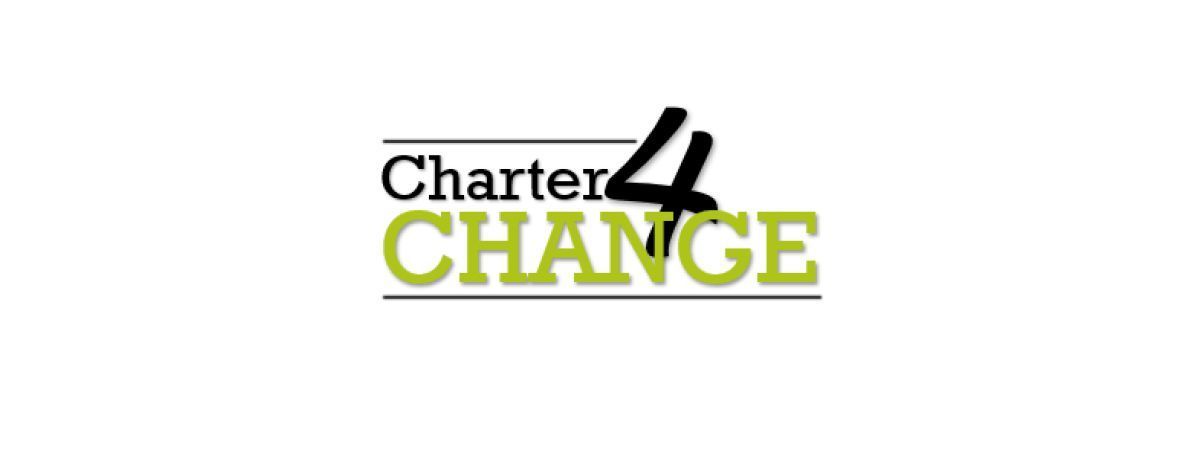
23.04.2020
Charter for Change is a document from 2019 signed by influential international humanitarian organizations, including Help, which have thus committed to upholding its provisions.
The aim of the Charter is to transform the way the humanitarian system works in order to allow local and national humanitarian and civil society organizations to play a bigger and more prominent role in responding to the numerous humanitarian crises around the world.
The 8-point Charter for Change underlines the numerous commitments of international humanitarian organizations designed to strengthen the capacity of local activists, increase the transparency of their work, and emphasize the importance of domestic organizations in humanitarian responses.
With the support of governments that are donors of humanitarian aid, the signatories of the Charter have committed to transfer at least 25 percent of humanitarian funding directly to local and national non-governmental organizations by 2020.
We convey the contents of the Charter 4 Change, which is also signed by Help – Hilfe zur Selbsthilfe

Localisation of Humanitarian Aid
We the undersigned organisations, working in humanitarian action welcome the extensive consultations
and discussions generated at the 2016 Istanbul World Humanitarian Summit (WHS) process.
Now is the time for humanitarian actors to commit to the recommendations arising through the WHS
process and deliver change within their own organisational ways of working.
We recognise that national and local actors can play an increased and more prominent role in
humanitarian response.
In the case of international NGO signatories:
-We commit our organisations to implement the 8-point Charter for Change by 2020 ensuring it is communicated effectively to staff, partners, donors and other stakeholders. We also commit to reporting annually on progress.
In the case of national and local NGOs working in partnership with international NGOs:
– We endorse and support this Charter for Change. We will hold our international NGO partners who are signatories of this Charter to account. We are actively seeking those who are not signatories to this Charter to sign up.
The 8-point Charter for Change
Point 1. Increase direct funding to national and local NGOs for humanitarian action:
As of 2017, only 0.4% of humanitarian aid was channelled directly to national non-government actors (NGOs and CSOs) for humanitarian work – a total of US$84.0 million out of US$27.3 billion1.
We commit through advocacy and policy influence on North American and European donors (including
institutional donors, foundations and private sector).
We encourage them to increase the year on year percentage of their humanitarian funding going to
national and local NGOs.
We commit that by 2020 at least 25% of our own humanitarian funding will be passed to national and
local NGOs.
We commit to introduce our NGO partners to our own direct donors with the aim of them accessing direct
financing.
Point 2. Reaffirm the Principles of Partnership: We endorse and have signed on to the Principles of
Partnership, (Equality, Transparency, Results-Oriented Approach, Responsibility and Complementarity)
introduced by the Global Humanitarian Platform in 2007.
Point 3. Increase transparency around resource transfers to national and local NGOs: A
significant change in approaches towards transparency is needed in order to build trust, accountability and efficiency of investments channelled to national actors via international intermediaries.
We commit to document the types of organisation we cooperate with in humanitarian response and to
publish these figures (or percentages) in our public accounts using the Interagency Standing Committee
(IASC) definition2 and the International Aid Transparency Initiative (IATI) standard3.
Point 4. Stop undermining local capacity: We commit to implement fair recruitment policies to
discourage the poaching of staff from national and local NGOs (as this severely undermines their capacity
to operate, particularly in the height of emergency response).
We will explore alternatives with our partners such as secondments, mentoring or supporting national
surge initiatives.
Point 5. Emphasise the importance of national actors: We undertake to advocate to donors to make
working through local and national actors’ part of their criteria for assessing framework partners and
calls for project proposals.
Point 6. Address subcontracting: Our local and national collaborators are involved in the design of
the programmes at the outset and participate in decision-making as equals in influencing programme
design and partnership policies.
Point 7. Robust organisational support and capacity strengthening: We will support local actors
to become robust organisations that continuously improve their role and share in the overall global
humanitarian response.
We undertake to pay adequate administrative support. A test of our seriousness in capacity building is
that by 2020 we will have allocated resources to support our partners in this.
We will publish the percentages of our humanitarian budget which goes directly to partners for
humanitarian capacity building by 2020.
Point 8. Communication to the media and the public about partners: In any communications to
the international and national media and to the public, we will promote the role of local and national
actors and acknowledge the work that they carry out and include them as spokespersons when security
considerations permit.
Signed by: (INGOs)
Asamblea de Cooperación por la Paz
CAFOD (Catholic Agency for Overseas Development)
CARE
Caritas Denmark
Caritas Norway
Caritas Spain
Christian Aid
Church of Sweden (Svenska Kyrkan)
Cordaid (Catholic Organisation for Relief and Development Aid)
CRS (Catholic Relief Services)
Danish Church Aid
Diakonia
Diakonie Katastrophenhilfe
Finn Church Aid
Help – Hilfe zur Selbsthilfe
HelpAge International
Human Appeal
lHumedica
ICCO
International Planned Parenthood Federation (IPPF)
Islamic Relief Worldwide
Johanniter International Assistance/Johanniter-Auslandshife Kerk in Actie
Kindernothilfe e.V.
Norwegian Church Aid (NCA)
Norwegian People’s Aid
Oxfam
Rescue Global
SCIAF (Scottish Catholic International Aid Fund)
Tear Australia
Tearfund
Terram Pacis
Trocaire
WarChild UK
World Jewish Relief
More on web site https://charter4change.org/
Smartphones with internet packages for 100 RE children delivered in Podgorica and Berane
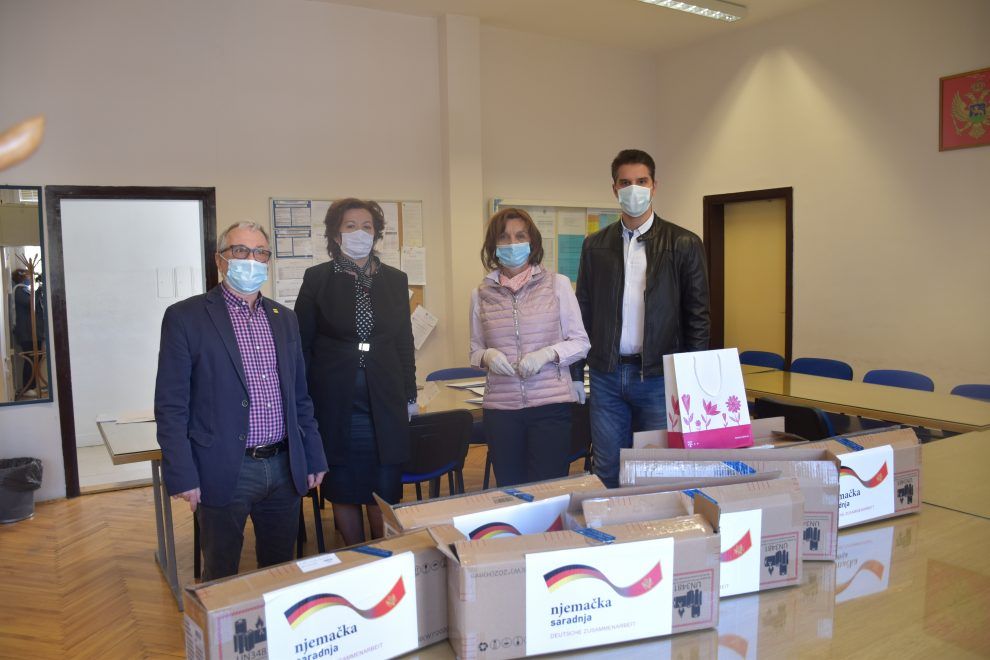
15.04.2020 – 16.04.2020
In Podgorica today, 70 smartphones with two-month internet packages have been delivered to the elementary school “Božidar Vuković Podgoričanin” for Roma-Egyptian (RE) children. Smartphones with internet packages were also delivered for school mediators who assist them in education.
Without the usually present voices of children, the school bell and the voices of teachers, but instead with them present inside their hearts, Regional Coordinator of Help Klaus Mock, together with Matija Otašević Telecom communications expert, have handed over the smartphones and SIM cards to the School Principal Ljubinka Nedić and only a few school mediators present, because of the measures of social distance. Smartphones and SIM cards will be further distributed to the children following the appropriate procedure.
Independent advisor Milica Pajović attended the event on behalf of the Ministry of Education of Montenegro.
Both Ms. Pajović and School Principal Ljubinka Nedić emphasized that this action is very important at this time, because of the coronavirus and #stayathome campaign because the Ministry of Education has undertaken a major step with the #learnfromhome campaign, which has enabled students to follow the schooling from their homes via TV and online.
They emphasized that the support from Help, with funding from the German Government and assistance from Telekom practically means that children from families with difficult socio-economic status, such as the majority of Roma and Egyptians in Montenegro, will fulfill their right to regularly attend classes trough the #learnfromhome program.
School Principal, Ms. Nedić especially thanked Help for their long-standing cooperation and support for this school, where the largest number of RE children in Podgorica attend classes.
Montenegrin Telekom’s Corporate Communications Specialist, Matija Otašević, pointed out that they were pleased with the opportunity to participate in the #learnfromhome program, so that due to the coronavirus crisis, all children in Montenegro would be able to fulfill one of their basic human rights – the right to education.
Today, Help activists also delivered another thirty smartphones and internet packages to the “Radomir Mitović” elementary school in Berane. These smartphones and internet packages were also for Roma-Egyptian children and school mediators.
This action was funded by the German Government with 73,900 Euros, and was supported by Montenegrin Telekom in the amount of 9,263 Euros.
This distribution of 100 smartphones is a part of a larger Help campaign, during which another 1650 aid packages will be distributed by the end of this month to 1396 Roma-Egyptian (RE) families, one of the most vulnerable categories of population, especially affected by the crisis caused by the Covid-19 pandemic. The packages will include food and hygiene products.
In accordance with the recommendations of the National Coordination Body, packages will be distributed by the Red Cross of Montenegro with the assistance of Help, in the Montenegrin municipalities of: Berane, Bijelo Polje, Nikšić, Ulcinj, Herceg Novi, Bar, Budva, Kotor, Tivat, Podgorica, Cetinje, Pljevlja and Rožaje.
Here are some of the audio recordings from today’s distribution of smartphones, SIM cards and internet packages in Podgorica, in the school hall of the “Božidar Vuković Podgoričanin”.
School principal Ljubinka Nedić:
Advisor in the Ministry of Education Milica Pajović:
Telekom Corporate Communications Expert Matija Otašević:
Here are the photos:
The German government and Help are distributing aid for Roma and Egyptians in Montenegro
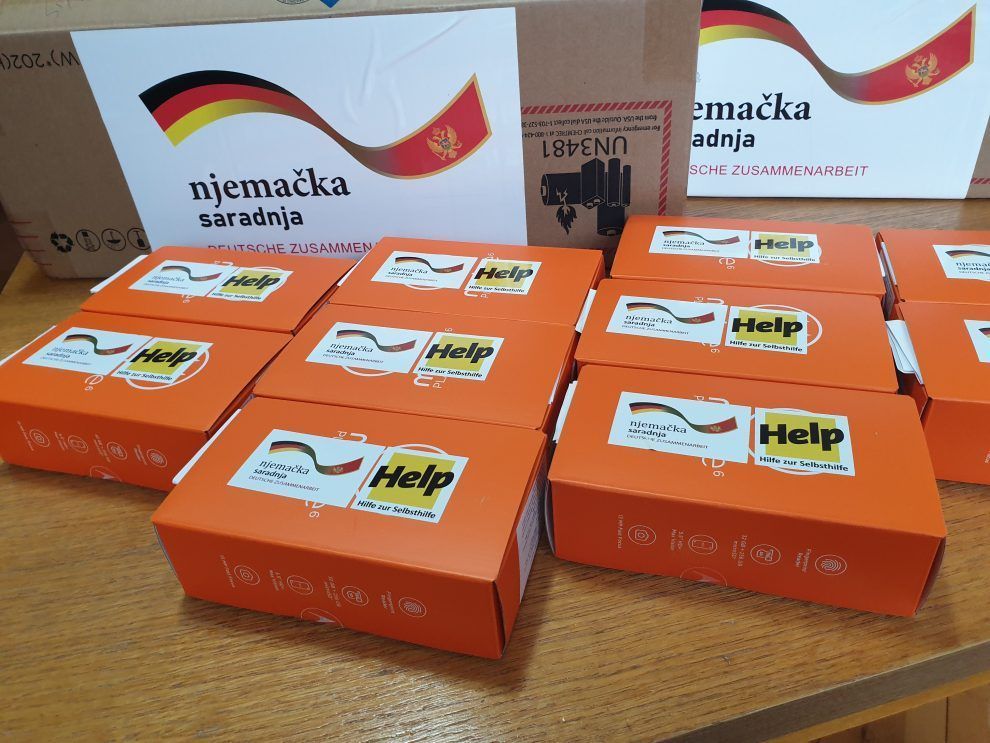
Over 1600 packages for nearly 1300 families, and 100 smart phones with support from Telekom
Another 1650 aid packages for 1296 Roma-Egyptian (RE) families will be distributed in 13 Montenegrin municipalities. In addition to food and hygiene products to the most vulnerable category of citizens in Montenegro, the Roma and Egyptian population, 100 mobile phones with Internet connection will be distributed for 100 RE children because of the coronavirus pandemic, in order to support the program #learn from home, taking into account that a large number of RE population do not have internet connection.
Another 12 phone SIM cards with mobile internet package valid for 2 months will be distributed to 12 RE school mediators who support RE children.
The value of this aid which is funded by the German government and that the Montenegrin Red Cross will distribute in cooperation with Help, is 82,900 Euros.
Company Montenegro Telekom has co-financed the cost of phones and the internet packages. Telekom also provided 12 SIM cards with 30GB of internet for 2 months free of charge for Roma mediators in Nikšić, Podgorica and Berane. The total participation of Telekom in this initiative is value of EUR 9263.76.
The packages will be distributed in the following municipalities: Berane, Bijelo Polje, Nikšić, Ulcinj, Herceg Novi, Bar, Budva, Kotor, Tivat, Podgorica, Cetinje, Pljevlja and Rožaje.
On Wednesday, April 15th in the Primary School “Božidar Vuković Podgoričanin” 70 phones will be distributed.
Gashi: When we overcome coronavirus, Roma’s new goal is entering in parliament
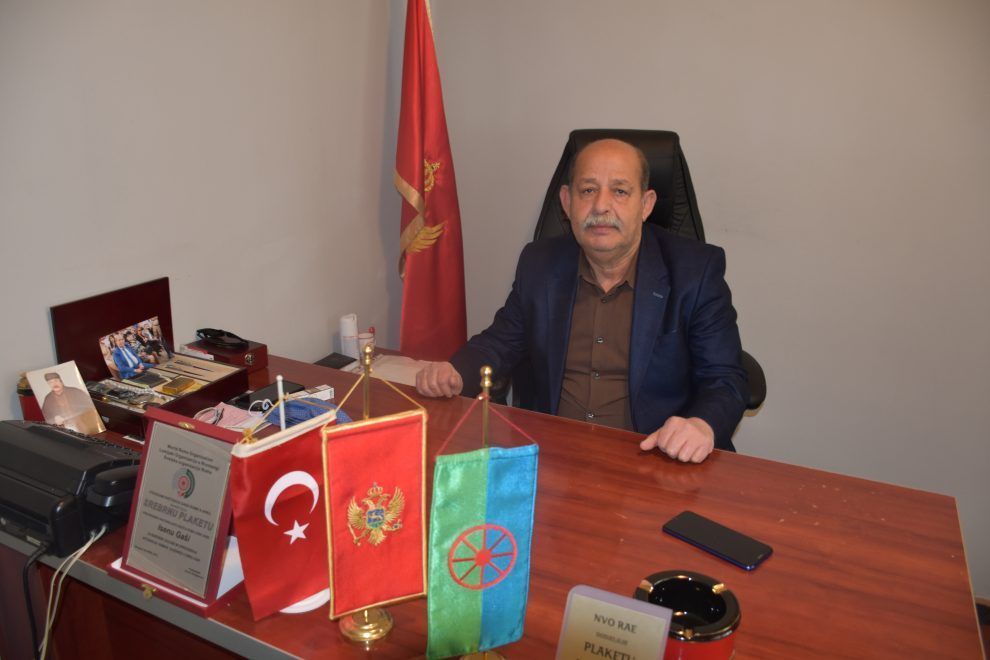
08.04.2020
The Roma Council in Montenegro is these days primarily focused on how to help the Roma-Egyptian (RE) population during the coronavirus pandemic, which poses a major challenge to this otherwise vulnerable population group due to their inadequate socio-economic situation. Our conversation with the President of the Roma Council, Isen Gasi, was mostly focused on this topic, but we also talked about the status of Roma people in Montenegro in general, as well as their needs and involvement in Montenegrin society.
Gasi points out that particular attention should be paid to the difficult position of the domicile Roma population, whose living conditions are described as particularly difficult, and he also announced political engagement through the first Roma party in Montenegro which will, as they believe in the Roma Council, guarantee a better opportuniy to fight for the rights of the Roma.
The interview iz part of project Civil society in action promoting and protecting Roma and Egyptian rights in Montenegro. The project is funded by EU and implement Help with the Roma youth organization Walk with us Phiren Amenca.
Help: Mr. Gasi, we are welcoming April 8th (International Roma Day) in a state of a worldwide emergency due to coronavirus, so we cannot omit this topic. I suppose the situation, when it comes to the Roma-Egyptian community, has been made even more difficult by the aggravating circumstances in which they otherwise live in?
Gaši: This has really surprised us, but I hope that everything will be okay. This traditional Roma holiday April 8 – International Roma Day will not be celebrated due to these difficult circumstances, because it is now a priority to protect people and provide them with security. We hope that, if the crisis is to continue during May, it might be nice to celebrate Đurđevdan and International Roma Day at the same time.
Help: Can you tell us, for this occasion, what are the main problems of your community in Montenegrin society, except for the coronavirus which has hit everyone?
Gaši: Before that I would say that, given the situation we are now in, we should provide and distribute as many aid packages as possible for the Roma community, which is the most vulnerable group in Montenegrin society, especially in these circumstances. Many of you from Help and the Red Cross have already intervened, but the situation is especially difficult now in Podgorica, as you yourself know. This is where the municipality promised us that it would help. These days, Mayor Ivan Vukovic was visiting the local community.
We had a small and expeditious meeting with him, about ten minutes in total, where we presented him with the situation, after which he announced on tv that the RE population would be satisfied with the distribution of food and hygiene products, and that 65 000 euros have already been allocated for this purpose. Assistance is also being organized in other municipalities, such as Niksic, where the municipality also participated in providing assistance for RE. However, the largest RE population is in Podgorica, and they are particularly affected due to coronavirus infection.
Help: What information do you have regarding the number of people who require immediate help?
Gaši: To tell you the truth, everyone does! Urgent help is needed for about 500 to 1000 families, so 1000 packages would satisfy some basic needs in these conditions. Nowaways, because of quarantine, citizens can not go to public kitchen in Konik, but food is being delivered to those who need it at their home addresses.
Help: You mentioned the municipalities of Podgorica and Niksic, what about the other municipalities in Montenegro where Roma people live?
Gaši: Good, no one has complained, everyone got something, whether from the municipality, the Red Cross or from Help. This is a good sign because they usually call us if something is wrong. But that’s for starters. In each municipality we have our activists with whom we now hold regular meetings to know what the urgent needs are. We have already distributed over a thousand masks and gloves so far, and we expect a new delivery of disinfectants, gloves and masks.
In the meantime, we provided water for one settlement with 40 members of the Roma community, because they did not have running water. Due to these circumstances, we organized this with several companies, in order to quickly dig and connect them to the water supply. It was an emergency, there were 500 meters of canal to be dug out but we managed, it was especially critical near the Dekar pump. And we also made one connection at Vrela Ribnicka.
We also organized the delivery of aid to the elderly and the disabled; there are not many of them.
You know that this situation is very difficult, especially on Konik which is quarantined. All these people are mostly without financial resources, without food, the only way for them to acquire it is to get it on a daily basis, either to get out of the house to collect secondary raw materials, or to work on a flea market. Now that they are blocked and unable to make money, they need much more than there was before. We are in constant coordination with the municipality, the ministries of labor and social welfare and health. Everyone on social assistance has already received 50 euros, as well as those members of our community who are employed in the city sanitation.
We are fully aware that this situation is difficult everywhere and that there are many who need help in different ways. We are watching on the TV what is happening everywhere, and luckily we reacted quite early here so we hope that there will be less consequences.
Help: Apart from this situation, how would you assess the position of Roma in Montenegrin society?
Gaši: Let me tell you, most of our problems escalated in 1998-99. when Montenegro received a large number of displaced persons, including a large number of Roma and Egyptians. The situation was difficult to maintain, and at that moment all of the resources which were intended to improve the material status of the domicile Roma, were allocated toward those who are displaced, which was good, but on the other hand as a result of that 80% of the domicile Roma population were left to live in difficult, not to say horrible conditions. Many of these people still live in barracks.
Everyone simply put focus on the displaced persons, I had the opportunity to visit Kosovo and saw that many displaced persons were allowed to return and were offered assistance to return, but many of them decided to stay in Montenegro, and there were programs for them providing permanent housing, while the domicile Roma, citizens of Montenegro – about 7000 and 8000 of them, are the ones who need to be given attention and they need help to get out of the extremely difficult conditions in which they live. According to our estimates, much less has been invested and done for their integration into Montenegrin society.
Help: Do you present this information in contacts with state institutions, ministries of minority rights and labor and social welfare…?
Gaši: We do, we also had a decade of Roma event and the Strategy, but the resources intended for the improvement of the status of the RE community mostly went towards the displaced and, to a lesser extent, to the domicile Roma. The right balance should really be made.
As for the Strategy itself, everything is beautifully written and even more beautifully planned, but unfortunately it is a dead letter on paper, which is obsolete and not being implemented. We stand for concrete things – so the key in these strategies is to provide quality education for Roma children, which is the main way for Roma population to escape from poverty, and for their quality inclusion in Montenegrin society on an equal basis.
Help: Political engagement has also been announced, through the Roma political party.
Gaši: Yes, I helped in order to make that happen. There are more members of the Roma population in Montenegro than there are Croats. They were allowed to reduce the census required to enter parliament from 0.7 percent to 0.35 percent. For years, we have been asking for this cencus to be reduced, since with our 0.35 percent we could have a representative in parliament and get a guaranteed representative, as the Croatian minority has. However, no one did that for us.
And if you do not have your own representative in parliament to fight for you, you will never accomplish anything, everyone looks at their own interest, the interest of their community, and we have always stood by the side. We are not even listed in the Constitution as a minority, but rather listed as we belong to the rest. And we got the impression that it was the time we had to start fighting for ourselves, which is why a political party was formed. It is not too late, we are still on time, because something concrete can be realized only in this way.
We expect to be involved in the next elections in the fall if everything goes well and things return to normal.
Help: What is the interest in the community, for the Roma political party?
Gaši: We will work on this and I think it will be significant, I believe that we will be supported by others, not only the Roma population, but also by Egyptians and Albanians, Bosniaks, Muslims… You see, when our voice starts being heard in the Parliament, the situation will be different and it will not be possible anymore to make promisses and not do anything about it.
Biljana Jovićević
Roma people are victims of “environmental racism”, help has never been more urgently needed for the Roma communities
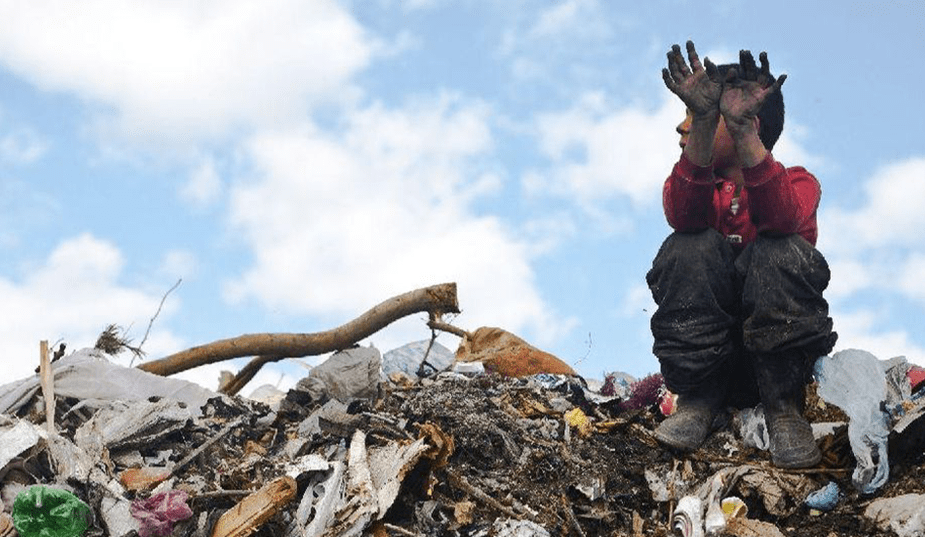
Located in settlements that are cut off from running water, sanitation and access to health care services, the Roma communities are particularly vulnerable to COVID 19. It is in everyone`s interest to help them, according to BIRN’s research paper on the Roma population, published on the occasion of International Roma Day – 8th April but also because of the current coronavirus pandemic, which has already claimed more than 82,000 lives, affecting nearly one million and a half people worldwide.
In a separate report from the European Environmental Bureau (EEB), it is stated that European Roma communities often live on polluted wastelands and lack running water or sanitation in their homes as a result of “environmental racism”.Countries across Europe have made blockades trying to stop the spread of COVID-19 by restricting movement, closing schools and businesses and applying social distance.
But not all people live in conditions that allow them to follow such rules.
For hundreds of thousands of Roma in Central and Southeastern Europe, this is almost impossible, according to four authors of the BIRN`s analysis.From the Czech Republic, Hungary and Slovakia, to Bulgaria, Romania, Kosovo and Serbia, Roma are often restricted to moving in crowded settlements with limited access to infrastructure, including clean water, sanitation and sewage.
Their problems have been neglected in recent decades by the governments of these countries, as the authorities have neglected to legalize Roma settlements and provide basic services there. The coronavirus is now threatening with dire consequences for the residents of these settlements and society as a whole.
The economic impact for vulnerable Roma will also be catastrophic. Targeted assistance for Roma communities has never been more urgent, it has been reported.
The most obvious problem is the inability to socially distance themselves when so many Roma families live in tiny apartments, with many people crammed into one or two rooms. There are streets outside that are also crowded, with little or no open space.
Another major obstacle is the inability to learn from home, as is practiced in most of the world these days.
However, many Roma families do not have internet, computers nor electricity. Meanwhile, local centers for the education of vulnerable families are closed.Primary school pupils in countries such as Northern Macedonia and Serbia may benefit from more accessible television lectures. But even with TVs and electricity, such distance learning is difficult in a busy apartment consisting of one bedroom or barracks.
At the same time, Roma parents who are illiterate themselves cannot help their children learn from home. We may expect many Roma children to lose their entire school year or drop out of education altogether. Education is one of the most critical points when it comes to the Roma population, everywhere.
Many Roma, even those with some small private businesses, are not officially registered, which excludes them from the possible support provided by governments for SMEs. Social care in most of the countries in Western Balkan is of limited capacity.
It should also be remembered that many Roma families have neither the money nor the storage space for food and cleaning products. Even if they could, how can parents explain to hungry children that food from home is not meant for today, but rather for the next week?
All the relevant information shows the urgency of helping Roma communities – and not just for the sake of helping the Roma.
This is a virus that does not discriminate. If the poor Roma settlements get affected, the consequences will not apply to the people living in them. Authorities should prepare for the long-term implications of this. BIRN researchers indicate that a plan should be specifically created to prevent Roma from becoming “scapegoats” if the infection rate breaks the ceiling in places with large Roma communities.
Whether motivated by rumors or just plain racism, attacks on Roma have taken place throughout the Western Balkans and beyond. It must be remembered that the decades of collective neglect in all societies have made their position worse than that of any other community.
Life near or at landfills or industrial waste – environmental racism
Thanks to this neglect, they have for the most part lived and survived for decades in areas susceptible to infestation, near or at landfills of industrial and other waste. This is precisely what the European Environmental Bureau has said in a statement when they openly called it “environmental racism”.
The EEB, a Pan-European network of green NGOs, has concluded that Roma communities are often excluded from basic services such as running water, sanitation and garbage collection, while often living in or near some of Europe’s dirtiest places, such as are garbage dumps or contaminated industrial lands.
About 10 million Roma live in Europe, including 6 million in the European Union. While their social exclusion is fairly well documented, EEB researchers have stated that denial of basic services and their exposure to pollution has been neglected.
This network of green NGOs, in collaboration with researchers in Central and Eastern Europe, identified 32 cases of “environmental racism” in five European countries: Hungary, Bulgaria, Romania, Slovakia and Northern Macedonia. The researchers also referred to the existing working and living conditions of Roma in Bosnia and Herzegovina, Serbia, Montenegro and Kosovo.
Lack of water supply, sanitation and garbage collection, were present problems in more than half of the cases considered, such as in Stolipinovo in Bulgaria, the largest Roma settlement in Europe and part of Plovdiv town. An estimated 60,000 people live in the district, but many of them are cut off from plumbing and sanitation from the rest of Plovdiv – the European Capital of Culture in 2019.
In Hungary, access to public water supply has been cut off for some Roma communities during the summer heat – a decision that affected 800 people in Gulac and 1,500 residents of Husartelep in August 2017. The northern Hungarian city of Ozd received nearly 5.5 m euros from Switzerland to improve the provision of running water for Roma communities, but researchers say that many have not benefited from the scheme. Authorities, on the other hand, claimed that Roma households did not pay the bills.
Previous research has found that only about 12 percent of Roma communities have functional toilets with sanitary facilities and wet facilities.
One vivid example of the bad conditions in which Roma can be found living is Pata-Rat, on the outskirts of Cluj-Napoca in northwestern Romania, known for its Gothic architecture and Baroque palaces.At Pata-Rat, about 2,000 Roma live near or at the landfill.
“It’s frightening,” said Roma rights activist Ciprian Nodis, who has visited the site several times.”It’s similar to what you see in the favelas of Rio de Janeiro. People live in extreme poverty with no access to utilities, no access to electricity, water. They live in improvised shelters made of recyclable material that they usually find in the landfill itself – cardboard or rotting wood or things like that. Most of them work in a landfill. ”
He identified four separate Roma communities living in Pata-Rat: the first group came in the 1960s, with the most recent arrivals from 2013 when Roma residents of Cluj-Napoca were moved from the city center. The least fortunate community of four in total, lives in the landfill itself, where air, water and soil are deeply polluted.
“It’s a living hell, especially for children born there. It’s a bad luck to be born in Pata-Rat,” Nodis said.
But Pata-Rat is not even an exception.
Researchers have identified even more Roma communities living next to the landfill site of the Faculty, near Sofia. On the outskirts of a city in Transylvania-Turde, Roma families live in a former industrial place contaminated with mercury. Of course, it is not surprising then that 32 case studies found that Roma were susceptible to respiratory and infectious diseases, incidents and depression.
Meanwhile, Roma communities that do not live in degraded land, risk their eviction, and are without legal protection. About 100 Roma living in Constanta, Romania were forced to relocate to allow the construction of a resort.
Patrizia Heidegger, co-author of the report and director of global policy and sustainability at the EEB, said the 32 Roma cases listed are just the tip of the iceberg.
The denial of basic services has persisted, despite the fact that Roma communities have lived in the same villages and towns for many years. The lack of water or sanitation is not because “they have not lived in one place for a long time. Indeed, it is a complete neglect of the area with the Roma population. “
The problem is more complicated because Roma communities themselves are often accused of polluting and degrading land, she said.
“They are perceived as an environmental problem and not as a community disproportionately affected by exposure to pollution or the failure to provide environmental services, which then degrades their environment,” Heidegger says.
Roma communities face enormous prejudice, said one of the authors of the report, stating that “prevailing attitudes such as ‘they don’t care about the clean environment, they don’t care where they live, they work in landfills and they live there..’ They are racist prejudices,” she concluded.
The European Environmental Bureau is now calling on the authorities and EU Member States to step up their efforts to protect health, while urging them to recognize the scale of the problem.
“We must admit that environmental racism exists in Europe. It’s the first step, “said Patrizia Heidegger, as reported by The Guardian.
Biljana Jovićević
This is part of project Civil society in action promoting and protecting Roma and Egyptian rights in Montenegro. The project is funded by EU and implement Help with the Roma youth organization Walk with us Phiren Amenca.
On International Roma Day – we present to you the Roma future
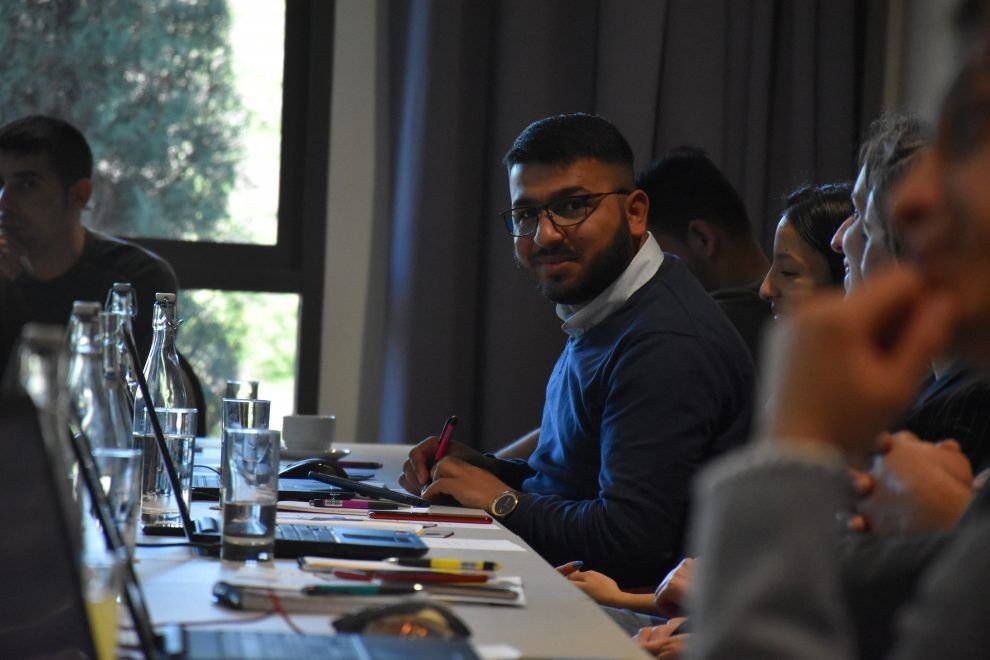
08.04.2020
You cannot fail to notice him at NGO gatherings; he is active, always smiling, kind, articulate and persistent. A true role-model not only for the RE population, but generally for the whole generation of young aspiring people with goals, who are ready to do whatever it takes to achieve them.
Nardy Ahmetović, a young 21-year-old from Niksic, born in the Italian city of Maddaloni, is the coordinator of the Center for Affirmation of Roma-Egyptian Population and a Red Cross volunteer activist since he was 15. He dreams of opening a museum of Roma history and culture one day and to tell the story of a nation that has endured many things for centuries but has never, ever waged war.
In the break between the many commitments he has made these days as a Red Cross activist during coronavirus pandemic – which has brought the whole world to a stop, but which has at the same time engaged staff and volunteers of the key services in a society; Nardy found some time to commemorate April 8 – International Roma Day, by answering several questions about his community, it`s position in Montenegrin society, the problems it is facing, but also to answer those questions about his dreams, including the one about the Museum of Roma History and Culture.
The interview is part of project Civil society in action promoting and protecting Roma and Egyptian rights in Montenegro. The project is funded by EU and implement Help with the Roma youth organization Walk with us Phiren Amenca.
We will be starting with the impact of the coronavirus on the RE community because, among other reasons, the entire RE settlement on Konik in Podgorica has been quarantined after a member of the RE community tested positive for COVID-19.
Help: This year’s International Roma Day is welcomed under significantly different circumstances – during the coronavirus pandemic that has not omitted the Roma community. How much does this situation complicate the social conditions in which the RE community lives?
Ahmetović: International Roma Day is not forgotten by us Roma people, because it is a day that means a lot to us, it is a confirmation of our existence and identity. On the other hand, the pandemic showed yet another form of discrimination against us. For example, it was evident in all portals and media that have written about the case in Vrela Ribnicka, – the comments on these articles made by the majority population are proof of this. You know that RE community is most often without permanent employment, they usually do a day’s work or sell on flea market, collect secondary raw materials, and also have little or no social benefits at all. Therefore, it is very difficult for all citizens of the RE community, and all Roma settlements are at risk.
The RE population has largely faced poverty and poor lifestyles for decades. I am not saying that the Government of Montenegro is the only one responsible for this, we are also responsible for what has been happening to us during past years. This is because no one will fight for you unless you take the steps towards a better future, first for yourself personally, then for the future of your children, and then for the future of your people – for all of us… Young people still marry without being materially secured, they do not finish elementary schools – let alone high school, or should we say that few of them do finish. In doing so, I wonder: what is the quality of the knowledge they receive? For some, the only thing that matters are the number of the enrolled students in the following year. However, I cannot fully answer this question, we should all think about this, first RE population ourselves, and then others from many public institutions should think about it as well.
Help: How do you assess the treatment of the Roma community by the state in the context of this pandemic?
Ahmetović: As you know yourself, civic initiative UPRA (Civic Initiative of the United Roma and Egyptians), of which I am a member also, has not yet received a response, despite initiatives and letters sent to the Government of Montenegro. I hope that the answer will follow as soon as possible, because the increase of the infected is predicted in the coming days. And on this occasion also, I urge them to consider what we have sent to them. As an activist and volunteer who has been volunteering and working with the community for 5 years, I am very disappointed. I know that the Government does not have enough different capacities to care for everyone in the same way, but everyone deserves an answer, if not even recommendation, so that we can all find a model to help vulnerable groups.
Help: You have been a Red Cross activist yourself these days – why?
Ahmetović: Look, I grew up in a single-parent family, so I really felt what it means to have or not to have enough. Because of this, the Red Cross was many times like a “second home” to me, and their volunteers have been my family. It is in my nature and I like to help people who do not have enough, I love when I see a smile on a human face because of support or a kind word, I also like hanging out with volunteers, and CKCG has also given me various trainings.
Helping is something I have been doing since I was little, from the age of 7 and a half, when I first arrived from Italy and did not know how to write my name. The visit to the Red Cross was due to an appointed examination at dentist for Roma who do not have regulated documents, and at that time I did not have the documents, nor did I know the official language. Former Secretary Mido D. was a real hero to me, he presented me with my first ball, which I thank him for today. That’s where I fell in love with the red uniform. I have been attached to them ever since and after I graduated from elementary school, at the age of 15, I decided to apply to the Red Cross Volunteer Youth Club.
From 2015 until today, I have been a volunteer and I have had the great honor to learn from senior volunteers like Dragan Nikolic, I like to say that he is my mentor.
We have been visiting day care centers for the elderly together before this pandemic started, and we were implementing the „Healthy aging (Zdravo starenje) “program with them. Also, I have to mention a very important person for me, my mentor Marijana Blečić, who volunteers to help me with all my writing tasks and gives me instructions for everything I need without asking for compensation.
I met her at an important meeting, on a seminar held every two years with the Council and the Government of Montenegro, she helped me write the first project on which we were mentored by her. After the project has been completed, we are still connected and our relationship is stronger than ever. Marijana is helping us selflessly, she even donated the complete equipment to the NGO CARAEP office (Center for Affirmation of the Roma-Egyptian Population), and in this situation she had an understanding for our population and donated over 40 liters of shampoo, just as much soap, and a number of face masks. I wish there were programs that provided this kind of support which I have from Marijana.
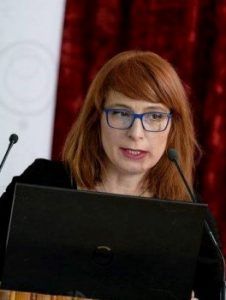
A lot of work is being done about it, but there are still not enough well educated Roma people
Help: How do you assess the general situation in which the RE population is now – whether anything has been achieved – and what has, in improving the position of your community in Montenegro, and what yet remains to be done?
Ahmetović: It is very difficult to answer to this question, there is a lot of work being done when it comes to education, housing… but it is not enough – since we do not have even 25 Roma in college, 25 young people who have attained higher education … There about 2000 high school students, and the quality of knowledge of Roma high school students is very poor. Why am I saying this? Because I work with young people, and I see that most of them do not know how to write their names even now, let alone continue high school smoothly.
The Government of Montenegro has signed a document that will promote better inclusion and preservation of the Roma identity, I hope and I am sincerely optimistic that NGOs and the Roma Council will do their best to offer quality guidance with the Government and other relevant institutions to be equal partners in order to improve the position of Roma.
Also, when it comes to promoting and preserving Roma culture, there is very little work on the subject; housing is a big problem for almost everyone, because almost all refugees have been granted housing, but what about the domicile Roma people, who are mostly living in worse conditions in Montenegro – they have been completely forgotten.
Help: You are a young man, you belong to a new educated generation – how many of your people are ready and able to follow your path?
Ahmetović: I sincerely hope that the younger generation will have more young educated and activist-minded Roma than is the case with my generation, in which there are very few of us. My opportunities during regular schooling were rare, I almost didn’t have them, but I didn’t lose hope.
I am currently in high school and I am paying part-time exams for myself, because I had started my education in elementary school late, due to lack of knowledge of language and the lack of documents. I tell all young people that the only way out and our main weapon is the education and the will to succeed. I grew up without parents, I have two sisters who are also graduating from high school, and I have struggled a lot in my life, but I do not regret anything, because if I had not tried, you would not be doing an interview with me today.
Help: What is your goal in life, how do you see your future?
Ahmetović: My goal in life is to be a good man first, good and humane. Then I’ll choose a college, I haven’t decided yet, though I want to be a social worker or an educator, so whatever happens…
Help: I also know that you dream of opening a museum of Roma history and culture one day…
Ahmetović: And I hope it will come true one day… I’m optimistic. I dream to make this question open – for a museum of Roma culture, because a nation without culture is not a nation at all! I direct all my work and activism in this direction, to bring the rich traditional Roma culture closer to the majority population… so that something remains after us, so that children and the new generation may know more about their identities. So that new generation doesn’t look like mine, which does not know where they came from as a people or when did the Roma first come to Montenegro. You see, in the sixteenth century, for the first time the Roma came/were noticed, they were slaves all their lives, they were divided into several groups… there is a lot to talk about and read, but unfortunately we have many illiterates and those who are still calling themselves “gypsies”. That word which has the worst meaning a person can think of, comes from the Latin word… for people who do bad things, they are told – not to be Gypsy. It is unfortunate that most people do not know what that one world means. We are a nation that has endured anything and everything for centuries, but the Roma have never waged war!
A people who loves to travel, loves music and craftsmanship… a peaceful people.
Biljana Jovićević
Distributed 226 aid packages to Roma and Egyptians families in Nikšić
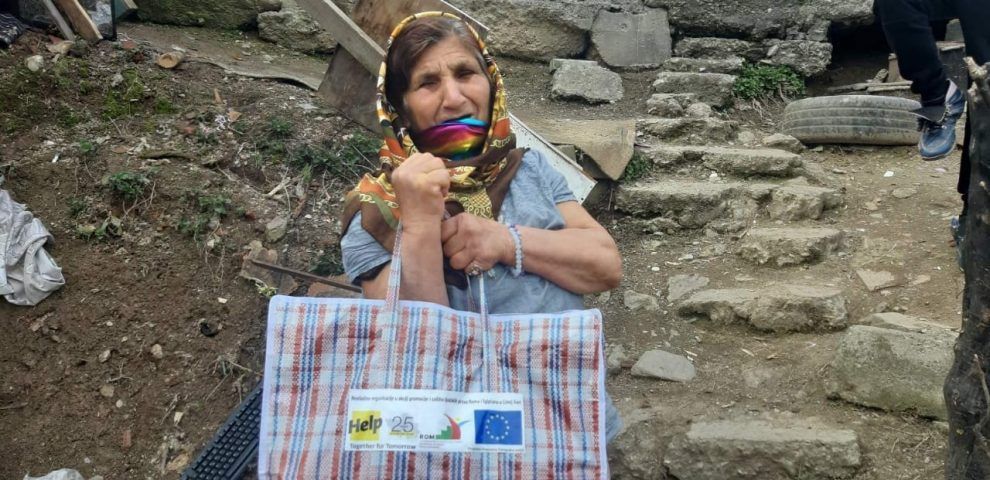
28.03.2020
Last Saturday, 226 emergency aid packages were distributed to the most vulnerable RE families living in five settlements in Nikšić inhabited by Roma and Egyptians, the most vulnerable category of population. This aid, in response to the crisis caused by the effects of the coronavirus epidemic, has been distributed to over 2000 people in settlements: Željezara, Gračanica, Gvozdence, Humci i Zverinjak.
Alongside activists from Help, the aid packages were also distributed by the colleagues from the partner NGO “Walk with us Phiren Amenca”, in coordination with the representatives of the Red Cross, while the operation was funded by the European Union.
“All of us enjoyed this action today, and the fatigue feels good. It’s good for the psyche in these moments too, especially when we realize that we have all contributed to the fact that more than 2000 people will not worry about food for a while. It’s good when you act in the interest of a good and better cause..”This has been the motto of Help for years,” colleague Dženan Demić said, after the action ended that night. He has been working hard on all the necessary details in the last few days to ensure the delivery of aid to the most vulnerable of all categories in Montenegro, the RE population, as soon as possible.
“It was a pleasure to be a part of this action, together with our colleagues from the Roma youth organization ‘Walk with us Phiren Amenca’, in order to help people in such difficult situation,” said our young activist Dijamant Pajazitaj. He added that: “As long as there are young people who willing to work, everything will go well “, which was an encouraging thought.
Alongside Dženan and Dijamant, other activists from Help participated in the action in Nikšić: Denisona, Milivoje, Ibrahim and Lazar, as well as young activists from “Phiren Amenca”.
Regional Coordinator of Help, Klaus Mock, has been invited to be a guest on Saturday’s RTCG program, “Good Morning Montenegro”, where he outlined our efforts as part of a broader action, “within which a total of 600 aid packages were distributed to about 400 families of Roma and Egyptian population in Herceg-Novi, Berane and Bijelo Polje. The total value of these 600 packages was about 12,400 euros. ”
As he emphasized in the interview for RTCG, “this would not have been possible without the European Union, which played a key role by quickly authorizing us to divert the funds intended for other activities in our current project for the RE population, towards distributing emergency humanitarian aid in response to the crisis caused by the coronovirus epidemic.”
“We knew immediately that we needed to respond quickly in this emergency situation, together with our partners from Phiren Amenca, because this crisis has a terrible impact on the Roma and Egyptians which is the most vulnerable population in Montenegro. The EU immediately approved our request, and we are very grateful to them. I believe that in this way we will help the RE families by making it easier for them to deal with a difficult situation in which they find themselves now.” Mock said.
More than 300 packages of aid were distributed to the RE families which needed help in Berane and Bijelo Polje yesterday (last Friday). The first aid packages were distributed on Tuesday 24 March in the Roma settlement of Drenovik in Herceg-Novi with the assistance of the Red Cross.
Families which have more than six members have each received two packages containing flour, oil, sugar, pasta, rice and soap.
In accordance with the recommendations of the National Coordination Body, we have conducted the distribution in coordination with our Red Cross counterparts, to whom we are also grateful for their cooperation and tireless assistance during the week, despite all the obligations and pressure they are exposed to because of the current situation.
In Berane and Bijelo Polje, yesterday, more than 300 packages were distributed to RE families in need. The first aid packages were distributed on Tuesday 24 March in the Roma settlement of Drenovik in Herceg-Novi with the assistance of the Red Cross.
Families with more than six members each received two packages containing flour, oil, sugar, pasta, rice and soap.
In accordance with the recommendations of the National Coordination Body, we distributed the aid in coordination with our Red Cross counterparts, and we use this opportunity as well to thanked Red Cross once again for their cooperation and tireless assistance during the week, despite all the obligations and pressure to which they are exposed because of the coronavirus crises.
Over 300 emergency aid parcels for the RE population in Bijelo Polje and Berane
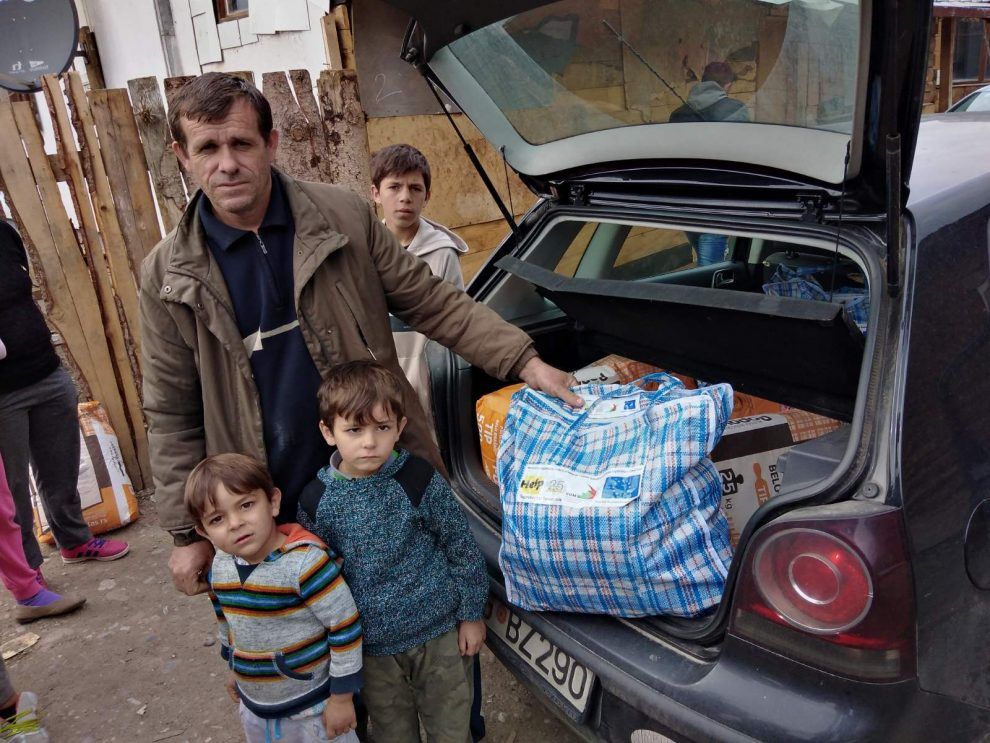
27.03.2020
The European Union is funding a joint action carried out by HELP and the Roma youth NGO “Walk With Us – Phiren Amenca”.
Over 300 Roma and Egyptian families in Bijelo Polje and Berane received emergency aid – consisting of food and hygiene packages. Support was provided by the European Union, in cooperation with HELP and the NGO “Walk with us – Phiren Amenca”, in order to help one of the most endangered and most vulnerable categories of population in Montenegro.
This donation is part of a broader action, within which a total of 600 emergency aid packages will be distributed to about 400 Roma and Egyptian families. This action will be implemented in Niksic and Herceg Novi in addition to Berane and Bijelo Polje. The total value of these 600 packages is around 12,400 euros.
Those families that have more than six members will each receive two packages containing flour, oil, sugar, pasta, rice and soap. In accordance with the recommendations of the National Coordination Body, the packages are being distributed in cooperation with the Red Cross and local crisis HQs.
The first portion of aid packages was distributed on Tuesday 24 March in the Roma settlement of Drenovik in Herceg-Novi with the assistance of the Red Cross.
EU, with Help and Phiren Amenca, helps RE during the COVID-19 crisis
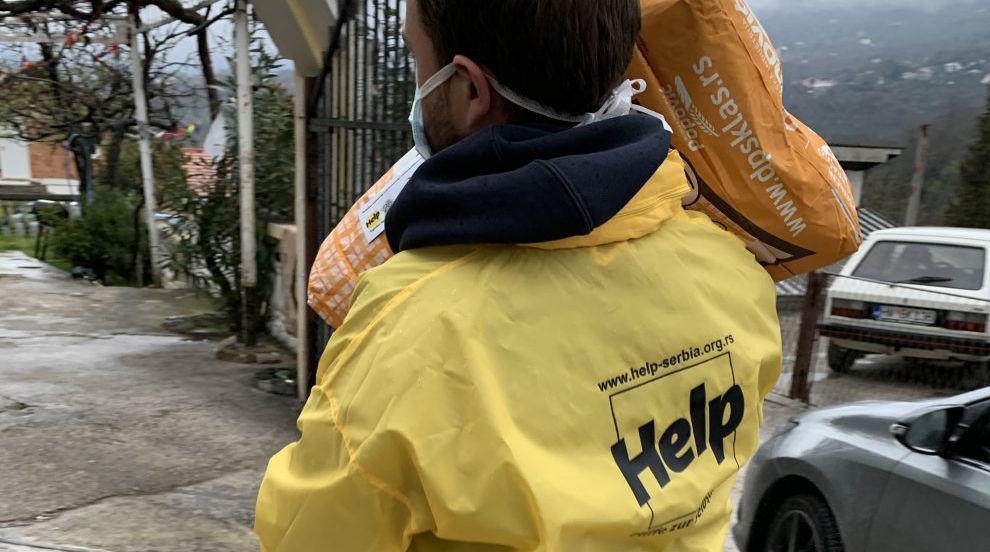
24.03.2020
Following the special measure introduced by the State of Montenegro in an attempt to prevent the spread of COVID-19, specifically refering to the measures on restricted movement (Stay at Home Campaign) and a special supply regime for consumers, Help in partnership with thepartner organization NGO Roma Youth Organization – Let’s Walk Together – Phiren Amenca, with the financial support of European Union, has made a decision to provide, in accordance with our mission, assistance and expressions of solidarity to share the emergency assistance of one of the most vulnerablegroups in Montenegro, Roma and Egyptian (RE).
As part of the action, we have been started with distribution of around 600 emergency aid packages for approximately 400 RE families in Niksic, Berane, Bijelo Polje and Herceg Novi. Families with more than six members will receive two packages each containing flour, oil, sugar, pasta, rice and soap.
The value of the around 600 packages is about 12,400 Euros and will be distributed in the RE settlements Gračanica in Nikšić, Riverside and Talum in Berane, Strojtanica, Rakonje and Željeznik in Bijelo Polje and Drenovik settlement in Herceg-Novi.
Klaus Mock, Help’s Regional coordinator has warned that coronavirus crisis has dire impact on RE population;
“This crisis has a terrible effect on the most vulnerable population group in Montenegro, i.e. the Roma and Egyptians. It was very clear to me from the beginning that we should assist this group with immediate emergency aid. As we are presently implementing a project that has the objective to support “civil society in action promoting RE rights in MNE” we have taken immediate action in order to reallocate some funds that allows us together with our partner organisation Phiren Amenca to bring food parcels to some 400 RE families. I am very grateful to the Delegation of the European Union that they have so swiftly and positively reacted to our proposal for the reallocation of the funds. That was a prime condition for us to start with the provision of this emergency aid. Crucial for the success of this initiative is the support provided by the Montenegrin Red Cross that will assist in distributing the food aid parcels”.
Distribution will be done in cooperation with the local crisis teams and Red Cross in the targeted municipalities.
On Tuesday, we visited and shared assistance in the Drenovik settlement in Herceg Novi in coordination with the Red Cross.
Stay home, we will, as always, come to you!
Help workshop for RE NGOs: Project preparation
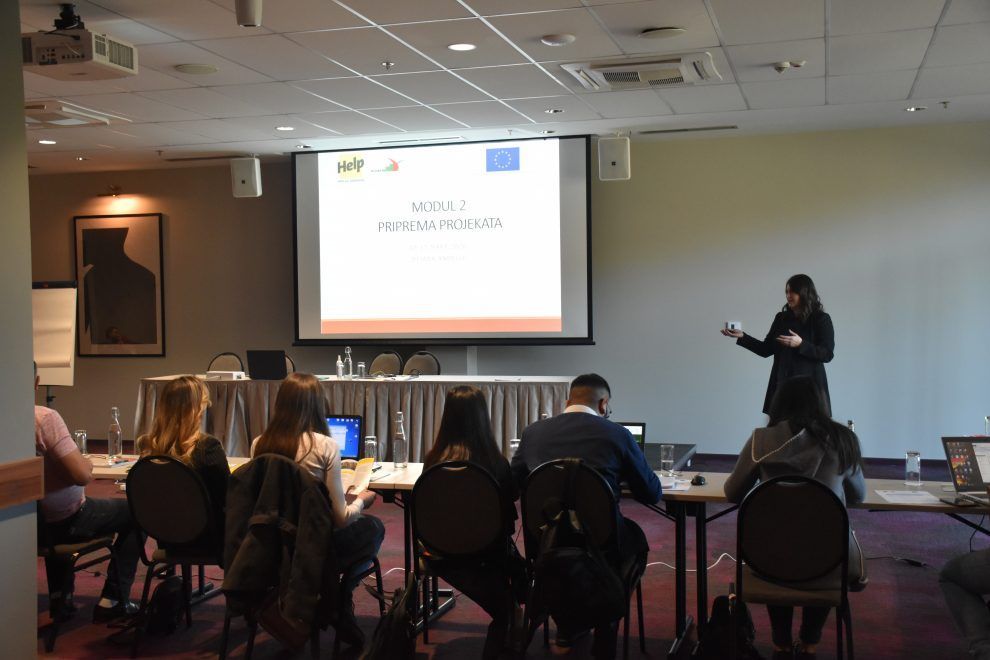
Lazar Popovic – Assistant for Social Housing in Help
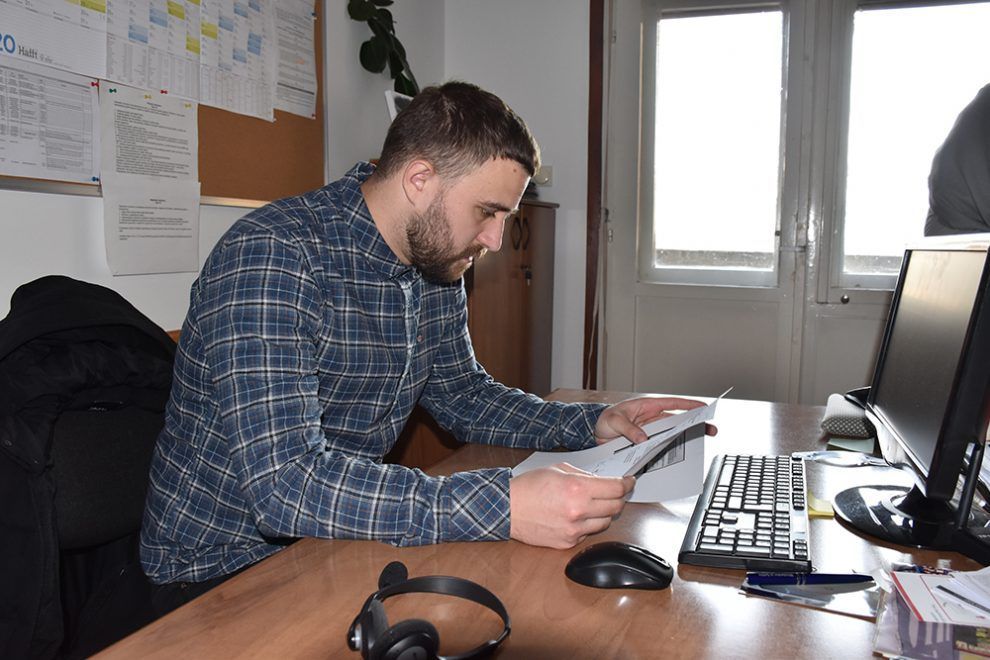
26.01.2020
Lazar Popovic, a 23-year-old assistant for social housing at Help, is in his fourth year of specialist studies in management at the Faculty of Economics. He changed his future job direction by chance, for the time being. Namely, while he was once providing assistance to the same person who was assisted by the Ministry of Labor and Social Welfare, they noted his heightened social empathy as well as the ability to gain trust and establish good communication with people in need, and it was suggested to him that he should pursue that direction.
Connecting to Help and beginning daily work in the field followed, exactly in these type of cases, most often involving the Roma-Egyptian population. Today, Lazar is a regular bridge in communication between social housing institutions and beneficiaries of this type of accommodation, ranging from maintaining social housing units to solving everyday problems related to it, such as regular settlement of invoices and fixing the neighborhood and more. Just how remarkable he was in this role was further demonstrated a few days after the very first visit to the social settlement for Roma and Egyptians in Drenovik, in the municipality of Herceg-Novi, where he immediately started receiving regular messages and pictures from the inhabitants, outside working hours and on weekends, about the progress of the work in settling the neighborhood and preparing for further works.
Lazar doesn’t mind that people call him outside of business hours because as he had said “This in not and this cannot be just a job”. Working in Help has given him the feeling that he is a useful member of community, as well as sense of purpose, because he is helping those who need it most.
Engagement at Help has greatly, he admits, influenced the change in his own prejudices about the RE population, and considers this an especially important quality of his engagement at Help.
Biljana Jovićević
Nikola Bošković – Administrative Assistant
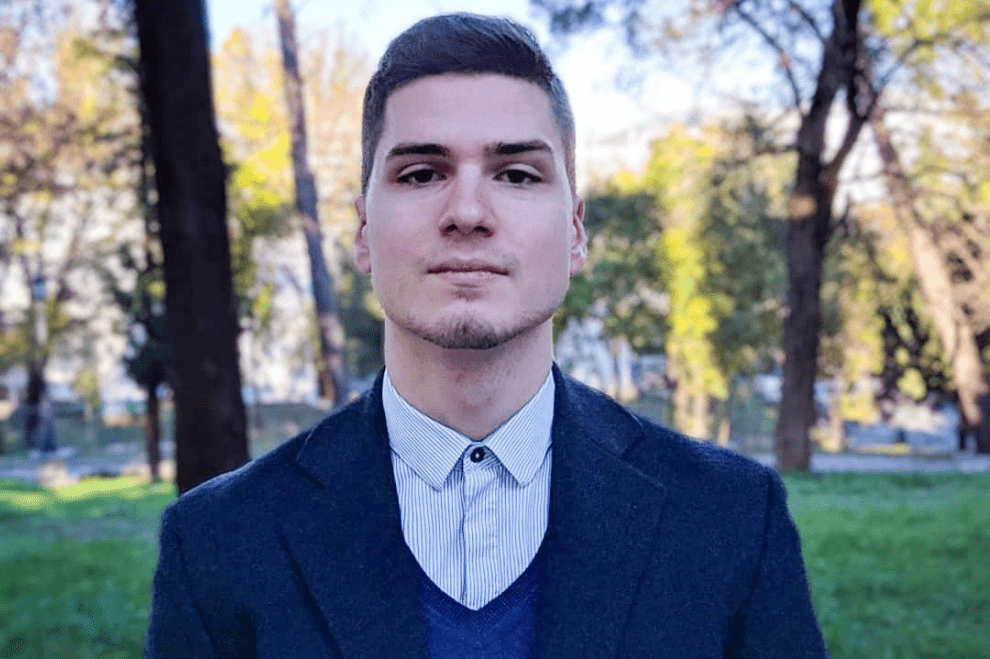
26.01.2020
Nikola Bošković is a 24-year old administrative assistant at Help. He has a specialist degree in diplomacy, or international relations in humanities. As he says, the link between this call and this one in Help is that this is an international charity organization. However, what attracted Nikola to this job was primarily the feeling that by doing it he could really help others. For humanitarian work, social empathy is important as well as the ability to put into practice the administrative dimension necessary to deliver the help to the right hands.
This is not his first engagement in the civil sector in the field of human rights. As a high school student, he started as a volunteer at the Center for Civic Education, where he first learned the concept of human rights through various seminars and trainings at local and regional level, and later through the field work he built up the degree of respect for human rights – especially of minorities in Montenegro.
He says that it is one thing to know the statistics – what the situation is and how many people are really in need, and completely different when you face extreme cases in practice, such as when someone calls you and says “We are hungry, my family needs food to survive”
“In a certain way, you can never be prepared for this, but on the other hand, you must be – you have to act by immediately seeking a solution and doing everything you can to help, the actual action is just as important, if not more important, than empathy.”
Nikola Bošković believes that the experience he will gain at Help will complete the basis for some future work that will, of course, have to do with international relations. After all, there are so many international organizations who take upon themselves to help others – UN, UNICEF, Council of Europe and others.
Biljana Jovićević
Help mediator Ibrahim Tatari for Roma and Egyptians: I cannot watch human suffering
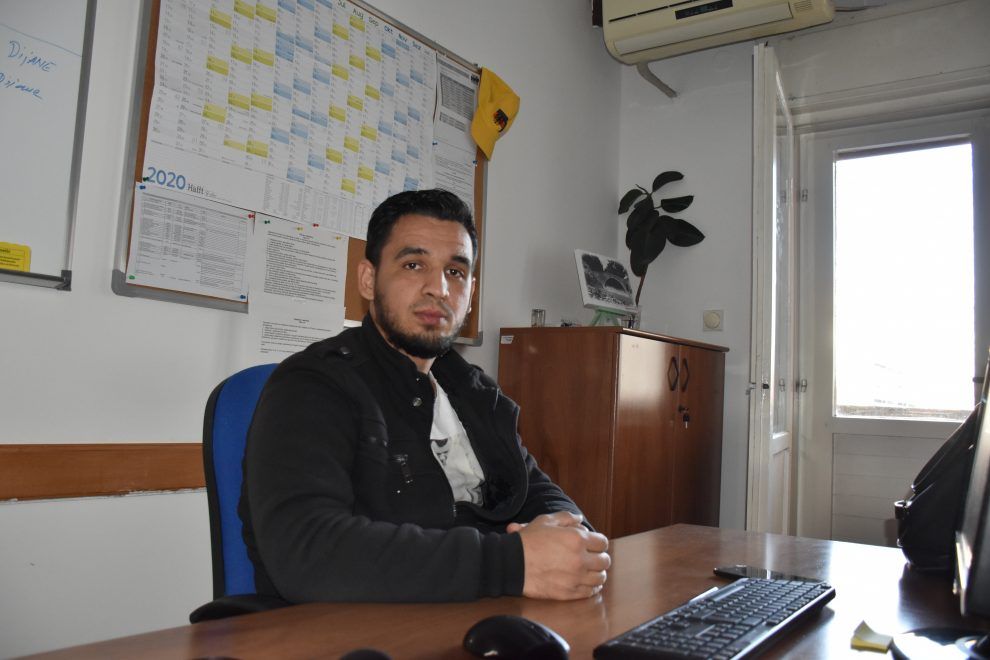
27.01.2020
Ibrahim Tatari is a 27-year-old Help mediator for employment. Together with his family he came to Montenegro during the Kosovo war in 1999 as an internally displaced person and stayed. He graduated from high school with specialization as a waiter, and now he has a family of his own already. He started activism as an intern in the administration for the non-governmental organization Roma Youth, afterward he was recruited by Help and trained for mediator. He has been working as a mediator for two years.
As a mediator he assists Roma and Egyptians in particular, but not only them, in overcoming the language barrier during their visits to different state institutions and in obtaining various services. Many of the Roma and Egyptian people need assistance in translation into Albanian and Romani languages in contact with the Employment Service, hospitals and others.
People, he says, are very happy to accept his offer to help them, as well as from his mediator colleagues, although the most difficult part in the beginning was to earn their trust. Nowadays they call him with help requests by themselves.
“They didn’t believe us at first, but over time situation has changed. We offer them any kind of help for whatever they need and to go with them wherever they need to go”, says Ibrahim.
The fact that he lives in the Roma and Egyptian settlement Konik in Podgorica helps a lot, because most of the people there know him, although he is helping elsewhere in Montenegro.
During the visits to the hospitals, social work centers, employment offices, in addition to being the mediator, Ibrahim also tries to fill a role of an educator: he carefully explains the procedures to them, how to fill in the applications, what must be provided from the document and other.
He said that him showing up in each institution as mediator immediately makes a difference, especially in changing institutions attitude towards Roma and Egyptian people.
When it comes to medical assistance, Ibrahim, thanks to Help donations, is very often in position to purchase medicaments, baby’s food, or even to pay the medical bill for patients sometimes, in those cases when they are not able to provide legal documents for free social care.
For all other requests he is also trying hard to find best solutions with Help assistance and not reject any help requests.
“We are trying to help as good as we know and can“said Ibrahim Tatari adding:
“I can’t stand to watch when someone is suffering, I have to try and help”.
He would like to continue to work as a mediator because, as he says, it is an indescribably good feeling to help others in need, but he admits that his lifelong desire is to work as an ambulance driver.
The Roma and Egyptian mediators’ programme is part of Help’s regional project “Support to socio-economic stability in the Western Balkans region 2019-2020” that is funded by the German Foreign Ministry.
Biljana Jovićević
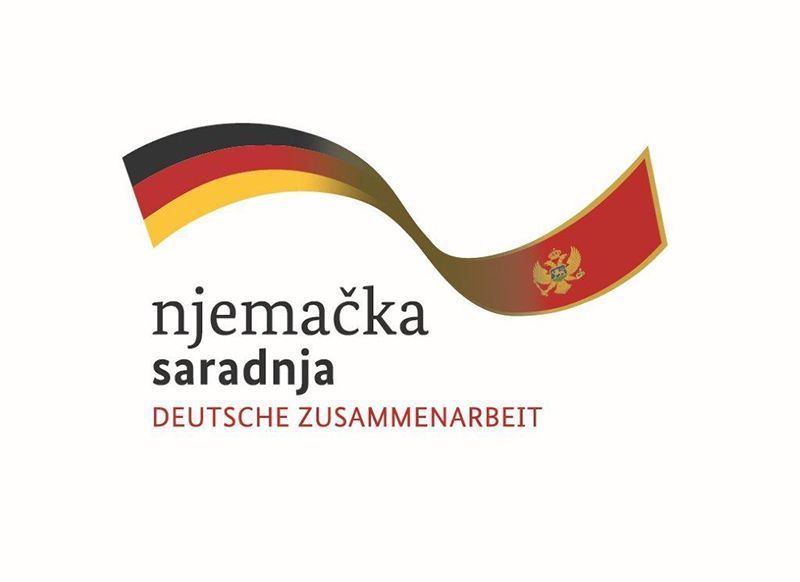
Dijamant Pajazitaj – Meditor for Social Care and more
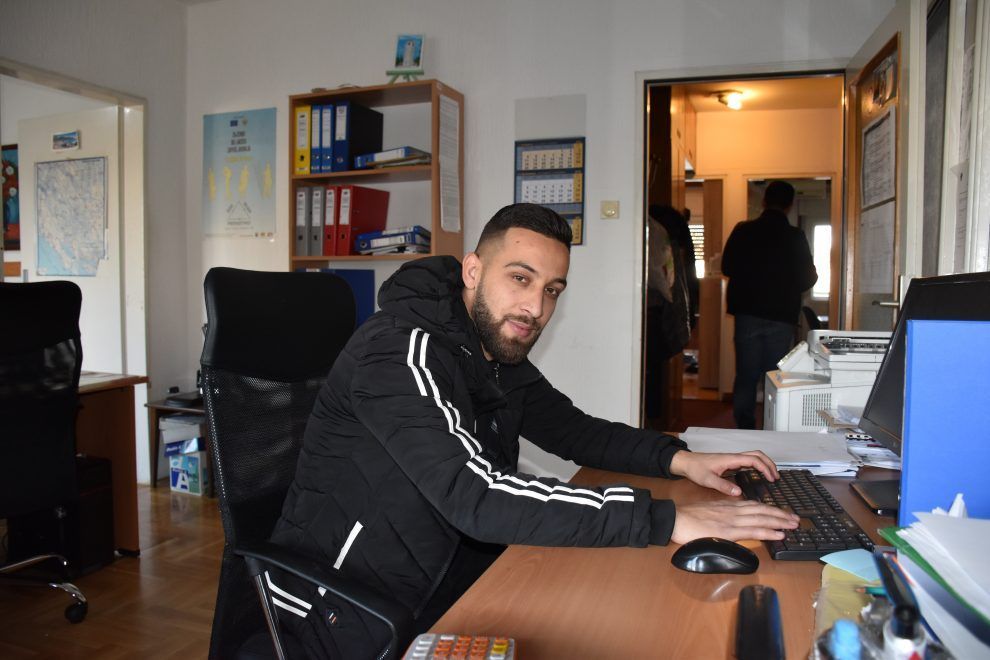
30.01.2020
Dijamant Pajazitaj is 24 years old mediator for social care at Help. When the war broke out in Kosovo in 1999, his parents, he said, found refuge here in Montenegro and they decided to stay. In Montenegro, Dijamant finished elementary and high school, after which he dropped out of further education to start working. Early on he became a volunteer in the NGO Forum.mne and was later engaded in some other civil society organizations, dealing with Roma and Egyptian issues.
After a while he applied to a public call from Help for Mediators, as he had a very good opinion on the involvement of Help in Montenegro and their assistance to the RE population. He has been working as a mediator for social care for three years.
“On the paper, of course, I am a social care mediator, but in reality I do everything from going to the employment bureau to the hospital, health centers, schools and all kinds of other services where our help is needed. That being said, we can conclude that I am a universal mediator. ”
The most important thing for his job is to gain people’s trust.
“We earned their trust, it is the most important and the hardest thing to gain at the same time because people have to make sure that you are a person of trust, there are people with different problems. But we ensured their trust by helping everyone and everyone, and by going through all the institutions. ”
Dijamant notes that in the beginning of his engagement as mediators, the institution’s reactions were rude, mostly because they didn’t understand mediator’s role, but now they have very good cooperation.
“I have excellent communication with them now, and they, as well as the citizens themselves, contact me whenever they need me. From institutions such as the Center for Social Work, I have learned, or rather “acquired” some of their skills through this work. ”
On average Dijamant has to provide some kind help for about five to six people per week.
“We strive to help to whoever calls us, both the RE population and others. There have been different situations when people have approached us for help. And we helped everyone. I feel good about helping someone. And I see that somehow this job is taking hold of me and it feels natural, I manage to help so many people. ”
Dijamant Pajazitaj wants to move forward and learn as much as possible about this profession, because “one always can and must strive to do better.”
He believes that it would be very good if the authorities recognized the need for mediators as a way to secure appropriate help for RE population and started employing mediators, as this has indeed proved necessary.
“Representatives of institutions always appreciates and praise our work, and that was pointed out on every meeting. We have regular meetings with them so that we can elevate our cooperation”.
The Roma and Egyptian mediators’ programme is part of Help’s regional project “Support to socio-economic stability in the Western Balkans region 2019-2020” that is funded by the German Foreign Ministry.
Biljana Jovićević

Roma women role models: Šejla Pepić – activism in blood from early childhood
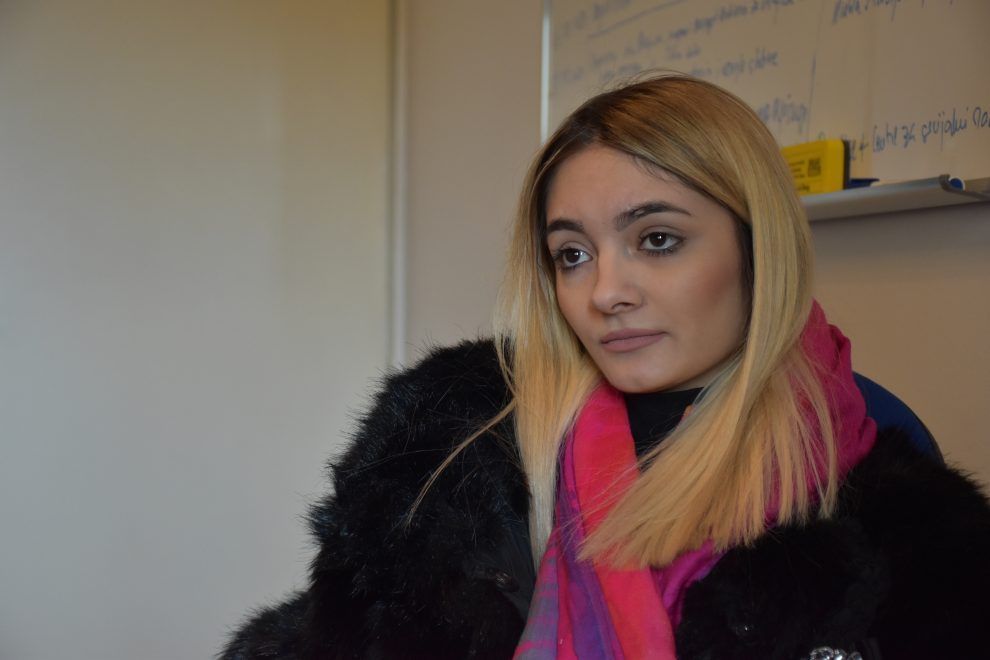
11.02.2020
As a girl, she participated in gatherings of groups fighting to improve the status of Roma and Egyptian (RE) women and girls, with a single mother who had nowhere to leave her. Activism is her main preoccupation today – she studies social policy, works on social inclusion, and she does not exclude political engagement in the future.
Every day, she tries to impose her own example through concrete actions to many Roma girls and their parents and to be seen as a model for a better and more integrated future for Roma and Egyptian women and girls.
Interview with Šejla Pepić iz part of project Civil society in action promoting and protecting Roma and Egyptian rights in Montenegro, within we promote women’s role models. The project is funded by EU and implement Help with the Roma youth organization Walk with us Phiren Amenca.
Help : You’re a 20-year-old member of the Roma–Egyptian ( RE ) community in Montenegro, you are a student and at the same time you are an activist. Since this is still not a regular occurrence among Roma and Egyptians in Montenegro, can you tell us what was crucial for your life path and the choices you’ve made?
Pepić: It was probably due to the positive example I had at home- my mother (Behija Ramović). It was not a typical case characteristic for the Roma and Egyptians who were either victims of discrimination or their own traditions, like early marriages. I had a positive example at home. My mother became a single parent when I was only seven months old and she raised and educated me.
So I always told myself – if she could do it, why wouldn’t I? She is also my role model because she has been involved in the non-governmental sector (NGO) for 15 years and is now one of the few Roma women employed in state institutions.
So I carry a positive example from home. Even when I was a child, because she had no place to leave me, she attended educational seminars with me, which I continued to do as an adult.
Help: And how does your whole engagement look like today?
Pepić: I am currently in the third year of political science studies – social work. I work as an associate in social inclusion in the elementary school “Božidar Vuković Podgoričanin”. This is a school that has the largest number of RE children, and I am also involved in additional activities of NGOs such as the Center for Roma Initiatives, Walk with us – Phiren Amenca, and I am also a member of Women’s Network – Prva.
Help: What is the focus of your work in all these engagements?
Pepić: I always strive to set as good an example as possible to co-operate with young people, especially to women and girls: communicating with them, motivating them to fight for their rights as well. I put a greater focus on the girls, because they are less familiar with their rights than the rest, and they don’t know much about the work in community neither.
Help: When you say ‘community work’, I presume you mean the work with families?
Pepić: Both with children and with families, I mean the whole RE community.
Help: How would you evaluate the position of your community in Montenegrin society now?
Pepić: I would like to put a positive emphasis primarily on the Roma and Egyptian, because we see an improvement here, they know their rights a lot better nowadays, but there is a lot of room for improvement of course.
Help: In what sense?
Preventing early marriages — problem number 1 of the female RE population
Pepić: Because they continue to face discrimination, both in the community and in institutions. There is a lot of room for improvement within this framework, institutions – NGOs – the community.
Help: When you say community, do you mean the whole RE community or just the families?
Pepić: I think of the RE community as a whole, because Roma women and Egyptian women themselves face discrimination within the community.
Help: When it comes to education of girls, since you work in school, can you make a comparison of how it used to be, whether more girls are going to school now, whether these girls continue their education after primary school, and what are the key factors in the process, both positive and negative?
Pepić: There is a recent increase in the number of the female population which continues education after primary schools, and an increase in the number of girls who generally go to school. All of this thanks to the fact that the whole process involved associates for social inclusion. They were actually introduced to the system in order to help to increase this figure, but still it is not on the satisfactory level, because the goal is to make all the children go to school.
For example, we continue to face a major problem with arranged marriages. When a girl of 13 years is committed to an arranged marriage, one of the consequences is the disruption of education, in addition to her threatened medicinal condition, her further future, and her childhood disrupted – literally all of this just by entering an arranged marriage.
Help: Speaking about arranged marriages, in your contacts with the family and with the community, tell me in how many cases do you succeed to sway or divert them? What is the biggest problem for you in these situations, are the families aggressive towards you, and how often do you break through that wall? What was your experience?
Pepić: Well, I can say that I focus in two different ways in those cases – as a mediator or as an NGO activist. As a mediator for instance, when we find out that the girl has not been going to school for a few days we go immediately to court, we check the reasons behind her absence, and when you find out that it was an arranged marriage we report to the school principal – and she takes care of such cases. This is how it looks like if I act as a mediator.
If I act as an NGO activist, it is a completely different procedure. In such cases, we are the local coordinators who publish the Center for Roma Initiatives, which mainly deals with these cases, and after that it may involve police and centers for social work.
In these situations, there are both positive and negative examples.
Help: What’s more?
Pepić: There are more negative examples. Because there are 64 cases and charges being filed, and only in one case do we have criminal proceedings pending. The most common problem is that the institutions do not run the case because they do not have enough legally valid evidence. And then it remains for the organization itself to prevent the girl from being taken away, very often as far as outside of the state.
She does not rule out getting into politics one day
Help: What does it mean when you say that your case was an exception thanks to the self-initiative, thanks to your mother, and not the system?
Pepić: That is why we try to show as many positive examples to the community so other girls and women would have some motivation to join, for example, an NGO, which would also be an attempt to contribute to integration.
It is also important, and I have to mention that in the Montenegrin politics there are no representatives of RE community. And so, a joint RE movement has been set up that focuses solely on this, making it more visible and problem solving – easier.
Help: You are a student of the Faculty of Political Science, does this mean that you are potentially interested in participating in politics one day?
Pepić: Maybe, my path is social work and social policy and that’s it. I’m interested in the one and the other, so I would not rule out this possibility.
Help: In recent years, there have been numerous programs and projects dealing with the advancement of women’s rights of the RE population. Do these projects deliver the expected results, or is there anything else you can do to make those results better?
Pepić: There are results and it is visible, statistics and field work show that, but not to the extent we would like. I think more work needs to be done to improve access to institutions. The state will always give support to women’s rights organizations at the outset, as there are not many of these organizations, so it remains always possible.
Help: As a member of the RE population that has been able to secure full integration into society, tell me, have you been and to what extent have you encountered discrimination and how have you dealt with it?
Pepić: I can freely say that I was lucky that I did not face discrimination, but I am also sure that if I were in such situations that I would be able to cope with it, thanks to the numerous seminars and trainings I went through. But I can say from working with the community that they most often face discrimination in education and institutions.
When I say in education, I do not mean discrimination of RE children by teachers, but by children of the population majority. All of this I would say comes from home, as children are taught at home that way they treat the RE population: they do not want to socialize with them, or have a bad opinion about RE girls… because they will get married early or will leave school early.
Help: Do you have programs in which the girls of that age learn and are empowered to deal with that?
Pepić: We have. Within the NGO program, we have workshops where we work with them with the support of the community and the school. And it really does have effects. I can say that in Podgorica Primary School “Božidar Vukovic Podgoricanin”, attended by most RE children, there is no discrimination at all. Not only because they are practically the majority population, but precisely because of their work on it.
Also, now an increasing number of girls are going to high school and finishing it, and as a result of this the distance is narrowing and the situation is improving.
Also, I know of more cases like my own – when RE girls enroll in studies others are looking at them suspiciously because of their first and last name, when they realize that they are Roma or Egyptian. However, when they show an equal interest in learning, their colleagues admit to them that they were prejudiced and thought that they, like the rest of the RE community, were not interested in education. Direct communication breaks down prejudices – just by positive examples.
Help: Šejla, what is your life goal? How do you see yourself in 10-20 years?
Pepić: I see myself as accomplished both professionally and privately, with a focus on further fighting for the rights of the RE population, especially women. I also think that the status of the RE community in Montenegro will be significantly improved during this period so that my struggle will be much easier.
I definitely see my future in the direction of activism.
Biljana Jovićević
Roma role models: Linda Jefkaj – inspired by German culture and language
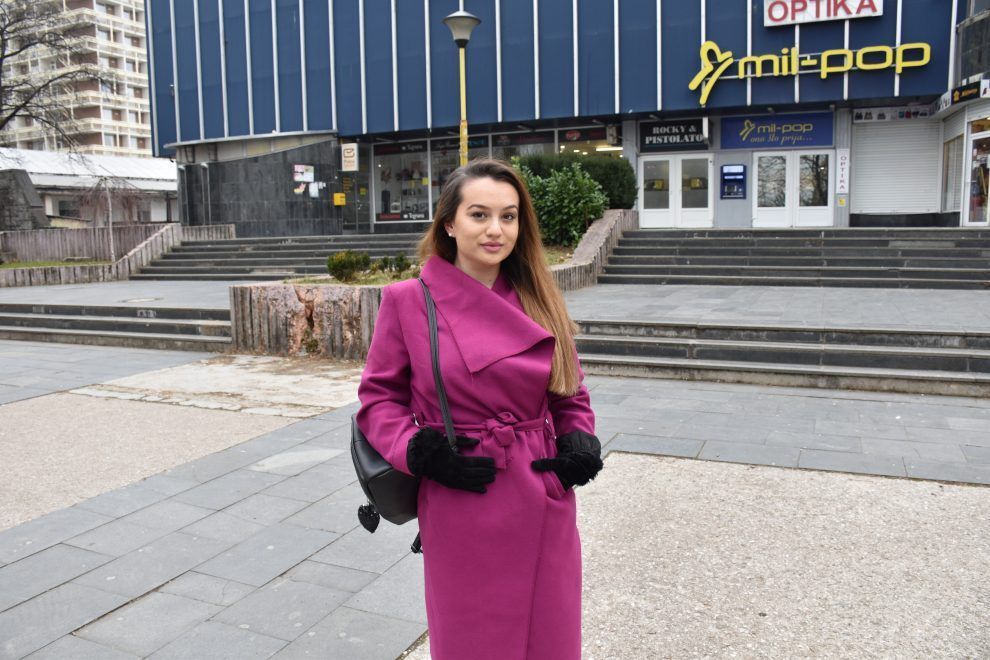
14.02.2020
This 22-year-old girl from Herceg Novi, who participated in the German TV program “Deutschland such den Super star” two years ago, is in her final year of German studies, and her next goal is a scholarship to Heidelberg or Berlin.
If it had not been for her brother who suggested that she enrolls in her studies she would have been a hairdresser or a visagist, today she is fortunate to be fighting for her future outside Montenegro, for the fourth year in Niksic. In addition to her studies, she is also active in promoting RE rights – in particular women’s rights.
Interview with Linda Jefkaj iz part of project Civil society in action promoting and protecting Roma and Egyptian rights in Montenegro, within we promote women’s role models. The project is funded by EU and implement Help with the Roma youth organization Walk with us Phiren Amenca.
Help: Linda, in an interview I read on Roma.net about you, you said that you always had a role model and motivation for you – your brother.
Jefkaj: My start was a bit difficult. Yes, my brother was my role model in everything. He graduated psychology here in Niksic. And after high school, he was the one who gave me instructions in what faculty to enrol in. Since I always wanted to enroll in German language because I loved German culture and German – the best option was imposing on its own– German language, germanist.
Help: That’s great.
Jefkaj: Yes, let me tell you. First, after high school, I had no intention of enrolling in college at all. Why? Because I always wanted to be a hairstylist, and I always had a talent for hairstyles and makeup, but in the end I got into college. My brother, who advised me to enroll in these studies, played a key role. As he said, you have a talent for hairstyles and makeup, but you can always finish that, try studies.
And so, I enrolled in college in 2016 and here I am now in my third, final year, I have one more semester left.
Help: You were born in Herceg Novi and we are doing this interview now in Niksic where you are studying. In addition to learning, you are also involved in the civilian sector. Where did the motivation for that come from?
Jefkaj: I work at the Center for Roma Initiatives. I was introduced to their work at one of the seminars I attended. They then offered to engage me on their projects. I realized that this is a very good option since I am here in Niksic where I study and where their headquarters are. Of course, they met my specific student needs, and allowed me to work for four hours a day to balance my obligations with learning. I am working on a project for inclusion of Roma and Egyptians, with a focus on women. I gained work experience here and learned a lot about activism along the way.
Help: How do you see your role as a young and successful Roma woman in promoting the female Roma population in Montenegro?
Jefkaj: We know that the Roma population in Montenegro has many problems, we face different difficulties and different forms of discrimination. First of all, as a positive role model and as a positive example among Roma and Egyptians, I want to help my community in every sense. First, I want to prove to them that they can achieve whatever they want.
First of all, Roma women should focus on education, then self-confidence, in order to gain knowledge and experience in many fields. However, it is very difficult to work with our population.
Help: Why?
Jefkaj: Because it is not easy for us to raise their awareness to that level that they realize that everything we do is focused for their own good. It’s a big challenge…
RE population numerous but poor, working with the community is very difficult
Help: How much success do you have in working with the community with the RE population and what are the main obstacles?
Jefkaj: The obstacles are the fact that a large number of Roma and Egyptians is in Niksic, but they live in very poor conditions, and in order to improve that status it is a very long process and hard work. Working on long-term projects also requires a lot of money and a lot of work and a lot of experience, but all of this is gained over time.
I think the way we are doing now is a very good path and that it is a way to prove and show that the RE community needs a lot of help.
Help: In particular, I know that the focus of the organization of the Center for Roma Initiatives is largely on preventing early marriages. How much success do you have in this area?
Jefkaj: We have a lot of success, given that Fana (Delija, president of the organization) is constantly working to prevent arranged marriages. A total of 84 cases of early contractual marriages have been prevented so far. But the problem is that not one of these cases has been criminally reported.
The problem is, among other things, that institutions need to be much more involved in this matter. Unfortunately, we have a very large number of such cases, we literally work daily to prevent arranged marriages, through campaigns, through various presentations and educations. First, we need to get to these young girls to talk to them, to family, to try to change that tradition, as they call it, even though it’s not a tradition.
I mean there are different customs in our country, but that can change. With education and a set of other things, we can bring about changes in society, but as a society as a whole we do not yet see it as a common problem that everyone should work on. This is usually pushed aside and so the problem cannot be solved.
Help: How often does it happen that, as someone who has had the full support of their family to educate and continue to build their own lives on their own, you have the opportunity to impose your own example and persuade a particular family to give up the intention of sacrificing their own child for a arranged child marriage?
Jefkaj: I also come from a Roma family, I usually tell them that it was not easy for me at the beginning, to get educated and enter the system, although I always had the support of my family, my parents. The environment in which I live has understood differently that I went to another city alone to continue my education and have been living independently for four years. But I have succeeded, and I always try to make them aware that they can too.
Help: Do you encounter, have you encountered discrimination before and how do you deal with it?
Jefkaj: I have to admit that I did not face discrimination, although it seemed to me that people, for example at the university recognized that I was Roma by my name, but that was not an obstacle for me to fit in and improve. On the contrary, even though they let me know that they considered me different, I proved to them that it was my advantage, that I was better for that reason.
Help: What are your plans for the future when you complete German studies?
Jefkaj: It is my priority to finish my studies by August, finish this semester and graduate with a degree in German language. Then I want to apply for a scholarship in Heidelberg or Berlin. The next step is the master’s degree, and then on.
She sees her future outside Montenegro
Help: Do you see your future outside Montenegro?
Jefkaj: Yes, although after school I want to make a difference in Montenegro in order to gain some work experience, but I see the rest of my life in Germany.
Help: What would your message to young Roma women in Montenegro be, how to fight for their rights?
Jefkaj: First of all I would say enthusiasm, courage and perseverance are important, I have always relied on my courage. I have always strived to gain some experience through communication with society and with institutions. It wasn’t easy for me at college, but I was convinced that with persistence, which was how it was in my case, everything could be achieved, and that every effort would eventually pay off.
Help: What is your communication with professors and colleagues at the faculty?
Jefkaj: Very good. In addition, I can say that I cooperate with many lecturers, professors from abroad from Austria, Switzerland and Germany, and the cooperation with them is even better. They have a much better understanding of our abilities and incapacities.
Help: Do you think that from a professional point of view or because you are Roma?
Jefkaj: No, it doesn’t matter that I’m Roma, it has to do with accessibility. It’s just that professors-lecturers from abroad are much more accessible than professors here, to me and to other fellow students. That is unfortunatelly so, and I hope that will change sometime.
Help: How are your relations with your colleagues?
Jefkaj: I have great communication with my colleagues, I have acquired very good friends here. I feel good with them, they are from all over Montenegro, and I am here alone, no one from Herceg Novi has been enrolled in German studies. Maybe it’s better that I was alone at the beginning.
Biljana Jovićević
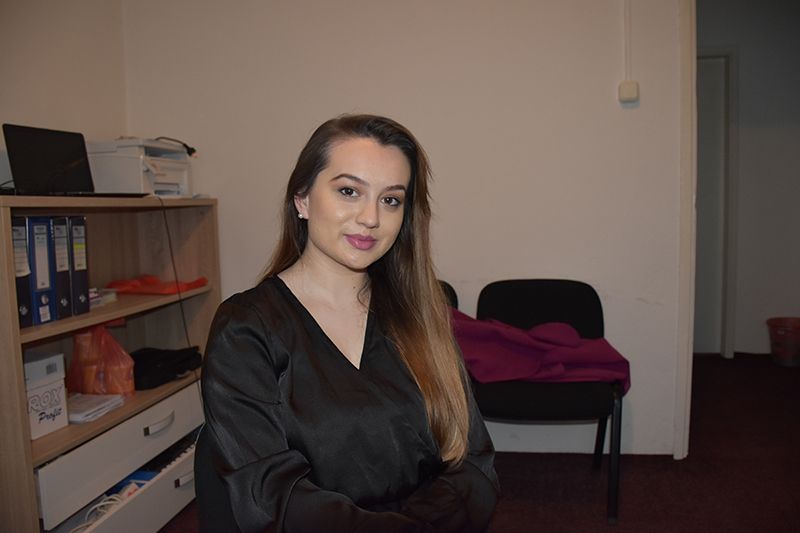
Social flats in Spuž: Inside 12 flats, 33 smiles
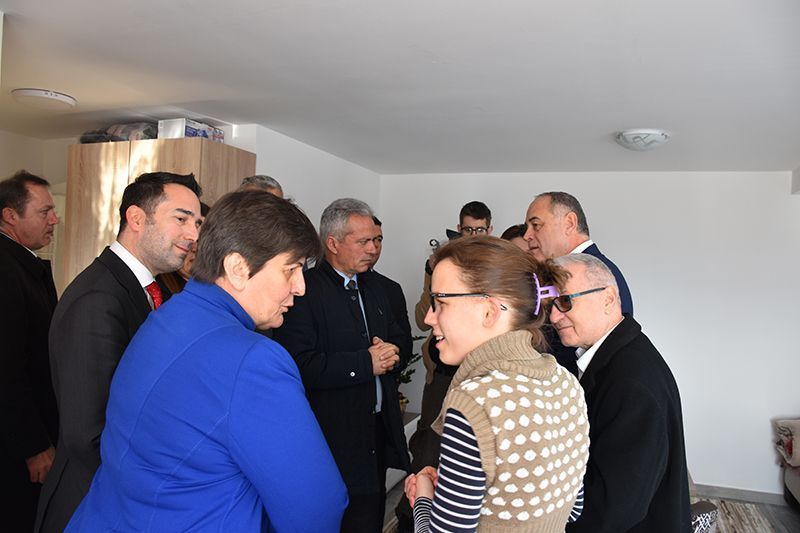
17.02.2020
Representatives of the Montenegrin Government, Deputy Prime Minister Milutin Simovic and Minister of Labor and Social Welfare Kemal Purisic, Deputy German Ambassador Christoph Breunig, Mayor of Danilovgrad Zorica Kovacevic and Help coordinator Klaus Mock visited today the social housing apartments in Spuz. The beneficiaries and youth who resided in Bijela were able to move into these apartments at the end of December 2019.
Help, the Ministry of Labour and Social Welfare as well as the municipality of Danilovgrad participated in the construction and equipping of 12 apartments in the building in Spuz owned by the Danilovgrad municipality.
The Deputy Prime Minister of Montenegro, Milutin Simovic, said that 33 children’s smiles that welcomed guests today in Spuz are the best confirmation that these are worthwhile projects. This, the Minister says, confirms that the majority of Montenegro’s energy is preoccupied with work and commitment.
“Our meeting today and the satisfaction of these families with their new home is a good opportunity for us to announce and remind ourselves together of solidarity, understanding, recognition and partnership: solidarity as a special value that we need to develop and show at every moment and every place; understanding that we understand the child, the man and the family and anyone who needs help and support; recognition so that we may recognize the distress of another without waiting for a formal request for help and partnership as the best possible response in creating and realizing support.”
The Deputy Head of the Mission of the German Embassy in Montenegro, Christoph Breunig, stated that Germany has been committed to social housing in the region and Montenegro for years. The German Government has invested half of the total construction costs for the project in Spuz.
“Affordable housing is one of the foundations of a functioning society. This is part of Germany’s participation in a regional social housing project for which 9 million Euro have been allocated so far. We are also ready to continue investing in this project by the end of 2022. But we cannot do this alone, which is why we are cooperating for implementation with an organization such as Help, and also with our partners in Montenegro, such as local authorities and the Government. This is a very good example of how working together can lead to great results. I hope the tenants are happy here and that they feel at home. I can only encourage them to take care of their homes.“
Help contributed 106,808 Euro from the German government funds for the cost of constructing 12 apartments and rebuilding of the facade of the building, totaling 172,291 Euro. The apartments are built on an existing building owned by the municipality. The municipality of Danilovgrad co-financed the works with 62,008 Euro, while the Ministry of Labor and Social Welfare provided 32,008 Euro for two apartments for children who had to leave the Care Center for children in Bijela. The total value of the project component in Danilovgrad is 207,324 Euro.
The Mayor of Danilovgrad Zorica Kovacevic, emphasized that the project was completed in a very short time.
“We, from the local government, are extremely happy to have made all these families and their children happy. There are 33 children here, we have a foster family and many children with special needs. It was our obligation from the local government to do everything in a transparent and fair way. The business of building apartments was very demanding, but thanks to Eurozox and Help and our local government, today we are convinced that everything is done well and that we were able to distribute all these apartments in a fair and transparent way without any complaint from people we found in the apartments.”
One of the tenants, Mrs. Vojka Vukovic, the mother of the foster family, was thankfull on behalf of everyone who had received the apartments to everyone who contributed to their entry into the homes.
“Thanks to everyone for understanding our needs and giving us apartments that are much more adequate to live in than the previous rooms, which were very uncomfortable, some too humid, the ceilings falling and the houses sometimes burning. Your teamwork has put your promises and words into action. An old truth tells us to be a brother to the afflicted, to open his heart and to give him his hand. You did exactly this and thank you very much for that. We will do our best to keep our apartments decent so that our children can enjoy them, ”said Mrs. Vukovic, who then addressed the German Government with a few words in German, which made it’s contribution through the Help organization.
Vojka Vukovic and her children, whom she was raising had distributed gifts to the Government, Ministers Simovic and Purisic, the German Embassy, the Municipality of Danilovgrad, the Center for Social Work and Help.
The Minister of Labor and Social Welfare, Kemal Purišić, emphasized that this was a great opportunity today for all of us to be convinced that a good thing had been done, that through partnership with the German Government, the non-governmental organization Help, the Municipality of Danilovgrad and the Ministry of Labor and Social Welfare 12 families were made happy.
“Out of these 12 families, ten are beneficiaries of social assistance. Housing is a prerequisite for elementary existence and integration into the local community. We have helped with local partners to make this happen. When we toured the family homes today, we convinced the users of social housing that the selection was made fairly and that families who were truly in social need were given housing. In addition, as part of this project, we have prepared and renovated two apartments for the housing of youth without parental care, who used the services of the orpghanage home in Bijela, but after coming of age have had to leave the home. Since these young people find themselves in a new situation without the support of the experts who were supporting them in growing up, it is with this type of social service – housing with the support of social work centers that we provide them with this new form of support. For now, there is a girl from here who is originally from Danilovgrad and who will have all the support of the Danilovgrad Social Work Center, not only for housing but also all other ways to integrate into the community. We are working together with Help to provide Milica Brajovic with employment support in order to complete the support system and to provide Milica with a new life and society. It’s a very nice story, and we’ll have another beneficiary soon. ”
The total value of this project for 2019-2020 is 3.590.051 Euro, while the value of the part of the project in Montenegro is 686.510 Euro. It is part of Help’s regional project “Support to socio-economic stability in the Western Balkans region 2019-2020” that is funded by the German government.
Biljana Jovićević
Social apartment in Spuž for Irena Kalezić- light on the end of tunnel
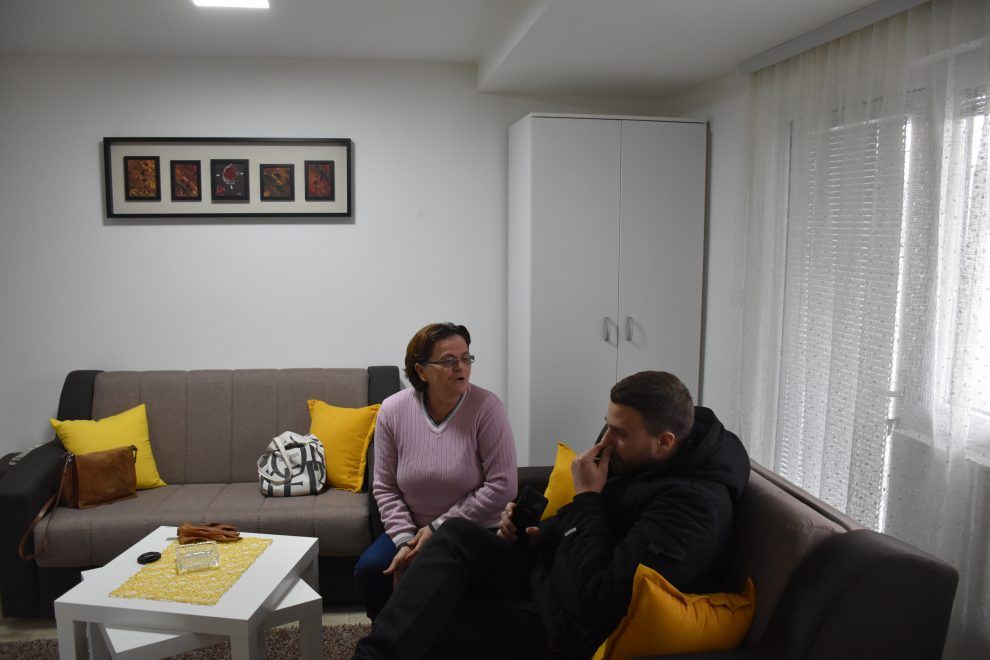
17.02.2020
Irena Kalezić got an aprtment in social housing unit in Spuž where construction has been provided by Help in cooperation with municipality of Danilovgrad and financial support from Ministry of Finance and Social Welfare. Previously she had lived for five years in rented house nearby, with her three children. Mrs. Kalezić with her daughter, who is assistant in school for children with special needs, has moved in new apartment in Spuž, while her sons continued to live in rented house.
Since Kalezić family takes care about rented house whose owner is abroad „like it is they own“, Irena says that landlord stopped taking rent after some time. Same goes for her sons today, and she continues to help them to take care about garden and house.
Irena Kalezić has never had a permanent job but has worked on different jobs for wage since before the divorce – as she still does: from vendors on market to house maid. She didn’t expect to get social flat, but others urged her to apply because she fulfilled all conditions: she is without income, she doesn’t have permanent job, she just turned 41 years of checking in to bureau, she doesn’t have any property on her name, she was a tenant in rented house with three children.
Mrs. Kalezić has finished DIF college (State institute for sport back then), but she was married early and, as she said “to poverty”, so she has dedicated herself to raising children and she had a part time job selling different things as well.
„When I renovated house that I shared with my husband, we got divorced. I went out with kids, and he was left with the house“,she says.
First look on this nicely decorated flat which she shares with her daughter already confirmed that Mrs. Kalezić is a very hardworking person who never gives up.
“I’m used to fighting, and when I didn’t want it to be noticed, I would go somewhere to clean the house or sell something. I never surrendered, I was always ready to make a wage. Today I have a constant arrangement for maintaining one house and a yard, and I am working every other day. It is not difficult for me, and in the meantime I stopped doing extra jobs because I no longer have the strength since I have serious health problems. I had a kidney surgery, recently had thrombosis, was in the hospital for quite a while. The family I work with tolerates me when I can’t get something done because of health reasons, though it rarely happens. ”
She says that she had the help of relatives in furnishing the apartment, which she is grateful for, but also that when a person tries, anything can be done with a little money.
“For example, I paid only 30 euros for this chest of drawers (pointing to a great big flawless white dresser), can you believe it? It was a bit damaged, but I bought a 3 euro paint and a few new 60 cents handles, and sorted everything out myself. And here’s the new one completely. ”
Mrs. Kalezić points out that her daughter, who finished High school for design, also gladly helps her from her salary in buying small decorations, which made home more comfortable and a pleasant place to live. Daughter Kaja has also purchased TV.
She says that getting this social housing flat-home really represents a „light on the end of tunnel“.
“They had always told me one day everything will come back to me, that I have to succeed because I work so much. However, if someone had told me earlier that I would get an apartment, I would not have believed him. I thought there was no theoretical chance. But there was a ray of hope when they forced me to apply, because I met all the conditions: no pay, no pensions, or it seems I would ever get them, at the jobless office for decades, without a home or property in my name. I didn’t need anything else. So I applied. I couldn’t believe I got an apartment, I cried for days, for days.”
Mrs Kalezić says she is not sure when she is 62 if she will be able to get some social assistance – and 100 euros would be significant to her, although the children will “jump in”. She is sure that, as she says, she will not “let go” when she can no longer work, but she would be happy to have at least something for herself.
At the same time as having a social status, her daughter Kaja got a job as a teaching assistant in school. And that was thanks to her initiative. After Kaja graduated from high school for interior design, she did not continue her studies, but started working in Podgorica – jobs were in boutiques and the income went for transport and food. As Mrs. Kalezić was the president of the Parents’ Association at the school for nine years, she knew about the training programs for teaching assistant-ships for children with special needs.
“It was Friday when I applied for a social apartment, and on Monday Kaja was called from the labor bureau to come to work because she is the only assistant in Danilovgrad. She started working there and is very happy. Assistants in Montenegro do not have a permanent job, but they do have a fixed-term job, but we hope this changes in the future. Kaja is now very busy with work and has a nice place to live where she sometimes invites other people to visit. ”
Warm and nicely decorated apartment on the last floor of the building in Spuž has a balcony that is just about to be decorated with pots and flowers, Irena Kalezić told us.
Spring is coming, just in time for this job.
Biljana Jovićević
Milica Brajovic – From orphanage in Bijela to her own new home in Spuz
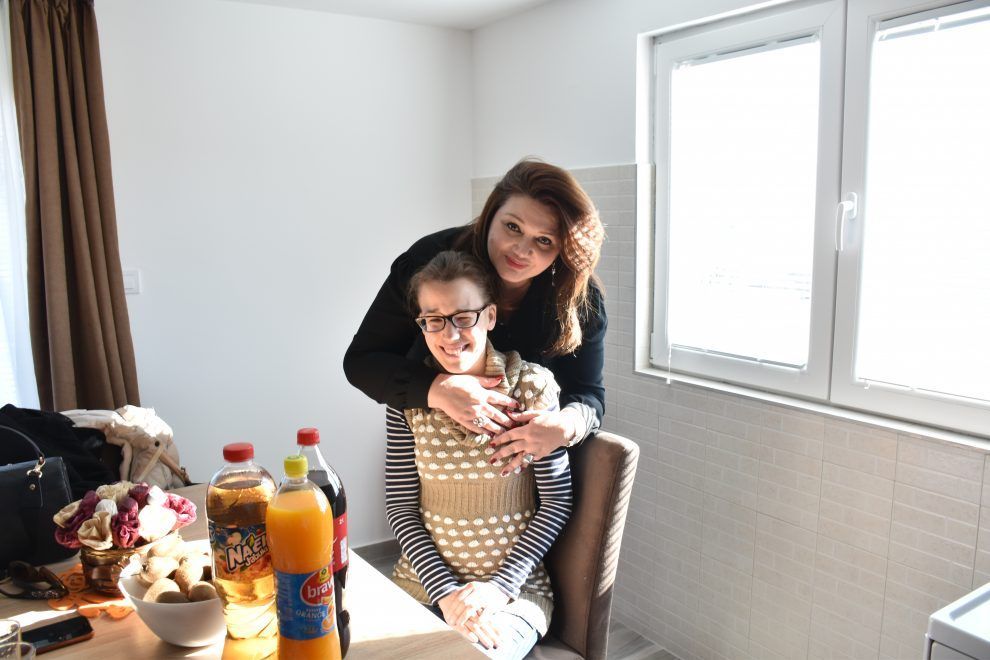
19.02.2020
Milica Brajovic recently turned 22 years old. She began her life in Bijela in the home for children without parental care togehter with her twin sister, who prior to Milica’s departure from Bijela moved to the Komanski Bridge Institute because of serious health problems. After she came of age and it was time to leave Bijela, the Social Work Center in Danilovgrad (her home town) took over taking care of her. They cared for Milica directly while she was in the home.
Milica Brajovic was among those who received the keys in December 2019, when the municipality of Danilovgrad togehter with the Ministry of Labor and Social Welfare and Help were distributing the keys of 12 apartments. Milica is the beneficiary of one of two apartments made available to the Center for Social Work Danilovgrad that were earmarked especially for cases like hers.
This optimistic, energetic and cheerful young woman welcomed guests from the Montenegrin government, Deputy Prime Minister Milutin Simovic, Labour Minister Kemal Purišić, Deputy German Ambassador Christhop Breuning, Danilovgrad Mayor Zorica Kovacevic, Help Coordinator Klaus Mock and another dozen people accompanied by them, including media cameras. With the welcome, she offered to treat them with juices and sweets.
With a hearty smile, she thanked everyone for the opportunity to start a new phase of life in a new and comfortable apartment, as well as for future help in finding a job. The support and the safety needed was given to her by the Director of the Center for Social Work Danilovgrad, Maja Luketic, who is practically her guardian and also the Mayor of Danilovgrad, Zorica Kovacevic, whom Milica asked for the photo discretely while they were leaving the apartment.
She gladly agreed to our short visit after the closing ceremony. With another warm welcome, she first asked for a joint photo with the Director of the Center for Social Work “Aunt Maj” as Milica called her.
“As you can see, everything I have here is the best and the most beautifull. I am happy to be here in my area, I am originally from Jelenak, and I have Aunt Maja who takes care of me.”
Like all young people of her age, Milica has plans for the future and a dilemma about choosing a future occupation. But first she wanted to emphasize the following:
“Now that we are talking about work, I want to say – I am not afraid of work ! It only matters to me that I work, that I have a salary. I’m not sick, nothing’s hard for me, I can get up at 6 and 5 and 7 in the morning. It doesn’t matter, whenever I can get up and be accurate at work at all times. ”
Milica graduated from the secondary vocational school for assistant cook in Kotor, and she says that she appreciates the efforts for her to work as a cook assistant; however, there is something else which she would like even more than that:
“I’m in a bit of a dilemma because I really love flowers, I know a lot about them, I like to make arrangements, I know the prices-everything. I have to admit that at the moment I would love to work as a florist, somehow I find myself more involved here. ”
Since she does not like to be unemployed, she volunteered at a nearby flower shop.
“It’s a kind of practice, and a kind of help. There’s a wooden flower shop here, held by a lady with her daughter, and I help them, usually on weekends. I love to make flower arrangements, I enjoy it. ”
There is also an arrangement of dried flowers on the table in Milica’s apartment.
The Director of the Center for Social Work, Maja Luketić, also says that she feels that Milica is much more talented to be a florist, because besides her love for flowers, she also has creativity, so she sees much more in it.
“Since Milica graduated from Assistant Cook’s School, we just talked to you from Help about how we can help her find a job in the profession. But after a little thought, Milica told me that she would still like to be a florist, and I think it is a job that would be more appropriate to her creativity. I think training her as a florist would be useful. ”
Milica says that it is not a problem for her to live alone, on the contrary, but stresses that she does not feel lonely, because she is constantly taken care of by the Center for Social Work, “Aunt Maj” in particular.
“We visit her regularly, and she is with us every day, at lunch or in the laundry room. As part of preparing the meal for those in need, we also organized one meal for Milica. So we are familiar with her life in detail, ”says Luketić.
It is very easy to see the closeness and trust between the Director of the Center and Milica Brajović. For Mrs. Luketic Milica is obviously not just a part of the “job”.
“Of course not, this is simply not possible in cases like this if we really want to take care of the children and young people who need help in the right way. Milica and I are in daily contact, very often in the evenings. For example, when the recent storm was blowing, I called her several times during the night. She is on the top floor where the strength of the wind is felt easily. One night I texted my children to go to make sure she was OK, although Milica told me not to be afraid. My children are a little older than she is, and I would have checked them out in that situation as well, so I checked her, too. ”
Needless to say, this type of work should and could only be done by persons with the positive attitude of Director of the Center for Social Work in Danilovgrad, although Ms. Luketic tells us that she sometimes knows how to be strict and critical of Milica (Milica smiles broadly on this), because young people like her are exposed to all kinds of dangers and potential abuses.
“It’s rare, and I know it’s for my own good, and I never get angry because Aunt Maj protects me, I learn a lot from it,” Milica told us without a smile.
She eventually asked me to promise her that she would get the photo I took with her and Mrs. Luketic to put it in the frame. And in the end, I had to get a chocolate bar prepared for guests.
The construction of social housing in Spuz on a municipal-owned building where Milica now lives is part of Help’s regional project “Supporting the socio-economic stability of the Western Balkans region 2019-2020”, funded by the German Government.
Biljana Jovićević
Prison in Spuž: Work and training as preparation for life after jail
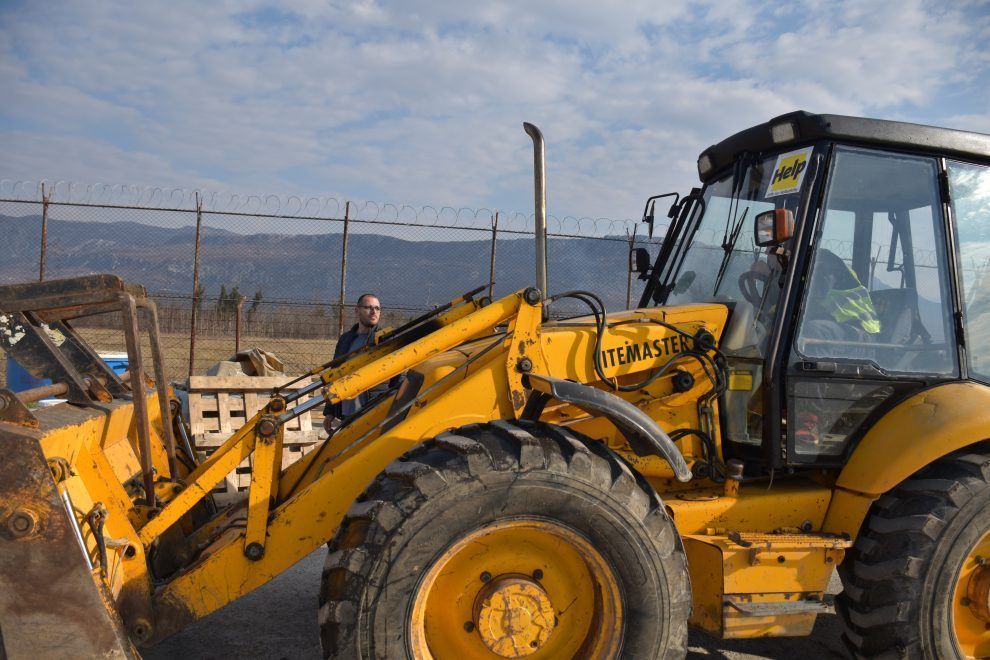
24.02.2020
“During my work visit to Germany and the prisons there, I noticed there was an important difference regarding our terminologies. In Germany, they ask the prisoner ‘how much of the sentence have you worked off’ as opposed to us, because we ask ‘how much of the prison sentence have you laid off” – the Assistant Director of the Department for Criminal Sanctions Enforcement (UIKS) in Spuž, Kemal Zoronjić, told us when we visited them recently.
It sounds so appropriate and defining – both for hard working Germans and non-working Montenegrins.
However, as we have learned during our visit to UIKS (which is the new name for the prison in Spuž and as far as we can see not yet adopted by the employees and common citizens) the aim is to ensure that the sentence is not just “laid off” in the Montenegrin largest prison. UIKS is working in cooperation with the German humanitarian organization Help, with the financial support of the German Government – and the symbolism is noticeable.
Zoronjić says that in addition to Help, they also cooperate well with the German Federal State of Bavaria, where he has also visited several prisons.
“It is exactly with the German experts from the techno-economic sector of the prison – that we have defined how to increase production at UIKS as well as the number of prisoners employed, and this dynamic is actually being successfully implemented with the support of Help. First, we had to recognize what those priorities were, after which we compared them together and started carrying them out.”
Help is working in cooperation with the UIKS administration to strengthen their existing work resources at Spuž Prison in order to create better living conditions for prisoners, as well as working on the future re-socialization of the prisoners.
Director of UIKS, Milan Tomić is particularly pleased or rather enthusiastic about the construction machine, a backhoe loader. He was joking that “they are not shutting down the machine and that it does not know what they got in store for it yet”.
“We are going to ‘break’ this machine in a positive way – of course, because we have not shut it down since it came here. The machine showed itself to be excellent.”
This is the machine that Help has donated, among other equipment, to the Department for Criminal Sanctions Enforcement (UKIS) under the project “Support to socio-economic stability of the Western Balkans region 2019-2020” funded by the German Government.
Director Tomic says that until now they had to hire private individuals for all the work in the prison and that they had to pay for it, but now they are producing a lot of products for their own needs and that they hope that in the future they will be able to sell the left over amount. Among other things, they are able to produce the concrete blocks, which is thanks to another Help donation – the block production line which they call “the blocker.”
The machine produces about 500 to 600 concrete blocks per day during one shift. They note that the construction of concrete blocks also depends on the weather, because the blocks have to dry out. Assistant Director Zoronjić recalls that the start of block production was a little late last year, because of the high temperature and the rainy season, but it is now in full operation.
On the very day of our visit they were expanding parking lots with the concrete block of their own production, and when we visited the place where the blocks are made around 10 am, the newly constructed blocks could be seen on the “runway” – as can be seen on the pictures.
“The blocker is producing blocks just for our own needs for now, but in the future we plan to try selling them.”
The runway for the operation of the block production line itself has cost UIKS 10 thousand euros.
We have learned that the plans for the construction of four facilities within the UIKS are underway: a hospital, a register post, a multifunctional facility for the education, culture and religious needs of prisoners, as well as an open type prison for the lightest legal offenses – for the people who would spend only one night in prison.
The amount of work for which they will now be able to use their own resources is quite large, which of course results in savings on their part. In addition, they plan to completely rebuild the fence around the entire complex with concrete and wire all by themselves.
Help has also donated to UIKS a tractor with a hydraulic arm and an attachment for loading manure among other various equipment. They also hope to start producing steel wire soon.
Tractors, construction machines, kitchens and workshops
Along with the construction work, Help has assisted them with the reconstruction of a poultry stable on an agricultural estate within the UIKS. They have their own egg production for their nutritional needs that operates according to the highest standards, and they sell surpluses on the market through a company they have a contract with.
They have three flocks in total and they are planning the fourth. Their eggs are the main source of the income for now although they have developed other activities, both agricultural (they also own a pig and cattle farm) as well as locksmith, carpenter and mechanic activities.
“Last year we had only about Euro 130.000 of income.”
To my remark “great” Mr. Tomić replied:
“I would not agree, that’s not enough. We can do more ”… and he added: “This is not some big money, but it means to us a lot and we try to increase it. This can be done with careful and strategic planning, as we do in our cooperation with Help. All the equipment we got with the support from Help were things that turned out to be extremely useful, both the excavator and the machine as well as everything else. Everything is being used and everything works, even more than the current possibilities allow according to the head of the labor administration, Saša Tmušić, who often tries to remind me that we are not a construction company yet.. ”
He explained that not all of the aforementioned income was from their own production, that it was also from services they provide – services for the courts or allowing prisoners to visit private doctors, but the primary goal is to increase their own production at their agro-industrial complex, which is the standard practice elsewhere.
Tomić reckons that the block production line will produce blocks on a larger scale in the future when all of the workers/prisoners request to work on it. They are working intensively to balance the quality and to reach even higher standards which will enable them to enter the market with a competitive product easier, he believes.
They also have woodworking and one of their most famous products – typical Montenegrin “tableware”, a wooden table with chairs and “tripods”, although they do always have customers for other wooden products – or artwork as well. Due to them currently having only one talented wood carving artist, they rarely stock these products since they are often pre-ordered and sold.
They are also planning to start manufacturing high quality steel wire for various uses in the near future. In the last year alone for example, they have spent close to € 20,000 on their own steel network, and they are going to need even more of it this year. They hope that all of this will be their own products in the future and a potential income.
On the other hand, the savings allow them to buy some other essential items for which there is no money in the budget provided for them.
It is invaluable that thanks to Help – through their cooperation with the ZOPT (Center for Education and Training) the prisoners in Spuž are now receiving vocational training, after which they receive certificates, which can be of great benefit for their re-socialization after life in prison.
According to the Director Milan Tomić, the media always captures all the negative aspects and events in prison, but they leave out the important positive aspect of their work on the re-socialization of people, which is something that they have invested in a lot in recent years.
“This is exactly what our cooperation with Help is based on and why we like it so much. It is a combination of our technical equipment and training and at the same time the involvement of prisoners which in the end results in our main goal – that they receive an official certificate from a licensed provider of the Ministry of Education. After that they will be able to work in required occupations that are in deficit such as cooks, assistant cooks, garden nurseries, carpenters, locksmiths and so on”.
During the course of this project in cooperation with Help alone, a total 19 prisoners have received professional training and certificates of knowledge and skills. Appropriate equipment has also been purchased, such as tractors, machines and workshops tools.
With all the equipment donated by Help with the financial support from the German Government, it is also expected to train people to work on it, equipping them with certificates of expertise for the future. The kitchens for example, along with metal works and carpenters’ workshops satisfy the technical training requirements.
Tomić says that he personally found it extremely helpful to visit the two prisons in Serbia, which was organized by Help, during which they were focused precisely on learning about their resources and how they have worked in these areas we have already mentioned.
“I had many job commitments during that period and we had to reduce that visit to a minimum, but as I have told Dženan (Dženan Demić, a colleague in charge of training and employment at Help), I would have regretted it had I not participated. We saw a lot of useful things there – very, very useful. We have also seen some things that we can immediately apply here, for example – for our own production of steel wire. The steel wire production line itself costs as much as we paid just for our needs last year.”
When asked whether prisoners have motivation to engage in work and training, especially given the prejudice that “Montenegrins are a lazy people”, Director Tomić and Assistant Zoronjić, as well as Chief Nikola Tanasilović responded identically:
“Yes”, and then they explained that it was of multiple benefit to them.
Work as psychotherapy and investing in life beyond the prison walls
“They work and they get paid for it, and therefore they have the opportunity to advance in the groups that we have here, to move into a more favorable group, so they are very inspired to do it. Kemal can tell you as I was not present directly when certificates were awarded after training, that the whole event was very emotional. These people are employed here, and after that they undergo a vocational training which opens the door for them to continue their lives when they leave prison. This means that not only do they know how to work, they also get a practice and a ‘ćaga’ (an archaic expression for a certificate) that confirms all of this, and therefore they are very interested in working. We have over 300 convicts on a monthly basis that are engaged through various workshops. In some cases, we even have a shortage of people – for example for construction jobs, because we cannot hire people who are not proficient in such jobs but still our goal remains to engage them as much as possible.”
Chief Nikola Tanasilović says that every third prisoner is engaged in work both indoors and in half open space, and that the number has doubled compared to 2017. Previously, there had been only 12 percent of prisoners who worked, and Tanasilović added that his long work experience showed that work engagement motivates people in multiple ways, especially the convicts who spend a long time indoors – as much as one-third of their sentence. Through work engagement, they are given the opportunity to get into a semi-closed system where they also have other benefits.
Assistant Director Kemal Zoronjić pointed to another particularly important segment of the work engagement of prisoners – the people who spend much of their lives behind prison walls.
“The biggest motivation for prisoners when it comes to work is that it is also a form of psychotherapy. For the people who are confined in a closed space all the time, the time itself is passing slowly and they are looking for work. In this way their days pass faster for them, their thoughts are focused on other things, and this occupational therapy is extremely desirable both on our part and on their part in order to withstand prison conditions more easily. It is because man in prison has limited freedom – which is something that has no price. Therefore, there are many factors that, when gathered produce a positive result. When prisoners are engaged in work there are less problems inside. After work they return to the room tired, they take a shower and rest in various ways, they do not have the need to cause problems. Whereas, when people do nothing indoors, they are full of negative energy and start to cause problems. So it is a mutual interest that they work in order for us to ‘have peace in house’.
A further increase in the employment of prisoners is planned, he announced, by putting into operation a cattle farm, where they will need about 10 more people. They also plan to increase the production of blocks for which they will need another 6 to 10 prisoners.
In addition to the existing greenhouse obtained from Help, it is also planned to quickly build another one for the production of flowers, where they will also need more workers, as well as their own production of onions and potatoes for their needs. They have two tractors and the plows.
The administrative buildings were both richly decorated with prisoners’ works, paintings and sculptures in wood, from which we toured the working part of the Spuž prison with Chiefs Tanasilović and Tmušić, and we also had a chance to talk to some of the prisoners who had received Help training as well as certificates with professional titles.
Tomo Milačić and his colleagues in the carpentry workshop are working on making a more popular product coming out of the UIKS – table and tripods (small three-legged chair). Milačić says that he is a health worker by profession and that carpentry is his new second profession, which he received thanks to Help.
“I worked in health care for years and I accepted this new profession by chance, which I have practiced for eight years so far. I have also received Help training and a certificate.”
With a slight irony in his voice he adds:
“I am full of diplomas now, I just need to find a job.. but it will happen eventually. ”
He then explained in a more serious tone:
“The prison as an institution is a small town with thousands of prisoners living here 24 hours a day. These people live in some rooms. These are small apartments, small rooms with various infrastructures, kitchens, bathrooms with electrical connections. It takes electricians, carpenters and plumbers and all the craftsmen in order to maintain all of this. So we always need tools and training because people come and go. The prisoner fluctuation is significant and the support like the one provided by Help is necessary, positive and very good. People who can work, people who want to work and who are committed can make it possible for them to develop an interest or make a living from it when they leave prison”.
When asked if he intends to return to his first job in health care or his new found art – of which he says “the pieces themselves speak”, he told us that he is yet to decide.
“It is useful for me to have a certificate, I will be able to join a carpentry company if I decide so, or possibly have one of my own – this is the primary intention. Why not a small carpentry shop even?”
“In addition to tables and similar products, we do a lot of paneling, including kitchens, doors and windows. Here at the prison, we arrange our space ourselves, although most of the work consists of repairs.”
In any case, they have a lot of work that helps them with “spending time constructively and being useful.”
“In a way, we must amend ourselves to the society. Because we are a kind of sinners, so in some way we can repay ourselves by working as much as we can. And that is also useful for us when we leave prison. It would also be great if this work and engagement could result in some conditional paroles. We have a salary, which is about 72/73 euros – one third of the minimum labor cost. But it’s just a tip compared to what some of us do here, though almost everything in the carpentry workshop is done by teamwork.”
While saying goodbye to Tomo Milačić, he reminded us that the work of Help is very important to them and that it would be good to continue this practice.
A “small town” of 1000 people that eats in one place
When asked if he intends to return to his first job in health care or his new found art – of which he says “the pieces themselves speak”, he told us that he is yet to decide.
“It is useful for me to have a certificate, I will be able to join a carpentry company if I decide so, or possibly have one of my own – this is the primary intention. Why not a small carpentry shop even?”
“In addition to tables and similar products, we do a lot of paneling, including kitchens, doors and windows. Here at the prison, we arrange our space ourselves, although most of the work consists of repairs.”
In any case, they have a lot of work that helps them with “spending time constructively and being useful.”
“In a way, we must amend ourselves to the society. Because we are a kind of sinners, so in some way we can repay ourselves by working as much as we can. And that is also useful for us when we leave prison. It would also be great if this work and engagement could result in some conditional paroles. We have a salary, which is about 72/73 euros – one third of the minimum labor cost. But it’s just a tip compared to what some of us do here, though almost everything in the carpentry workshop is done by teamwork.”
While saying goodbye to Tomo Milačić, he reminded us that the work of Help is very important to them and that it would be good to continue this practice.
Since the prison is a specific closed system, this is a bit more difficult for the time being because, for example, his work is not recognized as an internship or working experience, although the workload in the prison kitchen is huge.
“You wouldn’t have the amount of work in the kitchen that we have here on any other job, we prepare food for 1300 people for every shift, every day, 365 days a year. The nutritionist determines the menu on a weekly basis. Food choices are adapted for everyone: I am on a diet for example, and many others are too. We also have people with a specific diet due to various illnesses, and we take care of religious dietary needs, all on a daily basis. We have nutritionists who are constantly updating our menu as much as they can, and every morning if there is a specific request or if there is a new inmate, I get instructions for the food preparation accordingly. A total of 15 to 20 people are working in the kitchen, led by the chef. For each of the diets he prepares seven to ten different dishes.”
Beside eggs, they also have pork and beef of their own production, but that is still not enough.
The Master Chef is licensed to provide training, which opens the possibility for faster Assistant Chef training. Chief Aleksandar Tmušić explained to us that they have a nutritionist, a head chef and two other chefs every day in the shift, and that all other kitchen staff consists of prisoners.
He explained to us that the law recognized the so-called open prison system, but that has not yet been implemented. With such a system, the possibility of gaining a greater level of experience in the cooking business, would be raised to a higher level – especially the variety of cooking. Although the level of skills is well above the level of assistant chef diploma they acquire here because of the amount of work that is done in the prison kitchen, Tmušić notes.
Until then, as M.M. had told us, they still have TV, where they watch both local and foreign chefs in order to learn new recipes, dishes and “little secrets of the great masters of the kitchen” – as was the motto of the once popular commercials.
“It is not difficult for me; I really love it. In the evening I often save something to do as a little extra, I really enjoy it. In my spare time, I try new recipes. Besides, it’s nice when my fellow inmates praise certain dishes, when they eat everything and even ask for more.”
M.M. says that after the completion of the vocational training and the award ceremony, it was they, the graduates themselves, who prepared the whole feast for the occasion including the cakes.
Both as a prisoner and as an assistant cook, he is qualified to say that the quality of food in the prison has improved significantly, but that the favorite dish of a great number of prisoners remains to be the “prison beans”, which is the counterpart to the so-called “army beans”. The secret to the taste is, he explains, in the amount of beans that is cooked which is quite large.
At the end, the director Milan Tomić and his assistant Kemal Zoronjić insisted that they are particularly grateful to our colleague Dženan Demić, who “did not find it difficult” to come to them numerous times, to visit all potential resources and to discuss with the management in detail what is most needed and what is the most effective way in which they can be most comprehensively helped. Of course, as they say, “we know that behind Dženan, there are Klaus (Klaus Mock, Regional Help Coordinator), Help and the German Government, and we hope to continue cooperation, because it is in our best interest.”
Based on the reaction of prisoner M. M, who has already received the training for Assistant Chef, we can see that he clearly enjoys the job and already has the idea that we could help him with the training and support in devising a business plan (which would also be significant to other prisoners). This would be “his springboard” after he leaves prison in a couple of years, because he might be thinking of starting some business together with his wife who is already working in the hospitality industry,” so UIKS hopes to continue working with Help towards helping similar cases.
We hope that they become a high-performance enterprise in the future as they want to.
With financial support from the German Government, Help donated € 66,878 worth of equipment and training to UIKS in 2018., and € 52,246 in 2019. Half of the invested funds were provided by the Montenegrin Ministry of Justice through Enfothe Department for Criminal Sanctions Enforcement.
The program of support for Department for Criminal Sanctions Enforcement is part of Help’s regional project “Supporting the socio-economic stability of the Western Balkans region 2019-2020”, funded by the German Government.
Biljana Jovićević
Help mediators helping a Roma family become foster parents
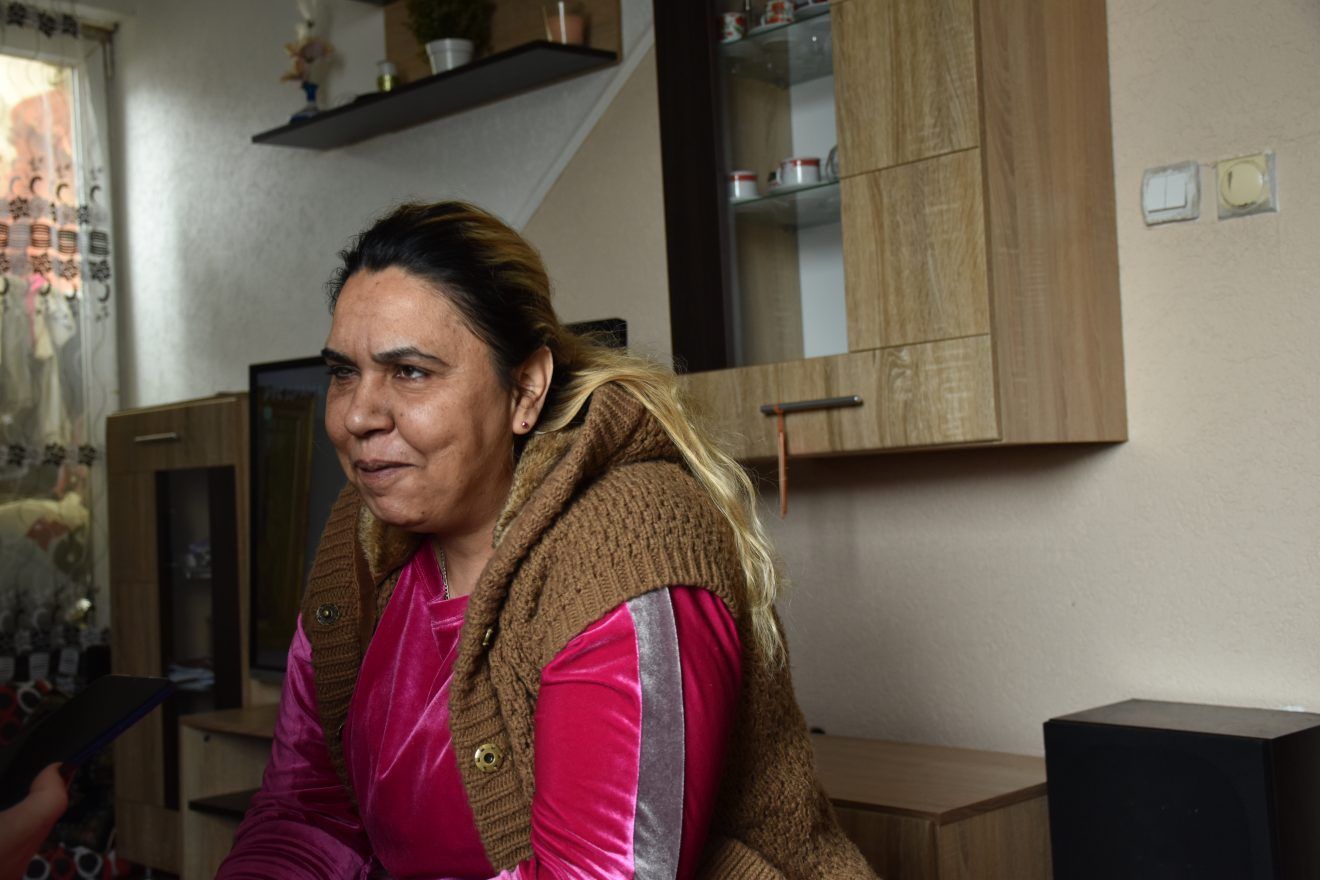
28.02 2020
Help mediators, Diamond Pajazitaj and Ibrahim Tatari have been helping Ganamete Beganaj, a 42-year-old mother of two young adults, for two years already, to become a foster parent to a girl from the Home for children without parental care in Bijela.
Ms. Beganaj says that she couldn’t have any more children because of health problems, and that she has always wanted to have a daughter. She got the idea of becoming a foster parent from her two friends who had previously become foster parents for the children from Bijela and who are very happy, and so are the children.
“I have seen that the children of my friends got along well with their foster children, that there was no difference between them, so I wanted to become a foster parent too, because I always wanted a daughter, and my doctors were strongly against me becoming pregnant.”
Help’s mediators Dijamant and Ibrahim filed their first foster request in January 2018 on behalf of Ms. Beganaj. She says she is extremely grateful to them for helping her throughout the process, because she has only completed two grades of elementary school.
“I know how to read and write, but I have only finished two grades of elementary school, and the procedure is not at all simple.”
She says that Ibrahim and Dijamant are not only helping with this, but also with whatever she asks of them. When she approached them and asked them if she could apply for a foster child, they first checked that she fulfiled all the legal requirements, and after that they went into the comprehensive procedure for collecting all the necessary documents for her to apply.
In order to collect the documentation they had to visit numerous institutions and obtain numerous certificates from the Primary and High Courts, physicians, and to collect basic personal documents from numerous registry offices also.
When the documents were collected, handed over to the Center for Social Work and confirmed valid, they were told that they will be contacted .
“They had first visited me one morning, suddenly without notice. I was a little exhausted because I hadn’t slept the night before because my spine hurt. I apologized to them and they said that it was not a problem, that they just wanted to see the situation on the ground. So they asked me if I lived there, looked around the apartment and took information about me and my family. They did not stay long, for five to ten minutes maybe. They told me that they were going to contact me, but they didn’t, “Beganaj says.
Since she has not received any feedback for more than six months after the visit, Dijamant and Ibrahim went to find out what was going on. After the verification, the Center for Social Work concluded that no one had taken over Ms. Beganaj’s case, and that the documents were now out of date.
The documents for these types of cases must not be more than six months old, which is why our mediators have re-started the process of collecting documentation in order to file a new request for Ganimete Beganaj.
Dijamant, who is Help’s mediator for social care and assistance, was more persistent this time and with more frequent inquiries for those in charge of Mrs. Beganaj’s case, he managed to put the case into the procedure.
His persistence paid off and the Beganaj family recently had a second visit from Center for Social Work officials who came to check the situation on the ground again.
Ms. Beganaj told them that everything was ready for the a new family member, towards whom everyone is looking forward to even though they have a small apartment.
“There are 38 square meters here in the apartment, but we have a room that is intended just for her. My older son has already left home, and so only the younger one and the two of us remain here. My husband has a regular income, and I also sell at the local market. When they arrived, I showed the room to them in order to assure them that everything was ready. I told them that I could buy a crib immediately if needed. They told me to wait and explained the procedures to me – in particular that the decision was first whether or not they will accept our request, and that if my husband and I accepted it we would need to finish the training necessary. I said that I was fully prepared to take care of her, that I could buy and provide everything necessary, and educate and raise her. I know it’s not easy, but I’m not afraid, I’ve already raised two children and everyone here is ready to help. I would do anything for her and make sure that she has everything the baby needs. ”
She is now eagerly awaiting the decision whether she can become a foster parent, filled with emotions of anxiety and hope.
When we first visited Ms Beganaj, who has been living in a social flat in Konik since 2005, her son was with her and he also said that he had wanted to have a sister since forever, and that they are hoping for a new family member.
The Beganaj family looks forward to the continuation of the process, which should end with their family having a new youngest member to look after in the new future.
Asked about her child’s age preferences, Ganimete Beganaj said it is most important for her to finally get a girl that she had always wanted, but admits that she would prefer her to be as young as possible, so that after they raise her she would not leave them immidiately after becoming an adult, but instead stay with the family.
“It doesn’t matter that much, but it would be nice if she was younger… that she is two, three years old so that she understands that we had raised her and to remain with us forever.”
Asked if they might already have a name ready, if it were a baby, Ms. Beganaj said:
“Of course, that is ready like everything else is. She would be called after my grandmother, and after my mother – Ziza. ”
Our mediators Dijamant and Ibrahim continue to work on the mediation and the assistance of Ganimeti Beganaj in an attempt to help her become the foster parent for the girl from the Home for children without parental care in Bijela.
The Roma and Egyptian mediators’ programme is part of Help’s regional project “Support to socio-economic stability in the Western Balkans region 2019-2020” that is funded by the German Foreign Ministry.
Biljana Jovićević
Workshops for RE woman in Berane, Nikšić, Podgorica
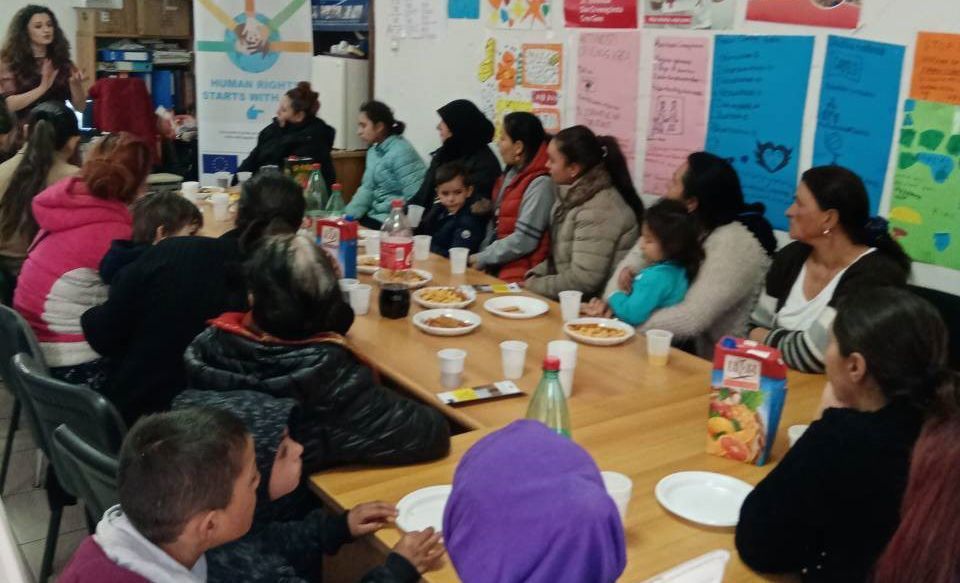
26.02 2020
Help and NGO “Walk with us Phiren Amenca” have organized workshops for Roma and Egyptian women on topic of human rights with focus on women’s rights in Berane, Nikšić and Podgorica, held by Red Cross experts of Montenegro.
The workshops were organized within the framework of the project “Civil society in action promoting and protecting Roma and Egyptian rights in Montenegro” funded by the European Union.
The workshops were held in Berane on 14. February 2020, in Nikšić on 25. February, and in Podgorica on 26. February.
The topics of the workshops were: women and human rights, family life and resolving family conflicts (domestic violence), girls’ education, early (arranged) marriages and begging.
Here are the photos that convey the atmosphere:
First Berane…
Then Nikšić …
Help Team: Nedeljka Sindik, Project Coordinator, multi-decade activist
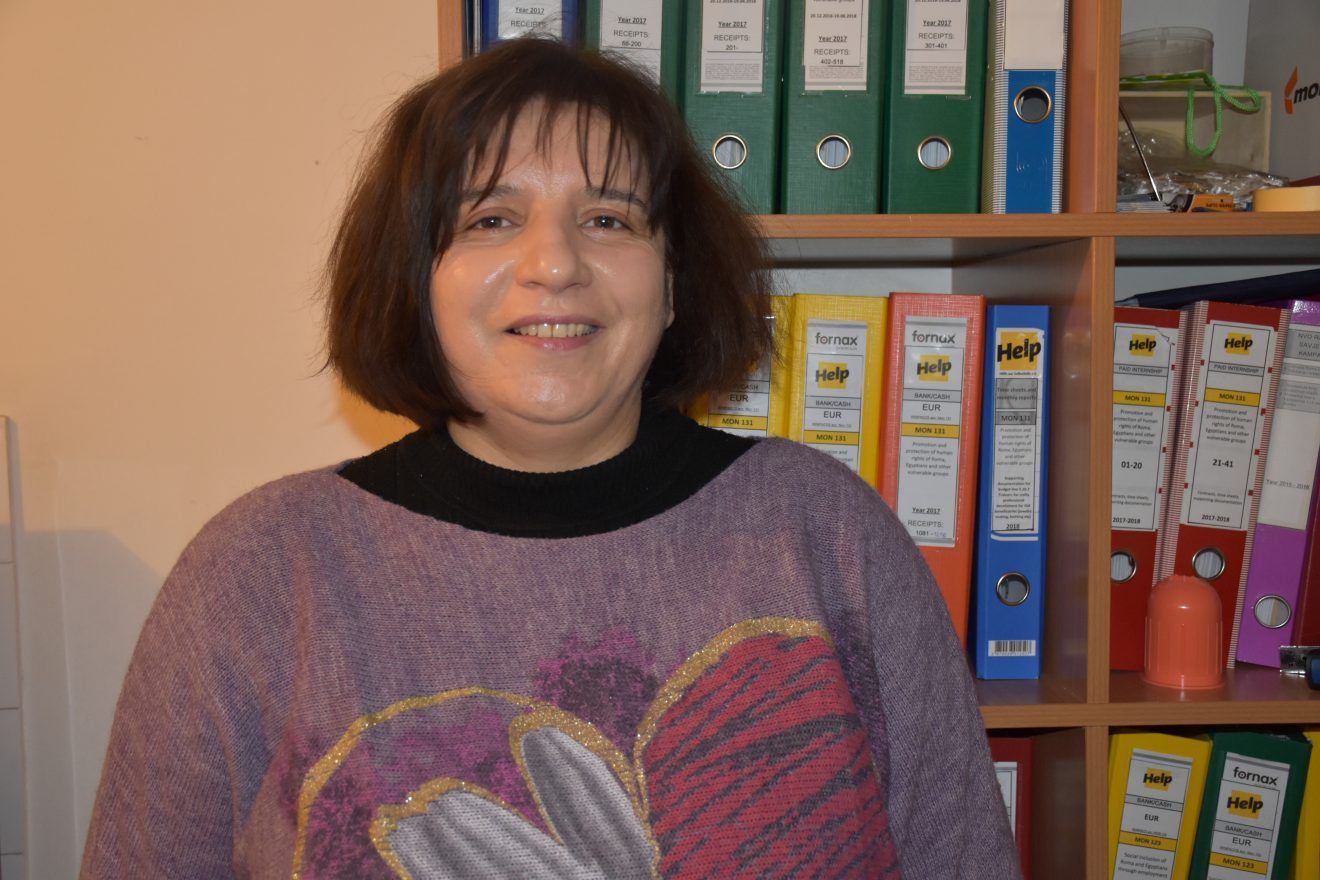
16.03.2020
I have first met Neda Sindik at a roundtable about twenty years ago when I attended a war crime rally, specifically about a case known as Deportation. It concerned the deportation of 150 citizens of Bosnia and Herzegovina in May 1992, mostly Bosniaks from Montenegro, under the knife of convicted war criminal Radovan Karadzic. Most of the BH civilians ended up in the mass graves around Visegrad and Foča. At that time, people who came here in order to survive were forced to return to Bosnia and Herzegovina (its torn part of Republika Srpska), which was a violation of the norms of international humanitarian law and the Geneva Convention. It was not until the 2000s that pressure was put on the Montenegrin authorities to bring those responsible for this to justice, and to ensure the victims’ families get a fair compensation. The gathering we attended at that time was part of that pressure, and Neda was among the familiar faces who spoke of the necessity of dealing with this crime and the shame on our collective conscience, and I still remember her fiery speech as a young activist. Neda was a student from Sarajevo, and in her speech I felt anger, resentment and powerlessness over the enormous injustice and crime committed towards the BH and her people.
This was the beginning of Neda’s engagement as a public activist, role in which she has remained to this day. She was active either as an NGO activist or expert of international organisations, continuosly striving for protection of human rights and its basic norms – the same rights and opportunities for all, about which she always spoke without reserves.
Today, as the coordinator of Help’s project for employment of the Roma and Egyptian population in the North of Montenegro, she has first told us the beginnings of her cooperation with Help as a part of the interview:
Sindik: My cooperation with Help started during the period of my work in the Commissariat for Displaced Persons. At that time I was the Head of the Technical Accommodation Unit; we had five coordinators and our job was to visit refugees and displaced persons in need of housing, to make assessments of their needs and decide where and how we can accommodate these people and help them. There were various types of assistance back then, but as part of that job, I had the opportunity to meet people from Help who were providing humanitarian assistance at the time. Help organised then delivery of supplies, clothes, shoes and other things, but also dealt with the problem of housing.
Our first cooperation was related to the construction on Balabanda in Berane, after that we cooperated in the construction of the German House in Podgorica, and after that I stopped working at the Commissariat. Then I started working in a local NGO, on a minority rights program. For the past 20 years, I have dealt with minority rights in various ways: public representation in international forums, work on laws and strategies, action plans and development programs. And so while working on a Roma related program in 2012 at the OSCE, I got in touch with Help because they were preparing a major project for Konik at the time, and through that conversation, cooperation and preparation of the project as well as sharing information and ideas, I kind of got involved with my experience in the community and working in the field.
That’s how I joined. All those policies which I pushed through NGO activism and government work, I could now put into practice and implement them. For us, the biggest problem with all the policies, especially social ones, is that somehow we always find a way for these policies to be well written and devised but never be put into practice. It was also a great opportunity for me to just get out of the shoes of a person from government agencies, institutions and an international organisation and get into the shoes of beneficiaries and work with them every day. I liked it because it was an invaluable experience, and since I took a break from fieldwork for many years, it gave me new motivation and new ideas when I came back, and that’s why I love this job.
Everything that has been done on policies can be put into practice here, and on the other hand, experience gained from practice can be transferred to new policies. And this is the one circle that closes nicely, because we put in some ideas and give inputs to the institutions. Help has, as have I, worked in that program and later participated in the development of the Roma Strategy in the next program.
In fact, our inputs on Associates for Social Inclusion were included in the strategy. Practically the whole program came from Help. That’s our program, we brought it in and the state accepted it, so in a way we did it together with the state. But it is also proof that any NGO, if it wants to work seriously and if it wants to cooperate seriously with state bodies and local institutions or the state, can create a good program that the state will accept and later fund as an institutional program. Actually, the program then becomes no longer our property – except as an idea. Now it is the property of the state of Montenegro, part of the policies of Montenegro, part of the institutional capacity of the Ministry of Education, the Ministry of Health, and this is something that gives me the will to do this work: when I see how the things and lives of people change.
During that period we have sent two children on eye surgery, which were both successfully completed, and these children no longer have the health problems they once had. We have helped many families in choosing their family doctor, selected gynecologist, and especially important for the children was the selected dentist and we have also helped with other similar important issues for them. So we just changed the way the community looks upon going to the doctors. This is something that we accomplished with the health mediators and in the end, they were recruited through the public call at the Health Center at the Old Airport disctirct of Podgorica.
Help in the mission of employing and connecting the RE community, local authorities and employers
Help: As you know the history of Help very well because of your earlier collaboration, as well as working within the organisation, you just told us about the path that Help took from being a charity organisation that provided basic assistance to people in need, to becoming a development organization now, where we work on development projects that help the community with long-term solutions. As this process of changing the type of assistance has moved and evolved, that is how you are now working on a project for employment of the RE community and people in social need in Montenegro.
Sindik: Yes. And right now, I am running this programme in Bijelo Polje and Berane, and what I like about the programmes we do at Help, is that the programme does not only have a basic component of connecting employers and employees, which is part of the job of the Employment Service, but it also has one other component, which is to link all employment institutions, then work with the community and gather information from both the community and employers. This is the information which is needed to evaluate how the structure of the unemployed should be altered and reshaped so that they can get a job in terms of knowledge and qualifications.
Among other things, we also have these trends of emigration from the North of Montenegro; everything we have in plan to do now – the research and inter-municipal cooperation in the preparation of local initiatives that need to change, will in fact again lean on one big strategy from the Ministry of Labor and Social Welfare which is currently in preparation, and we will give them all the relevant information and recommendations that are needed in relation to this vulnerable group (the Roma and Egyptians), as well as support through training programmes and the support needed to change the strategic approach. And on the other hand, we get valuable experience from involving people from the economic sectors in a different way through that big project that the state is preparing. They do market analysis in terms of the economic aspect as well as financial analysis – which is something that Help has not done so far and has not dealt with in that way.
We were working with socially disadvantaged people and solving their problems and their place in the labour market, but we did not analyse how effective it was in terms of pay, spending, how much we were investing and how much we got. These are some of the analyses that we will get from this second project, so it is very useful that we are already cooperating with the state on some level, not only through our engagement in field projects but through partner projects as well: because our project in Bijelo Polje is a partnership project since the Municipality of Bijelo Polje is a partner to us. On the other hand, this new policy and strategy will be based on valid data through cooperation with the Ministry of Labour and Social Welfare, based on the analysis of the labor market, and from the viewpoint of need and demand as well as the financial cost, in order to make the changes that are planned to be set up in a different way.
This document will be able to show at any given moment, exactly how these problems can be addressed, and in this way we participate in a general cooperation between countries and foreign consultants from the European Union who come to help us to get closer to the EU with our policies. In doing so, we share our experience from the field and at the same time we learn from those people who already live in EU countries and who have been implementing such policies for 10 or 20 years, which is important to us.
Help: Are municipalities and ministries open and eager to cooperate with Help? Obviously, the initiatives that Help pursued at the ministry level have had some effect, and some, as you say, have become an integral part of their strategies. Is the experience similar at the local level, especially because employment is a very important topic, and we know the current dominant practice with employment in Montenegro?
Sindik: The municipalities have always supported us because they have not been financially involved in these programmes so far, and so it was easy to cooperate. Employment offices have always been cautious because they have always been interested in how much this fits into their policies or how much it contributes to employment. Now we are in a different situation, the burden of decision making for the local level is no longer on the local bureaus, it has become a centralized system. But the system will change, the system will become decentralized following the model of other European countries, and it will be the municipality that will assume responsibility for local development programmes, employment, investment initiatives and job creation – thus all of this will be moving to the economic domain of work in the municipality.
This is where new opportunities for cooperation with municipalities arise. For now, these were programmes where the municipality became involved with us, promoting those programmes and giving us support in cooperation with employers, attracting employers who are already cooperating with the municipality to work with us. This will become a part of the policies that will be set up locally and implemented as such, because it will become the responsibility of the municipality, as a part of the work programme of the municipality.
Help: Apart from the municipality, cooperation with employers is very important in these employment projects, as not all employers come from municipal and state structure, but from private structure also. What are your experiences in this area?
Sindik: We have a good experience with private employers so far. We have excellent cooperation with those who have already participated in our program. The employers who once participated in Help’s on-the-job training programme and went through one programme with us, always applied again for the next one too. It is almost always the case that we have at least one company that has been in one of the previous projects to contact us again. Of course we have employers who think lucratively. They think they will get a trainee to work for them and that it should end there, they don’t need another employee.
However, we focus on those private entrepreneurs and those businesses that want to provide extra incentives to the persons who participate in the on-the-job trainings. So either they will be hired afterwards for a fixed period of time or they will be given some additional financial incentives beyond what is provided by Help. So we are always looking for those employers who are good willing and offer something other than training – and somehow we find employers like that.
It is quite difficult to do so in the north of the country, because it is not even a matter of the will of the employers, but a matter of the general situation and the payment power of the citizens who live there: the salaries are lower, the payment power is lower, and all economic entities earn less than their counterparts in Podgorica for example. Their prices are lower than in other cities and they take great care of how many people they can employ, how they can plan everything. However, big companies always come to inform themselves in our workshops, just as was the case in our last had two workshops, one in Berane and one in Bijelo Polje.
Previously, we had mostly smaller companies that would take one to two people for training and keep one at the end, but now big companies are emerging, which is a good thing. It also implies that we are recognized as a serious organization in the sense that what we do yields results. And companies that have previously participated in the programme are always coming back as partners for new employment programmes.
Normatively, all rights are already here but it takes time to adopt them in a civilizational sence
Help: Neda, according to your twenty years of activism in the institutions dealing with the rights and protection of minorities and vulnerable categories in the civil sector, how do you assess the human rights situation now, especially compared to when you started?
Sindik: It was a terrifying time for me when we started, a time when most citizens were absolutely unaware of how much the 1990s had distorted human rights in Montenegro, nor were they aware that we needed to have laws that would be a framework that should protect citizens from things like „Deportation.“ For example, today in the Constitution we have an article saying that it is forbidden to deport and return persons whose lives are endangered to their country of origin, which is an article of the UN Charter on the Rights of Refugees. So we flagrantly violated international law, forcing back persons who came to seek salvation in our country.
Nowadays, we cannot force anyone to take a rifle and go to war or even serve military service, so we simply live in a completely different country in that sense. There is a legal protection now. During these twenty years we have changed the legal system in order to protect human rights and it was a pioneering job, because we literally started from those basic rights and passed further laws, but we are in need of a tradition or practice the enforcement of these rights in our society.
We still have to learn many civilizational values, to understand that power is not everything. We are not a nation in a civilizational sense, and what I mean by nation is – citizens as a whole who have the capacity to serve. This is evident in our government officials who often just want to demonstrate that they have the power, but they do not realize that they are a service to the citizens. I know this because I worked in the government with people who felt that citizens should wait for them.
So we simply need to make the civilizational transition from position of power to the position of service and we have to understand that we are nothing but service: whether we are Help, or some local organization from Montenegro or the ministry, municipality – all of us are a service to those who pay the tax. We (Help) spend tax money from EU citizens or Germany, while state authorities and local governments spend tax money from citizens of Montenegro. So from the point of view of human rights, the moment our administration accepts that it is a service and not a power entity, our human rights will be at the level where they should be, until then there is a long way ahead of us for full implementation of the law.
You can see from the report of the Ombudsman institution that a number of state bodies are completely unresponsive to the Ombudsman’s inquiries, which tells us of an administrative arrogance that is simply not acceptable, but I believe that this can only change with practice because you cannot immediately create a civilization practice which was not already present.
Help: How do we progress from a situation where we have a normative basis for respect for human rights, but we still do not have full implementation? Specifically, what do you encounter when working on employment programmes for the Roma-Egyptian community. Is it clear to people in state institutions that members of other communities have the same rights to employment, education and the rest?
Sindik: Yes, as far as state institutions are concerned, there is no fear that something that sounds like prejudice or stereotype will be said at any meeting or public address today.
Help: Will they rather hire someone from the majority population or other community?
Sindik: No, it’s not that. In our case this does not apply to the majority population, we have another kind of culture that is …
Help: Party?
Sindik: Partially party culture, but this culture also originates from our basic culture in Montenegro – friendly, cousin, godfather and homeland culture. It is like this: first I will employ my cousin, if not a cousin I can hire a godfather, and if I cannot find any I will employ a friend from my part of the homeland. After all of this, I can also hire someone from the party or someone I personally like better – even though they may have less qualifications. In our country, nepotism has no national preference.
Help: Is there a systemic discrimination?
Sindik: Traditionally, this has always been the case with us. Ever since, when, for example if you were not a communist you could not engage in politics, then if you were not in a majority party in power, you could not get anything in the state administration. Then, discrimination in the 1990s on ethnic grounds was indisputable, and for Roma it is constant and it seems to be more racial than ethnic discrimination. When the ball started to roll down afterwards, it was the turn for the disabled, the LGBTQ community and others. It seems that we must have a target group for abuse.
Just look at the law about same-sex partnership, for me this is a great example: everyone is „in favour“ of it and everyone decided they would vote „in favour“, but then when it comes to the Parliament it turns out that not all of us really are in favour. Those people in the Parliament who have not been in favour and who I know personally from my long experience, have told me that they don’t care -„let the law be passed“ – but when I asked why they were against it, the answer was ‘well that was the deal’. So in our country everything is still based on agreements and deals. This represents a civilization problem for us.
We have probably geneticaly inhedited this sort of self-pride, which was present in our people in previous centuries, which is now stopping us from evolving into better people, in every way, both privately and professionally.
We need this democratic practice, conditionally speaking „democratic“ , since there are many formally democratic countries – because this practice is not present in a meaningful way. More work is needed in order to evolve towards the real civilizational values.
Biljana Jovićević
Help workshop: Organizational Development of RE NGOs
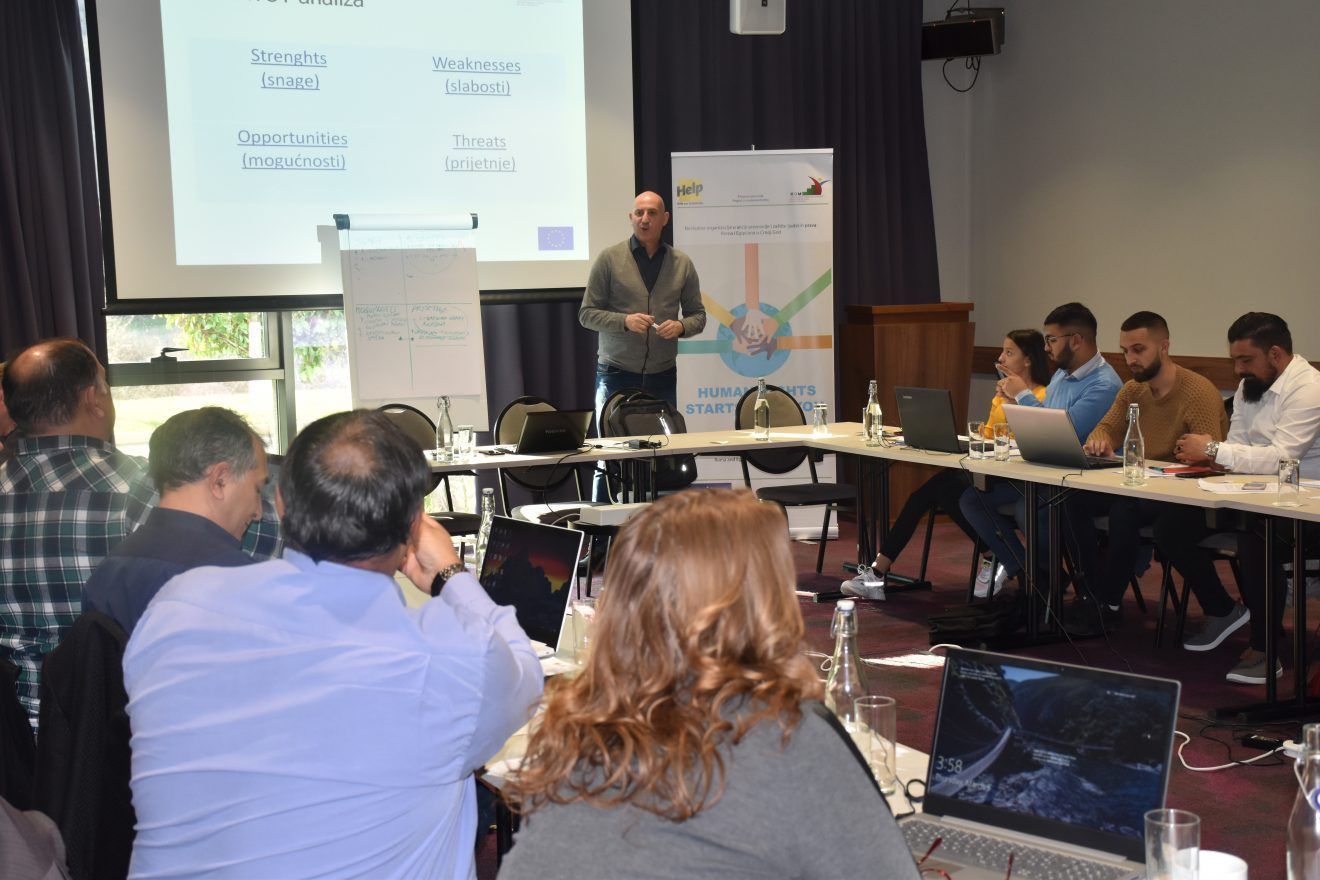
9.03.2020
“Organizational Development of RE NGOs” workshop was held in Podgorica on 5th and 6th of March, organized by Help and Roma NGO “Walk with us Phiren Amenca”.
The aim was to strengthen the organizational capacity of Roma-Egyptian (RE) organizations in order to enable them to participate as actively as possible in projects that promote the protection and rights of minorities. The trainer engaged on the workshop is a longtime prominent civil sector activist Goran Djurovic, director of the Media Center.
This two-day workshop was organized as part of the EU-funded project “Civil society in action promoting and protecting Roma and Egyptian rights in Montenegro “.
The photos convey some of the atmosphere from the two-day workshop held at the Hotel Voco in Podgorica.
Help mediators – Denisona Beriša
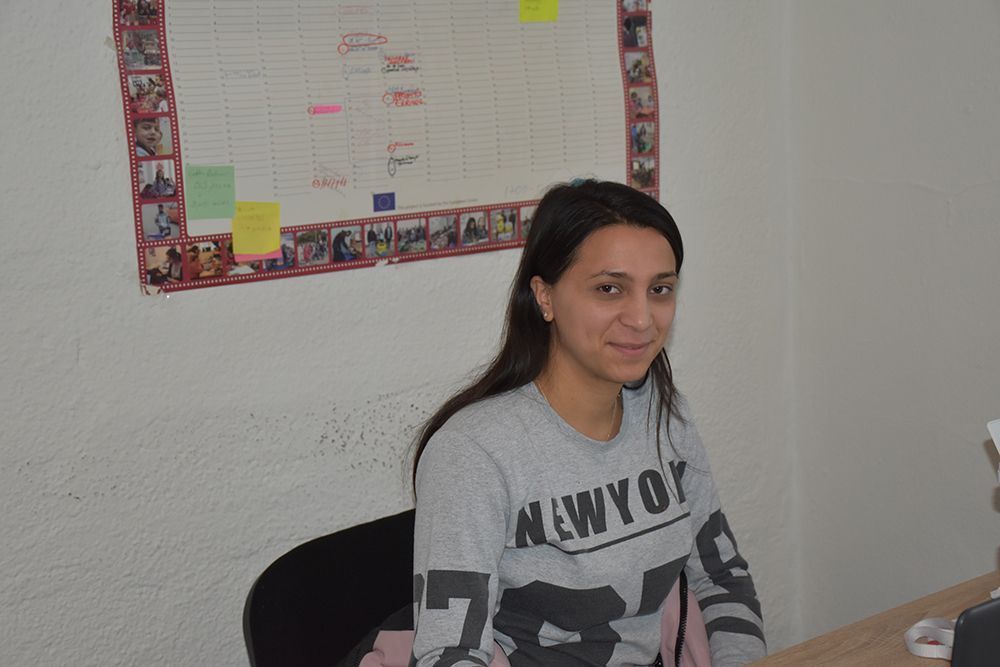
20.01.2020
Denisona Beriša for already two years’ has been working as Help mediator for employment and social care for the Roma and Egyptian population in Nikšić. She started immediately after High school, after one of her schoolmates, who was health mediator, introduced her with the Help program.
She says that she really likes her job, but she is only partly satisfied with results, as Nikšić generally has a problem with unemployment, and especially for the Roma and Egyptian population. She notes that it is possible to find jobs at the Montenegrin coast, but very often parents don’t allow that their children, particularly girls go there and work. That’ s the main reason why so many girls cannot find jobs, even when their parents sent them in elementary school.
Very often talking about her own personal experience helps her to convince parents to take better decisions for their children.
„I tell them my story, that my parents also didn’t want me to work, but after I had managed to find the job in Help as mediator, immediately after High school, they changed their attitude because they realized that this is good for me. So I am using my story all the time in conversation with parents, to convince them that this is for their children’s better future “.
As Help mediator, she organizes regularly with the local Bureau for employment workshops for RE population to help them with practical instructions: how to apply for job, where to look for it, how to write CVs and cover letters.
„Recently I helped 16 persons to apply for a job in an supermarket. Unfortunately, no one of them got the job “. As she said, she was persistent and called the supermarket to ask them why nobody didn’t get a reply, and they said that they were „still checking to see if they can hire someone “. In the meantime, she has found out that all jobs were already occupied.
Denisona Beriša today intensively works with about 20 RE families, although she is always there for others members of the community when they need help, not just for employment. Also she provides them support for other things like medical care, and whenever they need contacts with institutions on the local level.
“For example, very often people ask me to write requests or appeals to the Electro distribution system, especially when they want legalization. They also often require help for housing problems and similar difficulties”.
Denisona is 21 years old and she likes her mediator job, because it gives her a feeling of purpose for RE community, and that is what she wants to do for now, but she is also thinking about possibilities to continue her education in future.
Born in Nikšić, Denisona Beriša lives there with her parents, her father is an invalid retiree from Željezara steal factory, and with her two younger sisters who are in school.
The Roma and Egyptian mediators’ programme is part of Help’s regional project “Support to socio-economic stability in the Western Balkans region 2019-2020” that is funded by the German Foreign Ministry.
Biljana Jovićević
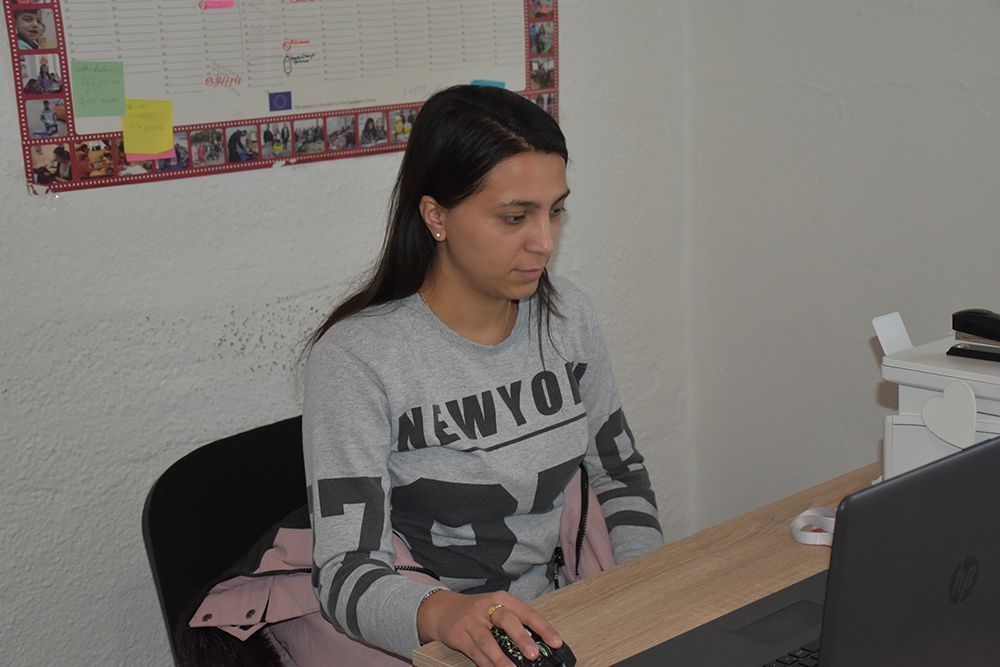
An oasis of joy in Kapino Polje, provided by Help
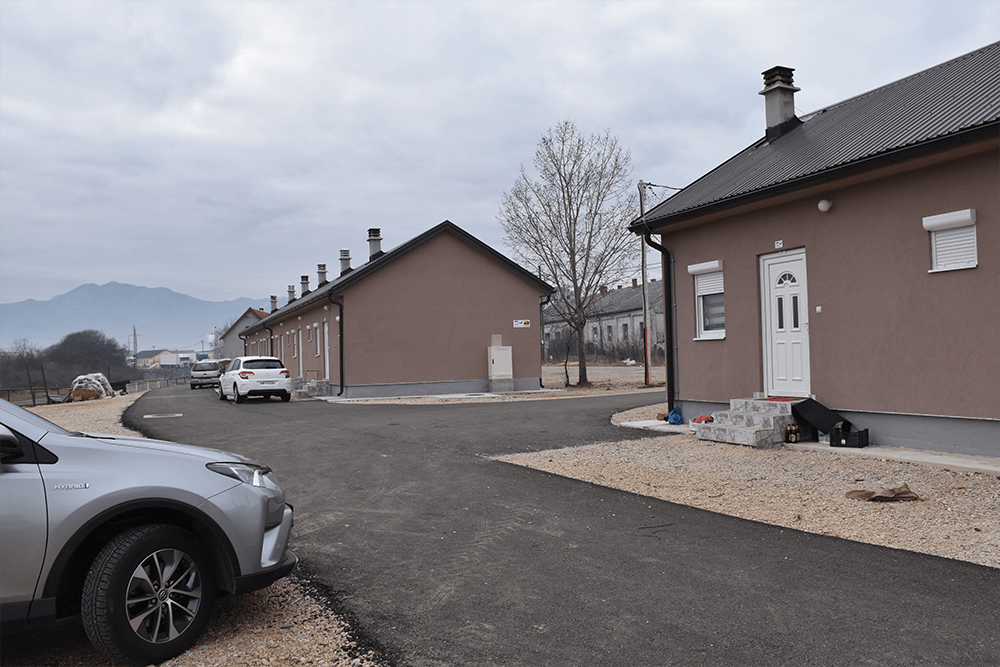
16.01.2020
„Who wouldn’t be satisfied with this, wouldn’t be with anything “says to us Gordana Jovanović, retiree, who for already a year living with her son Darko in the settlement for social vulnerable people in suburb of Nikšić, Kapino Polje. The construction of the settlement on municipality land was done by Help with funding provided by the German Foreign Ministry.
We visited her on January 14, to check living conditions and if they had any remarks 8 months after they moved there. They were very pleased with the visit so they invited us inside and offered coffee, tea and cookies that had remained from the holidays.
„It is a great pleasure to cook as well as to clean in a flat like this “, says Gordana who is chronic asthmatic, and since last year she is also fighting cancer. Her easiness in the fight, joyful and genuine smile always on her face, even when she was talking about the exhausting process of cancer treatment including chemotherapy, amazes and inspires.
After 10 years’ of marriage in 1995, Gordana took her three children and went to live in the social barracks in Kapino Polje as a single mom. Her two daughters today are already married women, and this young looking and brave woman now is, as she proudly pointed out, grandma. In the new and beautiful place, in which they now are accommodated after 18 years’ living in ruinous barrack with a common bathroom, Gordana and Darko each, now they have their own space in the apartment. Son Darko has the living room for himself and she, immediately after she prepares lunch in the kitchen, relocates herself in the bedroom with TV, where she can rest because of her illness.
“We really don’t have any complaints, we as well as no other tenants here, we are very satisfied and happy “ Gordana and Darko both said, proudly showing us their nicely decorated and equipped home in which they enjoy living. With neighbors for long they share good times as well as bad ones, consider them as family, so they speak for them also.
Although for 8 months already settled in the new place, sometime still they cannot believe that it is real and that „ finally they have their own bathroom that they have dreamed of for years “.
“For years I kept repeating ‘just to live long enough to get my own bathroom, then I can die’”, says Gordana who found out that she has cancer in the moment when she got the new home. As she said, some of her superstitious friends and family members told to her “you called the illness yourself”.
Only one thing they noted as a “small deficiency” –they don’t have canopies for the entrance door, so it is inconvenient when it is rains or when there is strong wind. However, Darko who doesn’t have permanent employment, rather working with his uncle for wage, is already discussing with the neighbors about how to do it together the same way for all, so they will be unified and keep the surrounding of the settlement nice as it is now.
All apartments are very well isolated and warm so they have great savings for heating with electricity as well as woods. For tenants who are living from low social pensions or just compensations, any saving for utilities is welcome.
The Municipality of Nikšić promised them to do few more additional works that will also help them to fix the surroundings of the settlement, particularly protect from possible river Zeta spills in front of their homes. On most of the homes in the Kapino Polje settlement you can still see plaque with the sign of Help and German-Montenegrin cooperation.
The construction of 12 housing units for socially vulnerable persons in Kapino Polje is part of Help’s regional project “Support to socio-economic stability in the Western Balkans region 2019-2020” that is funded by the German Foreign Ministry.
Biljana Jovićević
Our stoires: Selman’s hope for a better future
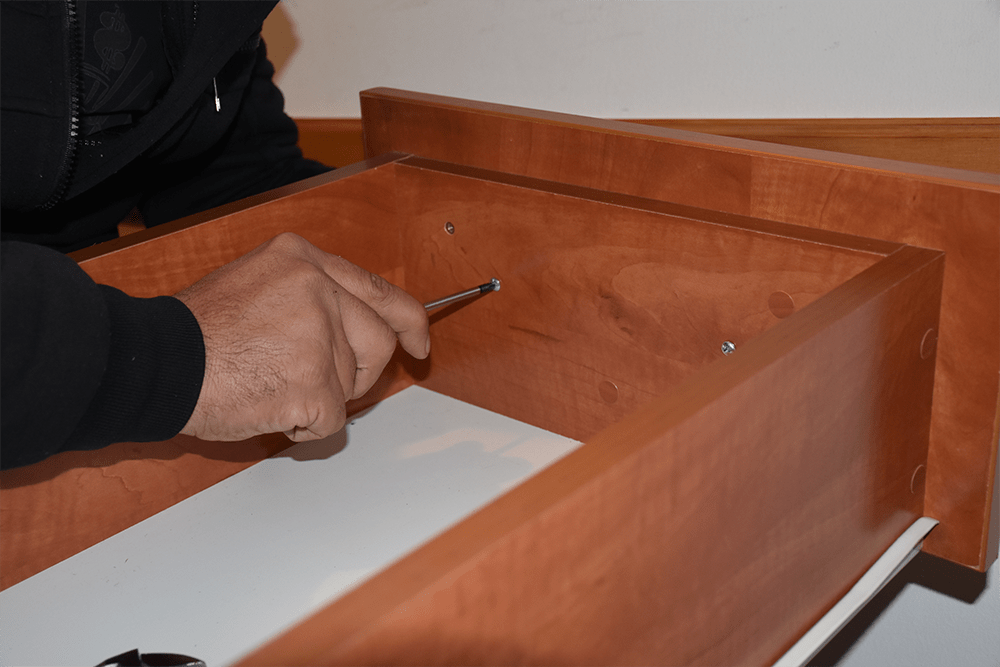
Selman Hajruši from Nikšić,
Two years ago Selman Hajruši from Nikšić had a training as a potter assistant followed by practice work for 11 months. He was offered to stay on this job but he was not satisfied with the salary as it was not enough for his family (wife and four children) costs.
After that he went to Germany to his relatives and worked there with second hand goods. He was able to send some money for his family in Nikšić; however, the cost of traveling every three months and the lack of a legal work permission maid him to come back home.
His wife also had a training for tailoring organized by another NGO; she managed to keep this job, but after some time the owner stopped paying her. Now she is working only part time from home. The family has four children aged 23, 21 boys, and 17 and a six-year-old girl. All of them went and are still going to school, with the oldest one finishing vocational high school for waiters. Unfortunately, he is not able to find a job („it is not easy for our people to get job“), the younger finished only nine grades of elementary school („he didn’t want to continue” ), the older daughter wants to be a cook and she is now going to the appropriate high school for that. She earns practical experience in a restaurant in Nikšić. The family pays 80 Euro rent for housing in Željezara neighborhood. With utilities the cost reach up to 180 Euro approximately per month. The family’s monthly social benefits amount only to 164 Euro – so they are struggling every month to make ends meet.
Mr. Hajruši asked Help for further assistance and upon the recommendation of Help he was given the chance to learn the mounting of furniture. He is satisfied with the new training and cooperation with colleagues at work, as well as with the treatment by the owners of the shop. He points out that the job is not easy because it is sensitive; it is important do it properly and not make any damage on the furniture during the process. But he believes that he will learn properly to do it, and get the opportunity for himself to stay there. The owners of the furniture retail shop, from time to time provide him some additional payed work, like cleaning or cutting grass and tidying the property. He is hopeful that after the training (ends in March/April 2020) he will get the chance to stay and work there, as it was indicated by the owners.
Help’s Roma Mediator for employment in Niksic will support him in efforts and in communication with authority in Nikšić municipality with housing, or job for his older son who is waiter.
